UNITED STATES
SECURITIES AND EXCHANGE COMMISSION
Washington D.C. 20549
Form 6-K/A
REPORT OF FOREIGN PRIVATE ISSUER PURSUANT TO RULE 13A-16 OR 15D-16
UNDER THE SECURITIES EXCHANGE ACT OF 1934
For the month of April 2024
Commission File Number: 001-41641
SHL TELEMEDICINE LTD.
(Translation of registrant’s name into English)
90 Yigal Alon Street
Tel Aviv 67891, Israel
(Address of principal executive offices)
Indicate by check mark whether the registrant files or will file annual reports under cover Form 20-F or Form 40-F.
Form 20-F ☒ Form 40-F ☐
EXPLANATORY NOTE
This Amendment No. 1 to the Report on Form 6-K originally filed by SHL Telemedicine Ltd. (the “Company”) with the Securities
and Exchange Commission on April 17, 2024 (the “Form 6-K”), is being filed solely to furnish in HTML format the Annual Report to shareholders for the year ended December 31, 2023 (the “Report”) that the Company filed in non-HTML format with the
Form 6-K as Exhibit 99.3. Each of the press release and the investor presentation that the Company filed with the Form 6-K as Exhibits 99.1 and 99.2, respectively, are incorporated herein by reference. The press release, investor presentation and
Report contain forward-looking statements and include cautionary statements identifying important factors that could cause actual results to differ materially from those in the forward-looking statements.
Other than as expressly set forth above, this Form 6-K/A does not, and does not purport to, amend, update or
restate the information in any other item of the Form 6-K, or reflect any events that have occurred after the Form 6-K was originally filed.
This Form 6-K/A is incorporated by reference into the Company's Registration Statement on Form S-8 filed with
the Securities and Exchange Commission on June 9, 2023 (Registration No. 333-272546).
Exhibit Description
SIGNATURE
Pursuant to the requirements of the Securities Exchange Act of 1934, the registrant has duly caused this report to be signed on its
behalf by the undersigned, thereunto duly authorized.
|
|
SHL Telemedicine Ltd.
By: /s/ Amir Hai
Amir Hai
Chief Financial Officer
|
April 22, 2024
Exhibit 99.3

SHL TeleMedicine Ltd. Ashdar Building 90 Igal Alon St. Tel Aviv 67891 Israel Tel. +972 3 561 2212 Fax. +972 3 624 2414 E-mail:
shl@shl-telemedicine.com www.shl-telemedicine.com Annual Report 2023
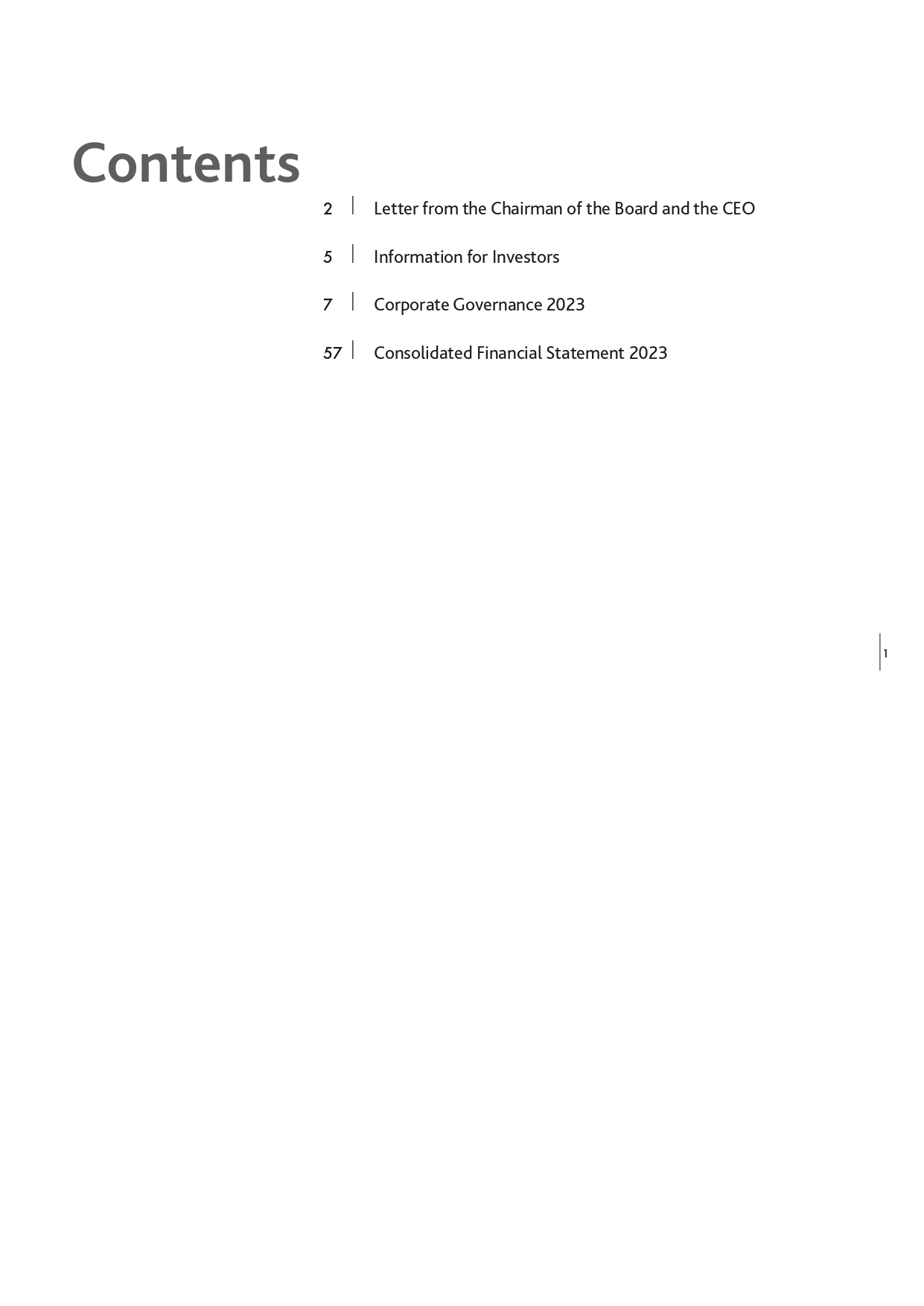
Contents 2 | Letter from the Chairman of the Board and the CEO 5 | Information for Investors 7 | Corporate Governance 2023 57 | Consolidated
Financial Statement 2023 1

Letter to the Shareholders Dear Shareholders 2 As we reflect on 2023, we acknowledge it was marked by both challenges and substantial
achievements. Despite these challenges we maintained stable revenues growth, accomplished significant strategic achievements across all operations while maintaining a robust cash position. Despite the challenging conditions and war in our Israeli
domestic market, our Israeli operation maintained stability and profitability, we have a strong infrastructure in Germany where we commercially launched the Doctors’ Virtual Visits service with large sick-funds, and we initiated our
direct-to-consumer (B2C) sales of the SmartHeart® ECG platform in the USA, all demonstrating the company’s innovative approach to telemedicine and our commitment to broadening healthcare accessibility. This year also marked the commencement of
trading on Nasdaq® for the Company’s American Depositary Shares (“ADRs”), under the symbol “SHLT”. This is in parallel to the company’s ordinary shares continuing to be listed on the Swiss Stock Exchange. Overall, revenues for the period were USD
57.1 million, a 3.1% increase compared to USD 55.4 million observed in 2022 when adjusted for constant currency1. Adjusted EBITDA2 for the period was USD 2.1 million, a decrease compared to USD 3.5 million in 2022 when adjusted for constant currency.
The decrease is mainly related due to increased investment in Germany and in USA one time and restructuring expenses in Germany, and non-reoccurring Nasdaq® listing expenses as well as circumstances surrounding the war situation that broke out in
Gaza in the last quarter. This resulted in a negative operating cash flow of USD 1.5 million, compared to negative operating cash flow of USD 0.1 million in 2022. Net loss for the period was USD 6.9 million, compared to a small net loss of USD 0.4
million in 2022 when adjusted for constant currency. The decrease is mainly related to a lower operating profit and to financials expenses due to investor options modifications, which is a non-cash item. 1 Constant currency – to enable meaningful
comparison between 2023 and 2022 results, 2022 results are also presented at 2023 exchange rates which are calculated as annual average based on the average monthly exchange rates of each of the USD and the EUR versus the NIS, as published by the
Bank of Israel. The management believes that this presentation enables a more meaningful comparison between the periods due to the significant fluctuations in NIS/USD/EUR exchange rates during the period. 2 EBITDA excluding stock base compensation
expenses and extraordinary expenses.
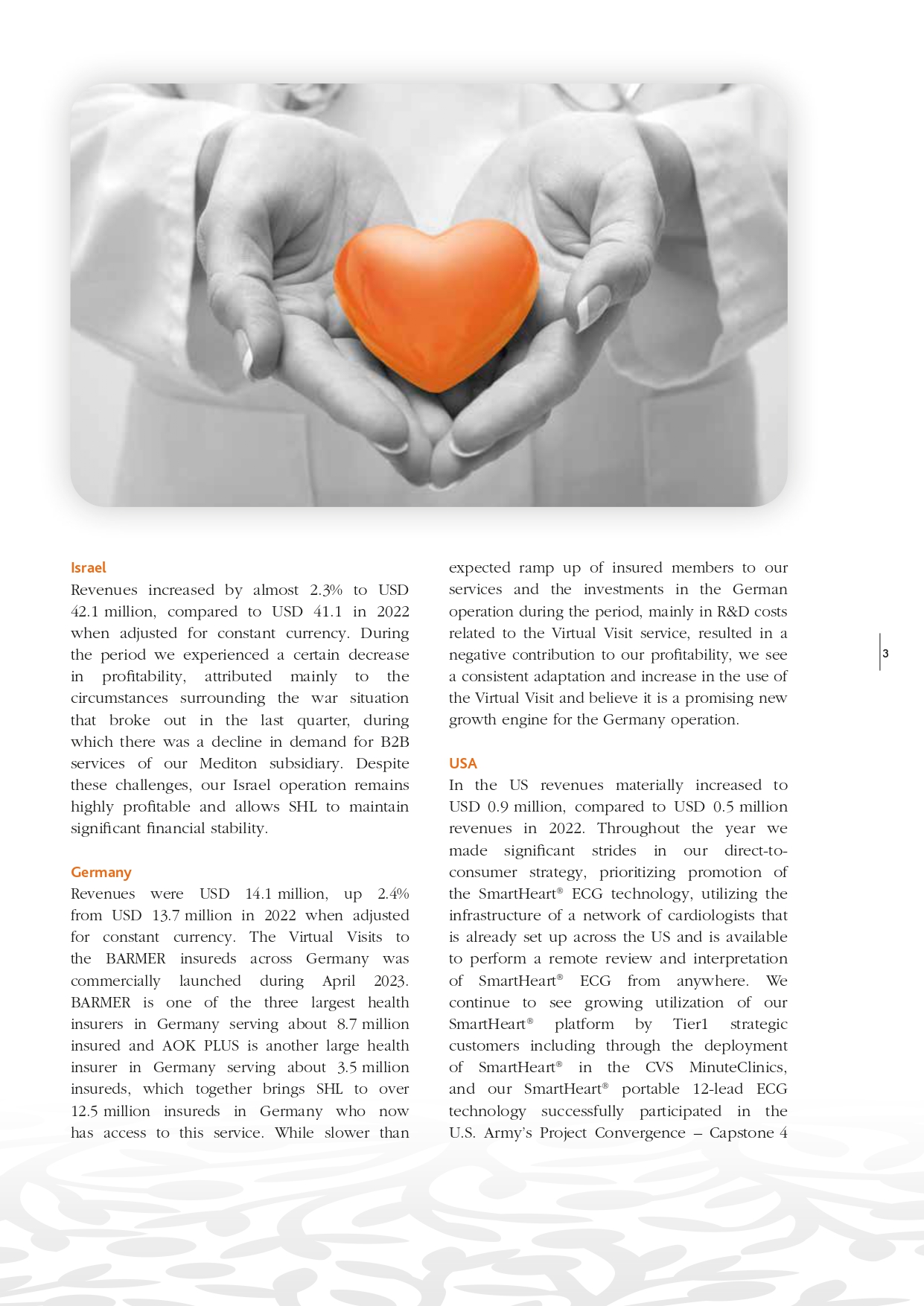
Israel Revenues increased by almost 2.3% to USD 42.1 million, compared to USD 41.1 in 2022 when adjusted for constant currency. During the
period we experienced a certain decrease in profitability, attributed mainly to the circumstances surrounding the war situation that broke out in the last quarter, during which there was a decline in demand for B2B services of our Mediton subsidiary.
Despite these challenges, our Israel operation remains highly profitable and allows SHL to maintain significant financial stability. Germany Revenues were USD 14.1 million, up 2.4% from USD 13.7 million in 2022 when adjusted for constant currency.
The Virtual Visits to the BARMER insureds across Germany was commercially launched during April 2023. BARMER is one of the three largest health insurers in Germany serving about 8.7 million insured and AOK PLUS is another large health insurer in
Germany serving about 3.5 million insureds, which together brings SHL to over 12.5 million insureds in Germany who now has access to this service. While slower than expected ramp up of insured members to our services and the investments in the German
operation during the period, mainly in R&D costs related to the Virtual Visit service, resulted in a negative contribution to our profitability, we see a consistent adaptation and increase in the use of the Virtual Visit and believe it is a
promising new growth engine for the Germany operation. USA In the US revenues materially increased to USD 0.9 million, compared to USD 0.5 million revenues in 2022. Throughout the year we made significant strides in our direct-toconsumer strategy,
prioritizing promotion of the SmartHeart® ECG technology, utilizing the infrastructure of a network of cardiologists that is already set up across the US and is available to perform a remote review and interpretation of SmartHeart® ECG from anywhere.
We continue to see growing utilization of our SmartHeart® platform by Tier1 strategic customers including through the deployment of SmartHeart® in the CVS MinuteClinics, and our SmartHeart® portable 12-lead ECG technology successfully participated in
the U.S. Army’s Project Convergence – Capstone 4 3
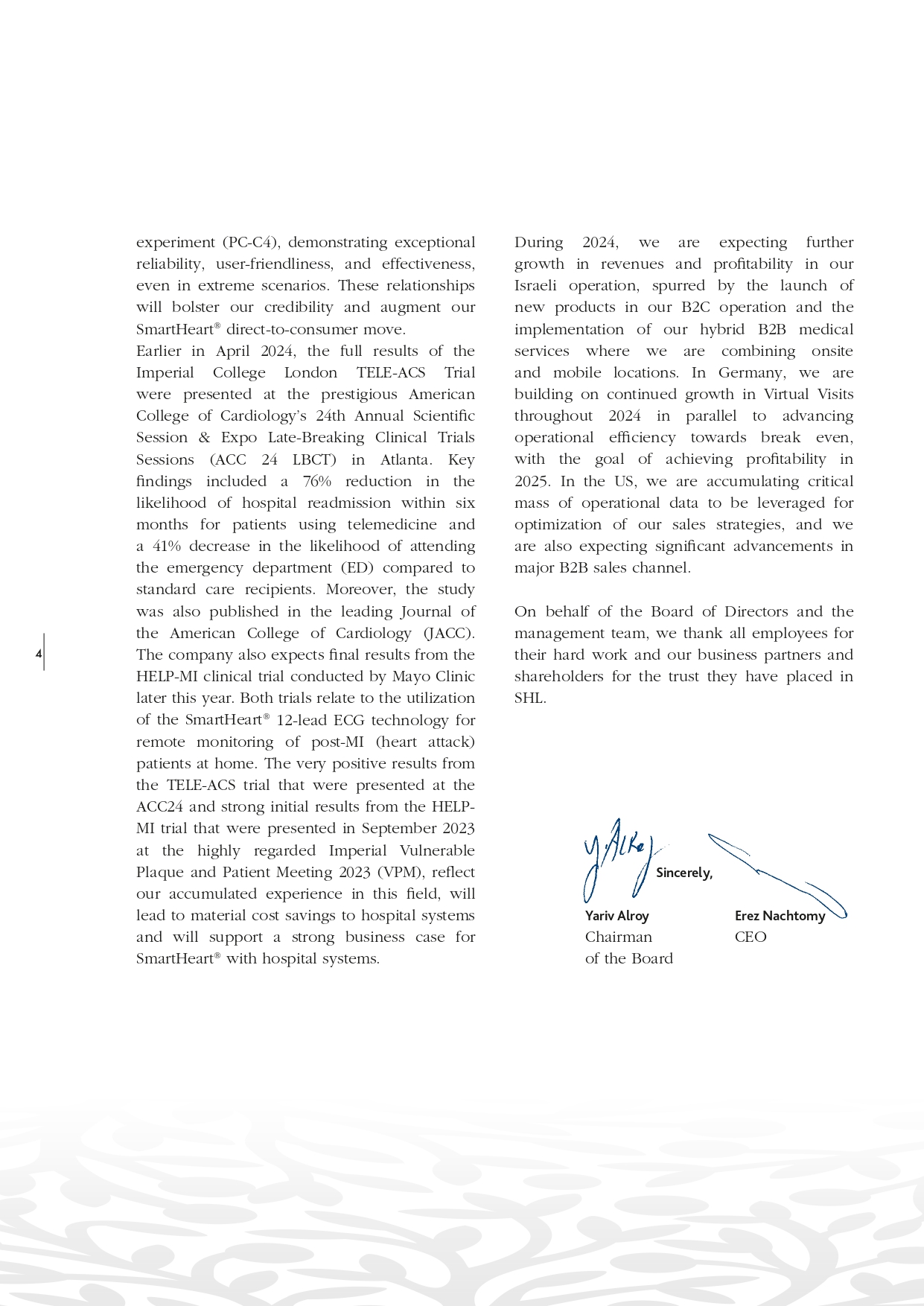
4 experiment (PC-C4), demonstrating exceptional reliability, user-friendliness, and effectiveness, even in extreme scenarios. These
relationships will bolster our credibility and augment our SmartHeart® direct-to-consumer move. Earlier in April 2024, the full results of the Imperial College London TELE-ACS Trial were presented at the prestigious American College of Cardiology’s
24th Annual Scientific Session & Expo Late-Breaking Clinical Trials Sessions (ACC 24 LBCT) in Atlanta. Key findings included a 76% reduction in the likelihood of hospital readmission within six months for patients using telemedicine and a 41%
decrease in the likelihood of attending the emergency department (ED) compared to standard care recipients. Moreover, the study was also published in the leading Journal of the American College of Cardiology (JACC). The company also expects final
results from the HELP-MI clinical trial conducted by Mayo Clinic later this year. Both trials relate to the utilization of the SmartHeart® 12-lead ECG technology for remote monitoring of post-MI (heart attack) patients at home. The very positive
results from the TELE-ACS trial that were presented at the ACC24 and strong initial results from the HELPMI trial that were presented in September 2023 at the highly regarded Imperial Vulnerable Plaque and Patient Meeting 2023 (VPM), reflect our
accumulated experience in this field, will lead to material cost savings to hospital systems and will support a strong business case for SmartHeart® with hospital systems. During 2024, we are expecting further growth in revenues and profitability in
our Israeli operation, spurred by the launch of new products in our B2C operation and the implementation of our hybrid B2B medical services where we are combining onsite and mobile locations. In Germany, we are building on continued growth in Virtual
Visits throughout 2024 in parallel to advancing operational efficiency towards break even, with the goal of achieving profitability in 2025. In the US, we are accumulating critical mass of operational data to be leveraged for optimization of our
sales strategies, and we are also expecting significant advancements in major B2B sales channel. On behalf of the Board of Directors and the management team, we thank all employees for their hard work and our business partners and shareholders for
the trust they have placed in SHL. Sincerely, Yariv Alroy Erez Nachtomy Chairman of the Board CEO
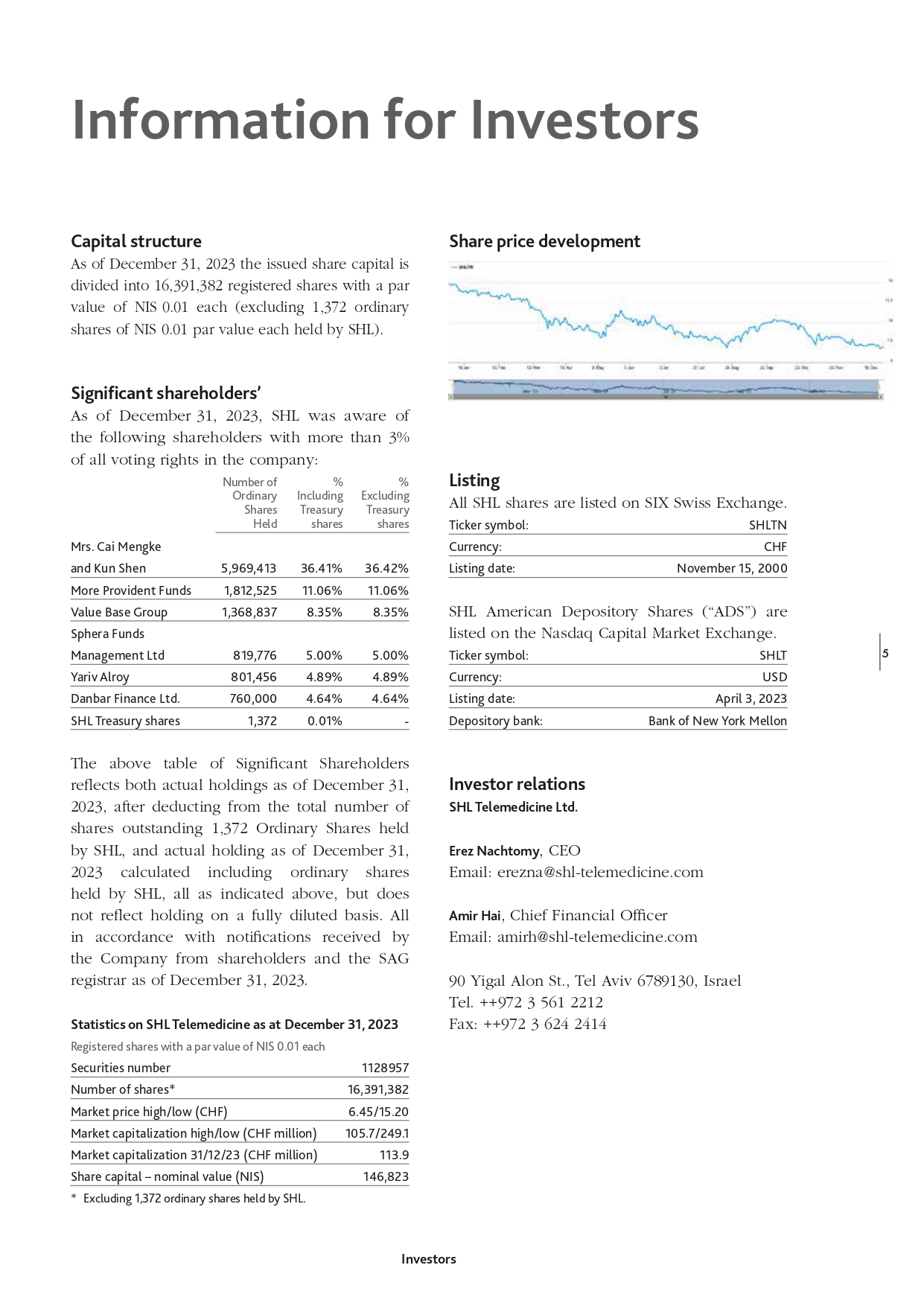
Information for Investors Capital structure Share price development As of December 31, 2023 the issued share capital is divided into 16,391,382
registered shares with a par value of NIS 0.01 each (excluding 1,372 ordinary shares of NIS 0.01 par value each held by SHL). Significant shareholders’ As of December 31, 2023, SHL was aware of the following shareholders with more than 3% of all
voting rights in the company: Number of Ordinary Shares Held % Including Treasury shares % Excluding Treasury shares Mrs. Cai Mengke Listing All SHL shares are listed on SIX Swiss Exchange. Ticker symbol: SHLTN Currency: CHF and Kun Shen 5,969,413
36.41% 36.42% More Provident Funds 1,812,525 11.06% 11.06% Value Base Group 1,368,837 8.35% 8.35% SHL American Depository Shares (“ADS”) are listed on the Nasdaq Capital Market Exchange. Management Ltd 819,776 5.00% 5.00% Ticker symbol: SHLT Yariv
Alroy 801,456 4.89% 4.89% Currency: USD Danbar Finance Ltd. 760,000 4.64% 4.64% Listing date: SHL Treasury shares 1,372 0.01% - Sphera Funds The above table of Significant Shareholders reflects both actual holdings as of December 31, 2023, after
deducting from the total number of shares outstanding 1,372 Ordinary Shares held by SHL, and actual holding as of December 31, 2023 calculated including ordinary shares held by SHL, all as indicated above, but does not reflect holding on a fully
diluted basis. All in accordance with notifications received by the Company from shareholders and the SAG registrar as of December 31, 2023. Statistics on SHL Telemedicine as at December 31, 2023 Listing date: Depository bank: SHL Telemedicine Ltd.
Erez Nachtomy, CEO Email: erezna@shl-telemedicine.com Amir Hai, Chief Financial Officer Email: amirh@shl-telemedicine.com 90 Yigal Alon St., Tel Aviv 6789130, Israel Tel. ++972 3 561 2212 Fax: ++972 3 624 2414 1128957 Number of shares* 16,391,382
Market price high/low (CHF) 6.45/15.20 Market capitalization high/low (CHF million) 105.7/249.1 Market capitalization 31/12/23 (CHF million) 113.9 Share capital – nominal value (NIS) April 3, 2023 Bank of New York Mellon Investor relations Registered
shares with a par value of NIS 0.01 each Securities number November 15, 2000 146,823 * Excluding 1,372 ordinary shares held by SHL. Investors 5

6

Corporate Governance 2023

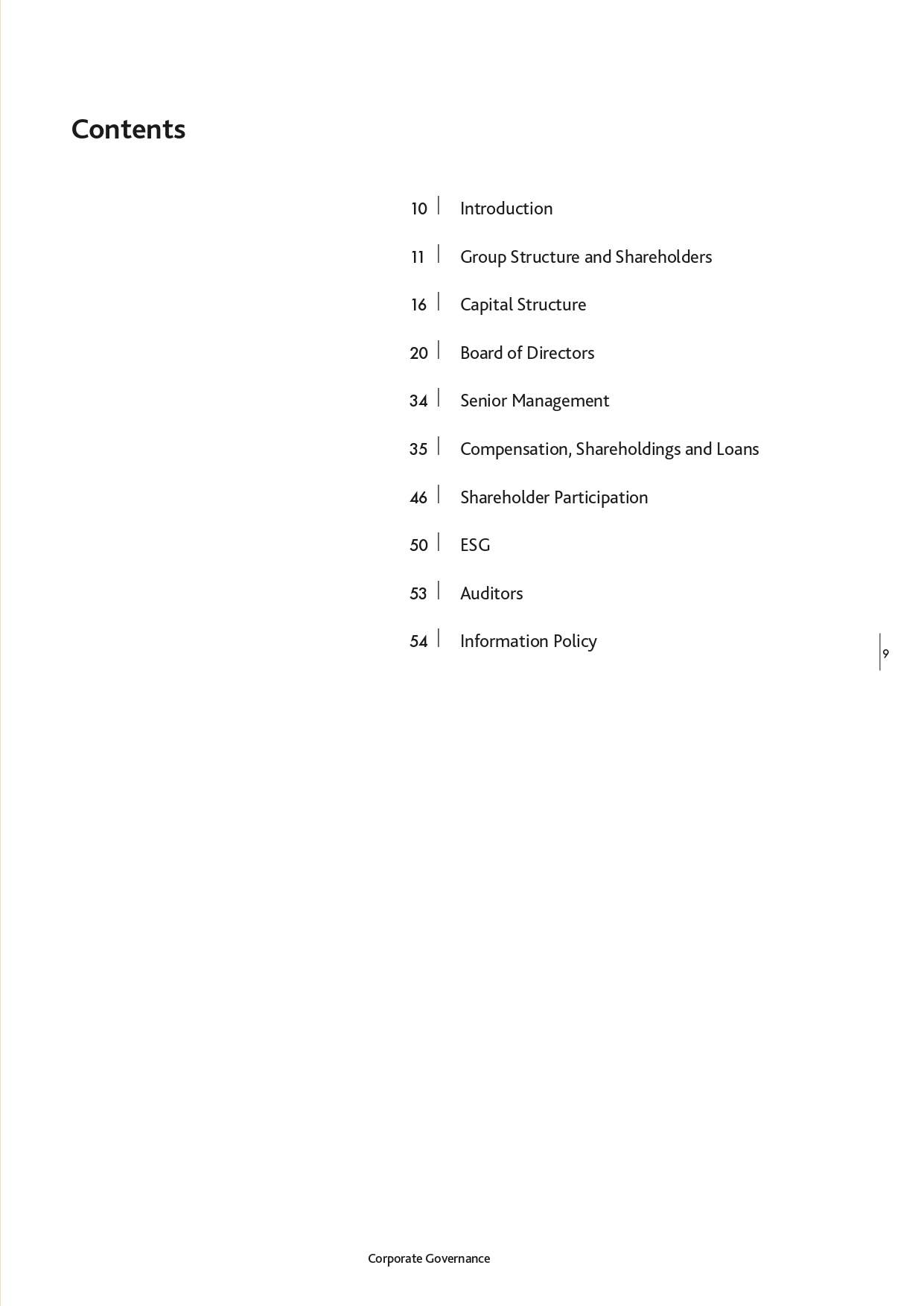
Contents 10 | Introduction 11 | Group Structure and Shareholders 16 | Capital Structure 20 | Board of Directors 34 | Senior Management 35 |
Compensation, Shareholdings and Loans 46 | Shareholder Participation 50 | ESG 53 | Auditors 54 | Information Policy Corporate Governance 9
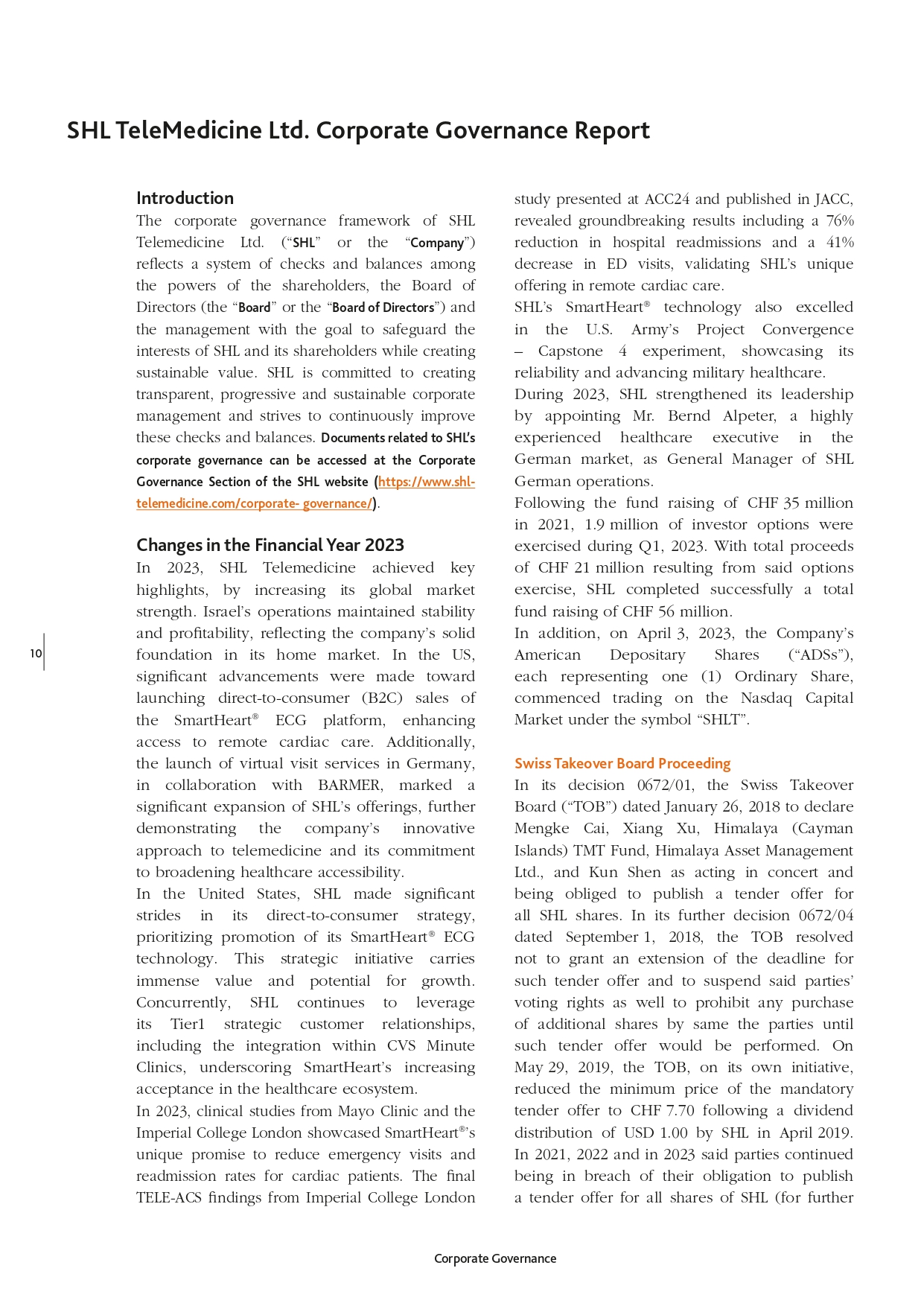
SHL TeleMedicine Ltd. Corporate Governance Report Introduction The corporate governance framework of SHL Telemedicine Ltd. (“SHL” or the
“Company”) reflects a system of checks and balances among the powers of the shareholders, the Board of Directors (the “Board” or the “Board of Directors”) and the management with the goal to safeguard the interests of SHL and its shareholders while
creating sustainable value. SHL is committed to creating transparent, progressive and sustainable corporate management and strives to continuously improve these checks and balances. Documents related to SHL’s corporate governance can be accessed at
the Corporate Governance Section of the SHL website (https://www.shltelemedicine.com/corporate- governance/). Changes in the Financial Year 2023 10 In 2023, SHL Telemedicine achieved key highlights, by increasing its global market strength. Israel’s
operations maintained stability and profitability, reflecting the company’s solid foundation in its home market. In the US, significant advancements were made toward launching direct-to-consumer (B2C) sales of the SmartHeart® ECG platform, enhancing
access to remote cardiac care. Additionally, the launch of virtual visit services in Germany, in collaboration with BARMER, marked a significant expansion of SHL’s offerings, further demonstrating the company’s innovative approach to telemedicine and
its commitment to broadening healthcare accessibility. In the United States, SHL made significant strides in its direct-to-consumer strategy, prioritizing promotion of its SmartHeart® ECG technology. This strategic initiative carries immense value
and potential for growth. Concurrently, SHL continues to leverage its Tier1 strategic customer relationships, including the integration within CVS Minute Clinics, underscoring SmartHeart’s increasing acceptance in the healthcare ecosystem. In 2023,
clinical studies from Mayo Clinic and the Imperial College London showcased SmartHeart®’s unique promise to reduce emergency visits and readmission rates for cardiac patients. The final TELE-ACS findings from Imperial College London study presented
at ACC24 and published in JACC, revealed groundbreaking results including a 76% reduction in hospital readmissions and a 41% decrease in ED visits, validating SHL’s unique offering in remote cardiac care. SHL’s SmartHeart® technology also excelled in
the U.S. Army’s Project Convergence – Capstone 4 experiment, showcasing its reliability and advancing military healthcare. During 2023, SHL strengthened its leadership by appointing Mr. Bernd Alpeter, a highly experienced healthcare executive in the
German market, as General Manager of SHL German operations. Following the fund raising of CHF 35 million in 2021, 1.9 million of investor options were exercised during Q1, 2023. With total proceeds of CHF 21 million resulting from said options
exercise, SHL completed successfully a total fund raising of CHF 56 million. In addition, on April 3, 2023, the Company’s American Depositary Shares (“ADSs”), each representing one (1) Ordinary Share, commenced trading on the Nasdaq Capital Market
under the symbol “SHLT”. Swiss Takeover Board Proceeding In its decision 0672/01, the Swiss Takeover Board (“TOB”) dated January 26, 2018 to declare Mengke Cai, Xiang Xu, Himalaya (Cayman Islands) TMT Fund, Himalaya Asset Management Ltd., and Kun
Shen as acting in concert and being obliged to publish a tender offer for all SHL shares. In its further decision 0672/04 dated September 1, 2018, the TOB resolved not to grant an extension of the deadline for such tender offer and to suspend said
parties’ voting rights as well to prohibit any purchase of additional shares by same the parties until such tender offer would be performed. On May 29, 2019, the TOB, on its own initiative, reduced the minimum price of the mandatory tender offer to
CHF 7.70 following a dividend distribution of USD 1.00 by SHL in April 2019. In 2021, 2022 and in 2023 said parties continued being in breach of their obligation to publish a tender offer for all shares of SHL (for further Corporate Governance
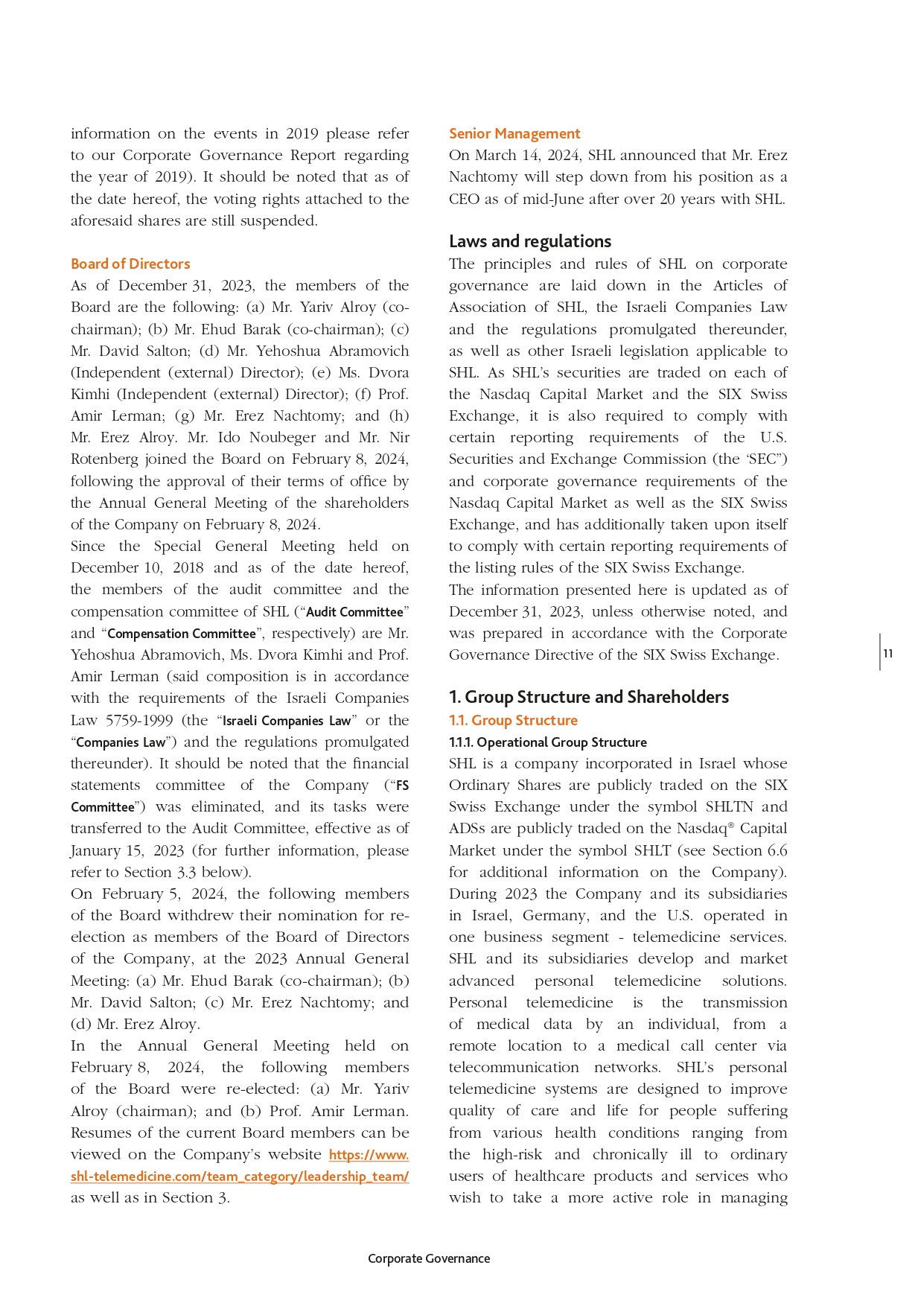
information on the events in 2019 please refer to our Corporate Governance Report regarding the year of 2019). It should be noted that as of the
date hereof, the voting rights attached to the aforesaid shares are still suspended. Senior Management On March 14, 2024, SHL announced that Mr. Erez Nachtomy will step down from his position as a CEO as of mid-June after over 20 years with SHL. Laws
and regulations Board of Directors As of December 31, 2023, the members of the Board are the following: (a) Mr. Yariv Alroy (cochairman); (b) Mr. Ehud Barak (co-chairman); (c) Mr. David Salton; (d) Mr. Yehoshua Abramovich (Independent (external)
Director); (e) Ms. Dvora Kimhi (Independent (external) Director); (f) Prof. Amir Lerman; (g) Mr. Erez Nachtomy; and (h) Mr. Erez Alroy. Mr. Ido Noubeger and Mr. Nir Rotenberg joined the Board on February 8, 2024, following the approval of their terms
of office by the Annual General Meeting of the shareholders of the Company on February 8, 2024. Since the Special General Meeting held on December 10, 2018 and as of the date hereof, the members of the audit committee and the compensation committee
of SHL (“Audit Committee” and “Compensation Committee”, respectively) are Mr. Yehoshua Abramovich, Ms. Dvora Kimhi and Prof. Amir Lerman (said composition is in accordance with the requirements of the Israeli Companies Law 5759-1999 (the “Israeli
Companies Law” or the “Companies Law”) and the regulations promulgated thereunder). It should be noted that the financial statements committee of the Company (“FS Committee”) was eliminated, and its tasks were transferred to the Audit Committee,
effective as of January 15, 2023 (for further information, please refer to Section 3.3 below). On February 5, 2024, the following members of the Board withdrew their nomination for reelection as members of the Board of Directors of the Company, at
the 2023 Annual General Meeting: (a) Mr. Ehud Barak (co-chairman); (b) Mr. David Salton; (c) Mr. Erez Nachtomy; and (d) Mr. Erez Alroy. In the Annual General Meeting held on February 8, 2024, the following members of the Board were re-elected: (a)
Mr. Yariv Alroy (chairman); and (b) Prof. Amir Lerman. Resumes of the current Board members can be viewed on the Company’s website https://www. shl-telemedicine.com/team_category/leadership_team/ as well as in Section 3. The principles and rules of
SHL on corporate governance are laid down in the Articles of Association of SHL, the Israeli Companies Law and the regulations promulgated thereunder, as well as other Israeli legislation applicable to SHL. As SHL’s securities are traded on each of
the Nasdaq Capital Market and the SIX Swiss Exchange, it is also required to comply with certain reporting requirements of the U.S. Securities and Exchange Commission (the ‘SEC”) and corporate governance requirements of the Nasdaq Capital Market as
well as the SIX Swiss Exchange, and has additionally taken upon itself to comply with certain reporting requirements of the listing rules of the SIX Swiss Exchange. The information presented here is updated as of December 31, 2023, unless otherwise
noted, and was prepared in accordance with the Corporate Governance Directive of the SIX Swiss Exchange. 1. Group Structure and Shareholders 1.1. Group Structure 1.1.1. Operational Group Structure SHL is a company incorporated in Israel whose
Ordinary Shares are publicly traded on the SIX Swiss Exchange under the symbol SHLTN and ADSs are publicly traded on the Nasdaq® Capital Market under the symbol SHLT (see Section 6.6 for additional information on the Company). During 2023 the Company
and its subsidiaries in Israel, Germany, and the U.S. operated in one business segment - telemedicine services. SHL and its subsidiaries develop and market advanced personal telemedicine solutions. Personal telemedicine is the transmission of medical
data by an individual, from a remote location to a medical call center via telecommunication networks. SHL’s personal telemedicine systems are designed to improve quality of care and life for people suffering from various health conditions ranging
from the high-risk and chronically ill to ordinary users of healthcare products and services who wish to take a more active role in managing Corporate Governance 11
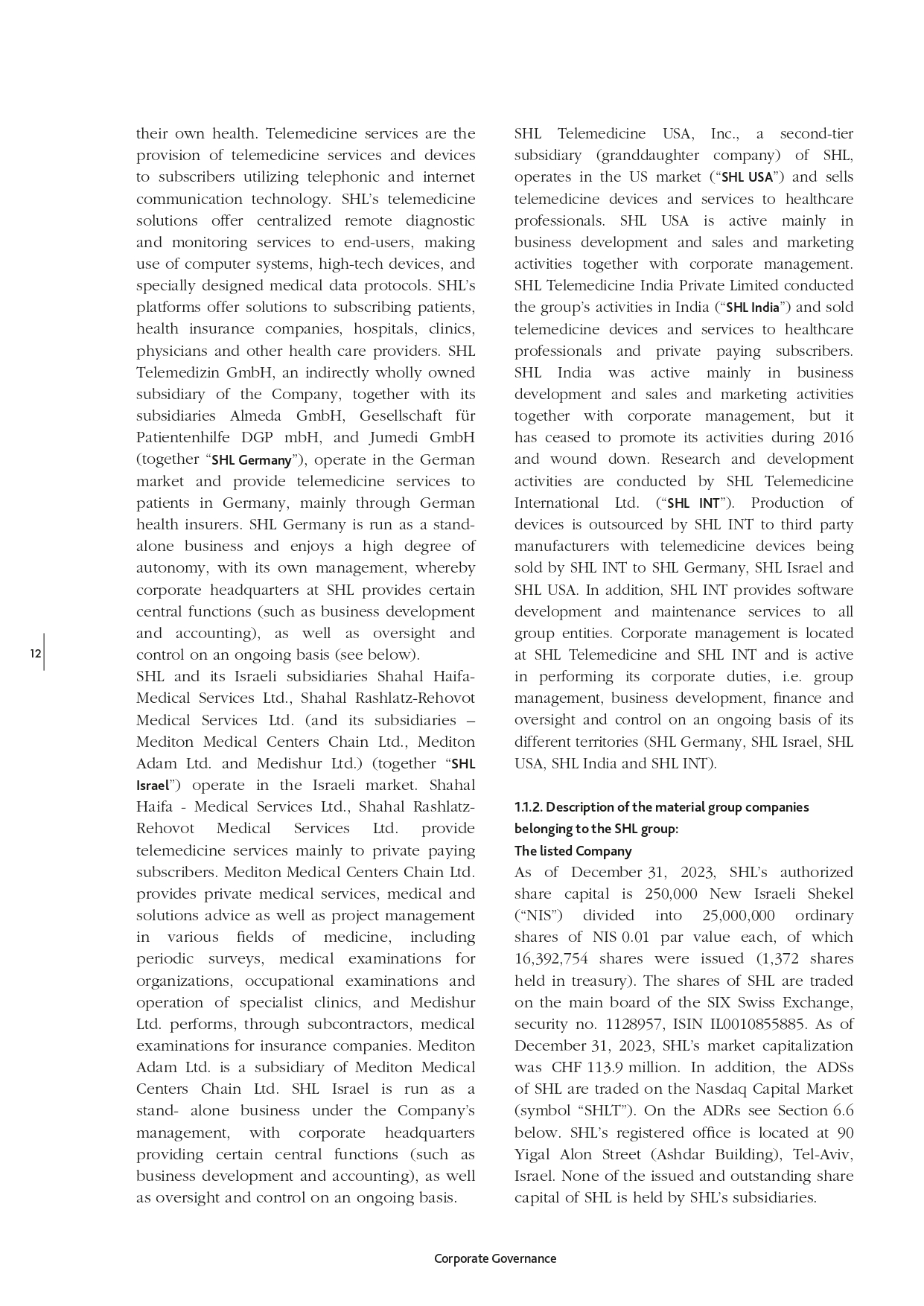
12 their own health. Telemedicine services are the provision of telemedicine services and devices to subscribers utilizing telephonic and
internet communication technology. SHL’s telemedicine solutions offer centralized remote diagnostic and monitoring services to end-users, making use of computer systems, high-tech devices, and specially designed medical data protocols. SHL’s
platforms offer solutions to subscribing patients, health insurance companies, hospitals, clinics, physicians and other health care providers. SHL Telemedizin GmbH, an indirectly wholly owned subsidiary of the Company, together with its subsidiaries
Almeda GmbH, Gesellschaft für Patientenhilfe DGP mbH, and Jumedi GmbH (together “SHL Germany”), operate in the German market and provide telemedicine services to patients in Germany, mainly through German health insurers. SHL Germany is run as a
standalone business and enjoys a high degree of autonomy, with its own management, whereby corporate headquarters at SHL provides certain central functions (such as business development and accounting), as well as oversight and control on an ongoing
basis (see below). SHL and its Israeli subsidiaries Shahal HaifaMedical Services Ltd., Shahal Rashlatz-Rehovot Medical Services Ltd. (and its subsidiaries – Mediton Medical Centers Chain Ltd., Mediton Adam Ltd. and Medishur Ltd.) (together “SHL
Israel”) operate in the Israeli market. Shahal Haifa - Medical Services Ltd., Shahal RashlatzRehovot Medical Services Ltd. provide telemedicine services mainly to private paying subscribers. Mediton Medical Centers Chain Ltd. provides private medical
services, medical and solutions advice as well as project management in various fields of medicine, including periodic surveys, medical examinations for organizations, occupational examinations and operation of specialist clinics, and Medishur Ltd.
performs, through subcontractors, medical examinations for insurance companies. Mediton Adam Ltd. is a subsidiary of Mediton Medical Centers Chain Ltd. SHL Israel is run as a stand- alone business under the Company’s management, with corporate
headquarters providing certain central functions (such as business development and accounting), as well as oversight and control on an ongoing basis. SHL Telemedicine USA, Inc., a second-tier subsidiary (granddaughter company) of SHL, operates in the
US market (“SHL USA”) and sells telemedicine devices and services to healthcare professionals. SHL USA is active mainly in business development and sales and marketing activities together with corporate management. SHL Telemedicine India Private
Limited conducted the group’s activities in India (“SHL India”) and sold telemedicine devices and services to healthcare professionals and private paying subscribers. SHL India was active mainly in business development and sales and marketing
activities together with corporate management, but it has ceased to promote its activities during 2016 and wound down. Research and development activities are conducted by SHL Telemedicine International Ltd. (“SHL INT”). Production of devices is
outsourced by SHL INT to third party manufacturers with telemedicine devices being sold by SHL INT to SHL Germany, SHL Israel and SHL USA. In addition, SHL INT provides software development and maintenance services to all group entities. Corporate
management is located at SHL Telemedicine and SHL INT and is active in performing its corporate duties, i.e. group management, business development, finance and oversight and control on an ongoing basis of its different territories (SHL Germany, SHL
Israel, SHL USA, SHL India and SHL INT). 1.1.2. Description of the material group companies belonging to the SHL group: The listed Company As of December 31, 2023, SHL’s authorized share capital is 250,000 New Israeli Shekel (“NIS”) divided into
25,000,000 ordinary shares of NIS 0.01 par value each, of which 16,392,754 shares were issued (1,372 shares held in treasury). The shares of SHL are traded on the main board of the SIX Swiss Exchange, security no. 1128957, ISIN IL0010855885. As of
December 31, 2023, SHL’s market capitalization was CHF 113.9 million. In addition, the ADSs of SHL are traded on the Nasdaq Capital Market (symbol “SHLT”). On the ADRs see Section 6.6 below. SHL’s registered office is located at 90 Yigal Alon Street
(Ashdar Building), Tel-Aviv, Israel. None of the issued and outstanding share capital of SHL is held by SHL’s subsidiaries. Corporate Governance
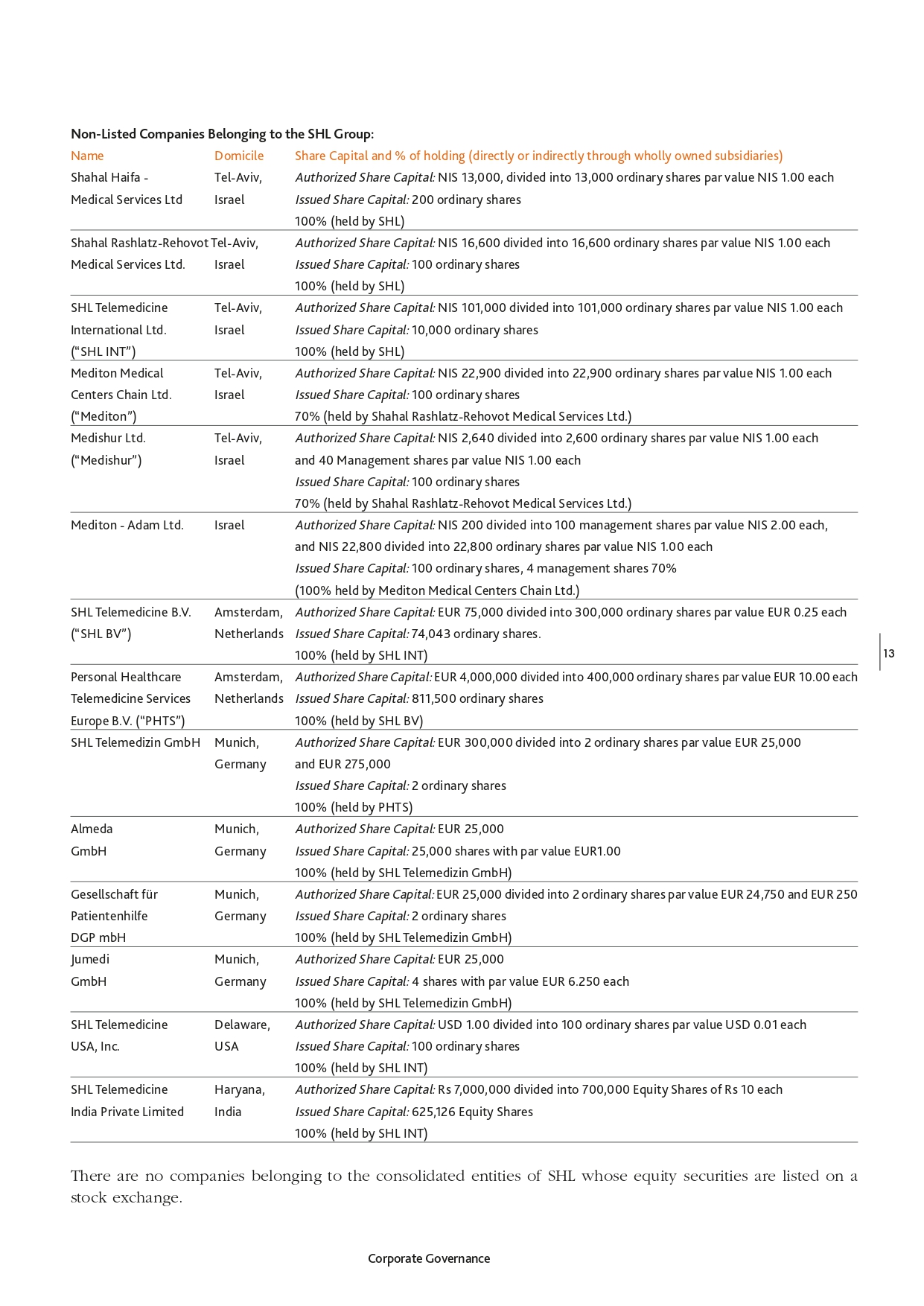
Non-Listed Companies Belonging to the SHL Group: Name Domicile Share Capital and % of holding (directly or indirectly through wholly owned
subsidiaries) Shahal Haifa - Tel-Aviv, Authorized Share Capital: NIS 13,000, divided into 13,000 ordinary shares par value NIS 1.00 each Medical Services Ltd Israel Issued Share Capital: 200 ordinary shares 100% (held by SHL) Shahal Rashlatz-Rehovot
Tel-Aviv, Authorized Share Capital: NIS 16,600 divided into 16,600 ordinary shares par value NIS 1.00 each Medical Services Ltd. Israel Issued Share Capital: 100 ordinary shares 100% (held by SHL) SHL Telemedicine Tel-Aviv, Authorized Share Capital:
NIS 101,000 divided into 101,000 ordinary shares par value NIS 1.00 each International Ltd. Israel Issued Share Capital: 10,000 ordinary shares (“SHL INT”) 100% (held by SHL) Mediton Medical Tel-Aviv, Authorized Share Capital: NIS 22,900 divided into
22,900 ordinary shares par value NIS 1.00 each Centers Chain Ltd. Israel (“Mediton”) Issued Share Capital: 100 ordinary shares 70% (held by Shahal Rashlatz-Rehovot Medical Services Ltd.) Medishur Ltd. Tel-Aviv, Authorized Share Capital: NIS 2,640
divided into 2,600 ordinary shares par value NIS 1.00 each (“Medishur”) Israel and 40 Management shares par value NIS 1.00 each Issued Share Capital: 100 ordinary shares Mediton - Adam Ltd. Israel 70% (held by Shahal Rashlatz-Rehovot Medical Services
Ltd.) Authorized Share Capital: NIS 200 divided into 100 management shares par value NIS 2.00 each, and NIS 22,800 divided into 22,800 ordinary shares par value NIS 1.00 each Issued Share Capital: 100 ordinary shares, 4 management shares 70% (100%
held by Mediton Medical Centers Chain Ltd.) SHL Telemedicine B.V. Amsterdam, Authorized Share Capital: EUR 75,000 divided into 300,000 ordinary shares par value EUR 0.25 each (“SHL BV”) Netherlands Issued Share Capital: 74,043 ordinary shares. 100%
(held by SHL INT) Personal Healthcare Amsterdam, Authorized Share Capital: EUR 4,000,000 divided into 400,000 ordinary shares par value EUR 10.00 each Telemedicine Services Netherlands Issued Share Capital: 811,500 ordinary shares Europe B.V.
(“PHTS”) SHL Telemedizin GmbH 100% (held by SHL BV) Munich, Authorized Share Capital: EUR 300,000 divided into 2 ordinary shares par value EUR 25,000 Germany and EUR 275,000 Issued Share Capital: 2 ordinary shares 100% (held by PHTS) Almeda Munich,
Authorized Share Capital: EUR 25,000 GmbH Germany Issued Share Capital: 25,000 shares with par value EUR1.00 100% (held by SHL Telemedizin GmbH) Gesellschaft für Munich, Authorized Share Capital: EUR 25,000 divided into 2 ordinary shares par value
EUR 24,750 and EUR 250 Patientenhilfe Germany Issued Share Capital: 2 ordinary shares DGP mbH 100% (held by SHL Telemedizin GmbH) Jumedi Munich, Authorized Share Capital: EUR 25,000 GmbH Germany Issued Share Capital: 4 shares with par value EUR 6.250
each 100% (held by SHL Telemedizin GmbH) SHL Telemedicine Delaware, Authorized Share Capital: USD 1.00 divided into 100 ordinary shares par value USD 0.01 each USA, Inc. USA Issued Share Capital: 100 ordinary shares 100% (held by SHL INT) SHL
Telemedicine Haryana, Authorized Share Capital: Rs 7,000,000 divided into 700,000 Equity Shares of Rs 10 each India Private Limited India Issued Share Capital: 625,126 Equity Shares 100% (held by SHL INT) There are no companies belonging to the
consolidated entities of SHL whose equity securities are listed on a stock exchange. Corporate Governance 13
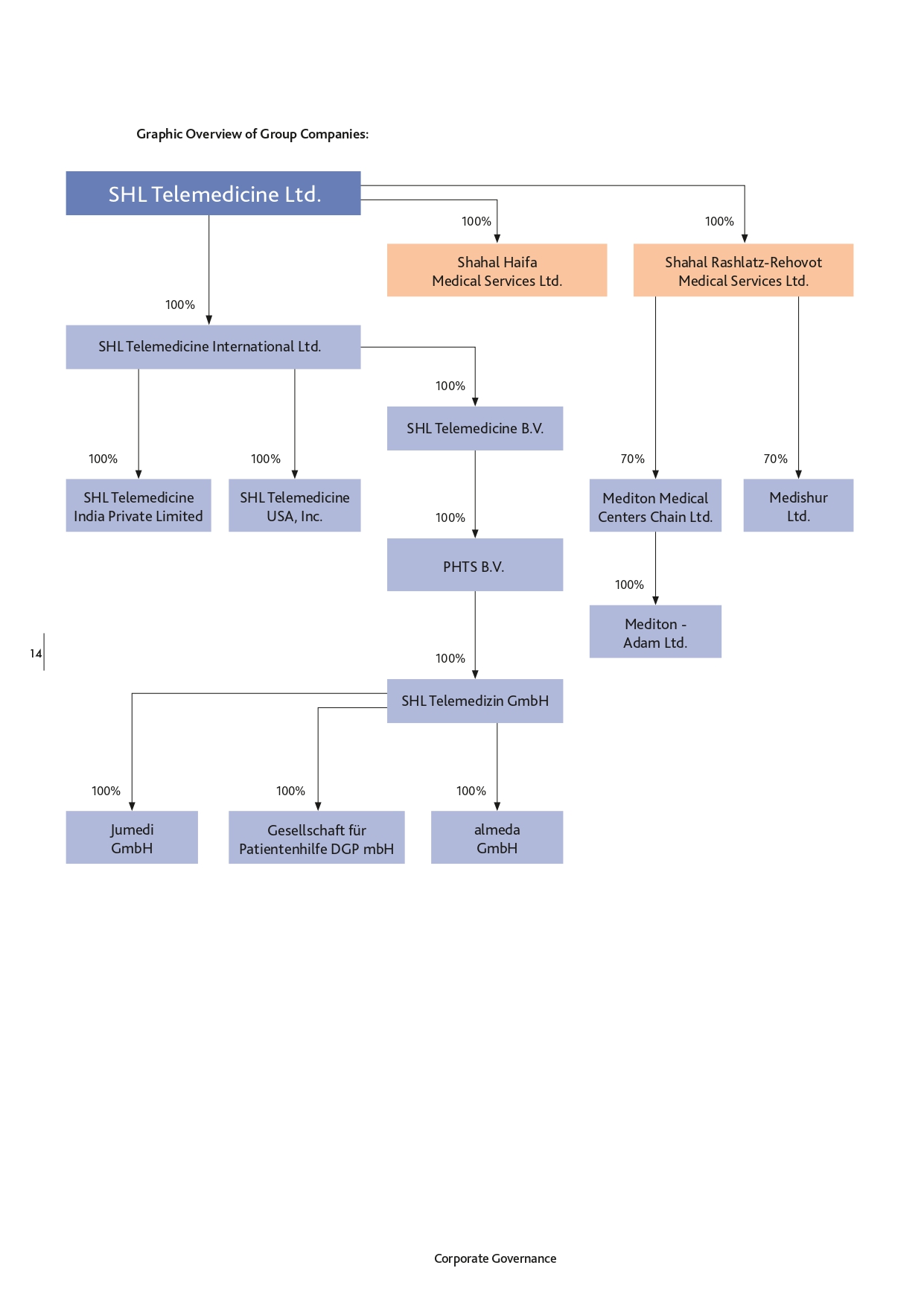
Graphic Overview of Group Companies: SHL Telemedicine Ltd. 100% 100% Shahal Haifa Medical Services Ltd. Shahal Rashlatz-Rehovot Medical Services
Ltd. 100% SHL Telemedicine International Ltd. 100% SHL Telemedicine B.V. 100% SHL Telemedicine India Private Limited 100% SHL Telemedicine USA, Inc. 70% Mediton Medical Centers Chain Ltd. 100% PHTS B.V. 100% 14 Mediton Adam Ltd. 100% SHL Telemedizin
GmbH 100% Jumedi GmbH 100% Gesellschaft für Patientenhilfe DGP mbH 100% almeda GmbH Corporate Governance 70% Medishur Ltd.
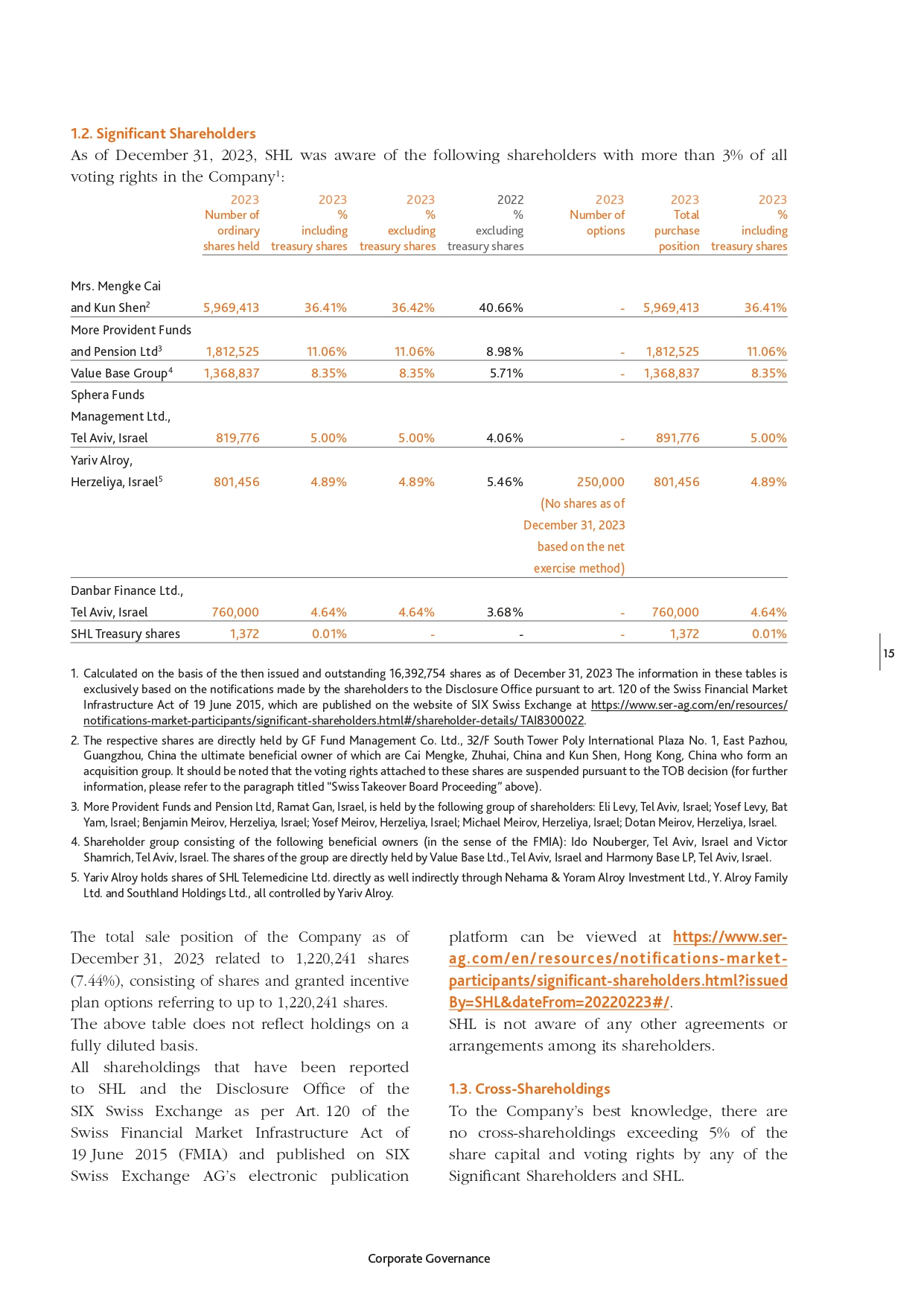
1.2. Significant Shareholders As of December 31, 2023, SHL was aware of the following shareholders with more than 3% of all voting rights in the
Company1: 2023 2023 2023 2022 Number of % % % ordinary including excluding excluding shares held treasury shares treasury shares treasury shares 2023 Number of options 2023 2023 Total % purchase including position treasury shares Mrs. Mengke Cai
5,969,413 36.41% 36.42% 40.66% and Pension Ltd3 1,812,525 11.06% 11.06% 8.98% Value Base Group4 1,368,837 8.35% 8.35% 5.71% 819,776 5.00% 5.00% 4.06% 801,456 4.89% 4.89% 5.46% and Kun Shen2 - 5,969,413 36.41% - 1,812,525 11.06% - 1,368,837 8.35% -
891,776 5.00% 250,000 801,456 4.89% More Provident Funds Sphera Funds Management Ltd., Tel Aviv, Israel Yariv Alroy, Herzeliya, Israel5 (No shares as of December 31, 2023 based on the net exercise method) Danbar Finance Ltd., Tel Aviv, Israel SHL
Treasury shares 760,000 4.64% 4.64% 3.68% - 760,000 4.64% 1,372 0.01% - - - 1,372 0.01% 15 1. Calculated on the basis of the then issued and outstanding 16,392,754 shares as of December 31, 2023 The information in these tables is exclusively based on
the notifications made by the shareholders to the Disclosure Office pursuant to art. 120 of the Swiss Financial Market Infrastructure Act of 19 June 2015, which are published on the website of SIX Swiss Exchange at
https://www.ser-ag.com/en/resources/ notifications-market-participants/significant-shareholders.html#/shareholder-details/ TAI8300022. 2. The respective shares are directly held by GF Fund Management Co. Ltd., 32/F South Tower Poly International
Plaza No. 1, East Pazhou, Guangzhou, China the ultimate beneficial owner of which are Cai Mengke, Zhuhai, China and Kun Shen, Hong Kong, China who form an acquisition group. It should be noted that the voting rights attached to these shares are
suspended pursuant to the TOB decision (for further information, please refer to the paragraph titled “Swiss Takeover Board Proceeding” above). 3. More Provident Funds and Pension Ltd, Ramat Gan, Israel, is held by the following group of
shareholders: Eli Levy, Tel Aviv, Israel; Yosef Levy, Bat Yam, Israel; Benjamin Meirov, Herzeliya, Israel; Yosef Meirov, Herzeliya, Israel; Michael Meirov, Herzeliya, Israel; Dotan Meirov, Herzeliya, Israel. 4. Shareholder group consisting of the
following beneficial owners (in the sense of the FMIA): Ido Nouberger, Tel Aviv, Israel and Victor Shamrich, Tel Aviv, Israel. The shares of the group are directly held by Value Base Ltd., Tel Aviv, Israel and Harmony Base LP, Tel Aviv, Israel. 5.
Yariv Alroy holds shares of SHL Telemedicine Ltd. directly as well indirectly through Nehama & Yoram Alroy Investment Ltd., Y. Alroy Family Ltd. and Southland Holdings Ltd., all controlled by Yariv Alroy. The total sale position of the Company as
of December 31, 2023 related to 1,220,241 shares (7.44%), consisting of shares and granted incentive plan options referring to up to 1,220,241 shares. The above table does not reflect holdings on a fully diluted basis. All shareholdings that have
been reported to SHL and the Disclosure Office of the SIX Swiss Exchange as per Art. 120 of the Swiss Financial Market Infrastructure Act of 19 June 2015 (FMIA) and published on SIX Swiss Exchange AG’s electronic publication platform can be viewed at
https://www.serag.com/en/resources/notifications-marketparticipants/significant-shareholders.html?issued By=SHL&dateFrom=20220223#/. SHL is not aware of any other agreements or arrangements among its shareholders. 1.3. Cross-Shareholdings To the
Company’s best knowledge, there are no cross-shareholdings exceeding 5% of the share capital and voting rights by any of the Significant Shareholders and SHL. Corporate Governance

2. Capital Structure 2.1. Capital on the Disclosure Deadline Authorized share capital as of December 31, 2023 Number of Ordinary Shares Par
value Share capital 25,000,000 NIS 0.01 each NIS 250,000 Issued and outstanding share capital as of December 31, 2023 Number of Ordinary Shares * 16,391,382 Par value NIS 0.01 each Share capital NIS 16,391.38 * Excluding 1,372 Ordinary Shares held by
SHL. For additional information regarding the implications of the purchase by a company of its own shares, see Section 2.4.1 “The Ordinary Shares, Voting Rights”. 2.2. Authorized Capital, Issued Capital and Options General 16 Under Israeli law, a
company’s authorized share capital represents the maximum number of shares which is authorized for issuance by the company. As of the date hereof, SHL’s authorized share capital is comprised of NIS 250,000 divided into 25,000,000 ordinary shares of
NIS 0.01 par value each (the “Ordinary Shares”). The issued and outstanding share capital of SHL, as of December 31, 2023, was NIS 163,913.82, divided into 16,391,382 fully paid issued ordinary shares (excluding 1,372 Ordinary Shares held by SHL).
Any increase in the authorized share capital is valid as of the date of the approval thereof by the shareholders (with respect to special majority requirements, please refer to Section 6.2 below). Authorized share capital, or any increase thereof is
not limited in time. However, the shareholders may, at the General Meeting, cancel authorized but not yet issued share capital, provided that the Company did not undertake to issue shares out of such authorized but unissued share capital. Pursuant to
SHL’s Articles of Association, the unissued shares are under the sole control of the Board of Directors of SHL who has the authority to allot or otherwise dispose of them on such terms and conditions as it may see fit. Generally, any such issuance of
shares is valid as of the date of the approval thereof by the Board of Directors. Under the 2021 Share Incentive Plan (as such term is hereinafter defined) the maximum number of options in SHL’s pool is up to 4,077,346 Ordinary Shares (subject to
adjustments as set forth in the 2021 Share Incentive Plan) reserved for issuance upon exercise of options that may be granted. As of the date hereof, the pool is 4,077,346, out of which 1,920,500 options are available for grant. For additional
information with respect to the share incentive plan adopted by SHL and the grant of options to purchase Ordinary Shares, see the following Section “2021 Share Incentive Plan”. The same provisions apply to RSUs (as defined below) granted by SHL under
the 2021 Share Incentive Plan, mutatis mutandis. In the framework of the Private Placement (as hereinafter defined), SHL undertook to grant 800,000 First Closing Options and 1,144,444 Second Closing Options to be exercised within 24 months of the
First Capital Increase (i.e. by 20 January 2023) or the Second Capital Increase (i.e. by 16 February 2023), respectively. As of December 31, 2023, 1,914,478 options were exercised and 29,967 options were forfeited. (as such terms are defined in the
following Section 2.3 “Changes in Capital Structure within the Last Three Financial Years”). 2021 Share Incentive Plan Key employees have been granted share options under the SHL’s 2021 Executive and Key Employee Israeli Share Incentive Plan
(formerly the “2005 Option Plan” and the “2015 Executive and Key Employee Israeli Share Option Plan”) (the “2021 Share Incentive Plan”). The plan is in effect until terminated by the Board. Pursuant to the 2021 Share Incentive Plan, equity
compensation, such as options or restricted share units (rights to receive shares of the Company under certain terms and conditions, for a consideration of no more than the underlying shares’ nominal value) (“RSUs”), may be granted to executives,
directors (whether executive or non-executive) and key employees of the Company or its subsidiaries, whereby the Board of Directors has full discretion to determine the specific grantees from time to time. The maximum number of Ordinary Shares which
may be issued under the 2021 Share Incentive Plan and under any other existing or future share Corporate Governance
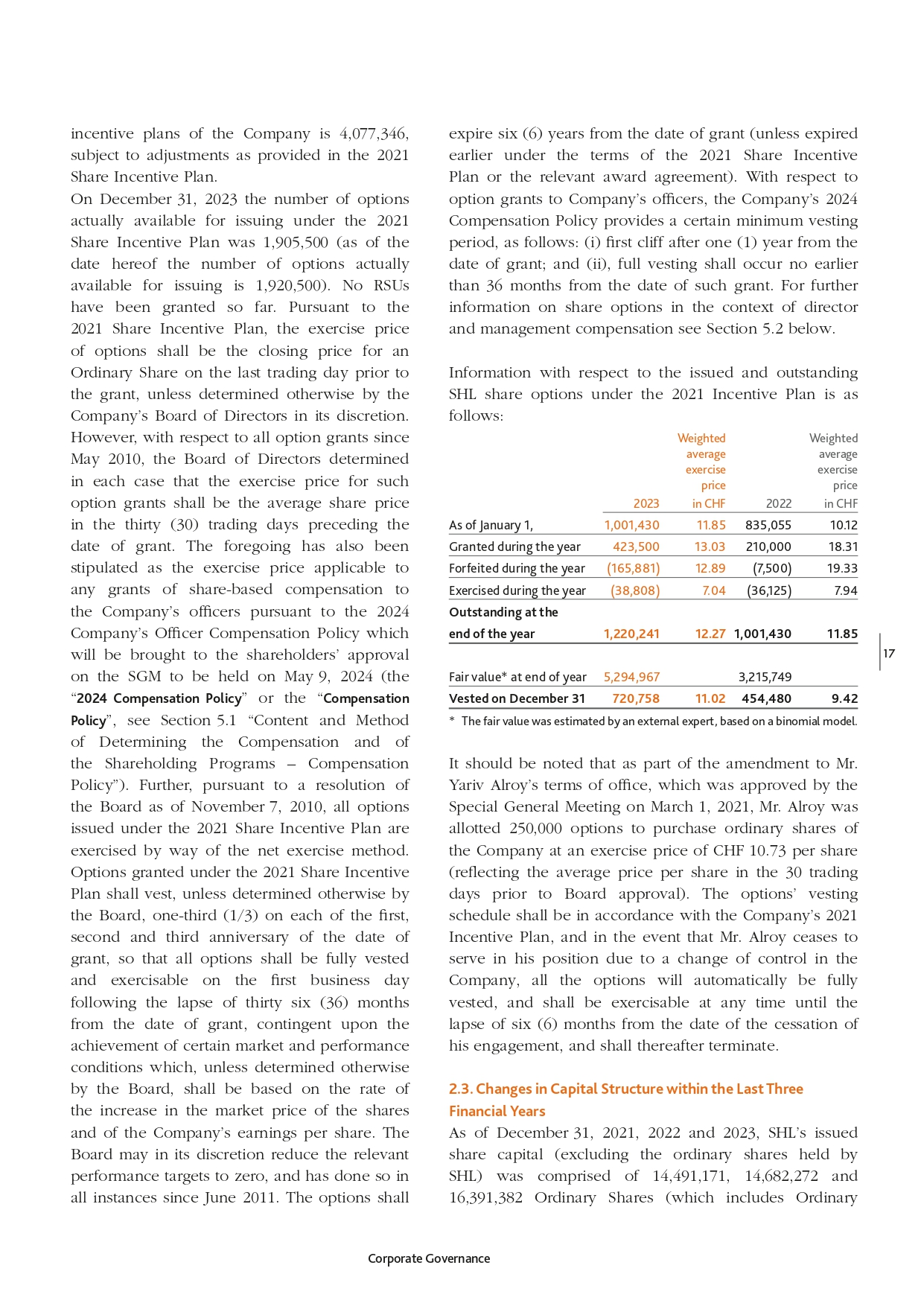
incentive plans of the Company is 4,077,346, subject to adjustments as provided in the 2021 Share Incentive Plan. On December 31, 2023 the
number of options actually available for issuing under the 2021 Share Incentive Plan was 1,905,500 (as of the date hereof the number of options actually available for issuing is 1,920,500). No RSUs have been granted so far. Pursuant to the 2021 Share
Incentive Plan, the exercise price of options shall be the closing price for an Ordinary Share on the last trading day prior to the grant, unless determined otherwise by the Company’s Board of Directors in its discretion. However, with respect to all
option grants since May 2010, the Board of Directors determined in each case that the exercise price for such option grants shall be the average share price in the thirty (30) trading days preceding the date of grant. The foregoing has also been
stipulated as the exercise price applicable to any grants of share-based compensation to the Company’s officers pursuant to the 2024 Company’s Officer Compensation Policy which will be brought to the shareholders’ approval on the SGM to be held on
May 9, 2024 (the “2024 Compensation Policy” or the “Compensation Policy”, see Section 5.1 “Content and Method of Determining the Compensation and of the Shareholding Programs – Compensation Policy”). Further, pursuant to a resolution of the Board as
of November 7, 2010, all options issued under the 2021 Share Incentive Plan are exercised by way of the net exercise method. Options granted under the 2021 Share Incentive Plan shall vest, unless determined otherwise by the Board, one-third (1/3) on
each of the first, second and third anniversary of the date of grant, so that all options shall be fully vested and exercisable on the first business day following the lapse of thirty six (36) months from the date of grant, contingent upon the
achievement of certain market and performance conditions which, unless determined otherwise by the Board, shall be based on the rate of the increase in the market price of the shares and of the Company’s earnings per share. The Board may in its
discretion reduce the relevant performance targets to zero, and has done so in all instances since June 2011. The options shall expire six (6) years from the date of grant (unless expired earlier under the terms of the 2021 Share Incentive Plan or
the relevant award agreement). With respect to option grants to Company’s officers, the Company’s 2024 Compensation Policy provides a certain minimum vesting period, as follows: (i) first cliff after one (1) year from the date of grant; and (ii),
full vesting shall occur no earlier than 36 months from the date of such grant. For further information on share options in the context of director and management compensation see Section 5.2 below. Information with respect to the issued and
outstanding SHL share options under the 2021 Incentive Plan is as follows: Weighted Weighted average average exercise exercise price price 2023 in CHF 2022 in CHF As of January 1, 1,001,430 11.85 835,055 10.12 Granted during the year 423,500 13.03
210,000 18.31 Forfeited during the year (165,881) 12.89 (7,500) 19.33 Exercised during the year (38,808) 7.04 (36,125) 7.94 12.27 1,001,430 11.85 Outstanding at the end of the year 1,220,241 17 Fair value* at end of year Vested on December 31
5,294,967 3,215,749 720,758 11.02 454,480 9.42 * The fair value was estimated by an external expert, based on a binomial model. It should be noted that as part of the amendment to Mr. Yariv Alroy’s terms of office, which was approved by the Special
General Meeting on March 1, 2021, Mr. Alroy was allotted 250,000 options to purchase ordinary shares of the Company at an exercise price of CHF 10.73 per share (reflecting the average price per share in the 30 trading days prior to Board approval).
The options’ vesting schedule shall be in accordance with the Company’s 2021 Incentive Plan, and in the event that Mr. Alroy ceases to serve in his position due to a change of control in the Company, all the options will automatically be fully
vested, and shall be exercisable at any time until the lapse of six (6) months from the date of the cessation of his engagement, and shall thereafter terminate. 2.3. Changes in Capital Structure within the Last Three Financial Years As of December
31, 2021, 2022 and 2023, SHL’s issued share capital (excluding the ordinary shares held by SHL) was comprised of 14,491,171, 14,682,272 and 16,391,382 Ordinary Shares (which includes Ordinary Corporate Governance
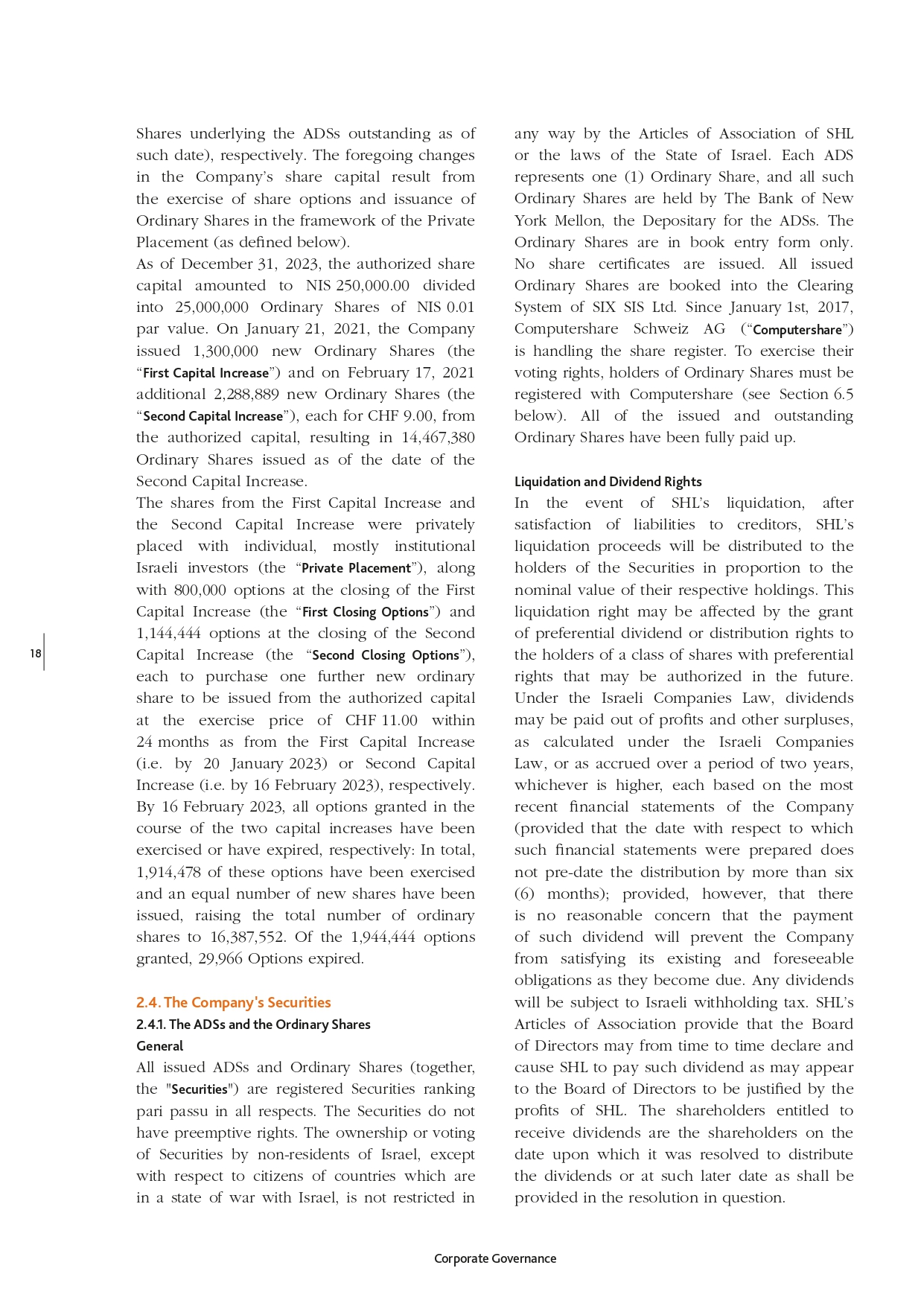
18 Shares underlying the ADSs outstanding as of such date), respectively. The foregoing changes in the Company’s share capital result from the
exercise of share options and issuance of Ordinary Shares in the framework of the Private Placement (as defined below). As of December 31, 2023, the authorized share capital amounted to NIS 250,000.00 divided into 25,000,000 Ordinary Shares of NIS
0.01 par value. On January 21, 2021, the Company issued 1,300,000 new Ordinary Shares (the “First Capital Increase”) and on February 17, 2021 additional 2,288,889 new Ordinary Shares (the “Second Capital Increase”), each for CHF 9.00, from the
authorized capital, resulting in 14,467,380 Ordinary Shares issued as of the date of the Second Capital Increase. The shares from the First Capital Increase and the Second Capital Increase were privately placed with individual, mostly institutional
Israeli investors (the “Private Placement”), along with 800,000 options at the closing of the First Capital Increase (the “First Closing Options”) and 1,144,444 options at the closing of the Second Capital Increase (the “Second Closing Options”),
each to purchase one further new ordinary share to be issued from the authorized capital at the exercise price of CHF 11.00 within 24 months as from the First Capital Increase (i.e. by 20 January 2023) or Second Capital Increase (i.e. by 16 February
2023), respectively. By 16 February 2023, all options granted in the course of the two capital increases have been exercised or have expired, respectively: In total, 1,914,478 of these options have been exercised and an equal number of new shares
have been issued, raising the total number of ordinary shares to 16,387,552. Of the 1,944,444 options granted, 29,966 Options expired. 2.4. The Company's Securities 2.4.1. The ADSs and the Ordinary Shares General All issued ADSs and Ordinary Shares
(together, the "Securities") are registered Securities ranking pari passu in all respects. The Securities do not have preemptive rights. The ownership or voting of Securities by non-residents of Israel, except with respect to citizens of countries
which are in a state of war with Israel, is not restricted in any way by the Articles of Association of SHL or the laws of the State of Israel. Each ADS represents one (1) Ordinary Share, and all such Ordinary Shares are held by The Bank of New York
Mellon, the Depositary for the ADSs. The Ordinary Shares are in book entry form only. No share certificates are issued. All issued Ordinary Shares are booked into the Clearing System of SIX SIS Ltd. Since January 1st, 2017, Computershare Schweiz AG
(“Computershare”) is handling the share register. To exercise their voting rights, holders of Ordinary Shares must be registered with Computershare (see Section 6.5 below). All of the issued and outstanding Ordinary Shares have been fully paid up.
Liquidation and Dividend Rights In the event of SHL’s liquidation, after satisfaction of liabilities to creditors, SHL’s liquidation proceeds will be distributed to the holders of the Securities in proportion to the nominal value of their respective
holdings. This liquidation right may be affected by the grant of preferential dividend or distribution rights to the holders of a class of shares with preferential rights that may be authorized in the future. Under the Israeli Companies Law,
dividends may be paid out of profits and other surpluses, as calculated under the Israeli Companies Law, or as accrued over a period of two years, whichever is higher, each based on the most recent financial statements of the Company (provided that
the date with respect to which such financial statements were prepared does not pre-date the distribution by more than six (6) months); provided, however, that there is no reasonable concern that the payment of such dividend will prevent the Company
from satisfying its existing and foreseeable obligations as they become due. Any dividends will be subject to Israeli withholding tax. SHL’s Articles of Association provide that the Board of Directors may from time to time declare and cause SHL to
pay such dividend as may appear to the Board of Directors to be justified by the profits of SHL. The shareholders entitled to receive dividends are the shareholders on the date upon which it was resolved to distribute the dividends or at such later
date as shall be provided in the resolution in question. Corporate Governance
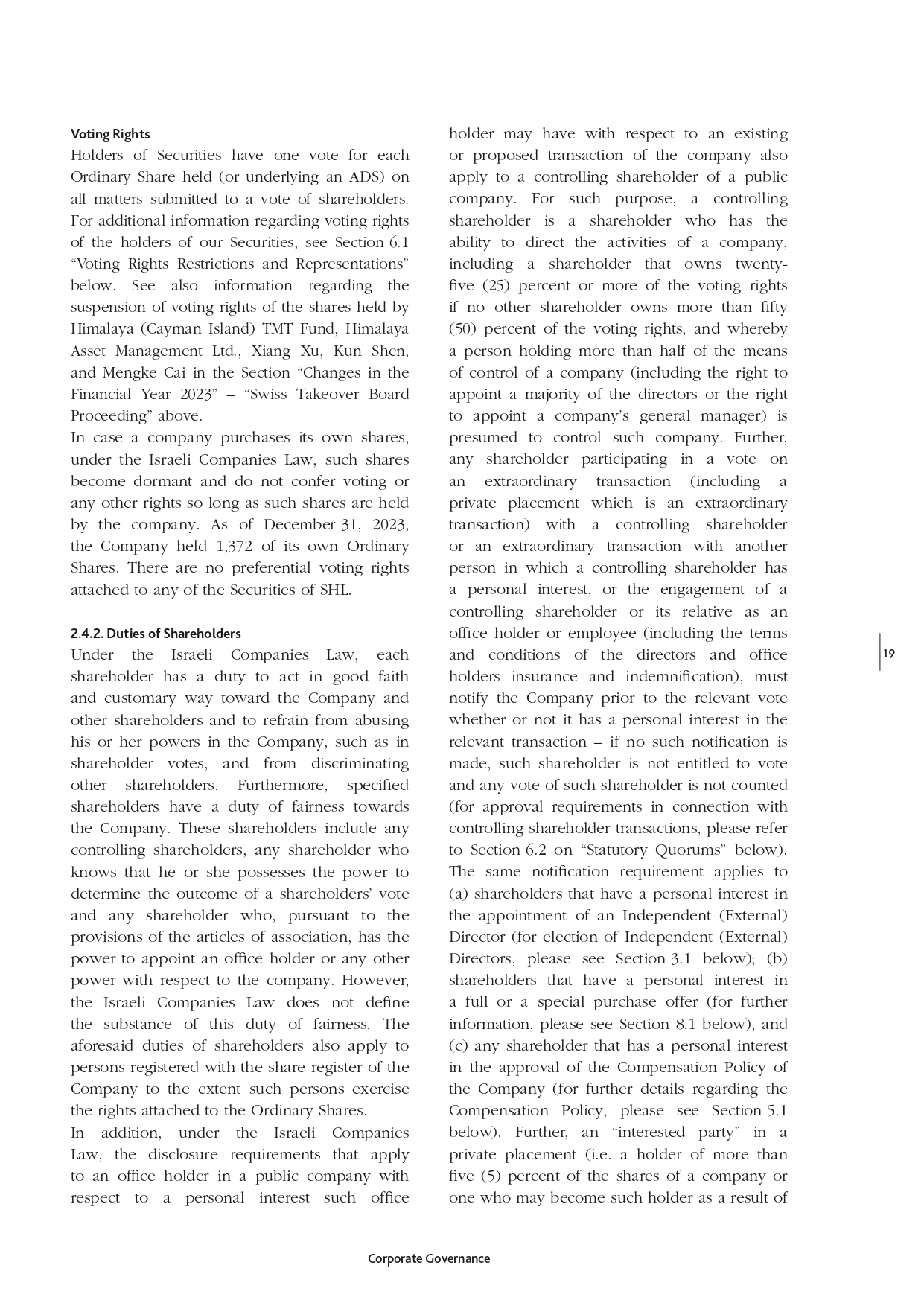
Voting Rights Holders of Securities have one vote for each Ordinary Share held (or underlying an ADS) on all matters submitted to a vote of
shareholders. For additional information regarding voting rights of the holders of our Securities, see Section 6.1 “Voting Rights Restrictions and Representations” below. See also information regarding the suspension of voting rights of the shares
held by Himalaya (Cayman Island) TMT Fund, Himalaya Asset Management Ltd., Xiang Xu, Kun Shen, and Mengke Cai in the Section “Changes in the Financial Year 2023” – “Swiss Takeover Board Proceeding” above. In case a company purchases its own shares,
under the Israeli Companies Law, such shares become dormant and do not confer voting or any other rights so long as such shares are held by the company. As of December 31, 2023, the Company held 1,372 of its own Ordinary Shares. There are no
preferential voting rights attached to any of the Securities of SHL. 2.4.2. Duties of Shareholders Under the Israeli Companies Law, each shareholder has a duty to act in good faith and customary way toward the Company and other shareholders and to
refrain from abusing his or her powers in the Company, such as in shareholder votes, and from discriminating other shareholders. Furthermore, specified shareholders have a duty of fairness towards the Company. These shareholders include any
controlling shareholders, any shareholder who knows that he or she possesses the power to determine the outcome of a shareholders’ vote and any shareholder who, pursuant to the provisions of the articles of association, has the power to appoint an
office holder or any other power with respect to the company. However, the Israeli Companies Law does not define the substance of this duty of fairness. The aforesaid duties of shareholders also apply to persons registered with the share register of
the Company to the extent such persons exercise the rights attached to the Ordinary Shares. In addition, under the Israeli Companies Law, the disclosure requirements that apply to an office holder in a public company with respect to a personal
interest such office holder may have with respect to an existing or proposed transaction of the company also apply to a controlling shareholder of a public company. For such purpose, a controlling shareholder is a shareholder who has the ability to
direct the activities of a company, including a shareholder that owns twentyfive (25) percent or more of the voting rights if no other shareholder owns more than fifty (50) percent of the voting rights, and whereby a person holding more than half of
the means of control of a company (including the right to appoint a majority of the directors or the right to appoint a company’s general manager) is presumed to control such company. Further, any shareholder participating in a vote on an
extraordinary transaction (including a private placement which is an extraordinary transaction) with a controlling shareholder or an extraordinary transaction with another person in which a controlling shareholder has a personal interest, or the
engagement of a controlling shareholder or its relative as an office holder or employee (including the terms and conditions of the directors and office holders insurance and indemnification), must notify the Company prior to the relevant vote whether
or not it has a personal interest in the relevant transaction – if no such notification is made, such shareholder is not entitled to vote and any vote of such shareholder is not counted (for approval requirements in connection with controlling
shareholder transactions, please refer to Section 6.2 on “Statutory Quorums” below). The same notification requirement applies to (a) shareholders that have a personal interest in the appointment of an Independent (External) Director (for election of
Independent (External) Directors, please see Section 3.1 below); (b) shareholders that have a personal interest in a full or a special purchase offer (for further information, please see Section 8.1 below), and (c) any shareholder that has a personal
interest in the approval of the Compensation Policy of the Company (for further details regarding the Compensation Policy, please see Section 5.1 below). Further, an “interested party” in a private placement (i.e. a holder of more than five (5)
percent of the shares of a company or one who may become such holder as a result of Corporate Governance 19
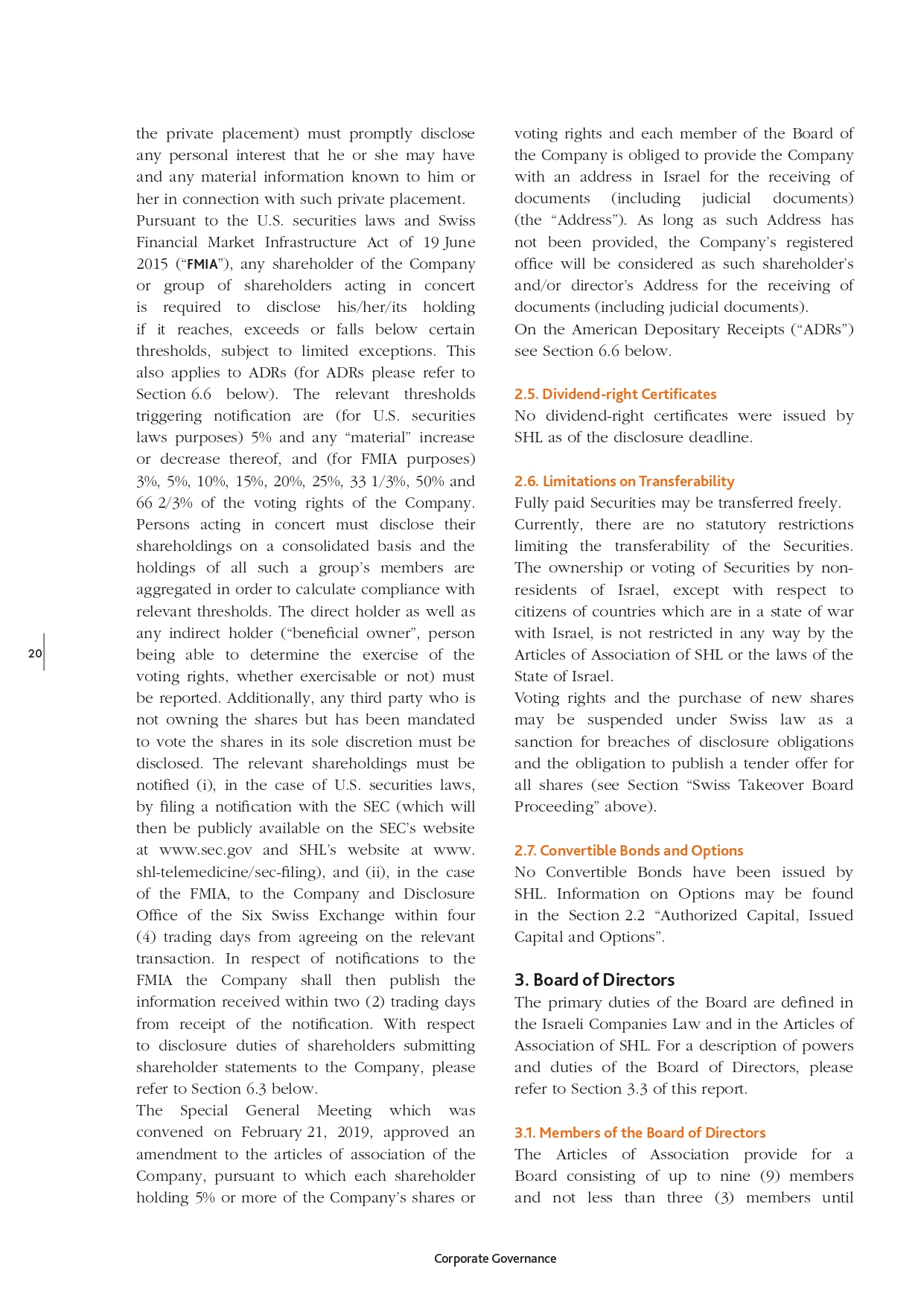
20 the private placement) must promptly disclose any personal interest that he or she may have and any material information known to him or her
in connection with such private placement. Pursuant to the U.S. securities laws and Swiss Financial Market Infrastructure Act of 19 June 2015 (“FMIA”), any shareholder of the Company or group of shareholders acting in concert is required to disclose
his/her/its holding if it reaches, exceeds or falls below certain thresholds, subject to limited exceptions. This also applies to ADRs (for ADRs please refer to Section 6.6 below). The relevant thresholds triggering notification are (for U.S.
securities laws purposes) 5% and any “material” increase or decrease thereof, and (for FMIA purposes) 3%, 5%, 10%, 15%, 20%, 25%, 33 1/3%, 50% and 66 2/3% of the voting rights of the Company. Persons acting in concert must disclose their
shareholdings on a consolidated basis and the holdings of all such a group’s members are aggregated in order to calculate compliance with relevant thresholds. The direct holder as well as any indirect holder (“beneficial owner”, person being able to
determine the exercise of the voting rights, whether exercisable or not) must be reported. Additionally, any third party who is not owning the shares but has been mandated to vote the shares in its sole discretion must be disclosed. The relevant
shareholdings must be notified (i), in the case of U.S. securities laws, by filing a notification with the SEC (which will then be publicly available on the SEC’s website at www.sec.gov and SHL’s website at www. shl-telemedicine/sec-filing), and
(ii), in the case of the FMIA, to the Company and Disclosure Office of the Six Swiss Exchange within four (4) trading days from agreeing on the relevant transaction. In respect of notifications to the FMIA the Company shall then publish the
information received within two (2) trading days from receipt of the notification. With respect to disclosure duties of shareholders submitting shareholder statements to the Company, please refer to Section 6.3 below. The Special General Meeting
which was convened on February 21, 2019, approved an amendment to the articles of association of the Company, pursuant to which each shareholder holding 5% or more of the Company’s shares or voting rights and each member of the Board of the Company
is obliged to provide the Company with an address in Israel for the receiving of documents (including judicial documents) (the “Address”). As long as such Address has not been provided, the Company’s registered office will be considered as such
shareholder’s and/or director’s Address for the receiving of documents (including judicial documents). On the American Depositary Receipts (“ADRs”) see Section 6.6 below. 2.5. Dividend-right Certificates No dividend-right certificates were issued by
SHL as of the disclosure deadline. 2.6. Limitations on Transferability Fully paid Securities may be transferred freely. Currently, there are no statutory restrictions limiting the transferability of the Securities. The ownership or voting of
Securities by nonresidents of Israel, except with respect to citizens of countries which are in a state of war with Israel, is not restricted in any way by the Articles of Association of SHL or the laws of the State of Israel. Voting rights and the
purchase of new shares may be suspended under Swiss law as a sanction for breaches of disclosure obligations and the obligation to publish a tender offer for all shares (see Section “Swiss Takeover Board Proceeding” above). 2.7. Convertible Bonds and
Options No Convertible Bonds have been issued by SHL. Information on Options may be found in the Section 2.2 “Authorized Capital, Issued Capital and Options”. 3. Board of Directors The primary duties of the Board are defined in the Israeli Companies
Law and in the Articles of Association of SHL. For a description of powers and duties of the Board of Directors, please refer to Section 3.3 of this report. 3.1. Members of the Board of Directors The Articles of Association provide for a Board
consisting of up to nine (9) members and not less than three (3) members until Corporate Governance
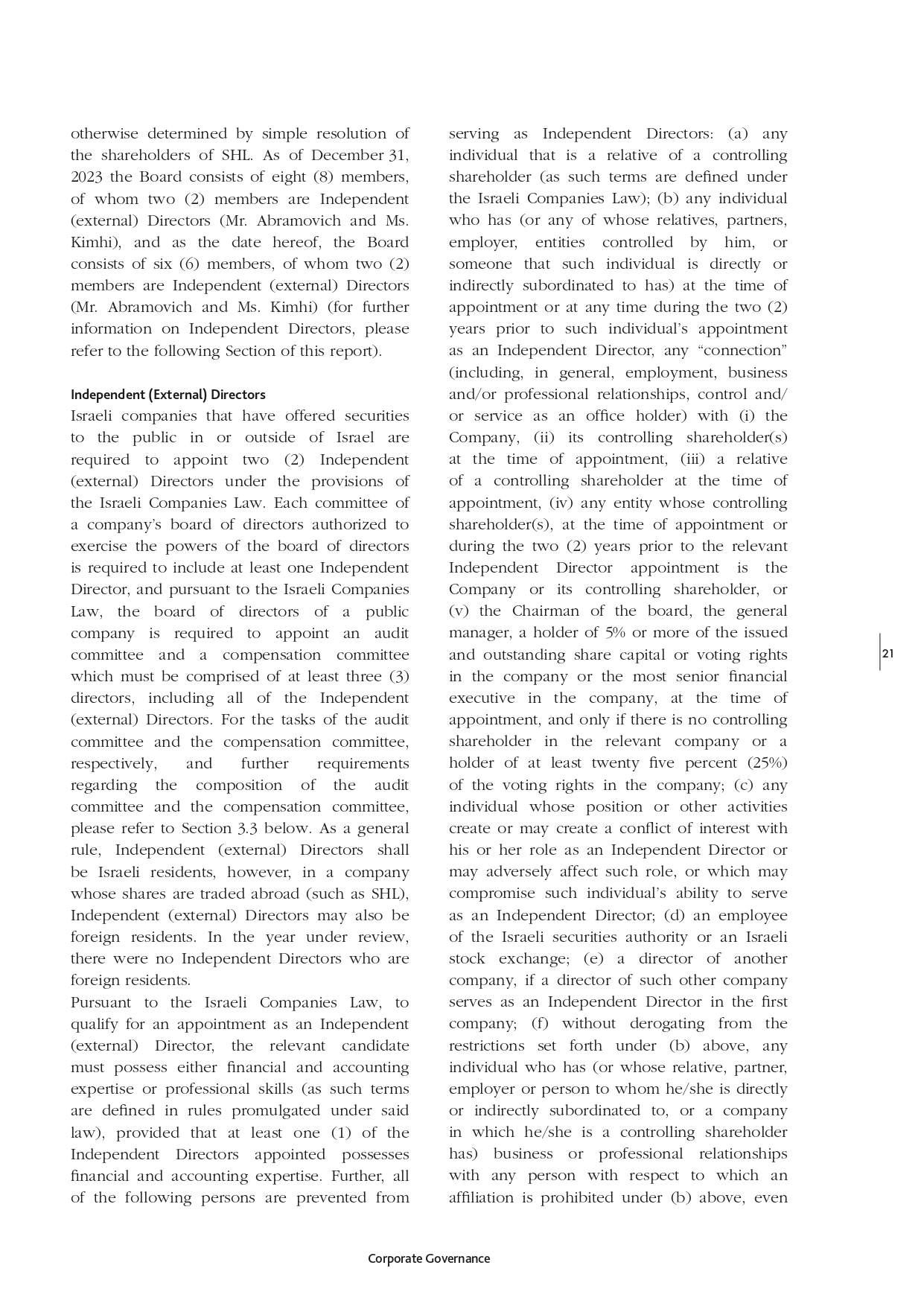
otherwise determined by simple resolution of the shareholders of SHL. As of December 31, 2023 the Board consists of eight (8) members, of whom
two (2) members are Independent (external) Directors (Mr. Abramovich and Ms. Kimhi), and as the date hereof, the Board consists of six (6) members, of whom two (2) members are Independent (external) Directors (Mr. Abramovich and Ms. Kimhi) (for
further information on Independent Directors, please refer to the following Section of this report). Independent (External) Directors Israeli companies that have offered securities to the public in or outside of Israel are required to appoint two (2)
Independent (external) Directors under the provisions of the Israeli Companies Law. Each committee of a company’s board of directors authorized to exercise the powers of the board of directors is required to include at least one Independent Director,
and pursuant to the Israeli Companies Law, the board of directors of a public company is required to appoint an audit committee and a compensation committee which must be comprised of at least three (3) directors, including all of the Independent
(external) Directors. For the tasks of the audit committee and the compensation committee, respectively, and further requirements regarding the composition of the audit committee and the compensation committee, please refer to Section 3.3 below. As a
general rule, Independent (external) Directors shall be Israeli residents, however, in a company whose shares are traded abroad (such as SHL), Independent (external) Directors may also be foreign residents. In the year under review, there were no
Independent Directors who are foreign residents. Pursuant to the Israeli Companies Law, to qualify for an appointment as an Independent (external) Director, the relevant candidate must possess either financial and accounting expertise or professional
skills (as such terms are defined in rules promulgated under said law), provided that at least one (1) of the Independent Directors appointed possesses financial and accounting expertise. Further, all of the following persons are prevented from
serving as Independent Directors: (a) any individual that is a relative of a controlling shareholder (as such terms are defined under the Israeli Companies Law); (b) any individual who has (or any of whose relatives, partners, employer, entities
controlled by him, or someone that such individual is directly or indirectly subordinated to has) at the time of appointment or at any time during the two (2) years prior to such individual’s appointment as an Independent Director, any “connection”
(including, in general, employment, business and/or professional relationships, control and/ or service as an office holder) with (i) the Company, (ii) its controlling shareholder(s) at the time of appointment, (iii) a relative of a controlling
shareholder at the time of appointment, (iv) any entity whose controlling shareholder(s), at the time of appointment or during the two (2) years prior to the relevant Independent Director appointment is the Company or its controlling shareholder, or
(v) the Chairman of the board, the general manager, a holder of 5% or more of the issued and outstanding share capital or voting rights in the company or the most senior financial executive in the company, at the time of appointment, and only if
there is no controlling shareholder in the relevant company or a holder of at least twenty five percent (25%) of the voting rights in the company; (c) any individual whose position or other activities create or may create a conflict of interest with
his or her role as an Independent Director or may adversely affect such role, or which may compromise such individual’s ability to serve as an Independent Director; (d) an employee of the Israeli securities authority or an Israeli stock exchange; (e)
a director of another company, if a director of such other company serves as an Independent Director in the first company; (f) without derogating from the restrictions set forth under (b) above, any individual who has (or whose relative, partner,
employer or person to whom he/she is directly or indirectly subordinated to, or a company in which he/she is a controlling shareholder has) business or professional relationships with any person with respect to which an affiliation is prohibited
under (b) above, even Corporate Governance 21

22 if such relationship is not an ongoing, constant relationship, and excluding relationships that are negligible; or (g) any person which in
his/ her service as an Independent Director received any compensation for his/her service beyond that authorized in accordance with applicable regulations promulgated under the Israeli Companies Law. In addition, for a period of two (2) years
following termination of the service of an Independent Director, the company in which such Independent Director served, as well as its controlling shareholder and/or any entity under such controlling shareholder’s control may not directly or
indirectly provide any benefit to such Independent Director (as well as his/ her spouse and children), including, without limitation, appointment as an officer holder, engagement as an employee or provider of professional services against
consideration, whether directly or indirectly and whether individually or through an entity controlled by such Independent Director, all with respect to the company and any entity under control of the controlling shareholder of the company. The
foregoing limitations also apply to relatives (as defined under the Israeli Companies Law) of the Independent Director who are not his/ her spouse or child, but then for a period of one (1) year from termination of service. The Independent Directors
generally must be elected by a majority vote of the shareholders, provided that (a) such majority includes a majority of shares held by shareholders who are not a controlling shareholder or who do not have a personal interest in the appointment
(except a personal interest which is not the result of a relationship with the controlling shareholder) and who are voting thereon, whereby abstaining votes will not be taken into account, or (b) the percentage of the voting rights held by
shareholders as described under and which object to the appointment is not more than two (2) percent of the voting rights of the company (the Minister of Justice may determine a different percentage; no such determination has been made to date). The
term of an Independent Director is three (3) years and may be extended by two (2) additional terms of three (3) years each. Independent Directors may be re-elected to any of the two additional terms beyond their initial three (3) year term as
aforesaid only subject to fulfillment of either of the following conditions: (a) one or more shareholders holding one percent (1%) or more of the voting rights of the company proposed such additional service period, and the appointment is approved by
the general meeting with a majority of votes subject to the following: (i) the votes of controlling shareholders or anyone who has a personal interest in the appointment (excluding a personal interest which is not the result of a relationship with
the controlling shareholder) and abstaining votes are not counted; (ii) the number of votes supporting the appointment (from among those shareholders which are not controlling shareholders or have a personal interest as aforesaid) amounts to more
than two percent (2%) of the overall voting rights in the company (the Minister of Justice may determine a different percentage; no such determination has been made to date); and (iii) such Independent (external) Director may not be (A) at the time
of appointment a Related or Competing Shareholder (as defined hereafter) or a relative thereof; or (B) a person with “connections” (as defined above) to a Related or Competing Shareholder at the time of appointment and the two (2) years prior
thereto. “Related or Competing Shareholder” is defined under the Israeli Companies Law as (x) the shareholder proposing such appointment; or (y) a holder of shares or voting rights in the company of at least five percent (5%); and with respect to
either of the foregoing, to the extent that at the time of appointment of the Independent Director such shareholder, a controlling shareholder thereof or a company under the control of the foregoing has business connections with the company, or that
it, a controlling shareholder thereof or a company under the control of the foregoing is a competitor of the company; or the Board proposed the additional service term of such Independent Director and such appointment is approved in the same way as
the appointment for the initial term is approved (see above); or the Independent (external) Director himself/ Corporate Governance
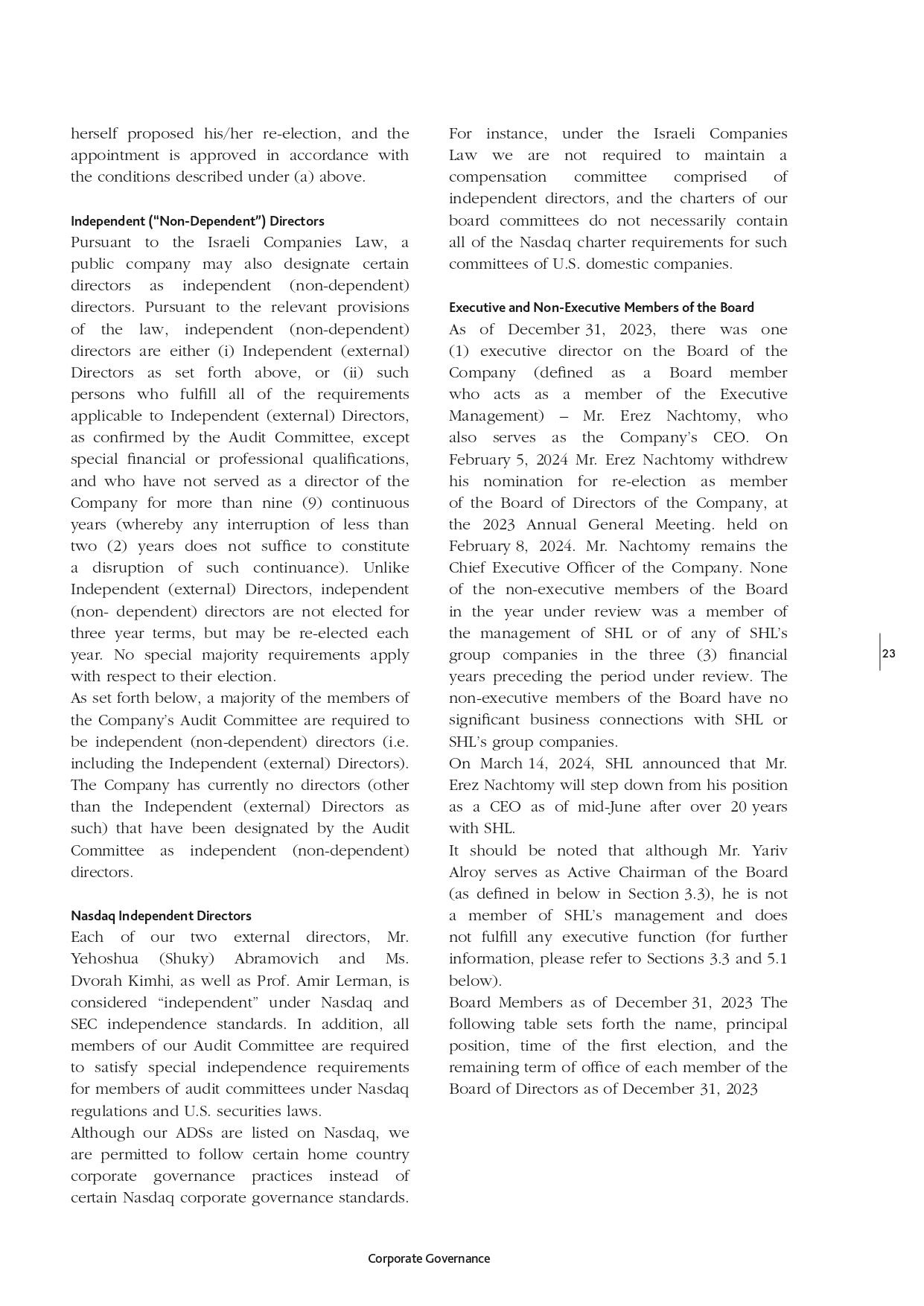
herself proposed his/her re-election, and the appointment is approved in accordance with the conditions described under (a) above. Independent
(“Non-Dependent”) Directors Pursuant to the Israeli Companies Law, a public company may also designate certain directors as independent (non-dependent) directors. Pursuant to the relevant provisions of the law, independent (non-dependent) directors
are either (i) Independent (external) Directors as set forth above, or (ii) such persons who fulfill all of the requirements applicable to Independent (external) Directors, as confirmed by the Audit Committee, except special financial or professional
qualifications, and who have not served as a director of the Company for more than nine (9) continuous years (whereby any interruption of less than two (2) years does not suffice to constitute a disruption of such continuance). Unlike Independent
(external) Directors, independent (non- dependent) directors are not elected for three year terms, but may be re-elected each year. No special majority requirements apply with respect to their election. As set forth below, a majority of the members
of the Company’s Audit Committee are required to be independent (non-dependent) directors (i.e. including the Independent (external) Directors). The Company has currently no directors (other than the Independent (external) Directors as such) that
have been designated by the Audit Committee as independent (non-dependent) directors. Nasdaq Independent Directors Each of our two external directors, Mr. Yehoshua (Shuky) Abramovich and Ms. Dvorah Kimhi, as well as Prof. Amir Lerman, is considered
“independent” under Nasdaq and SEC independence standards. In addition, all members of our Audit Committee are required to satisfy special independence requirements for members of audit committees under Nasdaq regulations and U.S. securities laws.
Although our ADSs are listed on Nasdaq, we are permitted to follow certain home country corporate governance practices instead of certain Nasdaq corporate governance standards. For instance, under the Israeli Companies Law we are not required to
maintain a compensation committee comprised of independent directors, and the charters of our board committees do not necessarily contain all of the Nasdaq charter requirements for such committees of U.S. domestic companies. Executive and
Non-Executive Members of the Board As of December 31, 2023, there was one (1) executive director on the Board of the Company (defined as a Board member who acts as a member of the Executive Management) – Mr. Erez Nachtomy, who also serves as the
Company’s CEO. On February 5, 2024 Mr. Erez Nachtomy withdrew his nomination for re-election as member of the Board of Directors of the Company, at the 2023 Annual General Meeting. held on February 8, 2024. Mr. Nachtomy remains the Chief Executive
Officer of the Company. None of the non-executive members of the Board in the year under review was a member of the management of SHL or of any of SHL’s group companies in the three (3) financial years preceding the period under review. The
non-executive members of the Board have no significant business connections with SHL or SHL’s group companies. On March 14, 2024, SHL announced that Mr. Erez Nachtomy will step down from his position as a CEO as of mid-June after over 20 years with
SHL. It should be noted that although Mr. Yariv Alroy serves as Active Chairman of the Board (as defined in below in Section 3.3), he is not a member of SHL’s management and does not fulfill any executive function (for further information, please
refer to Sections 3.3 and 5.1 below). Board Members as of December 31, 2023 The following table sets forth the name, principal position, time of the first election, and the remaining term of office of each member of the Board of Directors as of
December 31, 2023 Corporate Governance 23

Name Nationality Position First Election Remaining Term* Yariv Alroy Israeli Active co-Chairman of the Board /Non-executive member 2018** 2024
Ehud Barak Israeli Active co-Chairman of the Board / Non-executive member 2022 -**** Yehoshua Abramovich Israeli Non-executive member/Independent (external) Director 2017 2026 Erez Alroy Israeli Non-executive member 2018*** -**** Prof. Amir Lerman
Israeli and US Non-executive member 2016 2024 Dvora Kimhi Israeli Non-executive member/Independent (external) Director 2018 2024 David Salton Israeli Non-executive member 2021 -**** Erez Nachtomy Israeli Executive member 2018 -**** * With respect to
members of the Board who are not Independent (external) Directors, where the remaining term is indicated as 2024, this means until the 2024 Annual General Meeting. Mr. Abramovich’s second term in office ends on June 27, 2026. Ms. Kimhi’s second term
in office ends on December 9, 2024. For additional information regarding the election and term of office of SHL’s directors please refer to Section 3.2 “Election of Directors and Term of Office”. ** Yariv Alroy served as a director also between the
years 2001 and 2006, and between 2010 and 2014. *** Erez Alroy served as a director also between the years 2008 and 2014 and between 2016 and 2017. **** On February 5, 2024, such director withdrew his nomination for re-election as member of the Board
of Directors of the Company, at the 2023 Annual General Meeting held on February 8, 2024. Below are the resumes of the current members of the Board. Yariv Alroy – Active Chairman of the Board 24 Mr. Yariv Alroy joined the Board of Directors of SHL as
a non-executive Director in December 2018. Mr. Yariv Alroy served as the Company’s Co-CEO from 2000 to January 15, 2016. He previously served as managing director of SHL Telemedicine International Ltd from 1997 to 2000 and Chief Operating Officer of
the Company from 1993 to 1997. He also previously served as a Member of the Board of the Company between 2001 and 2006, and between 2010 and 2014. Before joining the Company, Mr. Yariv Alroy worked for a leading Israeli law firm from 1989 to 1993,
with his last position being senior partner. Since 2016 he has been an investor and a businessman and serves as a Board Member of Duke Robotics Inc., a reporting US corporation. He holds an LL.B. from Tel Aviv University, Israel. Erez Alroy Mr. Erez
Alroy joined the Board of Directors of SHL as a non-executive Director in December 2018. Mr. Erez Alroy served in various executive positions in SHL since its inception, and as its Co-CEO from 2000 to January 2015 and as a director from 2008 to 2014
and from 2016 to 2017. He is currently active in various investments and is a board member in Merhavia Holdings Ltd (TASE:MRHL). Mr. Erez Alroy holds an MBA from the Hebrew University in Jerusalem. Yehoshua Abramovich Mr. Abramovich joined the Board
of Directors of SHL as a non-executive Director/ Independent (external) Director in June 2017. Mr. Abramovich has held key positions in the Israeli capital market for over 25 years. He serves as the chairman of the board of IMed Infinity Medical,
chairman of Atrade, member of the board of directors and chairman of the investment committee of I.D.I. Insurance company, a member of the board of directors of each of the public companies Brimag Digital, Modiin Energy and GoTo, and as a director in
other high- tech, real estate and energy companies. Mr. Abramovich was the CEO of Clal Finance, one of Israel’s largest financial institutions, which provided a broad array of financial services ranging from portfolio management to brokerage and
underwriting services. Clal Finance owned and managed mutual funds, an in-house hedge fund, and offered individually tailored structured products to clients. Prior to that, he served in various positions in Clal group, including Deputy CEO of
Corporate Governance

Clal Insurance Enterprises Holdings. He served on the board of directors of the Tel- Aviv Stock Exchange until September 2008, and he is a
member of the board of trustees of the Academic Track of the College of Management. He has a B.A. in Economics & business management and an M.B.A from Tel Aviv University. Dvora Kimhi Ms. Dvora Kimhi joined the Board of Directors of SHL as a
non-executive Director/ Independent (external) Director in December 2018. She also served as a non-executive Independent (external) Director in the Company from 2010 to 2014 and as a non-executive director from 2001 to 2007. Since 2002 and as of the
date hereof, Ms. Kimhi serves as Vice President for regulatory and legal affairs with Channel 10, which merged with Channel 13 in January 2019. Prior to this Ms. Kimhi served as Chief Legal Advisor to Ananey Communications Ltd., Noga Communications
and the Israeli Educational Television. Ms. Kimhi served as Independent director on the board of directors of Ananey communications since 2007 until 2012. Ms. Kimhi also serves on the board of directors of Kol Hayyam Hadrom Ltd., an Israel radio
station. Ms. Kimhi is a member of the Israeli Bar, holds an LL.B. from Tel Aviv University and has specialized in contract law and communication regulation. Nationality: Israeli. Prof. Amir Lerman Prof. Lerman joined the Board of Directors of SHL as
a non- executive Director in 2016. Prof. Lerman is the Vice-Chair, Cardiovascular Department and the Director of the Cardiovascular Research Center at the Mayo Clinic in Rochester (USA) since 2010. He is also the Program Director for vascular and
valve, Center for Regenerative Medicine at the Mayo Clinic, since 2012. In addition, Prof. Lerman serves as the Director of the MayoIsraeli startup company initiative as well as a faculty member at the Mirage Institute: USIsrael innovation bridge
business leadership program, since 2009, in addition to various other positions held at the Mayo Clinic. Prof. Lerman also holds an appointment as Professor of Medicine at the Mayo Medical School since 2001. Prof. Lerman graduated from the Technion
school of Medicine in Haifa Israel in 1985 and completed his training in internal medicine, cardiovascular diseases and invasive cardiology at the Mayo Clinic in 1994. Prof. Lerman published more than 500 manuscripts, book chapters and reviews; the
NIH, AHA, and several foundations support his research. Ido Nouberger Mr. Ido Nouberger has served as the CEO of Value Base since its inception in 2013. He also holds the position of chairman of the board or board member of Value Base’s various
subsidiaries. Prior to that, he served as CEO and a director or various Israeli companies. Mr. Nouberger holds a M.A. and B.A, both in economics, from Tel Aviv University. 25 Nir Rotenberg Mr. Nir Rotenberg is the Chairman of the Board of Danbar
Finance Ltd., a private investment group, and has served there as a director and partner since 2000. Prior to that, he served as a manager and director of certain public companies in the Danbar group of companies from 1994 until 2000 and from
1990-1993 served as chief investment officer in Migdal Insurance Company. Mr. Rotenberg holds a M.B.A in business management and B.A in economics from Tel Aviv University. David Salton Mr. David Salton joined the Board of Directors of SHL as a
non-executive Director in May 2021. From October 2020, Mr. Salton holds the position of Chief Executive Officer of Virility Medical, a startup company developing consumer medical devices. Prior to that, for 10 years he served as the CEO of Dentack
Implants, a medical Corporate Governance
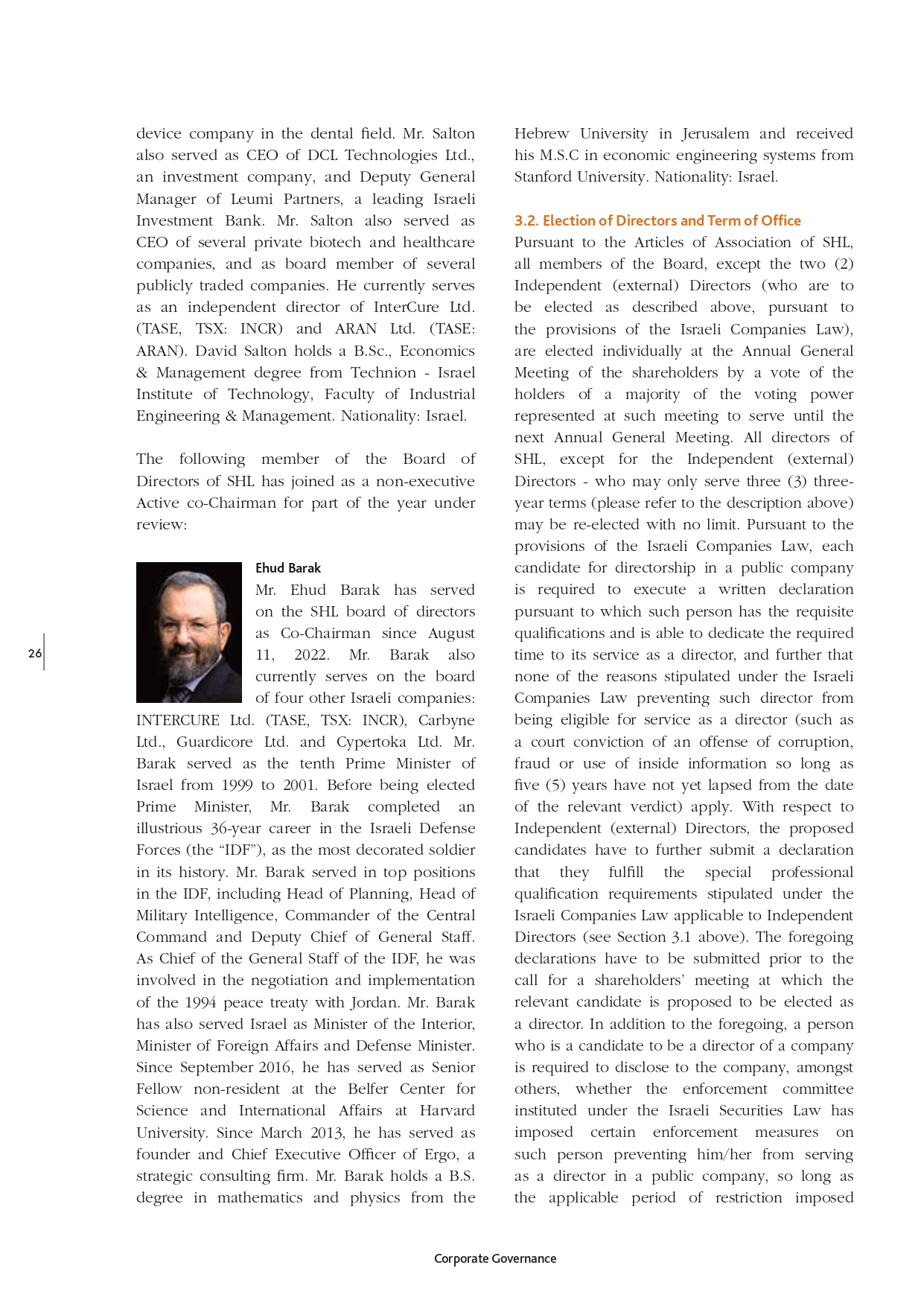
device company in the dental field. Mr. Salton also served as CEO of DCL Technologies Ltd., an investment company, and Deputy General Manager of
Leumi Partners, a leading Israeli Investment Bank. Mr. Salton also served as CEO of several private biotech and healthcare companies, and as board member of several publicly traded companies. He currently serves as an independent director of
InterCure Ltd. (TASE, TSX: INCR) and ARAN Ltd. (TASE: ARAN). David Salton holds a B.Sc., Economics & Management degree from Technion - Israel Institute of Technology, Faculty of Industrial Engineering & Management. Nationality: Israel. The
following member of the Board of Directors of SHL has joined as a non-executive Active co-Chairman for part of the year under review: Ehud Barak 26 Mr. Ehud Barak has served on the SHL board of directors as Co-Chairman since August 11, 2022. Mr.
Barak also currently serves on the board of four other Israeli companies: INTERCURE Ltd. (TASE, TSX: INCR), Carbyne Ltd., Guardicore Ltd. and Cypertoka Ltd. Mr. Barak served as the tenth Prime Minister of Israel from 1999 to 2001. Before being
elected Prime Minister, Mr. Barak completed an illustrious 36-year career in the Israeli Defense Forces (the “IDF”), as the most decorated soldier in its history. Mr. Barak served in top positions in the IDF, including Head of Planning, Head of
Military Intelligence, Commander of the Central Command and Deputy Chief of General Staff. As Chief of the General Staff of the IDF, he was involved in the negotiation and implementation of the 1994 peace treaty with Jordan. Mr. Barak has also served
Israel as Minister of the Interior, Minister of Foreign Affairs and Defense Minister. Since September 2016, he has served as Senior Fellow non-resident at the Belfer Center for Science and International Affairs at Harvard University. Since March
2013, he has served as founder and Chief Executive Officer of Ergo, a strategic consulting firm. Mr. Barak holds a B.S. degree in mathematics and physics from the Hebrew University in Jerusalem and received his M.S.C in economic engineering systems
from Stanford University. Nationality: Israel. 3.2. Election of Directors and Term of Office Pursuant to the Articles of Association of SHL, all members of the Board, except the two (2) Independent (external) Directors (who are to be elected as
described above, pursuant to the provisions of the Israeli Companies Law), are elected individually at the Annual General Meeting of the shareholders by a vote of the holders of a majority of the voting power represented at such meeting to serve
until the next Annual General Meeting. All directors of SHL, except for the Independent (external) Directors - who may only serve three (3) threeyear terms (please refer to the description above) may be re-elected with no limit. Pursuant to the
provisions of the Israeli Companies Law, each candidate for directorship in a public company is required to execute a written declaration pursuant to which such person has the requisite qualifications and is able to dedicate the required time to its
service as a director, and further that none of the reasons stipulated under the Israeli Companies Law preventing such director from being eligible for service as a director (such as a court conviction of an offense of corruption, fraud or use of
inside information so long as five (5) years have not yet lapsed from the date of the relevant verdict) apply. With respect to Independent (external) Directors, the proposed candidates have to further submit a declaration that they fulfill the
special professional qualification requirements stipulated under the Israeli Companies Law applicable to Independent Directors (see Section 3.1 above). The foregoing declarations have to be submitted prior to the call for a shareholders’ meeting at
which the relevant candidate is proposed to be elected as a director. In addition to the foregoing, a person who is a candidate to be a director of a company is required to disclose to the company, amongst others, whether the enforcement committee
instituted under the Israeli Securities Law has imposed certain enforcement measures on such person preventing him/her from serving as a director in a public company, so long as the applicable period of restriction imposed Corporate Governance
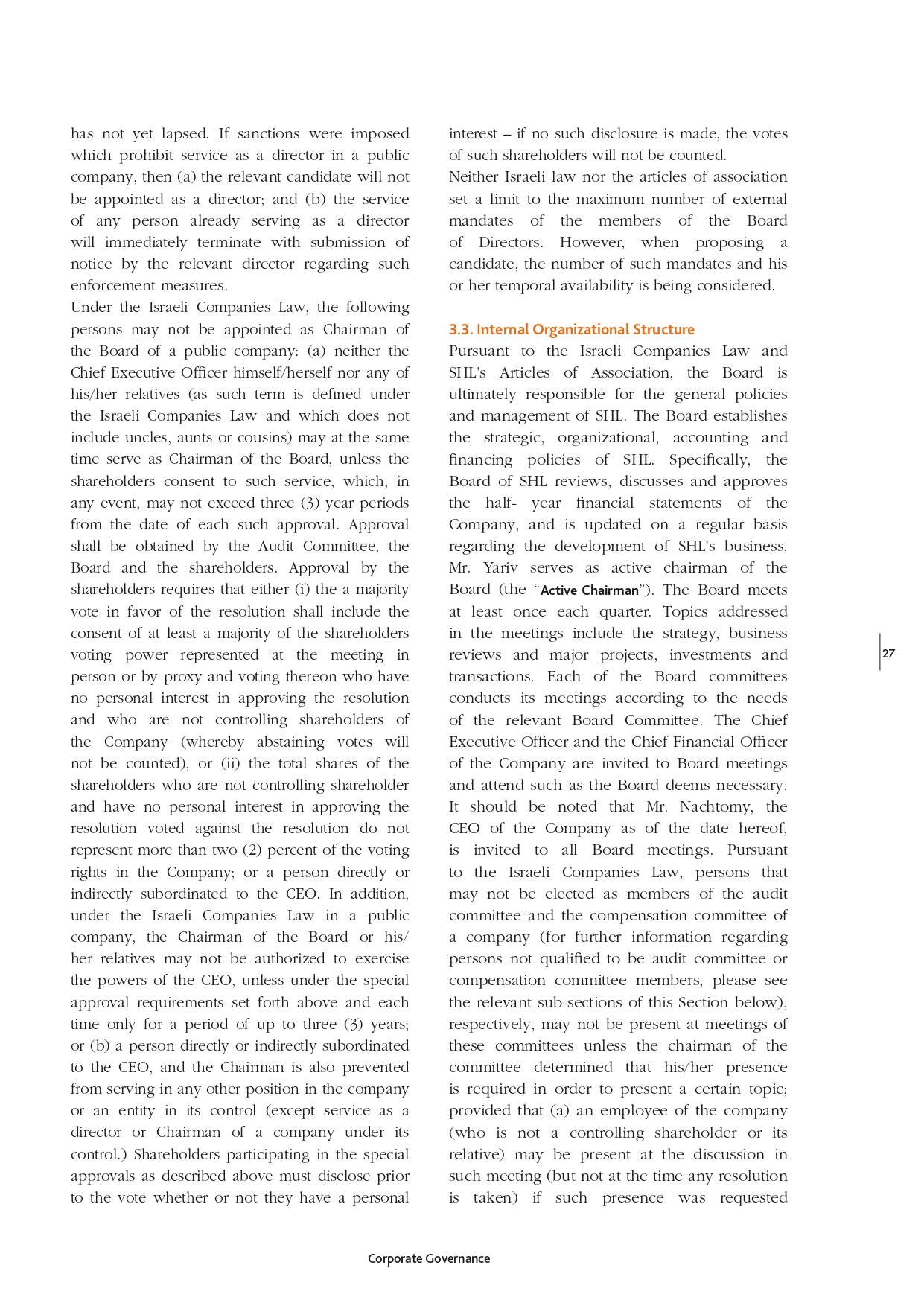
has not yet lapsed. If sanctions were imposed which prohibit service as a director in a public company, then (a) the relevant candidate will not
be appointed as a director; and (b) the service of any person already serving as a director will immediately terminate with submission of notice by the relevant director regarding such enforcement measures. Under the Israeli Companies Law, the
following persons may not be appointed as Chairman of the Board of a public company: (a) neither the Chief Executive Officer himself/herself nor any of his/her relatives (as such term is defined under the Israeli Companies Law and which does not
include uncles, aunts or cousins) may at the same time serve as Chairman of the Board, unless the shareholders consent to such service, which, in any event, may not exceed three (3) year periods from the date of each such approval. Approval shall be
obtained by the Audit Committee, the Board and the shareholders. Approval by the shareholders requires that either (i) the a majority vote in favor of the resolution shall include the consent of at least a majority of the shareholders voting power
represented at the meeting in person or by proxy and voting thereon who have no personal interest in approving the resolution and who are not controlling shareholders of the Company (whereby abstaining votes will not be counted), or (ii) the total
shares of the shareholders who are not controlling shareholder and have no personal interest in approving the resolution voted against the resolution do not represent more than two (2) percent of the voting rights in the Company; or a person directly
or indirectly subordinated to the CEO. In addition, under the Israeli Companies Law in a public company, the Chairman of the Board or his/ her relatives may not be authorized to exercise the powers of the CEO, unless under the special approval
requirements set forth above and each time only for a period of up to three (3) years; or (b) a person directly or indirectly subordinated to the CEO, and the Chairman is also prevented from serving in any other position in the company or an entity
in its control (except service as a director or Chairman of a company under its control.) Shareholders participating in the special approvals as described above must disclose prior to the vote whether or not they have a personal interest – if no such
disclosure is made, the votes of such shareholders will not be counted. Neither Israeli law nor the articles of association set a limit to the maximum number of external mandates of the members of the Board of Directors. However, when proposing a
candidate, the number of such mandates and his or her temporal availability is being considered. 3.3. Internal Organizational Structure Pursuant to the Israeli Companies Law and SHL’s Articles of Association, the Board is ultimately responsible for
the general policies and management of SHL. The Board establishes the strategic, organizational, accounting and financing policies of SHL. Specifically, the Board of SHL reviews, discusses and approves the half- year financial statements of the
Company, and is updated on a regular basis regarding the development of SHL’s business. Mr. Yariv serves as active chairman of the Board (the “Active Chairman”). The Board meets at least once each quarter. Topics addressed in the meetings include the
strategy, business reviews and major projects, investments and transactions. Each of the Board committees conducts its meetings according to the needs of the relevant Board Committee. The Chief Executive Officer and the Chief Financial Officer of the
Company are invited to Board meetings and attend such as the Board deems necessary. It should be noted that Mr. Nachtomy, the CEO of the Company as of the date hereof, is invited to all Board meetings. Pursuant to the Israeli Companies Law, persons
that may not be elected as members of the audit committee and the compensation committee of a company (for further information regarding persons not qualified to be audit committee or compensation committee members, please see the relevant
sub-sections of this Section below), respectively, may not be present at meetings of these committees unless the chairman of the committee determined that his/her presence is required in order to present a certain topic; provided that (a) an employee
of the company (who is not a controlling shareholder or its relative) may be present at the discussion in such meeting (but not at the time any resolution is taken) if such presence was requested Corporate Governance 27
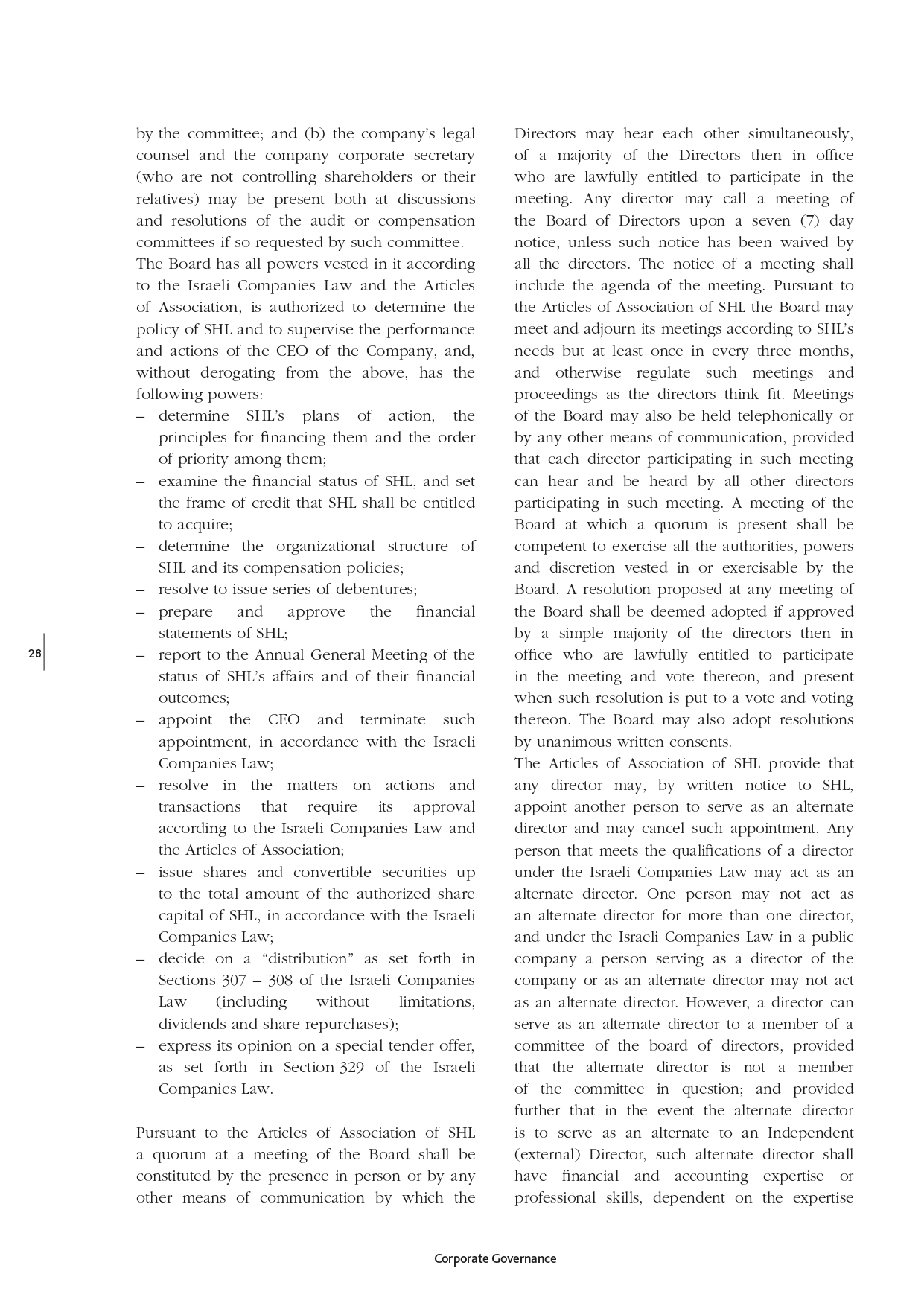
28 by the committee; and (b) the company’s legal counsel and the company corporate secretary (who are not controlling shareholders or their
relatives) may be present both at discussions and resolutions of the audit or compensation committees if so requested by such committee. The Board has all powers vested in it according to the Israeli Companies Law and the Articles of Association, is
authorized to determine the policy of SHL and to supervise the performance and actions of the CEO of the Company, and, without derogating from the above, has the following powers: – determine SHL’s plans of action, the principles for financing them
and the order of priority among them; – examine the financial status of SHL, and set the frame of credit that SHL shall be entitled to acquire; – determine the organizational structure of SHL and its compensation policies; – resolve to issue series
of debentures; – prepare and approve the financial statements of SHL; – report to the Annual General Meeting of the status of SHL’s affairs and of their financial outcomes; – appoint the CEO and terminate such appointment, in accordance with the
Israeli Companies Law; – resolve in the matters on actions and transactions that require its approval according to the Israeli Companies Law and the Articles of Association; – issue shares and convertible securities up to the total amount of the
authorized share capital of SHL, in accordance with the Israeli Companies Law; – decide on a “distribution” as set forth in Sections 307 – 308 of the Israeli Companies Law (including without limitations, dividends and share repurchases); – express
its opinion on a special tender offer, as set forth in Section 329 of the Israeli Companies Law. Pursuant to the Articles of Association of SHL a quorum at a meeting of the Board shall be constituted by the presence in person or by any other means of
communication by which the Directors may hear each other simultaneously, of a majority of the Directors then in office who are lawfully entitled to participate in the meeting. Any director may call a meeting of the Board of Directors upon a seven (7)
day notice, unless such notice has been waived by all the directors. The notice of a meeting shall include the agenda of the meeting. Pursuant to the Articles of Association of SHL the Board may meet and adjourn its meetings according to SHL’s needs
but at least once in every three months, and otherwise regulate such meetings and proceedings as the directors think fit. Meetings of the Board may also be held telephonically or by any other means of communication, provided that each director
participating in such meeting can hear and be heard by all other directors participating in such meeting. A meeting of the Board at which a quorum is present shall be competent to exercise all the authorities, powers and discretion vested in or
exercisable by the Board. A resolution proposed at any meeting of the Board shall be deemed adopted if approved by a simple majority of the directors then in office who are lawfully entitled to participate in the meeting and vote thereon, and present
when such resolution is put to a vote and voting thereon. The Board may also adopt resolutions by unanimous written consents. The Articles of Association of SHL provide that any director may, by written notice to SHL, appoint another person to serve
as an alternate director and may cancel such appointment. Any person that meets the qualifications of a director under the Israeli Companies Law may act as an alternate director. One person may not act as an alternate director for more than one
director, and under the Israeli Companies Law in a public company a person serving as a director of the company or as an alternate director may not act as an alternate director. However, a director can serve as an alternate director to a member of a
committee of the board of directors, provided that the alternate director is not a member of the committee in question; and provided further that in the event the alternate director is to serve as an alternate to an Independent (external) Director,
such alternate director shall have financial and accounting expertise or professional skills, dependent on the expertise Corporate Governance

and skills of the Independent (external) Director such alternate director is supposed to replace. An alternate director to an Independent
(external) Director may not be otherwise appointed. Under the Israeli Companies Law a company is entitled to have several General Managers to be appointed by the Board who shall be responsible for the day-to-day operation of the company within the
limits of the policy determined by the Board and subject to its direction. In a public company, office holders who are not directors are appointed by the General Manager/CEO who may determine the powers and duties of such office holders. During the
year under review, the Board held 16 meetings (10 of which via video conference and 6 by written resolutions). The length of such meetings depends on the agenda and the duration is approximately 1 to 1.5 hours. The CFO and the Company’s external
auditors attended 10 and 4 of the meetings above, respectively. Committees of the Board and Internal Auditor The Articles of Association of SHL provide that the Board may delegate any or all of its powers to committees of the Board as it deems
appropriate, subject to the provisions of the Israeli Companies Law. Any committee so formed shall, in the exercise of the powers so delegated, conform to any regulations imposed on it by the Board. The meetings and proceedings of any such committee
are, mutatis mutandis, governed by the provisions contained in the Articles of Association for regulating the meetings of the Board, so far as not superseded by any regulations adopted by the Board of Directors. Any such committee authorized to
execute the powers of the Board shall include at least one (1) Independent (external) Director. In addition, all members of our Audit Committee are required to satisfy special independence requirements for members of audit committees under Nasdaq
regulations and U.S. securities laws. A committee authorized to execute the powers of the Board may only be comprised of members of the Board. A committee whose powers are limited to providing recommendations to the Board may be comprised of
non-members. Pursuant to the Israeli Companies Law, a board of directors may not delegate the following matters to a committee: determination of a general policy; distribution (except for re-purchase of company shares pursuant to a framework approved
by the board); determination of the board of directors’ stand on matters that require shareholder approval or on its opinion with regard to a special purchase offer; appointment of directors; issuance of securities (except for issuance to employees
pursuant to an option plan approved by the board); approval of financial statements; approval of interested party transactions. As mentioned above, although not mandatory, under the provisions of the Israeli Companies Law for a company which is not
subject to reporting obligations under the Israeli Securities Law, the Board of Directors had voluntarily appointed the FS Committee as of March 18, 2015. On January 15, 2023, the Board of Directors approved the elimination of the FS Committee and
the transfer of its functions and tasks to the Company’s Audit Committee, and further approved the adoption of new committee charters for the Compensation Committee and the Audit Committee to comply with SEC rules in view of the intended Nasdaq
listing. On February 21, 2019 the Board has voluntarily appointed a new committee – an Investment Committee. On February 10, 2020, the Board has voluntarily appointed a Cyber Committee and on May 17, 2020 the Board has voluntarily appointed an
Executive Committee. For further details regarding the composition of said committees in the year under review and as of the date hereof, please see below. The committees of the Board of Directors meet as necessary and are required to take minutes,
make full reports and recommendations to the Board of Directors, which recommendations are provided to the Board of Directors following each applicable session of the committees. Pursuant to the Israeli Companies Law, the Board of Directors also
appointed an internal auditor proposed by the Audit Committee. Audit Committee - Pursuant to the Israeli Companies Law the Audit Committee must be comprised of at least three (3) directors, including all of the Independent (external) Directors, and a
majority of its members must be Independent Corporate Governance 29
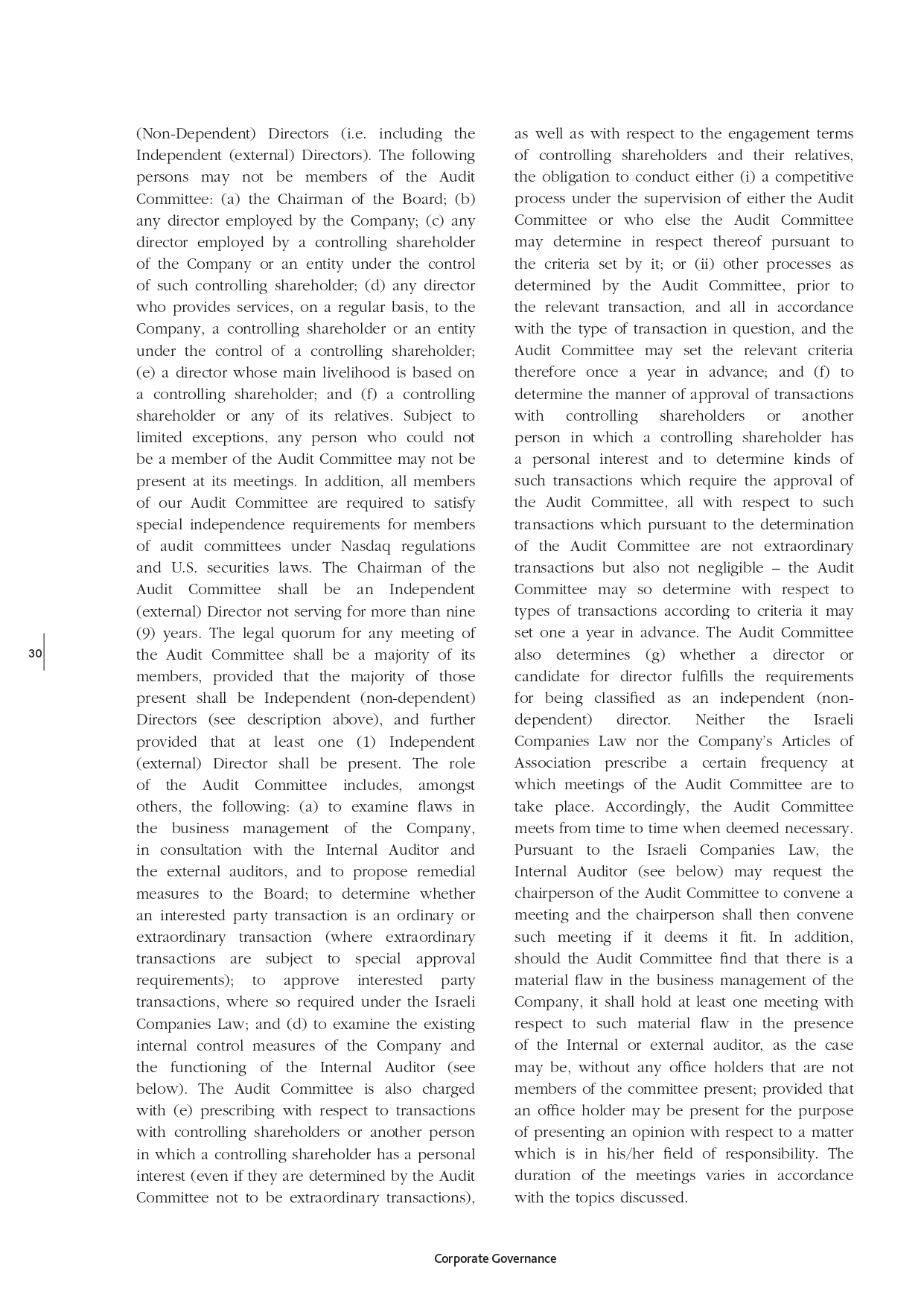
30 (Non-Dependent) Directors (i.e. including the Independent (external) Directors). The following persons may not be members of the Audit
Committee: (a) the Chairman of the Board; (b) any director employed by the Company; (c) any director employed by a controlling shareholder of the Company or an entity under the control of such controlling shareholder; (d) any director who provides
services, on a regular basis, to the Company, a controlling shareholder or an entity under the control of a controlling shareholder; (e) a director whose main livelihood is based on a controlling shareholder; and (f) a controlling shareholder or any
of its relatives. Subject to limited exceptions, any person who could not be a member of the Audit Committee may not be present at its meetings. In addition, all members of our Audit Committee are required to satisfy special independence requirements
for members of audit committees under Nasdaq regulations and U.S. securities laws. The Chairman of the Audit Committee shall be an Independent (external) Director not serving for more than nine (9) years. The legal quorum for any meeting of the Audit
Committee shall be a majority of its members, provided that the majority of those present shall be Independent (non-dependent) Directors (see description above), and further provided that at least one (1) Independent (external) Director shall be
present. The role of the Audit Committee includes, amongst others, the following: (a) to examine flaws in the business management of the Company, in consultation with the Internal Auditor and the external auditors, and to propose remedial measures to
the Board; to determine whether an interested party transaction is an ordinary or extraordinary transaction (where extraordinary transactions are subject to special approval requirements); to approve interested party transactions, where so required
under the Israeli Companies Law; and (d) to examine the existing internal control measures of the Company and the functioning of the Internal Auditor (see below). The Audit Committee is also charged with (e) prescribing with respect to transactions
with controlling shareholders or another person in which a controlling shareholder has a personal interest (even if they are determined by the Audit Committee not to be extraordinary transactions), as well as with respect to the engagement terms of
controlling shareholders and their relatives, the obligation to conduct either (i) a competitive process under the supervision of either the Audit Committee or who else the Audit Committee may determine in respect thereof pursuant to the criteria set
by it; or (ii) other processes as determined by the Audit Committee, prior to the relevant transaction, and all in accordance with the type of transaction in question, and the Audit Committee may set the relevant criteria therefore once a year in
advance; and (f) to determine the manner of approval of transactions with controlling shareholders or another person in which a controlling shareholder has a personal interest and to determine kinds of such transactions which require the approval of
the Audit Committee, all with respect to such transactions which pursuant to the determination of the Audit Committee are not extraordinary transactions but also not negligible – the Audit Committee may so determine with respect to types of
transactions according to criteria it may set one a year in advance. The Audit Committee also determines (g) whether a director or candidate for director fulfills the requirements for being classified as an independent (nondependent) director.
Neither the Israeli Companies Law nor the Company’s Articles of Association prescribe a certain frequency at which meetings of the Audit Committee are to take place. Accordingly, the Audit Committee meets from time to time when deemed necessary.
Pursuant to the Israeli Companies Law, the Internal Auditor (see below) may request the chairperson of the Audit Committee to convene a meeting and the chairperson shall then convene such meeting if it deems it fit. In addition, should the Audit
Committee find that there is a material flaw in the business management of the Company, it shall hold at least one meeting with respect to such material flaw in the presence of the Internal or external auditor, as the case may be, without any office
holders that are not members of the committee present; provided that an office holder may be present for the purpose of presenting an opinion with respect to a matter which is in his/her field of responsibility. The duration of the meetings varies in
accordance with the topics discussed. Corporate Governance
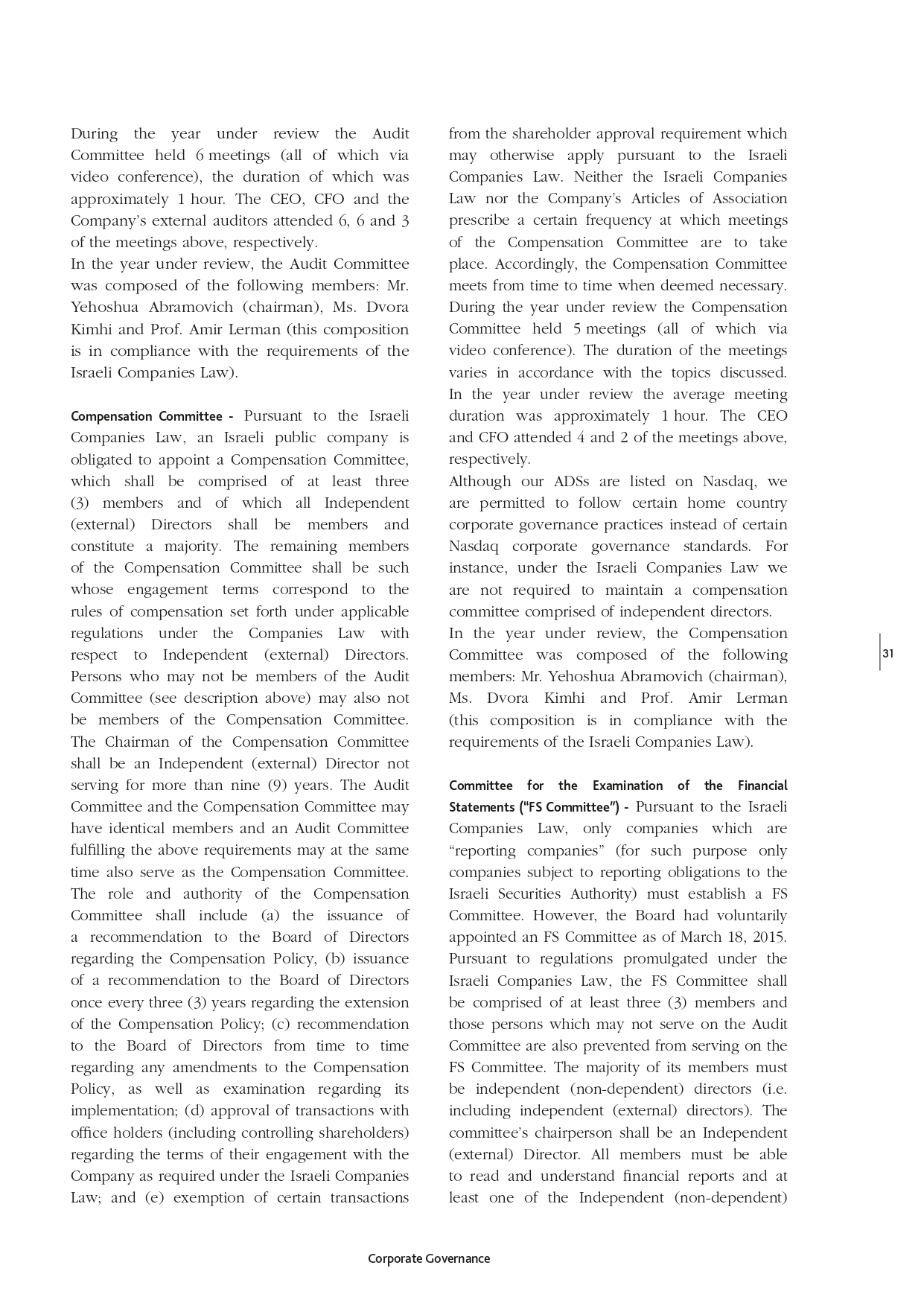
During the year under review the Audit Committee held 6 meetings (all of which via video conference), the duration of which was approximately 1
hour. The CEO, CFO and the Company’s external auditors attended 6, 6 and 3 of the meetings above, respectively. In the year under review, the Audit Committee was composed of the following members: Mr. Yehoshua Abramovich (chairman), Ms. Dvora Kimhi
and Prof. Amir Lerman (this composition is in compliance with the requirements of the Israeli Companies Law). Compensation Committee - Pursuant to the Israeli Companies Law, an Israeli public company is obligated to appoint a Compensation Committee,
which shall be comprised of at least three (3) members and of which all Independent (external) Directors shall be members and constitute a majority. The remaining members of the Compensation Committee shall be such whose engagement terms correspond
to the rules of compensation set forth under applicable regulations under the Companies Law with respect to Independent (external) Directors. Persons who may not be members of the Audit Committee (see description above) may also not be members of the
Compensation Committee. The Chairman of the Compensation Committee shall be an Independent (external) Director not serving for more than nine (9) years. The Audit Committee and the Compensation Committee may have identical members and an Audit
Committee fulfilling the above requirements may at the same time also serve as the Compensation Committee. The role and authority of the Compensation Committee shall include (a) the issuance of a recommendation to the Board of Directors regarding the
Compensation Policy, (b) issuance of a recommendation to the Board of Directors once every three (3) years regarding the extension of the Compensation Policy; (c) recommendation to the Board of Directors from time to time regarding any amendments to
the Compensation Policy, as well as examination regarding its implementation; (d) approval of transactions with office holders (including controlling shareholders) regarding the terms of their engagement with the Company as required under the Israeli
Companies Law; and (e) exemption of certain transactions from the shareholder approval requirement which may otherwise apply pursuant to the Israeli Companies Law. Neither the Israeli Companies Law nor the Company’s Articles of Association prescribe
a certain frequency at which meetings of the Compensation Committee are to take place. Accordingly, the Compensation Committee meets from time to time when deemed necessary. During the year under review the Compensation Committee held 5 meetings (all
of which via video conference). The duration of the meetings varies in accordance with the topics discussed. In the year under review the average meeting duration was approximately 1 hour. The CEO and CFO attended 4 and 2 of the meetings above,
respectively. Although our ADSs are listed on Nasdaq, we are permitted to follow certain home country corporate governance practices instead of certain Nasdaq corporate governance standards. For instance, under the Israeli Companies Law we are not
required to maintain a compensation committee comprised of independent directors. In the year under review, the Compensation Committee was composed of the following members: Mr. Yehoshua Abramovich (chairman), Ms. Dvora Kimhi and Prof. Amir Lerman
(this composition is in compliance with the requirements of the Israeli Companies Law). Committee for the Examination of the Financial Statements (“FS Committee”) - Pursuant to the Israeli Companies Law, only companies which are “reporting companies”
(for such purpose only companies subject to reporting obligations to the Israeli Securities Authority) must establish a FS Committee. However, the Board had voluntarily appointed an FS Committee as of March 18, 2015. Pursuant to regulations
promulgated under the Israeli Companies Law, the FS Committee shall be comprised of at least three (3) members and those persons which may not serve on the Audit Committee are also prevented from serving on the FS Committee. The majority of its
members must be independent (non-dependent) directors (i.e. including independent (external) directors). The committee’s chairperson shall be an Independent (external) Director. All members must be able to read and understand financial reports and at
least one of the Independent (non-dependent) Corporate Governance 31
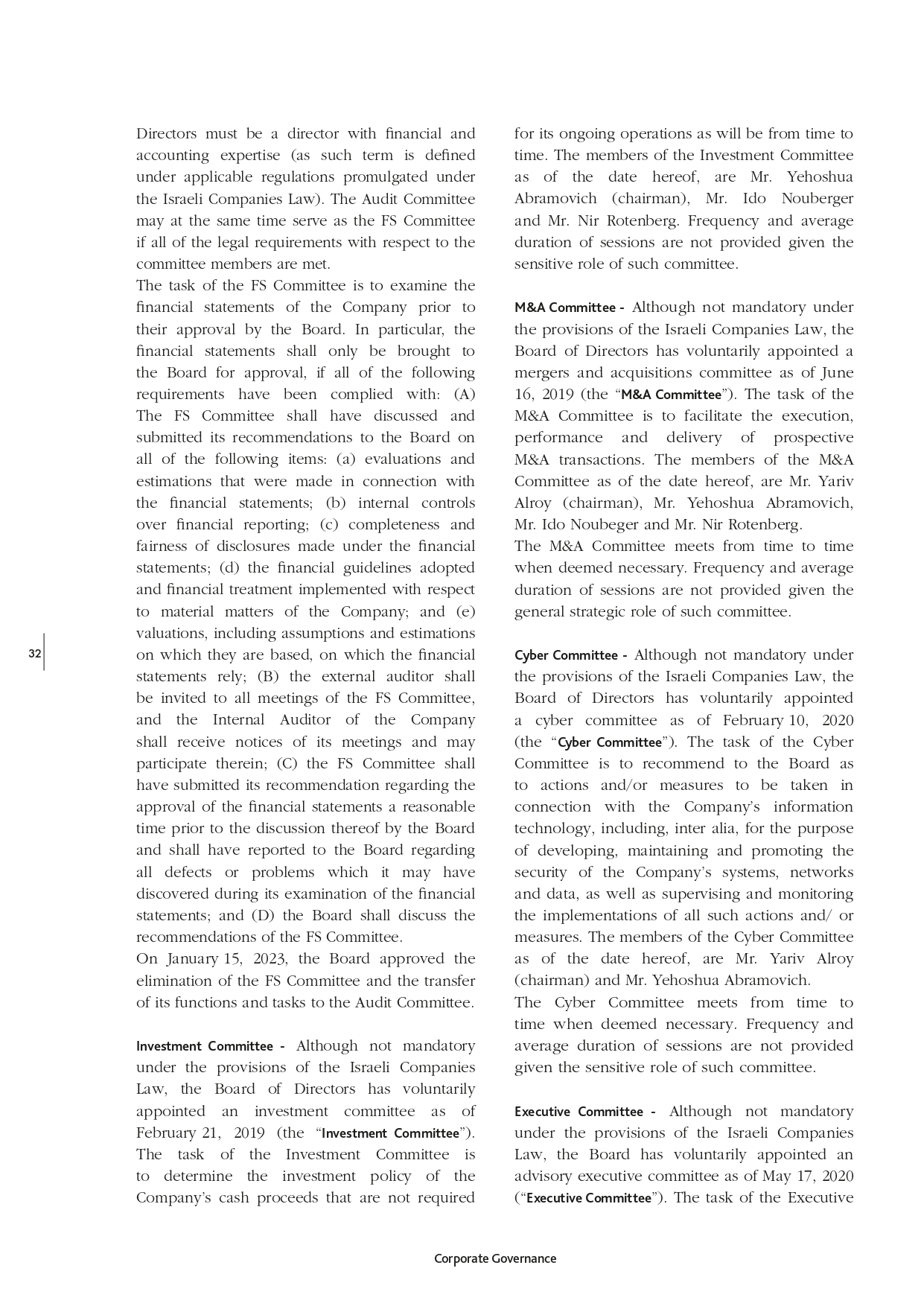
32 Directors must be a director with financial and accounting expertise (as such term is defined under applicable regulations promulgated under
the Israeli Companies Law). The Audit Committee may at the same time serve as the FS Committee if all of the legal requirements with respect to the committee members are met. The task of the FS Committee is to examine the financial statements of the
Company prior to their approval by the Board. In particular, the financial statements shall only be brought to the Board for approval, if all of the following requirements have been complied with: (A) The FS Committee shall have discussed and
submitted its recommendations to the Board on all of the following items: (a) evaluations and estimations that were made in connection with the financial statements; (b) internal controls over financial reporting; (c) completeness and fairness of
disclosures made under the financial statements; (d) the financial guidelines adopted and financial treatment implemented with respect to material matters of the Company; and (e) valuations, including assumptions and estimations on which they are
based, on which the financial statements rely; (B) the external auditor shall be invited to all meetings of the FS Committee, and the Internal Auditor of the Company shall receive notices of its meetings and may participate therein; (C) the FS
Committee shall have submitted its recommendation regarding the approval of the financial statements a reasonable time prior to the discussion thereof by the Board and shall have reported to the Board regarding all defects or problems which it may
have discovered during its examination of the financial statements; and (D) the Board shall discuss the recommendations of the FS Committee. On January 15, 2023, the Board approved the elimination of the FS Committee and the transfer of its functions
and tasks to the Audit Committee. Investment Committee - Although not mandatory under the provisions of the Israeli Companies Law, the Board of Directors has voluntarily appointed an investment committee as of February 21, 2019 (the “Investment
Committee”). The task of the Investment Committee is to determine the investment policy of the Company’s cash proceeds that are not required for its ongoing operations as will be from time to time. The members of the Investment Committee as of the
date hereof, are Mr. Yehoshua Abramovich (chairman), Mr. Ido Nouberger and Mr. Nir Rotenberg. Frequency and average duration of sessions are not provided given the sensitive role of such committee. M&A Committee - Although not mandatory under the
provisions of the Israeli Companies Law, the Board of Directors has voluntarily appointed a mergers and acquisitions committee as of June 16, 2019 (the “M&A Committee”). The task of the M&A Committee is to facilitate the execution,
performance and delivery of prospective M&A transactions. The members of the M&A Committee as of the date hereof, are Mr. Yariv Alroy (chairman), Mr. Yehoshua Abramovich, Mr. Ido Noubeger and Mr. Nir Rotenberg. The M&A Committee meets
from time to time when deemed necessary. Frequency and average duration of sessions are not provided given the general strategic role of such committee. Cyber Committee - Although not mandatory under the provisions of the Israeli Companies Law, the
Board of Directors has voluntarily appointed a cyber committee as of February 10, 2020 (the “Cyber Committee”). The task of the Cyber Committee is to recommend to the Board as to actions and/or measures to be taken in connection with the Company’s
information technology, including, inter alia, for the purpose of developing, maintaining and promoting the security of the Company’s systems, networks and data, as well as supervising and monitoring the implementations of all such actions and/ or
measures. The members of the Cyber Committee as of the date hereof, are Mr. Yariv Alroy (chairman) and Mr. Yehoshua Abramovich. The Cyber Committee meets from time to time when deemed necessary. Frequency and average duration of sessions are not
provided given the sensitive role of such committee. Executive Committee - Although not mandatory under the provisions of the Israeli Companies Law, the Board has voluntarily appointed an advisory executive committee as of May 17, 2020 (“Executive
Committee”). The task of the Executive Corporate Governance

Committee is to assist and accompany the CEO and the Company in operating its ongoing business. The members of the Executive Committee as of the
date hereof are Mr. Yariv Alroy, Mr. Yehoshua Abramovich, Mr. Ido Noubeger and Mr. Nir Rotenberg. The Executive Committee meets from time to time when deemed necessary. Frequency and average duration of sessions are not provided given the general
strategic role of such committee. Pursuant to the Israeli Companies Law, the Board of a public company shall appoint an internal auditor. Such appointment is made upon recommendation of the Audit Committee. Neither an interested party nor an officer
of the company, any relatives of the foregoing or the external auditor or anyone on its behalf may serve in such position. The role of the Internal Auditor is to examine, among other things, whether SHL’s activities comply with the law and orderly
business procedure. Pursuant to the Israeli Internal Audit Law - 1992, together with the Israeli Companies Law, the Internal Auditor is authorized to demand and receive any kind of document and/or information that is in the Company’s or its
employees’ possession, which he deems necessary for the performance of his role, and he is to have access to all databases or data processing programs of the Company. Pursuant to the Israeli Companies Law, the Chairman of the Board or the Chairman of
the Audit Committee may order the Internal Auditor to conduct an internal audit on matters where an urgent need for examination arose. In addition, the Internal Auditor shall receive notices of the meetings of the Audit Committee and may participate
in such meetings. The Internal Auditor has no decision making powers. Pursuant to the Israeli Companies Law and the Company’s Articles of Association, the internal auditor has to submit a work program to the Company’s Audit Committee for approval.
Mr. Michael Gilinsky was appointed as SHL’s Internal Auditor in March 2021. During the year under review, the Internal Auditor participated in 1 meeting of the Audit Committee of the Company, in the framework of which the Internal Auditor presented
internal audit reports. Internal Auditor - 3.4. Definition of Areas of Responsibility of Management; Information and Control Instruments Vis-À-Vis Senior Management The senior management of SHL (“Senior Management”) implements the general policies
and strategic decisions of the Board. It manages the day-to-day business operations of SHL, including: • Regularly assessing the achievement of targets set for the Company’s business; • Implementing the corporate policies, strategies and strategic
plans given by the Board; • Ensuring the efficient operation of the Company and achievement of optimized results; • Ensuring that management capacity, financial and other resources are used efficiently. The Board controls the actions of Senior
Management through a variety of control mechanisms: • The CEO and CFO inform the Board regularly about current developments, including by submitting written reports on relevant topics and participating in the relevant meetings of the Board and Board
committees. • Informal teleconferences are held as required between the Board and CEO and CFO as deemed necessary. • Control over financial management is exercised by the FS Committee (and as of January 15, 2023 – by the Audit Committee) and the
Board, which invite the CFO to each meeting at which financial results are discussed, as well as SHL’s external auditors, as deemed necessary. The FS Committee (and as of January 15, 2023 – by the Audit Committee) and the Board discuss with the CFO
and the auditors (to the extent applicable) not only the financial statements themselves but also their assessment of the internal controls and whether any material weaknesses have come to their attention. • SHL has an Internal Auditor (for further
information, please refer to “Committees of the Board and Internal Auditor” above). The Internal Auditor examines the processes and controls of the Company - not only with regard to financial operations, but also with regard to compliance of
management with internal and external policies - and conveys Corporate Governance 33
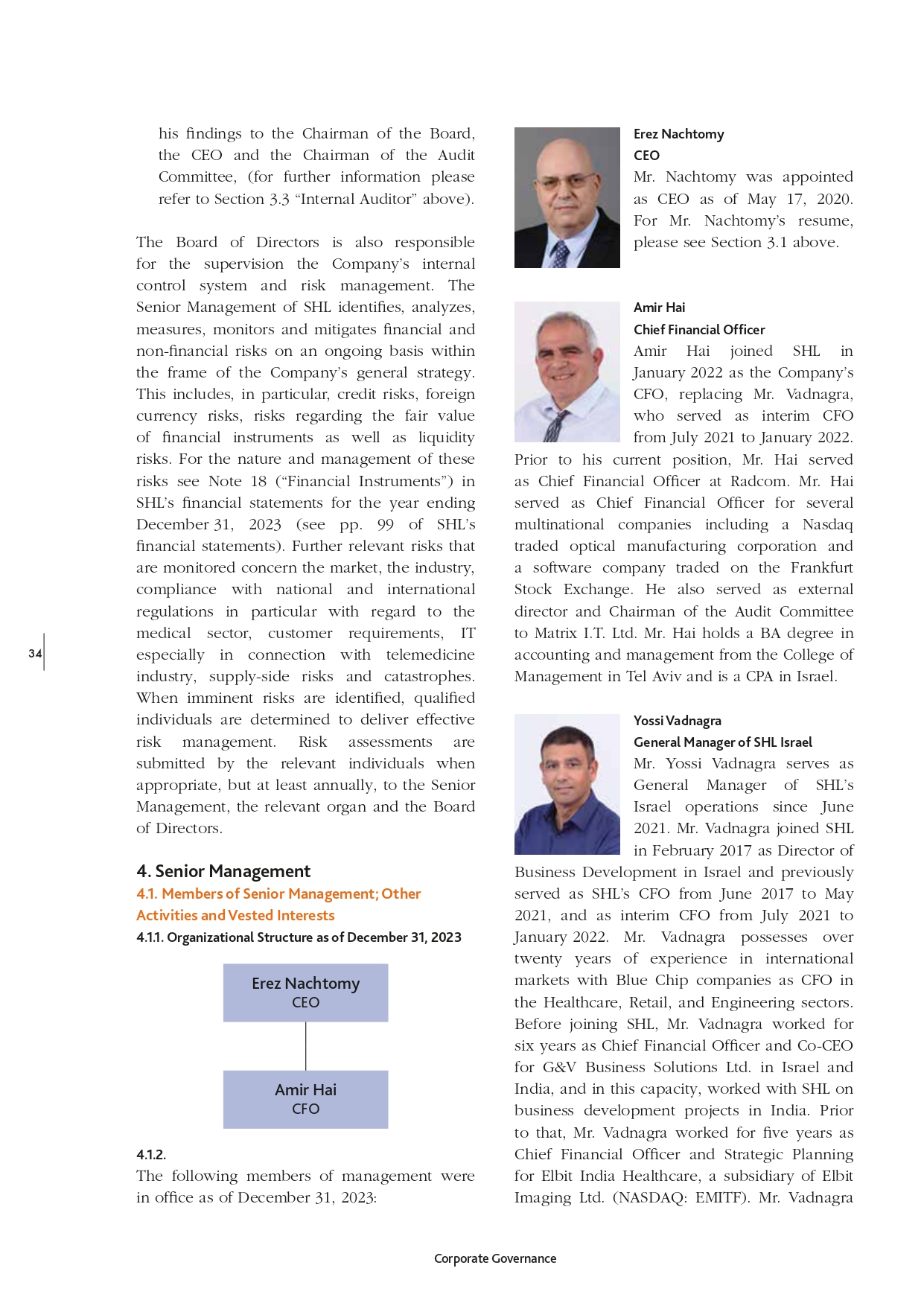
his findings to the Chairman of the Board, the CEO and the Chairman of the Audit Committee, (for further information please refer to Section 3.3
“Internal Auditor” above). 34 The Board of Directors is also responsible for the supervision the Company’s internal control system and risk management. The Senior Management of SHL identifies, analyzes, measures, monitors and mitigates financial and
non-financial risks on an ongoing basis within the frame of the Company’s general strategy. This includes, in particular, credit risks, foreign currency risks, risks regarding the fair value of financial instruments as well as liquidity risks. For
the nature and management of these risks see Note 18 (“Financial Instruments”) in SHL’s financial statements for the year ending December 31, 2023 (see pp. 99 of SHL’s financial statements). Further relevant risks that are monitored concern the
market, the industry, compliance with national and international regulations in particular with regard to the medical sector, customer requirements, IT especially in connection with telemedicine industry, supply-side risks and catastrophes. When
imminent risks are identified, qualified individuals are determined to deliver effective risk management. Risk assessments are submitted by the relevant individuals when appropriate, but at least annually, to the Senior Management, the relevant organ
and the Board of Directors. 4. Senior Management 4.1. Members of Senior Management; Other Activities and Vested Interests 4.1.1. Organizational Structure as of December 31, 2023 Erez Nachtomy CEO Amir Hai CFO 4.1.2. The following members of
management were in office as of December 31, 2023: Erez Nachtomy CEO Mr. Nachtomy was appointed as CEO as of May 17, 2020. For Mr. Nachtomy’s resume, please see Section 3.1 above. Amir Hai Chief Financial Officer Amir Hai joined SHL in January 2022
as the Company’s CFO, replacing Mr. Vadnagra, who served as interim CFO from July 2021 to January 2022. Prior to his current position, Mr. Hai served as Chief Financial Officer at Radcom. Mr. Hai served as Chief Financial Officer for several
multinational companies including a Nasdaq traded optical manufacturing corporation and a software company traded on the Frankfurt Stock Exchange. He also served as external director and Chairman of the Audit Committee to Matrix I.T. Ltd. Mr. Hai
holds a BA degree in accounting and management from the College of Management in Tel Aviv and is a CPA in Israel. Yossi Vadnagra General Manager of SHL Israel Mr. Yossi Vadnagra serves as General Manager of SHL’s Israel operations since June 2021.
Mr. Vadnagra joined SHL in February 2017 as Director of Business Development in Israel and previously served as SHL’s CFO from June 2017 to May 2021, and as interim CFO from July 2021 to January 2022. Mr. Vadnagra possesses over twenty years of
experience in international markets with Blue Chip companies as CFO in the Healthcare, Retail, and Engineering sectors. Before joining SHL, Mr. Vadnagra worked for six years as Chief Financial Officer and Co-CEO for G&V Business Solutions Ltd. in
Israel and India, and in this capacity, worked with SHL on business development projects in India. Prior to that, Mr. Vadnagra worked for five years as Chief Financial Officer and Strategic Planning for Elbit India Healthcare, a subsidiary of Elbit
Imaging Ltd. (NASDAQ: EMITF). Mr. Vadnagra Corporate Governance
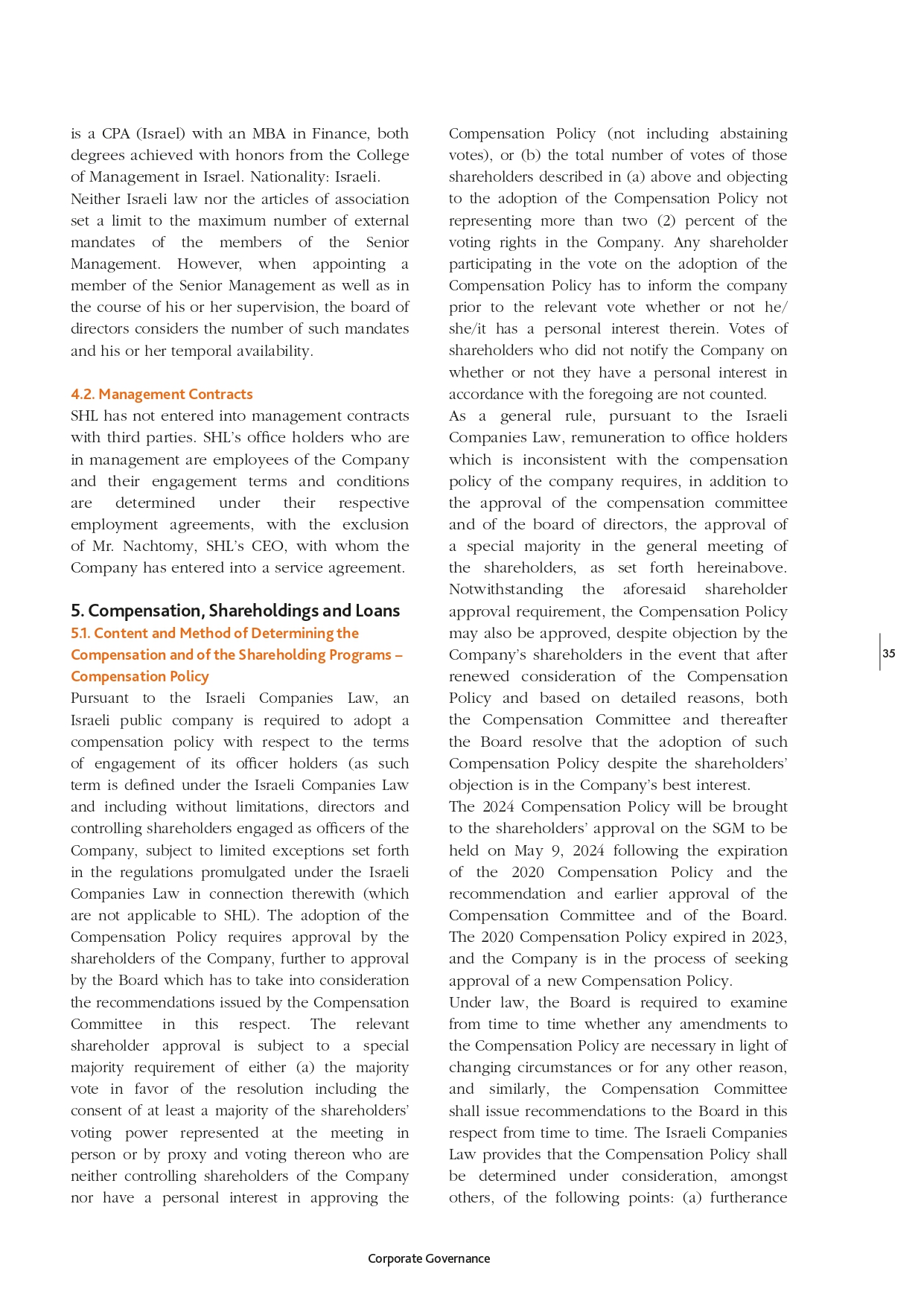
is a CPA (Israel) with an MBA in Finance, both degrees achieved with honors from the College of Management in Israel. Nationality: Israeli.
Neither Israeli law nor the articles of association set a limit to the maximum number of external mandates of the members of the Senior Management. However, when appointing a member of the Senior Management as well as in the course of his or her
supervision, the board of directors considers the number of such mandates and his or her temporal availability. 4.2. Management Contracts SHL has not entered into management contracts with third parties. SHL’s office holders who are in management are
employees of the Company and their engagement terms and conditions are determined under their respective employment agreements, with the exclusion of Mr. Nachtomy, SHL’s CEO, with whom the Company has entered into a service agreement. 5.
Compensation, Shareholdings and Loans 5.1. Content and Method of Determining the Compensation and of the Shareholding Programs – Compensation Policy Pursuant to the Israeli Companies Law, an Israeli public company is required to adopt a compensation
policy with respect to the terms of engagement of its officer holders (as such term is defined under the Israeli Companies Law and including without limitations, directors and controlling shareholders engaged as officers of the Company, subject to
limited exceptions set forth in the regulations promulgated under the Israeli Companies Law in connection therewith (which are not applicable to SHL). The adoption of the Compensation Policy requires approval by the shareholders of the Company,
further to approval by the Board which has to take into consideration the recommendations issued by the Compensation Committee in this respect. The relevant shareholder approval is subject to a special majority requirement of either (a) the majority
vote in favor of the resolution including the consent of at least a majority of the shareholders’ voting power represented at the meeting in person or by proxy and voting thereon who are neither controlling shareholders of the Company nor have a
personal interest in approving the Compensation Policy (not including abstaining votes), or (b) the total number of votes of those shareholders described in (a) above and objecting to the adoption of the Compensation Policy not representing more than
two (2) percent of the voting rights in the Company. Any shareholder participating in the vote on the adoption of the Compensation Policy has to inform the company prior to the relevant vote whether or not he/ she/it has a personal interest therein.
Votes of shareholders who did not notify the Company on whether or not they have a personal interest in accordance with the foregoing are not counted. As a general rule, pursuant to the Israeli Companies Law, remuneration to office holders which is
inconsistent with the compensation policy of the company requires, in addition to the approval of the compensation committee and of the board of directors, the approval of a special majority in the general meeting of the shareholders, as set forth
hereinabove. Notwithstanding the aforesaid shareholder approval requirement, the Compensation Policy may also be approved, despite objection by the Company’s shareholders in the event that after renewed consideration of the Compensation Policy and
based on detailed reasons, both the Compensation Committee and thereafter the Board resolve that the adoption of such Compensation Policy despite the shareholders’ objection is in the Company’s best interest. The 2024 Compensation Policy will be
brought to the shareholders’ approval on the SGM to be held on May 9, 2024 following the expiration of the 2020 Compensation Policy and the recommendation and earlier approval of the Compensation Committee and of the Board. The 2020 Compensation
Policy expired in 2023, and the Company is in the process of seeking approval of a new Compensation Policy. Under law, the Board is required to examine from time to time whether any amendments to the Compensation Policy are necessary in light of
changing circumstances or for any other reason, and similarly, the Compensation Committee shall issue recommendations to the Board in this respect from time to time. The Israeli Companies Law provides that the Compensation Policy shall be determined
under consideration, amongst others, of the following points: (a) furtherance Corporate Governance 35

36 of the Company’s objectives, its business plan and policies, with a long term view; (b) creation of adequate incentives for officer holders
of the Company under consideration of the Company’s risk management policy; (c) size of the Company and the nature of its operations; and (d) with respect to variable compensation components – the contribution of the office holder to the achievement
of the Company’s targets and increase in revenues, all with a long-term view and in accordance with the position of the relevant office holder. Further, the Compensation Policy shall deal with the following matters: (a) education, qualifications,
expertise, professional experience and achievements of the relevant office holder; (b) the position of the office holder, his/her responsibilities and previous engagements signed with him/her; (c) the relation between the engagement terms of the
relevant office holder to the engagement terms of the other employees and/or subcontractors of the Company and particularly, the relation to the average salary and to the median (i.e. 50th percentile) salary of such employees and the impact of the
difference between the foregoing on the working relationships in the Company; (d) in the event officer engagement terms include variable components – the possibility of reducing such components in the discretion of the Board of Directors, as well as
the possibility to determine ceilings for the value of variable components which are not paid in cash; and (e) in the event the officer engagement terms include retirement grants – the period of engagement of the office holder, the applicable
engagement terms during such time period, the performance of the Company during such period, the contribution of the officer holder to the achievement of the Company’s targets and increase of its revenues, as well as the circumstances of retirement.
At last, the Compensation Policy must contain the following provisions: (a) with respect to variable compensation components: (i) such must be based on the achievement of long-term performance goals and objectively measurable criteria (although with
respect to an immaterial part of such components, the Company may resolve that such shall be granted based on criteria not objectively measurable under consideration of the officer holder’s contribution to the Company); and the proportion between
fixed and variable compensation components must be set, as well as a ceiling for the value of variable components at the time of payment (provided that with respect to variable components which are not paid in cash, a ceiling needs to be fixed at the
time of grant); (b) a provision pursuant to which an office holder will repay to the Company any sums paid to him/her as part of his/her compensation if such sum was paid based on data which later turned out to be faulted and which was restated under
the Company’s financial statements, all on such conditions as set forth under the Compensation Policy; (c) a minimum holding and vesting period for variable compensation components in the form of equity, under reference to adequate incentives with a
long-term view; and (d) a ceiling with respect to retirement grants. With respect to the Company’s directors (including also Independent (external) Directors and Independent (non-dependent) Directors), compensation is in accordance with the Rules
Regarding the Compensation and Expenses of an External Director – 2000 (as promulgated under the Israeli Companies Law) (the “Director Compensation Regulations”). Subject to applicable law, compensation shall be allowed in amounts higher than what is
stated in the Director Compensation Regulations, if any of such Independent (external) Directors or Independent (non- dependent) Directors is a professional director, an expert director or a director who makes a unique contribution to the Company.
Both Independent (external) Directors of the Company, Mr. Abramovich and Ms. Kimhi, are expert directors and therefore are entitled to a higher compensation. Further, SHL is also entitled to pay to its directors sharebased compensation (subject to
applicable law and the restrictions applicable thereto in general under the Compensation Policy, as described above), but in any event the aggregate fair value of the share-based compensation, measured at the time of a new grant, for all of such
directors, as a group, in any three (3) year period, did not exceed a fair value of USD 800,000 for one year. In December 2021, the Annual General Meeting approved, following the approval of the Compensation Committee and the Board: (i) the Corporate
Governance
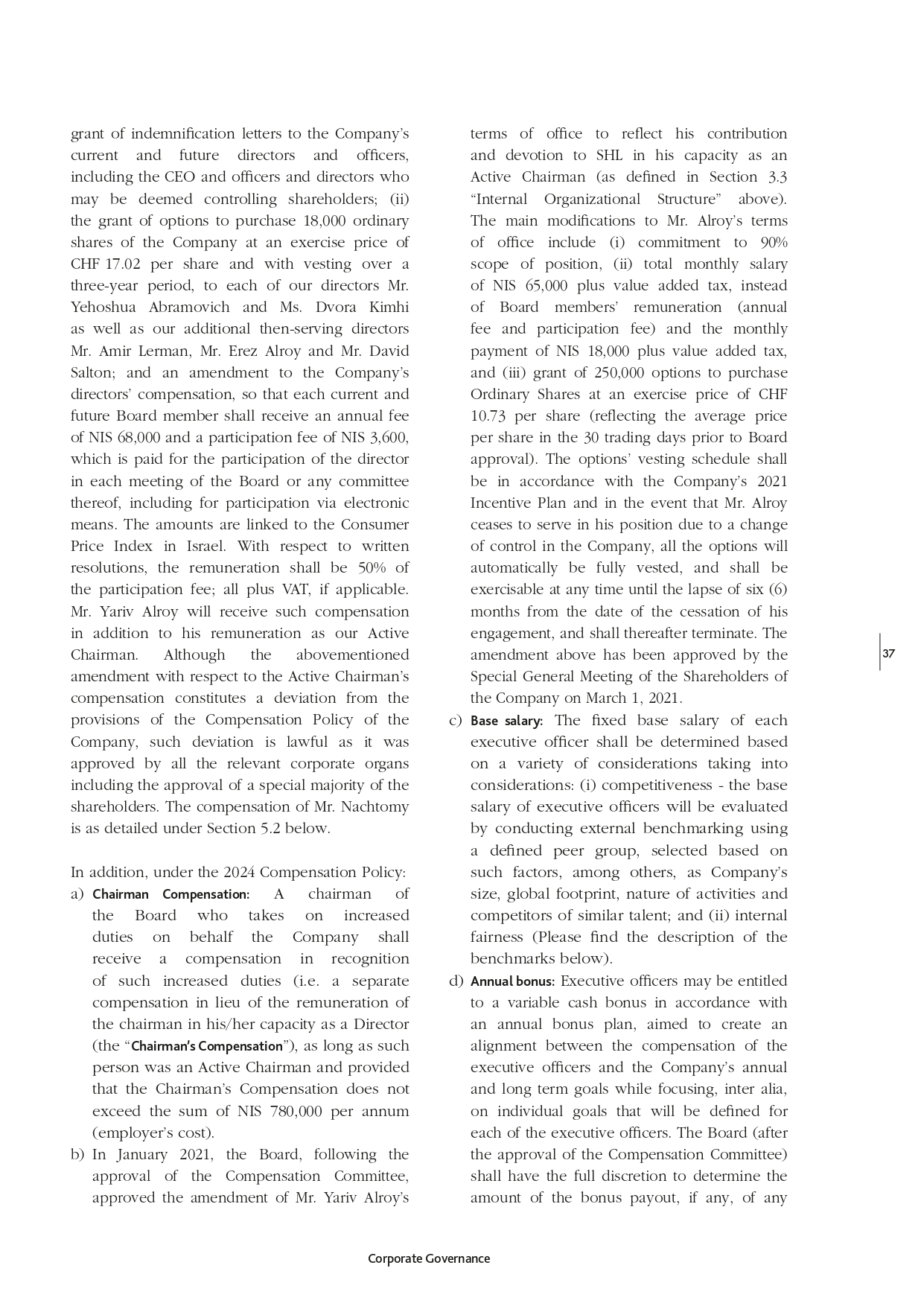
grant of indemnification letters to the Company’s current and future directors and officers, including the CEO and officers and directors who
may be deemed controlling shareholders; (ii) the grant of options to purchase 18,000 ordinary shares of the Company at an exercise price of CHF 17.02 per share and with vesting over a three-year period, to each of our directors Mr. Yehoshua
Abramovich and Ms. Dvora Kimhi as well as our additional then-serving directors Mr. Amir Lerman, Mr. Erez Alroy and Mr. David Salton; and an amendment to the Company’s directors’ compensation, so that each current and future Board member shall
receive an annual fee of NIS 68,000 and a participation fee of NIS 3,600, which is paid for the participation of the director in each meeting of the Board or any committee thereof, including for participation via electronic means. The amounts are
linked to the Consumer Price Index in Israel. With respect to written resolutions, the remuneration shall be 50% of the participation fee; all plus VAT, if applicable. Mr. Yariv Alroy will receive such compensation in addition to his remuneration as
our Active Chairman. Although the abovementioned amendment with respect to the Active Chairman’s compensation constitutes a deviation from the provisions of the Compensation Policy of the Company, such deviation is lawful as it was approved by all
the relevant corporate organs including the approval of a special majority of the shareholders. The compensation of Mr. Nachtomy is as detailed under Section 5.2 below. In addition, under the 2024 Compensation Policy: a) Chairman Compensation: A
chairman of the Board who takes on increased duties on behalf the Company shall receive a compensation in recognition of such increased duties (i.e. a separate compensation in lieu of the remuneration of the chairman in his/her capacity as a Director
(the “Chairman’s Compensation”), as long as such person was an Active Chairman and provided that the Chairman’s Compensation does not exceed the sum of NIS 780,000 per annum (employer’s cost). b) In January 2021, the Board, following the approval of
the Compensation Committee, approved the amendment of Mr. Yariv Alroy’s terms of office to reflect his contribution and devotion to SHL in his capacity as an Active Chairman (as defined in Section 3.3 “Internal Organizational Structure” above). The
main modifications to Mr. Alroy’s terms of office include (i) commitment to 90% scope of position, (ii) total monthly salary of NIS 65,000 plus value added tax, instead of Board members’ remuneration (annual fee and participation fee) and the monthly
payment of NIS 18,000 plus value added tax, and (iii) grant of 250,000 options to purchase Ordinary Shares at an exercise price of CHF 10.73 per share (reflecting the average price per share in the 30 trading days prior to Board approval). The
options’ vesting schedule shall be in accordance with the Company’s 2021 Incentive Plan and in the event that Mr. Alroy ceases to serve in his position due to a change of control in the Company, all the options will automatically be fully vested, and
shall be exercisable at any time until the lapse of six (6) months from the date of the cessation of his engagement, and shall thereafter terminate. The amendment above has been approved by the Special General Meeting of the Shareholders of the
Company on March 1, 2021. c) Base salary: The fixed base salary of each executive officer shall be determined based on a variety of considerations taking into considerations: (i) competitiveness - the base salary of executive officers will be
evaluated by conducting external benchmarking using a defined peer group, selected based on such factors, among others, as Company’s size, global footprint, nature of activities and competitors of similar talent; and (ii) internal fairness (Please
find the description of the benchmarks below). d) Annual bonus: Executive officers may be entitled to a variable cash bonus in accordance with an annual bonus plan, aimed to create an alignment between the compensation of the executive officers and
the Company’s annual and long term goals while focusing, inter alia, on individual goals that will be defined for each of the executive officers. The Board (after the approval of the Compensation Committee) shall have the full discretion to determine
the amount of the bonus payout, if any, of any Corporate Governance 37
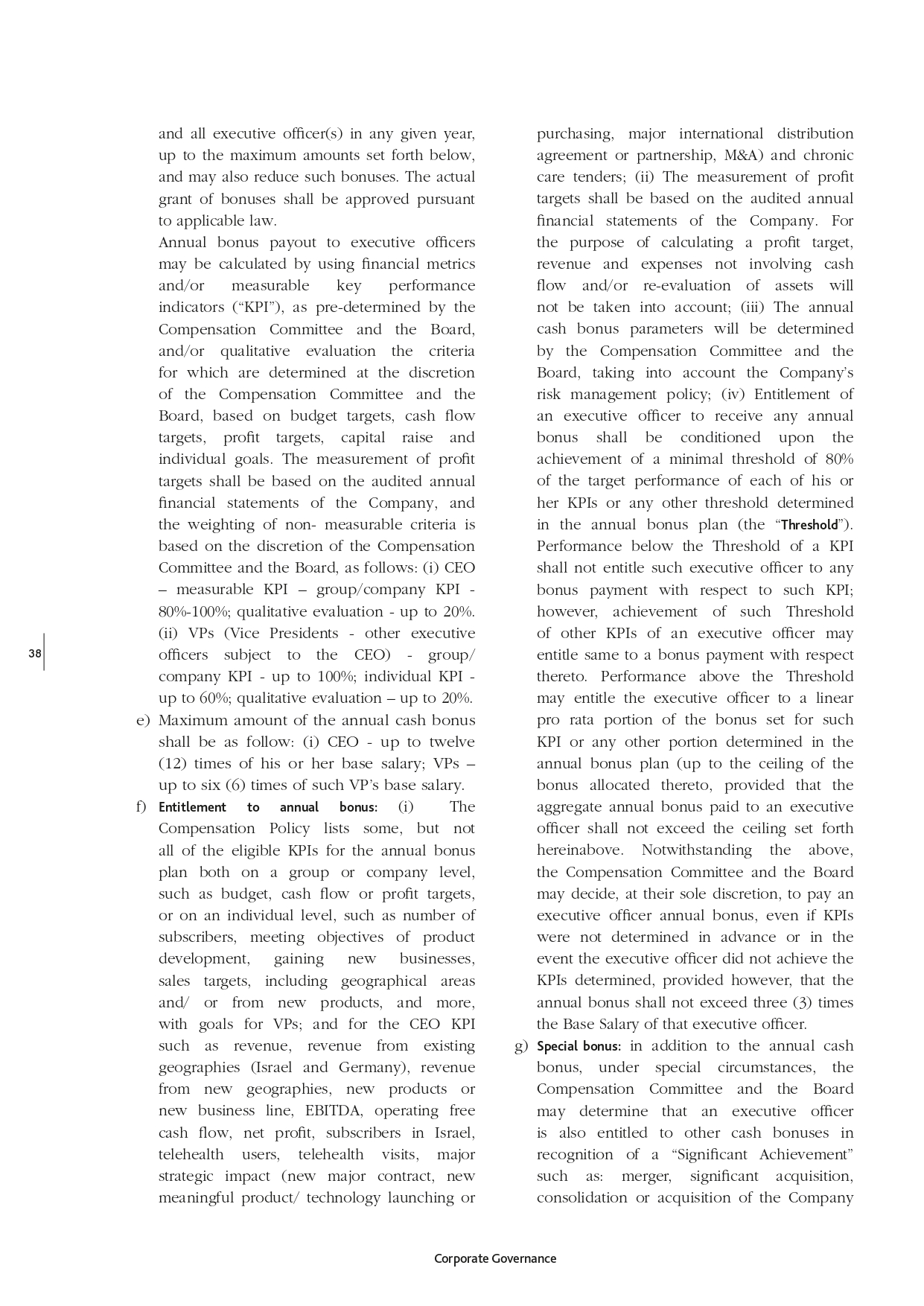
38 and all executive officer(s) in any given year, up to the maximum amounts set forth below, and may also reduce such bonuses. The actual grant
of bonuses shall be approved pursuant to applicable law. Annual bonus payout to executive officers may be calculated by using financial metrics and/or measurable key performance indicators (“KPI”), as pre-determined by the Compensation Committee and
the Board, and/or qualitative evaluation the criteria for which are determined at the discretion of the Compensation Committee and the Board, based on budget targets, cash flow targets, profit targets, capital raise and individual goals. The
measurement of profit targets shall be based on the audited annual financial statements of the Company, and the weighting of non- measurable criteria is based on the discretion of the Compensation Committee and the Board, as follows: (i) CEO –
measurable KPI – group/company KPI 80%-100%; qualitative evaluation - up to 20%. (ii) VPs (Vice Presidents - other executive officers subject to the CEO) - group/ company KPI - up to 100%; individual KPI up to 60%; qualitative evaluation – up to 20%.
e) Maximum amount of the annual cash bonus shall be as follow: (i) CEO - up to twelve (12) times of his or her base salary; VPs – up to six (6) times of such VP’s base salary. f) Entitlement to annual bonus: (i) The Compensation Policy lists some,
but not all of the eligible KPIs for the annual bonus plan both on a group or company level, such as budget, cash flow or profit targets, or on an individual level, such as number of subscribers, meeting objectives of product development, gaining new
businesses, sales targets, including geographical areas and/ or from new products, and more, with goals for VPs; and for the CEO KPI such as revenue, revenue from existing geographies (Israel and Germany), revenue from new geographies, new products
or new business line, EBITDA, operating free cash flow, net profit, subscribers in Israel, telehealth users, telehealth visits, major strategic impact (new major contract, new meaningful product/ technology launching or purchasing, major
international distribution agreement or partnership, M&A) and chronic care tenders; (ii) The measurement of profit targets shall be based on the audited annual financial statements of the Company. For the purpose of calculating a profit target,
revenue and expenses not involving cash flow and/or re-evaluation of assets will not be taken into account; (iii) The annual cash bonus parameters will be determined by the Compensation Committee and the Board, taking into account the Company’s risk
management policy; (iv) Entitlement of an executive officer to receive any annual bonus shall be conditioned upon the achievement of a minimal threshold of 80% of the target performance of each of his or her KPIs or any other threshold determined in
the annual bonus plan (the “Threshold”). Performance below the Threshold of a KPI shall not entitle such executive officer to any bonus payment with respect to such KPI; however, achievement of such Threshold of other KPIs of an executive officer may
entitle same to a bonus payment with respect thereto. Performance above the Threshold may entitle the executive officer to a linear pro rata portion of the bonus set for such KPI or any other portion determined in the annual bonus plan (up to the
ceiling of the bonus allocated thereto, provided that the aggregate annual bonus paid to an executive officer shall not exceed the ceiling set forth hereinabove. Notwithstanding the above, the Compensation Committee and the Board may decide, at their
sole discretion, to pay an executive officer annual bonus, even if KPIs were not determined in advance or in the event the executive officer did not achieve the KPIs determined, provided however, that the annual bonus shall not exceed three (3) times
the Base Salary of that executive officer. g) Special bonus: in addition to the annual cash bonus, under special circumstances, the Compensation Committee and the Board may determine that an executive officer is also entitled to other cash bonuses in
recognition of a “Significant Achievement” such as: merger, significant acquisition, consolidation or acquisition of the Company Corporate Governance

with, by or into another corporation or entity; private placements to a strategic investor; public offering in a sum and a valuation
predetermined by the Board: “Significant Achievement” – for the purpose of this Section means an increase of at least 20% of the Company’s equity or Company’s market value or Company’s annual revenue. The total amount of special cash bonuses awarded
to an executive officer for any given calendar year may be up to six (6) times of the base salary of the CEO and three (3) times of the base salary of any other executive officer. In the year under review, the Company did not grant any special bonus.
h) Share-based compensation: (i) The fair value of the share based compensation shall not exceed the following for one year (i.e. the fair value of the share base compensation at the time of the grant divided, linearly, to the number of the years
until all the share based compensation is vested): for an executive officer other than the CEO – one and half (1.5) times such executive officer’s yearly base salary, for the CEO – shall not exceed two and a half (2.5) times the CEO’s yearly base
salary, and for all Directors as a group – an amount of USD 800,000; (ii) acceleration in a change of control event: in the event of a Corporate Transaction (as such term is defined under the Company’s 2021 Executive and Key Employee Share Incentive
Plan, see Section 2.2, or any share incentive plan as in effect, from time to time), or in the event of termination by the Company of an executive officer (except for “cause”) in a Change of Control event (as defined under law), subject to the
recommendation and approval of the Compensation Committee (and subject to shareholder approval, if required under the Companies Law), the Board may authorize and approve the acceleration of all or any part of any unvested options outstanding
immediately prior to the consummation of the Transaction. The share-based compensation is additional to the base- salary and does not constitute a part thereof. i) Advance notice period: The advance notice period shall be determined individually with
respect to each executive officer, and shall not exceed a period of four (4) months advance notice for the CEO and three (3) months periods for other executive officers. j) Retirement grant: An executive officer may become entitled to a retirement
grant in the event of termination by the Company (except for “cause”), such grant to be examined in light of the period of service or employment of the executive officer in the Company, the terms of service, the Company’s performance during said
period, the contribution of the executive officer to achieving the Company’s goals and its profitability, and the circumstances of retirement. The amount or value of such retirement grant shall not exceed an additional six (6) months for the CEO
(provided he is not a controlling shareholder) and three (3) months for the executive officers, of base salary, all in addition to the advance notice. In the year under review the Company has not awarded any retirement grants. k) Retirement grant in
a Change of Control event: Upon termination of service or employment by the Company (except for “cause”) of the CEO, or by the CEO (provided he is not a controlling shareholder) resulting from a Change of Control event, and during a six months period
following the closing date of such event, such terminated CEO may be entitled to an additional retirement grant of up to three (3) times of such CEO monthly base salary. Company may elect to pay such additional grant, to the extent approved, by
acceleration of any future grants to the extent same exist under the employment agreement of any so eligible CEO. “Change of Control”– as such term is defined under the Israeli Companies Law. During the process of approval of the Compensation Policy
the Compensation Committee and the Board have been presented and have taken into account a benchmark paper prepared by an impartial external consultant, with whom the Company is not otherwise engaged. The companies included in the benchmark were
twelve (12) public companies traded on the Tel Aviv Stock Exchange in the fields of commerce and services or technology, with revenues of up to three (3) times that of the Company. Corporate Governance 39
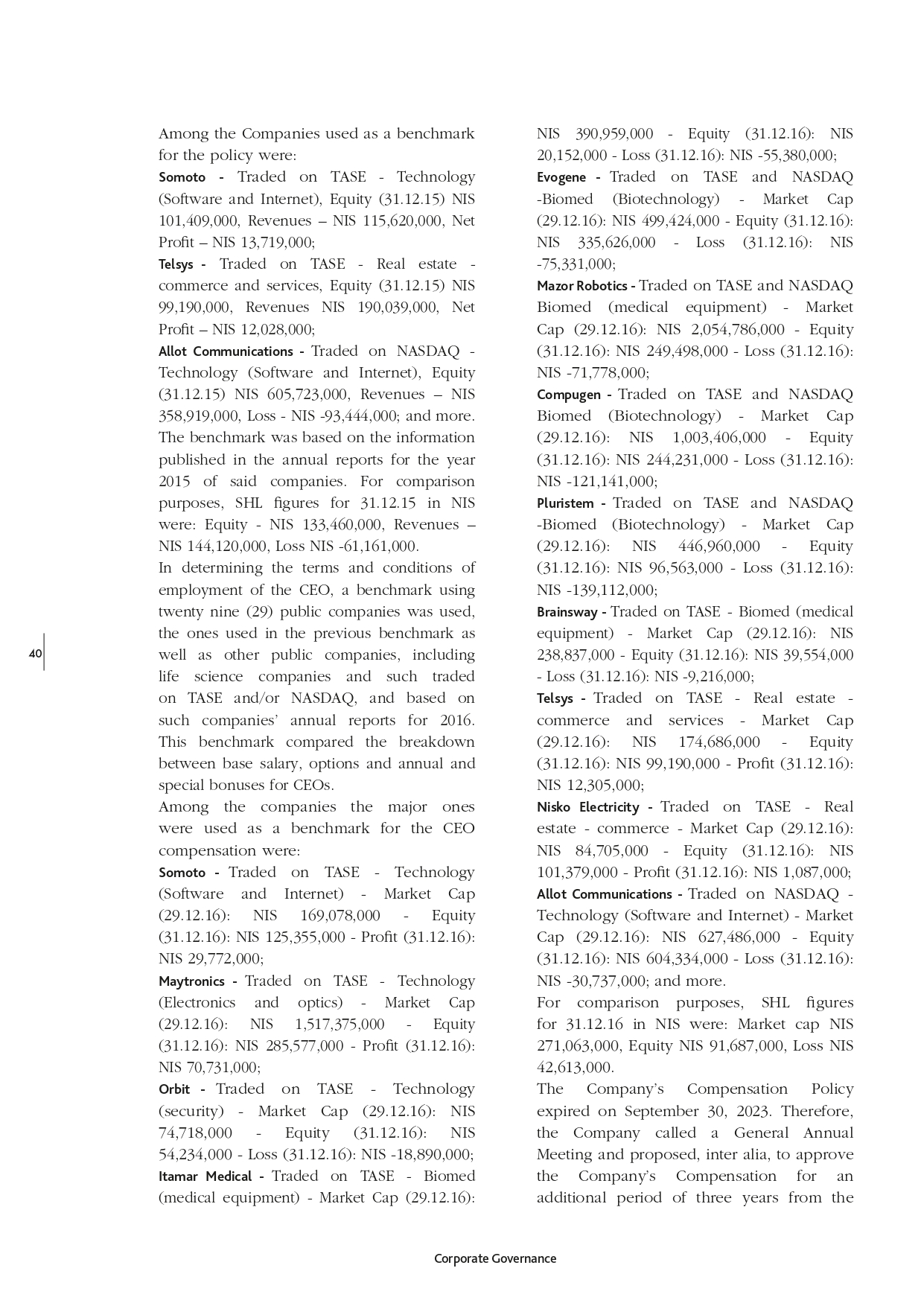
40 Among the Companies used as a benchmark for the policy were: Somoto - Traded on TASE - Technology (Software and Internet), Equity (31.12.15)
NIS 101,409,000, Revenues – NIS 115,620,000, Net Profit – NIS 13,719,000; Telsys - Traded on TASE - Real estate commerce and services, Equity (31.12.15) NIS 99,190,000, Revenues NIS 190,039,000, Net Profit – NIS 12,028,000; Allot Communications -
Traded on NASDAQ Technology (Software and Internet), Equity (31.12.15) NIS 605,723,000, Revenues – NIS 358,919,000, Loss - NIS -93,444,000; and more. The benchmark was based on the information published in the annual reports for the year 2015 of said
companies. For comparison purposes, SHL figures for 31.12.15 in NIS were: Equity - NIS 133,460,000, Revenues – NIS 144,120,000, Loss NIS -61,161,000. In determining the terms and conditions of employment of the CEO, a benchmark using twenty nine (29)
public companies was used, the ones used in the previous benchmark as well as other public companies, including life science companies and such traded on TASE and/or NASDAQ, and based on such companies’ annual reports for 2016. This benchmark
compared the breakdown between base salary, options and annual and special bonuses for CEOs. Among the companies the major ones were used as a benchmark for the CEO compensation were: Somoto - Traded on TASE - Technology (Software and Internet) -
Market Cap (29.12.16): NIS 169,078,000 - Equity (31.12.16): NIS 125,355,000 - Profit (31.12.16): NIS 29,772,000; Maytronics - Traded on TASE - Technology (Electronics and optics) - Market Cap (29.12.16): NIS 1,517,375,000 - Equity (31.12.16): NIS
285,577,000 - Profit (31.12.16): NIS 70,731,000; Orbit - Traded on TASE - Technology (security) - Market Cap (29.12.16): NIS 74,718,000 - Equity (31.12.16): NIS 54,234,000 - Loss (31.12.16): NIS -18,890,000; Itamar Medical - Traded on TASE - Biomed
(medical equipment) - Market Cap (29.12.16): NIS 390,959,000 - Equity (31.12.16): NIS 20,152,000 - Loss (31.12.16): NIS -55,380,000; Evogene - Traded on TASE and NASDAQ -Biomed (Biotechnology) - Market Cap (29.12.16): NIS 499,424,000 - Equity
(31.12.16): NIS 335,626,000 - Loss (31.12.16): NIS -75,331,000; Mazor Robotics - Traded on TASE and NASDAQ Biomed (medical equipment) - Market Cap (29.12.16): NIS 2,054,786,000 - Equity (31.12.16): NIS 249,498,000 - Loss (31.12.16): NIS -71,778,000;
Compugen - Traded on TASE and NASDAQ Biomed (Biotechnology) - Market Cap (29.12.16): NIS 1,003,406,000 - Equity (31.12.16): NIS 244,231,000 - Loss (31.12.16): NIS -121,141,000; Pluristem - Traded on TASE and NASDAQ -Biomed (Biotechnology) - Market
Cap (29.12.16): NIS 446,960,000 - Equity (31.12.16): NIS 96,563,000 - Loss (31.12.16): NIS -139,112,000; Brainsway - Traded on TASE - Biomed (medical equipment) - Market Cap (29.12.16): NIS 238,837,000 - Equity (31.12.16): NIS 39,554,000 - Loss
(31.12.16): NIS -9,216,000; Telsys - Traded on TASE - Real estate commerce and services - Market Cap (29.12.16): NIS 174,686,000 - Equity (31.12.16): NIS 99,190,000 - Profit (31.12.16): NIS 12,305,000; Nisko Electricity - Traded on TASE - Real estate
- commerce - Market Cap (29.12.16): NIS 84,705,000 - Equity (31.12.16): NIS 101,379,000 - Profit (31.12.16): NIS 1,087,000; Allot Communications - Traded on NASDAQ Technology (Software and Internet) - Market Cap (29.12.16): NIS 627,486,000 - Equity
(31.12.16): NIS 604,334,000 - Loss (31.12.16): NIS -30,737,000; and more. For comparison purposes, SHL figures for 31.12.16 in NIS were: Market cap NIS 271,063,000, Equity NIS 91,687,000, Loss NIS 42,613,000. The Company’s Compensation Policy expired
on September 30, 2023. Therefore, the Company called a General Annual Meeting and proposed, inter alia, to approve the Company’s Compensation for an additional period of three years from the Corporate Governance
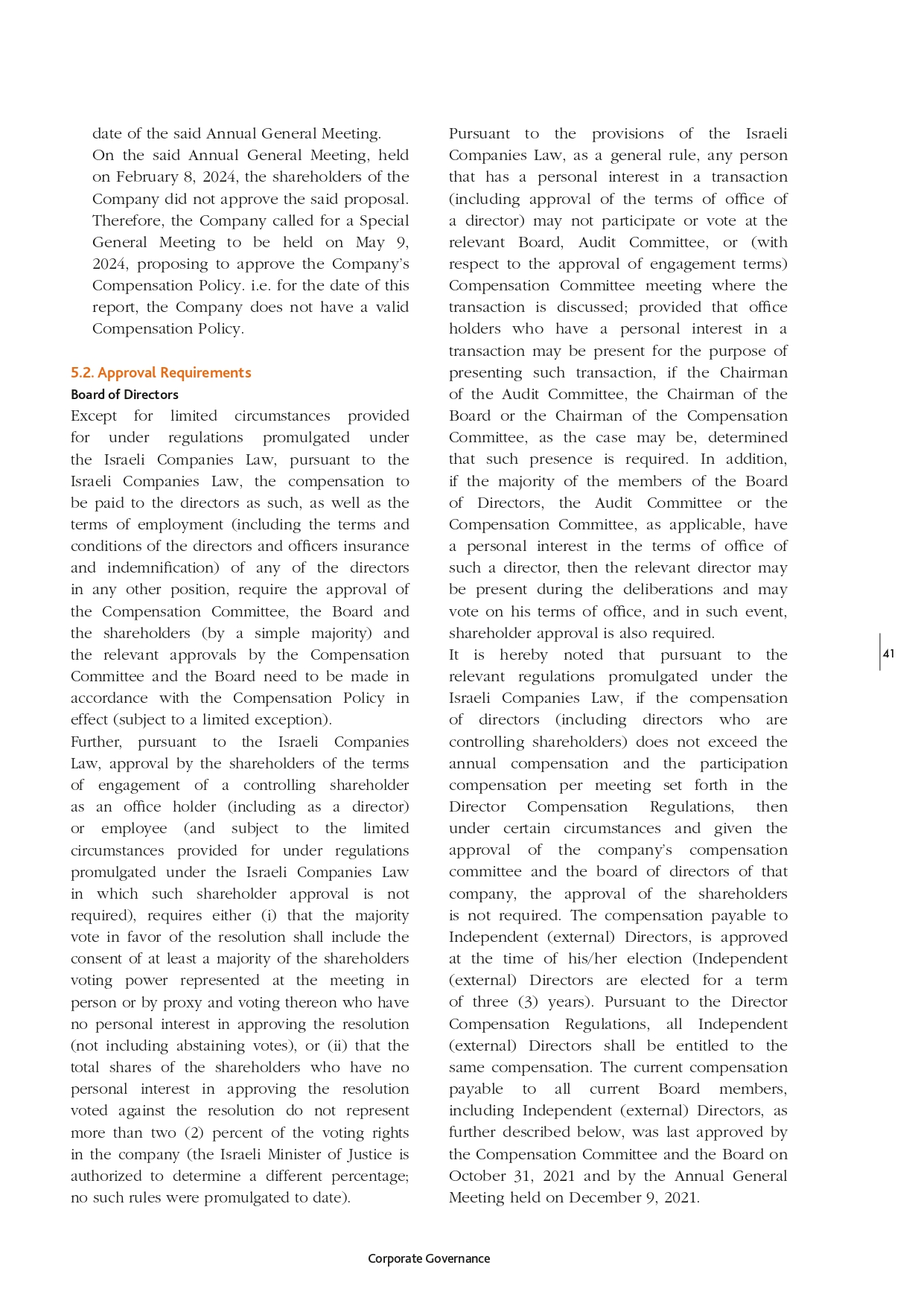
date of the said Annual General Meeting. On the said Annual General Meeting, held on February 8, 2024, the shareholders of the Company did not
approve the said proposal. Therefore, the Company called for a Special General Meeting to be held on May 9, 2024, proposing to approve the Company’s Compensation Policy. i.e. for the date of this report, the Company does not have a valid Compensation
Policy. 5.2. Approval Requirements Board of Directors Except for limited circumstances provided for under regulations promulgated under the Israeli Companies Law, pursuant to the Israeli Companies Law, the compensation to be paid to the directors as
such, as well as the terms of employment (including the terms and conditions of the directors and officers insurance and indemnification) of any of the directors in any other position, require the approval of the Compensation Committee, the Board and
the shareholders (by a simple majority) and the relevant approvals by the Compensation Committee and the Board need to be made in accordance with the Compensation Policy in effect (subject to a limited exception). Further, pursuant to the Israeli
Companies Law, approval by the shareholders of the terms of engagement of a controlling shareholder as an office holder (including as a director) or employee (and subject to the limited circumstances provided for under regulations promulgated under
the Israeli Companies Law in which such shareholder approval is not required), requires either (i) that the majority vote in favor of the resolution shall include the consent of at least a majority of the shareholders voting power represented at the
meeting in person or by proxy and voting thereon who have no personal interest in approving the resolution (not including abstaining votes), or (ii) that the total shares of the shareholders who have no personal interest in approving the resolution
voted against the resolution do not represent more than two (2) percent of the voting rights in the company (the Israeli Minister of Justice is authorized to determine a different percentage; no such rules were promulgated to date). Pursuant to the
provisions of the Israeli Companies Law, as a general rule, any person that has a personal interest in a transaction (including approval of the terms of office of a director) may not participate or vote at the relevant Board, Audit Committee, or
(with respect to the approval of engagement terms) Compensation Committee meeting where the transaction is discussed; provided that office holders who have a personal interest in a transaction may be present for the purpose of presenting such
transaction, if the Chairman of the Audit Committee, the Chairman of the Board or the Chairman of the Compensation Committee, as the case may be, determined that such presence is required. In addition, if the majority of the members of the Board of
Directors, the Audit Committee or the Compensation Committee, as applicable, have a personal interest in the terms of office of such a director, then the relevant director may be present during the deliberations and may vote on his terms of office,
and in such event, shareholder approval is also required. It is hereby noted that pursuant to the relevant regulations promulgated under the Israeli Companies Law, if the compensation of directors (including directors who are controlling
shareholders) does not exceed the annual compensation and the participation compensation per meeting set forth in the Director Compensation Regulations, then under certain circumstances and given the approval of the company’s compensation committee
and the board of directors of that company, the approval of the shareholders is not required. The compensation payable to Independent (external) Directors, is approved at the time of his/her election (Independent (external) Directors are elected for
a term of three (3) years). Pursuant to the Director Compensation Regulations, all Independent (external) Directors shall be entitled to the same compensation. The current compensation payable to all current Board members, including Independent
(external) Directors, as further described below, was last approved by the Compensation Committee and the Board on October 31, 2021 and by the Annual General Meeting held on December 9, 2021. Corporate Governance 41
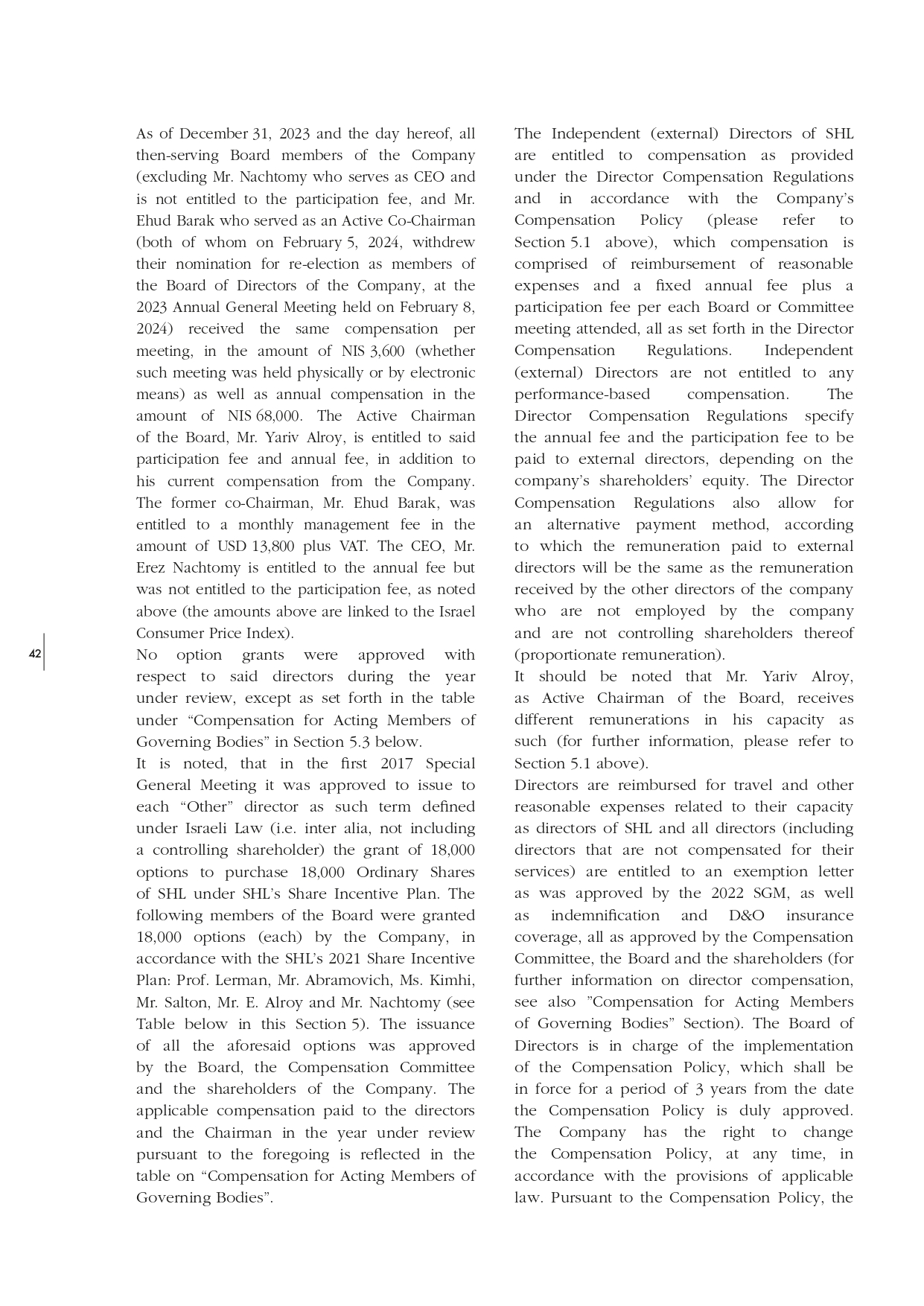
42 As of December 31, 2023 and the day hereof, all then-serving Board members of the Company (excluding Mr. Nachtomy who serves as CEO and is
not entitled to the participation fee, and Mr. Ehud Barak who served as an Active Co-Chairman (both of whom on February 5, 2024, withdrew their nomination for re-election as members of the Board of Directors of the Company, at the 2023 Annual General
Meeting held on February 8, 2024) received the same compensation per meeting, in the amount of NIS 3,600 (whether such meeting was held physically or by electronic means) as well as annual compensation in the amount of NIS 68,000. The Active Chairman
of the Board, Mr. Yariv Alroy, is entitled to said participation fee and annual fee, in addition to his current compensation from the Company. The former co-Chairman, Mr. Ehud Barak, was entitled to a monthly management fee in the amount of USD
13,800 plus VAT. The CEO, Mr. Erez Nachtomy is entitled to the annual fee but was not entitled to the participation fee, as noted above (the amounts above are linked to the Israel Consumer Price Index). No option grants were approved with respect to
said directors during the year under review, except as set forth in the table under “Compensation for Acting Members of Governing Bodies” in Section 5.3 below. It is noted, that in the first 2017 Special General Meeting it was approved to issue to
each “Other” director as such term defined under Israeli Law (i.e. inter alia, not including a controlling shareholder) the grant of 18,000 options to purchase 18,000 Ordinary Shares of SHL under SHL’s Share Incentive Plan. The following members of
the Board were granted 18,000 options (each) by the Company, in accordance with the SHL’s 2021 Share Incentive Plan: Prof. Lerman, Mr. Abramovich, Ms. Kimhi, Mr. Salton, Mr. E. Alroy and Mr. Nachtomy (see Table below in this Section 5). The issuance
of all the aforesaid options was approved by the Board, the Compensation Committee and the shareholders of the Company. The applicable compensation paid to the directors and the Chairman in the year under review pursuant to the foregoing is reflected
in the table on “Compensation for Acting Members of Governing Bodies”. The Independent (external) Directors of SHL are entitled to compensation as provided under the Director Compensation Regulations and in accordance with the Company’s Compensation
Policy (please refer to Section 5.1 above), which compensation is comprised of reimbursement of reasonable expenses and a fixed annual fee plus a participation fee per each Board or Committee meeting attended, all as set forth in the Director
Compensation Regulations. Independent (external) Directors are not entitled to any performance-based compensation. The Director Compensation Regulations specify the annual fee and the participation fee to be paid to external directors, depending on
the company’s shareholders’ equity. The Director Compensation Regulations also allow for an alternative payment method, according to which the remuneration paid to external directors will be the same as the remuneration received by the other
directors of the company who are not employed by the company and are not controlling shareholders thereof (proportionate remuneration). It should be noted that Mr. Yariv Alroy, as Active Chairman of the Board, receives different remunerations in his
capacity as such (for further information, please refer to Section 5.1 above). Directors are reimbursed for travel and other reasonable expenses related to their capacity as directors of SHL and all directors (including directors that are not
compensated for their services) are entitled to an exemption letter as was approved by the 2022 SGM, as well as indemnification and D&O insurance coverage, all as approved by the Compensation Committee, the Board and the shareholders (for further
information on director compensation, see also ”Compensation for Acting Members of Governing Bodies” Section). The Board of Directors is in charge of the implementation of the Compensation Policy, which shall be in force for a period of 3 years from
the date the Compensation Policy is duly approved. The Company has the right to change the Compensation Policy, at any time, in accordance with the provisions of applicable law. Pursuant to the Compensation Policy, the
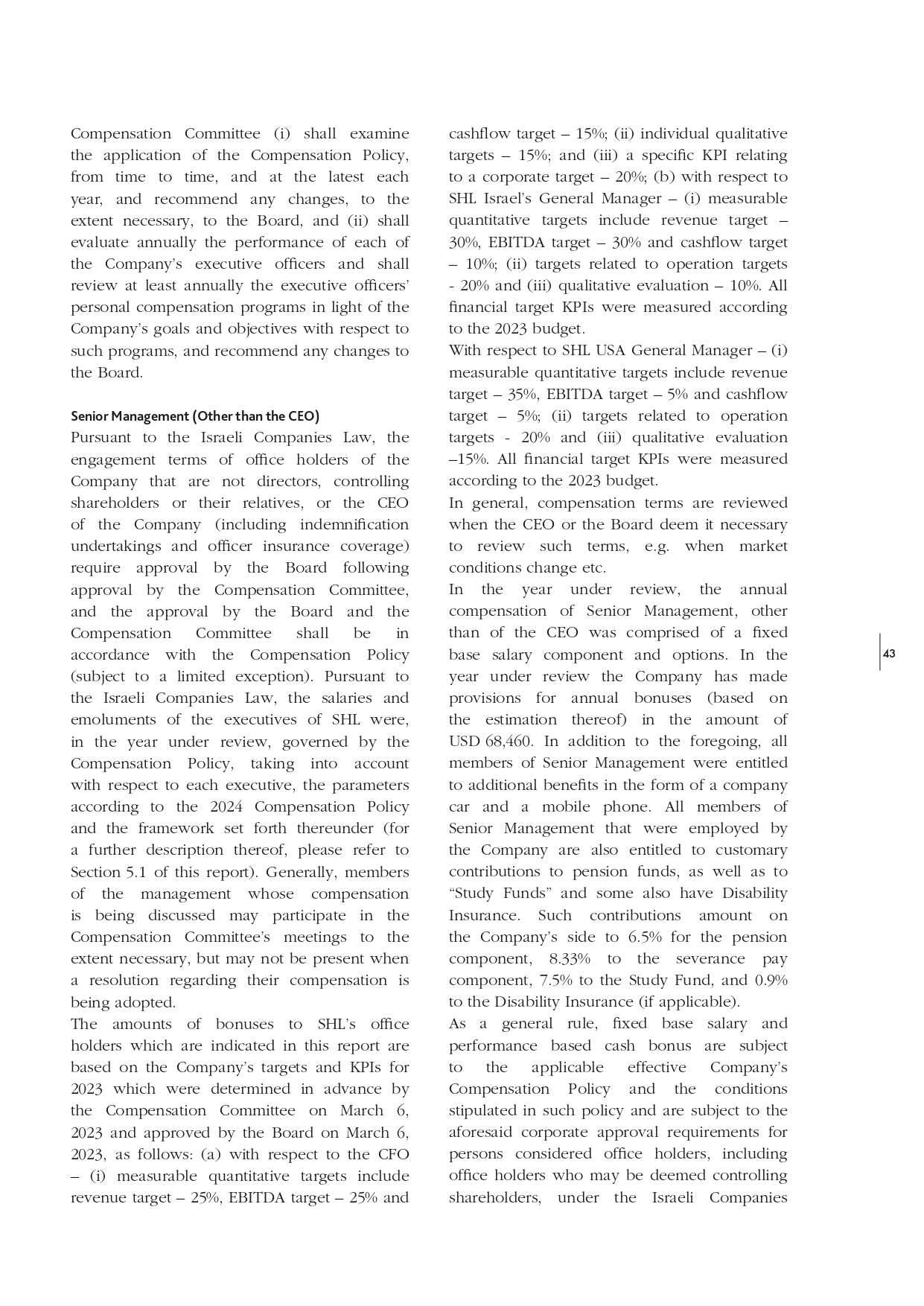
Compensation Committee (i) shall examine the application of the Compensation Policy, from time to time, and at the latest each year, and
recommend any changes, to the extent necessary, to the Board, and (ii) shall evaluate annually the performance of each of the Company’s executive officers and shall review at least annually the executive officers’ personal compensation programs in
light of the Company’s goals and objectives with respect to such programs, and recommend any changes to the Board. Senior Management (Other than the CEO) Pursuant to the Israeli Companies Law, the engagement terms of office holders of the Company
that are not directors, controlling shareholders or their relatives, or the CEO of the Company (including indemnification undertakings and officer insurance coverage) require approval by the Board following approval by the Compensation Committee, and
the approval by the Board and the Compensation Committee shall be in accordance with the Compensation Policy (subject to a limited exception). Pursuant to the Israeli Companies Law, the salaries and emoluments of the executives of SHL were, in the
year under review, governed by the Compensation Policy, taking into account with respect to each executive, the parameters according to the 2024 Compensation Policy and the framework set forth thereunder (for a further description thereof, please
refer to Section 5.1 of this report). Generally, members of the management whose compensation is being discussed may participate in the Compensation Committee’s meetings to the extent necessary, but may not be present when a resolution regarding
their compensation is being adopted. The amounts of bonuses to SHL’s office holders which are indicated in this report are based on the Company’s targets and KPIs for 2023 which were determined in advance by the Compensation Committee on March 6,
2023 and approved by the Board on March 6, 2023, as follows: (a) with respect to the CFO – (i) measurable quantitative targets include revenue target – 25%, EBITDA target – 25% and cashflow target – 15%; (ii) individual qualitative targets – 15%; and
(iii) a specific KPI relating to a corporate target – 20%; (b) with respect to SHL Israel’s General Manager – (i) measurable quantitative targets include revenue target – 30%, EBITDA target – 30% and cashflow target – 10%; (ii) targets related to
operation targets - 20% and (iii) qualitative evaluation – 10%. All financial target KPIs were measured according to the 2023 budget. With respect to SHL USA General Manager – (i) measurable quantitative targets include revenue target – 35%, EBITDA
target – 5% and cashflow target – 5%; (ii) targets related to operation targets - 20% and (iii) qualitative evaluation –15%. All financial target KPIs were measured according to the 2023 budget. In general, compensation terms are reviewed when the
CEO or the Board deem it necessary to review such terms, e.g. when market conditions change etc. In the year under review, the annual compensation of Senior Management, other than of the CEO was comprised of a fixed base salary component and options.
In the year under review the Company has made provisions for annual bonuses (based on the estimation thereof) in the amount of USD 68,460. In addition to the foregoing, all members of Senior Management were entitled to additional benefits in the form
of a company car and a mobile phone. All members of Senior Management that were employed by the Company are also entitled to customary contributions to pension funds, as well as to “Study Funds” and some also have Disability Insurance. Such
contributions amount on the Company’s side to 6.5% for the pension component, 8.33% to the severance pay component, 7.5% to the Study Fund, and 0.9% to the Disability Insurance (if applicable). As a general rule, fixed base salary and performance
based cash bonus are subject to the applicable effective Company’s Compensation Policy and the conditions stipulated in such policy and are subject to the aforesaid corporate approval requirements for persons considered office holders, including
office holders who may be deemed controlling shareholders, under the Israeli Companies 43
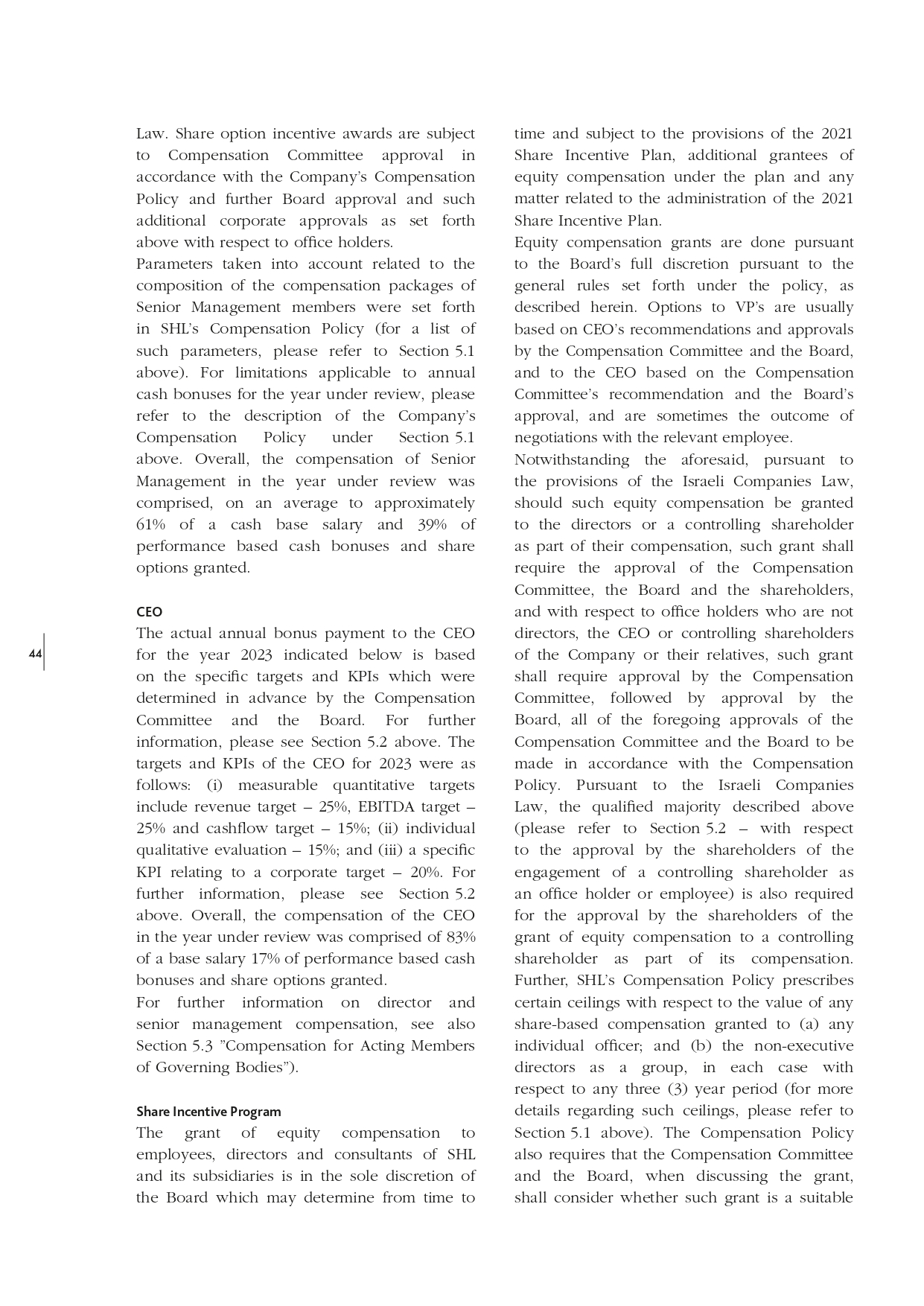
Law. Share option incentive awards are subject to Compensation Committee approval in accordance with the Company’s Compensation Policy and
further Board approval and such additional corporate approvals as set forth above with respect to office holders. Parameters taken into account related to the composition of the compensation packages of Senior Management members were set forth in
SHL’s Compensation Policy (for a list of such parameters, please refer to Section 5.1 above). For limitations applicable to annual cash bonuses for the year under review, please refer to the description of the Company’s Compensation Policy under
Section 5.1 above. Overall, the compensation of Senior Management in the year under review was comprised, on an average to approximately 61% of a cash base salary and 39% of performance based cash bonuses and share options granted. CEO 44 The actual
annual bonus payment to the CEO for the year 2023 indicated below is based on the specific targets and KPIs which were determined in advance by the Compensation Committee and the Board. For further information, please see Section 5.2 above. The
targets and KPIs of the CEO for 2023 were as follows: (i) measurable quantitative targets include revenue target – 25%, EBITDA target – 25% and cashflow target – 15%; (ii) individual qualitative evaluation – 15%; and (iii) a specific KPI relating to
a corporate target – 20%. For further information, please see Section 5.2 above. Overall, the compensation of the CEO in the year under review was comprised of 83% of a base salary 17% of performance based cash bonuses and share options granted. For
further information on director and senior management compensation, see also Section 5.3 ”Compensation for Acting Members of Governing Bodies”). Share Incentive Program The grant of equity compensation to employees, directors and consultants of SHL
and its subsidiaries is in the sole discretion of the Board which may determine from time to time and subject to the provisions of the 2021 Share Incentive Plan, additional grantees of equity compensation under the plan and any matter related to the
administration of the 2021 Share Incentive Plan. Equity compensation grants are done pursuant to the Board’s full discretion pursuant to the general rules set forth under the policy, as described herein. Options to VP’s are usually based on CEO’s
recommendations and approvals by the Compensation Committee and the Board, and to the CEO based on the Compensation Committee’s recommendation and the Board’s approval, and are sometimes the outcome of negotiations with the relevant employee.
Notwithstanding the aforesaid, pursuant to the provisions of the Israeli Companies Law, should such equity compensation be granted to the directors or a controlling shareholder as part of their compensation, such grant shall require the approval of
the Compensation Committee, the Board and the shareholders, and with respect to office holders who are not directors, the CEO or controlling shareholders of the Company or their relatives, such grant shall require approval by the Compensation
Committee, followed by approval by the Board, all of the foregoing approvals of the Compensation Committee and the Board to be made in accordance with the Compensation Policy. Pursuant to the Israeli Companies Law, the qualified majority described
above (please refer to Section 5.2 – with respect to the approval by the shareholders of the engagement of a controlling shareholder as an office holder or employee) is also required for the approval by the shareholders of the grant of equity
compensation to a controlling shareholder as part of its compensation. Further, SHL’s Compensation Policy prescribes certain ceilings with respect to the value of any share-based compensation granted to (a) any individual officer; and (b) the
non-executive directors as a group, in each case with respect to any three (3) year period (for more details regarding such ceilings, please refer to Section 5.1 above). The Compensation Policy also requires that the Compensation Committee and the
Board, when discussing the grant, shall consider whether such grant is a suitable
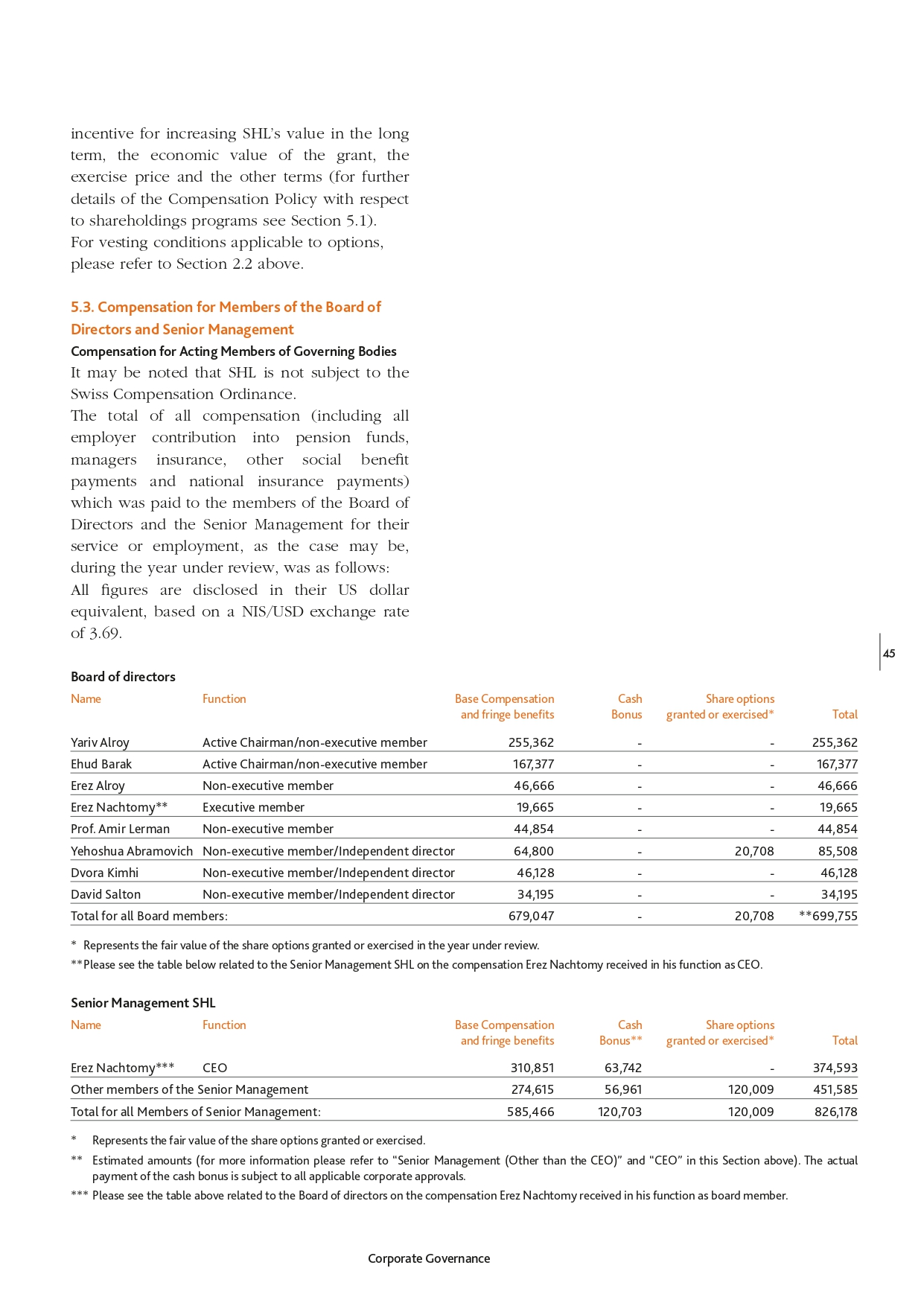
incentive for increasing SHL’s value in the long term, the economic value of the grant, the exercise price and the other terms (for further
details of the Compensation Policy with respect to shareholdings programs see Section 5.1). For vesting conditions applicable to options, please refer to Section 2.2 above. 5.3. Compensation for Members of the Board of Directors and Senior Management
Compensation for Acting Members of Governing Bodies It may be noted that SHL is not subject to the Swiss Compensation Ordinance. The total of all compensation (including all employer contribution into pension funds, managers insurance, other social
benefit payments and national insurance payments) which was paid to the members of the Board of Directors and the Senior Management for their service or employment, as the case may be, during the year under review, was as follows: All figures are
disclosed in their US dollar equivalent, based on a NIS/USD exchange rate of 3.69. 45 Board of directors Name Function Base Compensation and fringe benefits Cash Bonus Share options granted or exercised* Total Yariv Alroy Active
Chairman/non-executive member 255,362 - - 255,362 Ehud Barak Active Chairman/non-executive member 167,377 - - 167,377 Erez Alroy Non-executive member 46,666 - - 46,666 Erez Nachtomy** Executive member 19,665 - - 19,665 Prof. Amir Lerman Non-executive
member 44,854 - - 44,854 Yehoshua Abramovich Non-executive member/Independent director 64,800 - 20,708 85,508 Dvora Kimhi Non-executive member/Independent director 46,128 - - 46,128 David Salton Non-executive member/Independent director 34,195 - -
34,195 679,047 - 20,708 **699,755 Total for all Board members: * Represents the fair value of the share options granted or exercised in the year under review. ** Please see the table below related to the Senior Management SHL on the compensation Erez
Nachtomy received in his function as CEO. Senior Management SHL Name Function Erez Nachtomy*** Base Compensation and fringe benefits Cash Bonus** Share options granted or exercised* Total 310,851 63,742 - 374,593 CEO Other members of the Senior
Management 274,615 56,961 120,009 451,585 Total for all Members of Senior Management: 585,466 120,703 120,009 826,178 * Represents the fair value of the share options granted or exercised. ** Estimated amounts (for more information please refer to
“Senior Management (Other than the CEO)” and “CEO” in this Section above). The actual payment of the cash bonus is subject to all applicable corporate approvals. *** Please see the table above related to the Board of directors on the compensation
Erez Nachtomy received in his function as board member. Corporate Governance
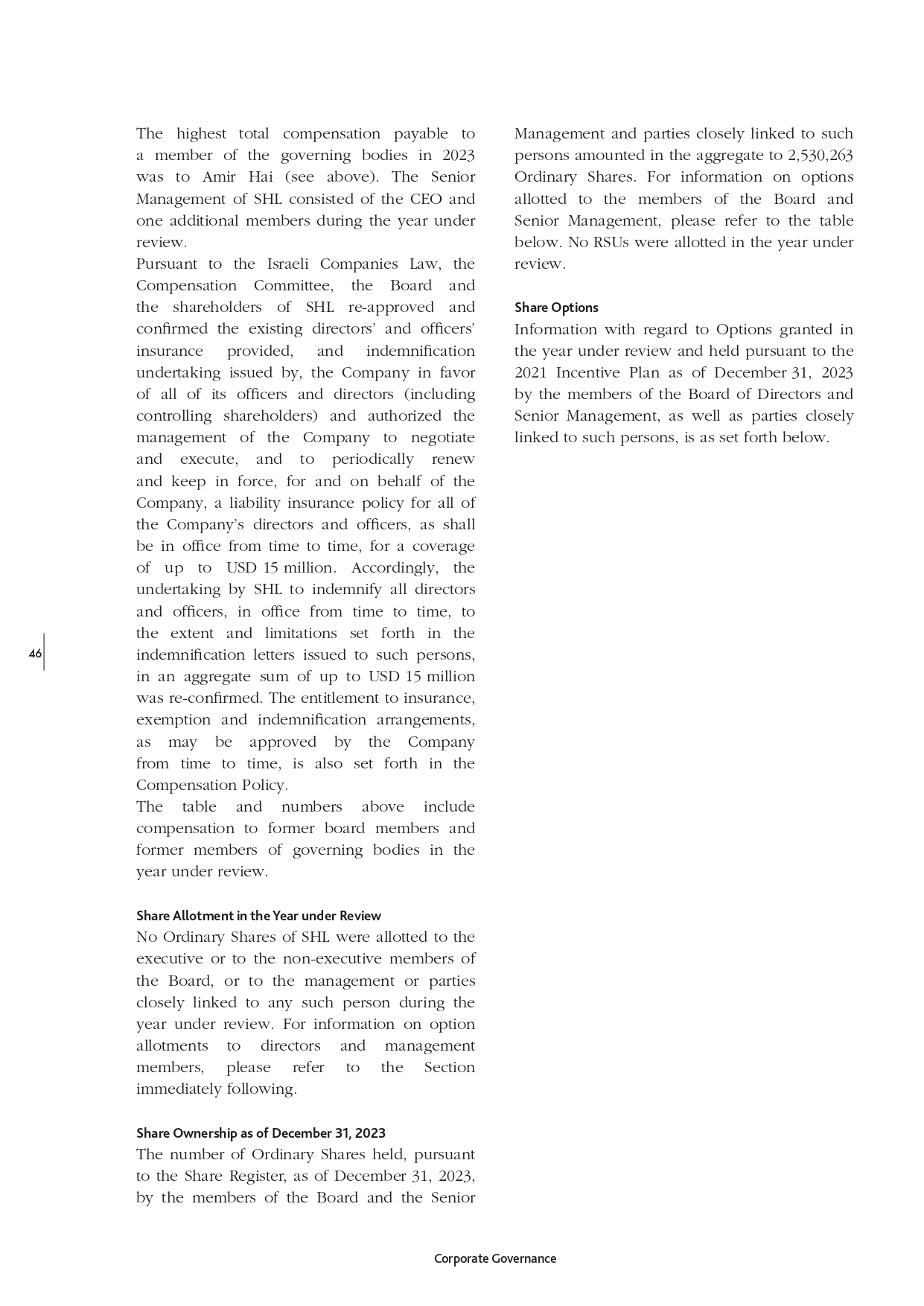
46 The highest total compensation payable to a member of the governing bodies in 2023 was to Amir Hai (see above). The Senior Management of SHL
consisted of the CEO and one additional members during the year under review. Pursuant to the Israeli Companies Law, the Compensation Committee, the Board and the shareholders of SHL re-approved and confirmed the existing directors’ and officers’
insurance provided, and indemnification undertaking issued by, the Company in favor of all of its officers and directors (including controlling shareholders) and authorized the management of the Company to negotiate and execute, and to periodically
renew and keep in force, for and on behalf of the Company, a liability insurance policy for all of the Company’s directors and officers, as shall be in office from time to time, for a coverage of up to USD 15 million. Accordingly, the undertaking by
SHL to indemnify all directors and officers, in office from time to time, to the extent and limitations set forth in the indemnification letters issued to such persons, in an aggregate sum of up to USD 15 million was re-confirmed. The entitlement to
insurance, exemption and indemnification arrangements, as may be approved by the Company from time to time, is also set forth in the Compensation Policy. The table and numbers above include compensation to former board members and former members of
governing bodies in the year under review. Management and parties closely linked to such persons amounted in the aggregate to 2,530,263 Ordinary Shares. For information on options allotted to the members of the Board and Senior Management, please
refer to the table below. No RSUs were allotted in the year under review. Share Options Information with regard to Options granted in the year under review and held pursuant to the 2021 Incentive Plan as of December 31, 2023 by the members of the
Board of Directors and Senior Management, as well as parties closely linked to such persons, is as set forth below. Share Allotment in the Year under Review No Ordinary Shares of SHL were allotted to the executive or to the non-executive members of
the Board, or to the management or parties closely linked to any such person during the year under review. For information on option allotments to directors and management members, please refer to the Section immediately following. Share Ownership as
of December 31, 2023 The number of Ordinary Shares held, pursuant to the Share Register, as of December 31, 2023, by the members of the Board and the Senior Corporate Governance
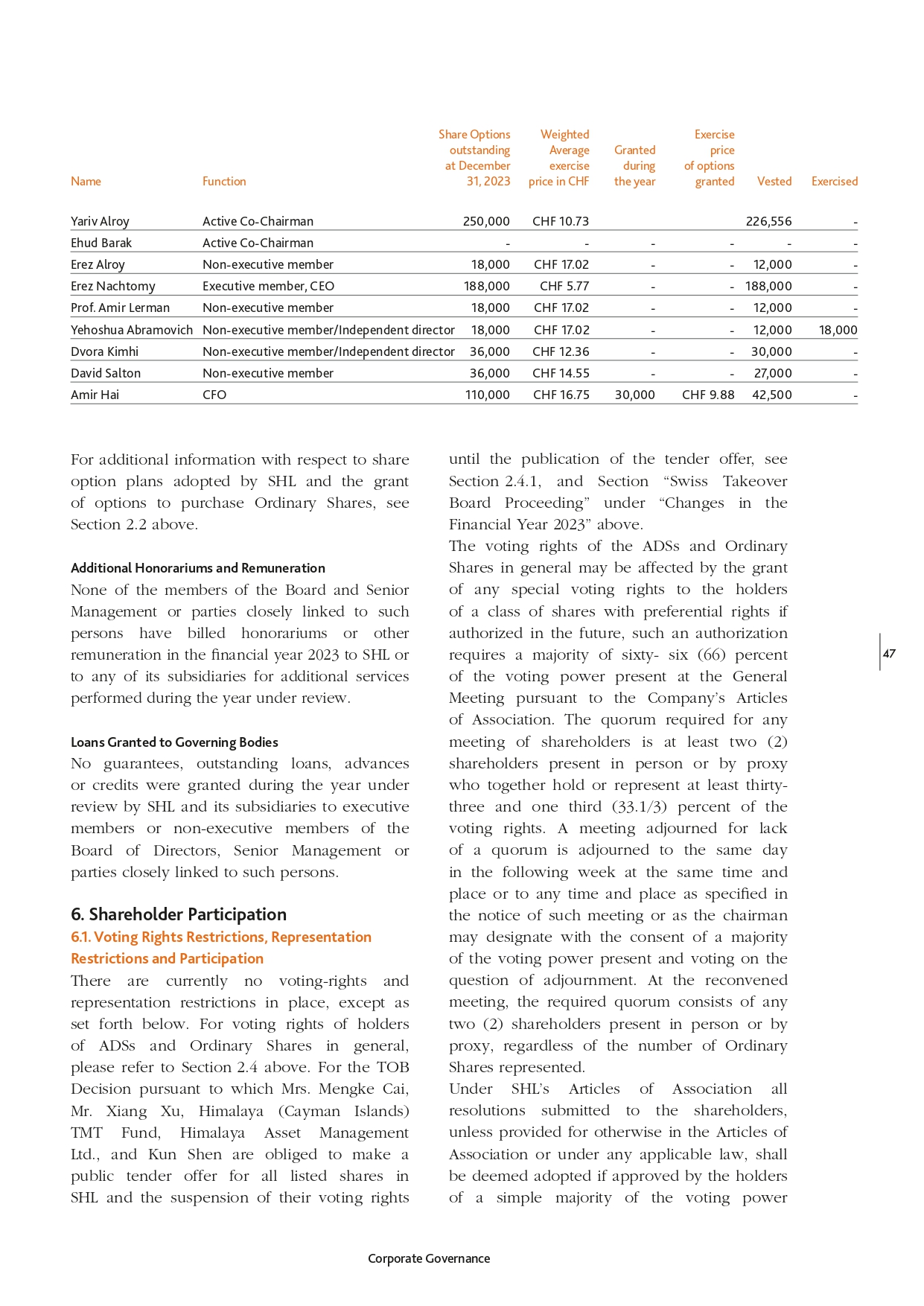
Name Function Share Options outstanding at December 31, 2023 Weighted Average Granted exercise during price in CHF the year Exercise price of
options granted Vested Exercised Yariv Alroy Active Co-Chairman 250,000 Ehud Barak Active Co-Chairman - CHF 10.73 226,556 - - - - - Erez Alroy Non-executive member 18,000 CHF 17.02 - - 12,000 - Erez Nachtomy Executive member, CEO 188,000 CHF 5.77 - -
188,000 - Prof. Amir Lerman Non-executive member 18,000 CHF 17.02 - - 12,000 - Yehoshua Abramovich Non-executive member/Independent director 18,000 CHF 17.02 - - 12,000 18,000 Dvora Kimhi Non-executive member/Independent director 36,000 CHF 12.36 - -
30,000 - David Salton Non-executive member 36,000 CHF 14.55 - - 27,000 - Amir Hai CFO 110,000 CHF 16.75 30,000 CHF 9.88 42,500 - For additional information with respect to share option plans adopted by SHL and the grant of options to purchase
Ordinary Shares, see Section 2.2 above. Additional Honorariums and Remuneration None of the members of the Board and Senior Management or parties closely linked to such persons have billed honorariums or other remuneration in the financial year 2023
to SHL or to any of its subsidiaries for additional services performed during the year under review. Loans Granted to Governing Bodies No guarantees, outstanding loans, advances or credits were granted during the year under review by SHL and its
subsidiaries to executive members or non-executive members of the Board of Directors, Senior Management or parties closely linked to such persons. 6. Shareholder Participation 6.1. Voting Rights Restrictions, Representation Restrictions and
Participation There are currently no voting-rights and representation restrictions in place, except as set forth below. For voting rights of holders of ADSs and Ordinary Shares in general, please refer to Section 2.4 above. For the TOB Decision
pursuant to which Mrs. Mengke Cai, Mr. Xiang Xu, Himalaya (Cayman Islands) TMT Fund, Himalaya Asset Management Ltd., and Kun Shen are obliged to make a public tender offer for all listed shares in SHL and the suspension of their voting rights until
the publication of the tender offer, see Section 2.4.1, and Section “Swiss Takeover Board Proceeding” under “Changes in the Financial Year 2023” above. The voting rights of the ADSs and Ordinary Shares in general may be affected by the grant of any
special voting rights to the holders of a class of shares with preferential rights if authorized in the future, such an authorization requires a majority of sixty- six (66) percent of the voting power present at the General Meeting pursuant to the
Company’s Articles of Association. The quorum required for any meeting of shareholders is at least two (2) shareholders present in person or by proxy who together hold or represent at least thirtythree and one third (33.1/3) percent of the voting
rights. A meeting adjourned for lack of a quorum is adjourned to the same day in the following week at the same time and place or to any time and place as specified in the notice of such meeting or as the chairman may designate with the consent of a
majority of the voting power present and voting on the question of adjournment. At the reconvened meeting, the required quorum consists of any two (2) shareholders present in person or by proxy, regardless of the number of Ordinary Shares
represented. Under SHL’s Articles of Association all resolutions submitted to the shareholders, unless provided for otherwise in the Articles of Association or under any applicable law, shall be deemed adopted if approved by the holders of a simple
majority of the voting power Corporate Governance 47
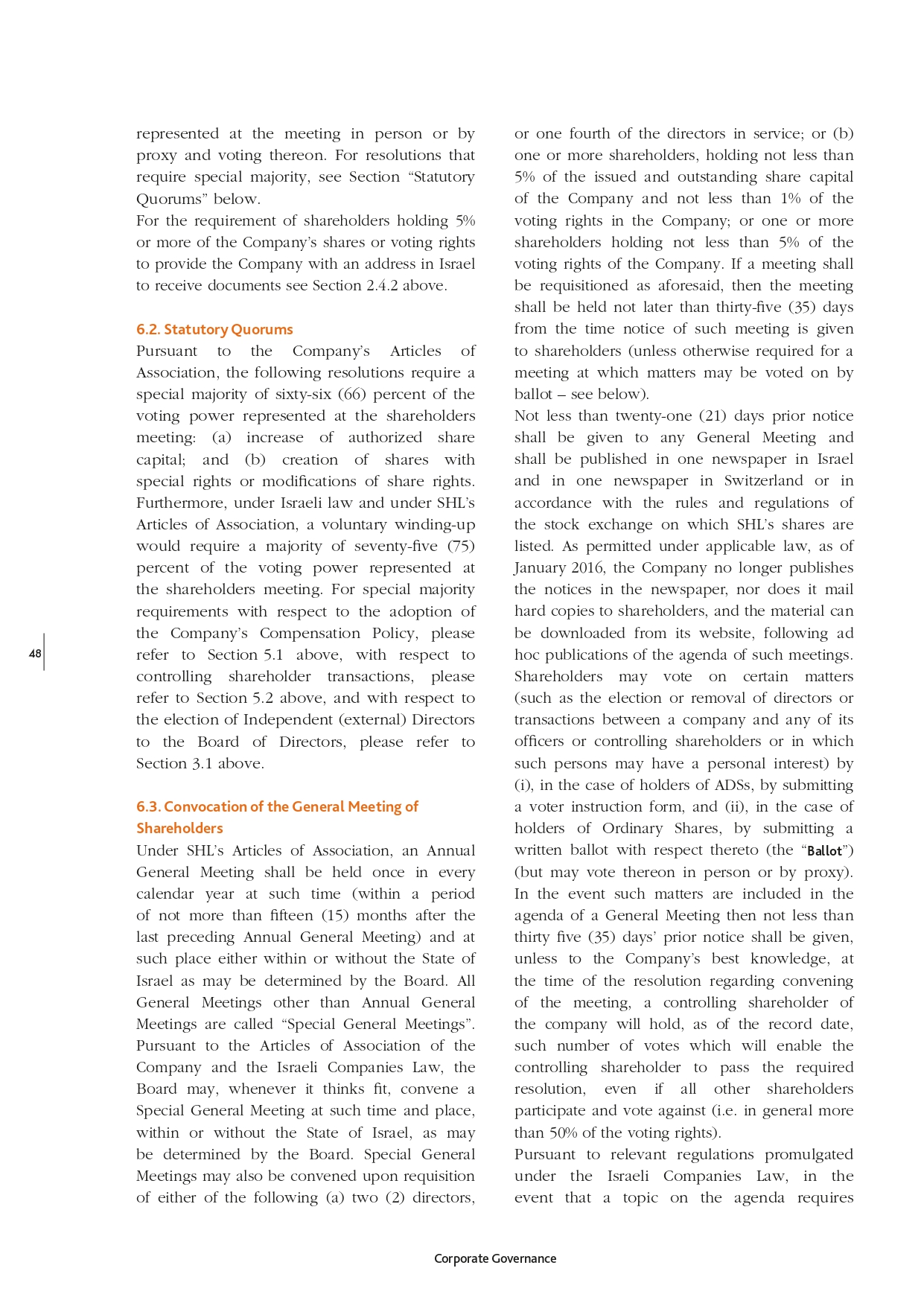
represented at the meeting in person or by proxy and voting thereon. For resolutions that require special majority, see Section “Statutory
Quorums” below. For the requirement of shareholders holding 5% or more of the Company’s shares or voting rights to provide the Company with an address in Israel to receive documents see Section 2.4.2 above. 6.2. Statutory Quorums 48 Pursuant to the
Company’s Articles of Association, the following resolutions require a special majority of sixty-six (66) percent of the voting power represented at the shareholders meeting: (a) increase of authorized share capital; and (b) creation of shares with
special rights or modifications of share rights. Furthermore, under Israeli law and under SHL’s Articles of Association, a voluntary winding-up would require a majority of seventy-five (75) percent of the voting power represented at the shareholders
meeting. For special majority requirements with respect to the adoption of the Company’s Compensation Policy, please refer to Section 5.1 above, with respect to controlling shareholder transactions, please refer to Section 5.2 above, and with respect
to the election of Independent (external) Directors to the Board of Directors, please refer to Section 3.1 above. 6.3. Convocation of the General Meeting of Shareholders Under SHL’s Articles of Association, an Annual General Meeting shall be held
once in every calendar year at such time (within a period of not more than fifteen (15) months after the last preceding Annual General Meeting) and at such place either within or without the State of Israel as may be determined by the Board. All
General Meetings other than Annual General Meetings are called “Special General Meetings”. Pursuant to the Articles of Association of the Company and the Israeli Companies Law, the Board may, whenever it thinks fit, convene a Special General Meeting
at such time and place, within or without the State of Israel, as may be determined by the Board. Special General Meetings may also be convened upon requisition of either of the following (a) two (2) directors, or one fourth of the directors in
service; or (b) one or more shareholders, holding not less than 5% of the issued and outstanding share capital of the Company and not less than 1% of the voting rights in the Company; or one or more shareholders holding not less than 5% of the voting
rights of the Company. If a meeting shall be requisitioned as aforesaid, then the meeting shall be held not later than thirty-five (35) days from the time notice of such meeting is given to shareholders (unless otherwise required for a meeting at
which matters may be voted on by ballot – see below). Not less than twenty-one (21) days prior notice shall be given to any General Meeting and shall be published in one newspaper in Israel and in one newspaper in Switzerland or in accordance with
the rules and regulations of the stock exchange on which SHL’s shares are listed. As permitted under applicable law, as of January 2016, the Company no longer publishes the notices in the newspaper, nor does it mail hard copies to shareholders, and
the material can be downloaded from its website, following ad hoc publications of the agenda of such meetings. Shareholders may vote on certain matters (such as the election or removal of directors or transactions between a company and any of its
officers or controlling shareholders or in which such persons may have a personal interest) by (i), in the case of holders of ADSs, by submitting a voter instruction form, and (ii), in the case of holders of Ordinary Shares, by submitting a written
ballot with respect thereto (the “Ballot”) (but may vote thereon in person or by proxy). In the event such matters are included in the agenda of a General Meeting then not less than thirty five (35) days’ prior notice shall be given, unless to the
Company’s best knowledge, at the time of the resolution regarding convening of the meeting, a controlling shareholder of the company will hold, as of the record date, such number of votes which will enable the controlling shareholder to pass the
required resolution, even if all other shareholders participate and vote against (i.e. in general more than 50% of the voting rights). Pursuant to relevant regulations promulgated under the Israeli Companies Law, in the event that a topic on the
agenda requires Corporate Governance
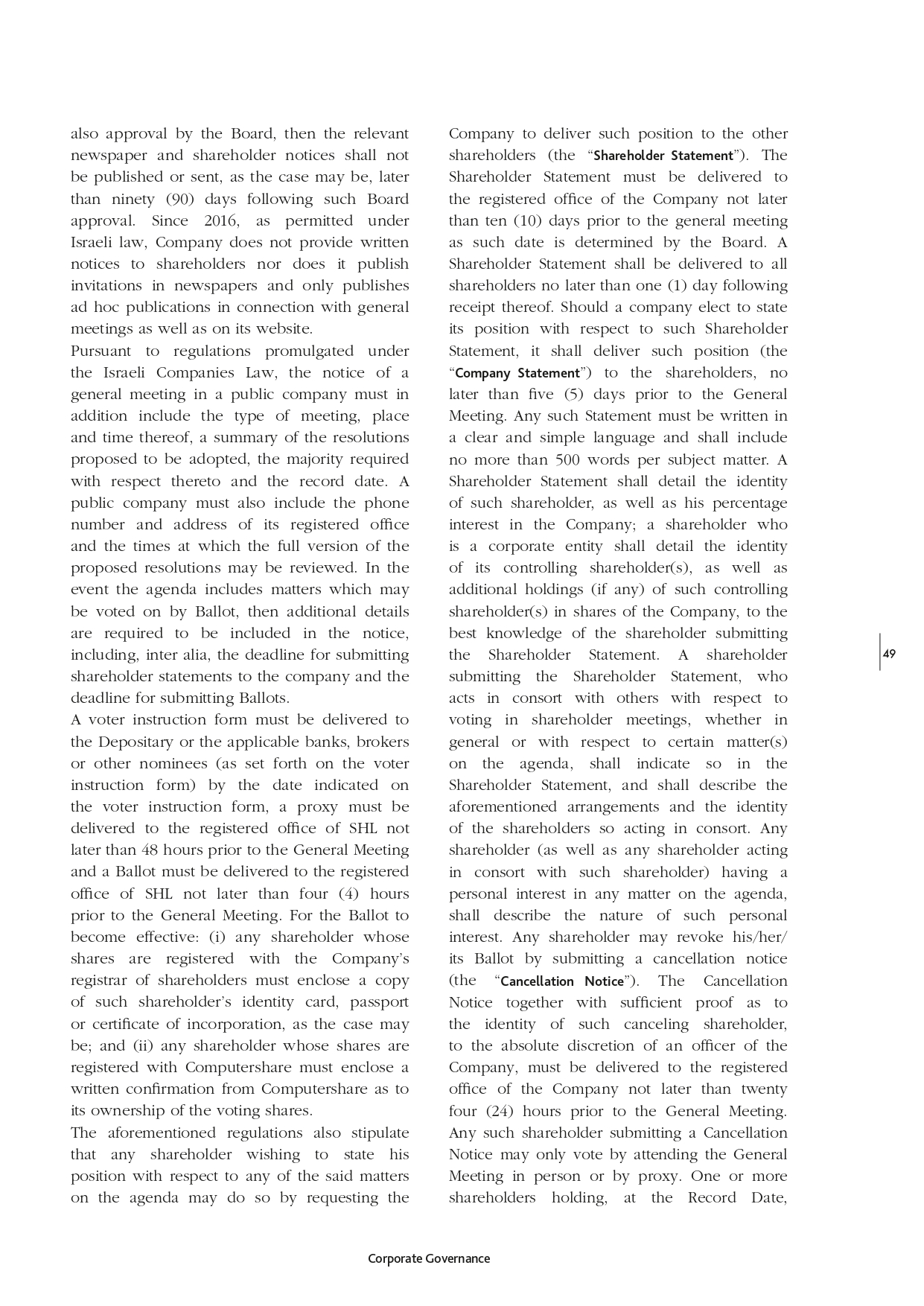
also approval by the Board, then the relevant newspaper and shareholder notices shall not be published or sent, as the case may be, later than
ninety (90) days following such Board approval. Since 2016, as permitted under Israeli law, Company does not provide written notices to shareholders nor does it publish invitations in newspapers and only publishes ad hoc publications in connection
with general meetings as well as on its website. Pursuant to regulations promulgated under the Israeli Companies Law, the notice of a general meeting in a public company must in addition include the type of meeting, place and time thereof, a summary
of the resolutions proposed to be adopted, the majority required with respect thereto and the record date. A public company must also include the phone number and address of its registered office and the times at which the full version of the
proposed resolutions may be reviewed. In the event the agenda includes matters which may be voted on by Ballot, then additional details are required to be included in the notice, including, inter alia, the deadline for submitting shareholder
statements to the company and the deadline for submitting Ballots. A voter instruction form must be delivered to the Depositary or the applicable banks, brokers or other nominees (as set forth on the voter instruction form) by the date indicated on
the voter instruction form, a proxy must be delivered to the registered office of SHL not later than 48 hours prior to the General Meeting and a Ballot must be delivered to the registered office of SHL not later than four (4) hours prior to the
General Meeting. For the Ballot to become effective: (i) any shareholder whose shares are registered with the Company’s registrar of shareholders must enclose a copy of such shareholder’s identity card, passport or certificate of incorporation, as
the case may be; and (ii) any shareholder whose shares are registered with Computershare must enclose a written confirmation from Computershare as to its ownership of the voting shares. The aforementioned regulations also stipulate that any
shareholder wishing to state his position with respect to any of the said matters on the agenda may do so by requesting the Company to deliver such position to the other shareholders (the “Shareholder Statement”). The Shareholder Statement must be
delivered to the registered office of the Company not later than ten (10) days prior to the general meeting as such date is determined by the Board. A Shareholder Statement shall be delivered to all shareholders no later than one (1) day following
receipt thereof. Should a company elect to state its position with respect to such Shareholder Statement, it shall deliver such position (the “Company Statement”) to the shareholders, no later than five (5) days prior to the General Meeting. Any such
Statement must be written in a clear and simple language and shall include no more than 500 words per subject matter. A Shareholder Statement shall detail the identity of such shareholder, as well as his percentage interest in the Company; a
shareholder who is a corporate entity shall detail the identity of its controlling shareholder(s), as well as additional holdings (if any) of such controlling shareholder(s) in shares of the Company, to the best knowledge of the shareholder
submitting the Shareholder Statement. A shareholder submitting the Shareholder Statement, who acts in consort with others with respect to voting in shareholder meetings, whether in general or with respect to certain matter(s) on the agenda, shall
indicate so in the Shareholder Statement, and shall describe the aforementioned arrangements and the identity of the shareholders so acting in consort. Any shareholder (as well as any shareholder acting in consort with such shareholder) having a
personal interest in any matter on the agenda, shall describe the nature of such personal interest. Any shareholder may revoke his/her/ its Ballot by submitting a cancellation notice (the “Cancellation Notice”). The Cancellation Notice together with
sufficient proof as to the identity of such canceling shareholder, to the absolute discretion of an officer of the Company, must be delivered to the registered office of the Company not later than twenty four (24) hours prior to the General Meeting.
Any such shareholder submitting a Cancellation Notice may only vote by attending the General Meeting in person or by proxy. One or more shareholders holding, at the Record Date, Corporate Governance 49
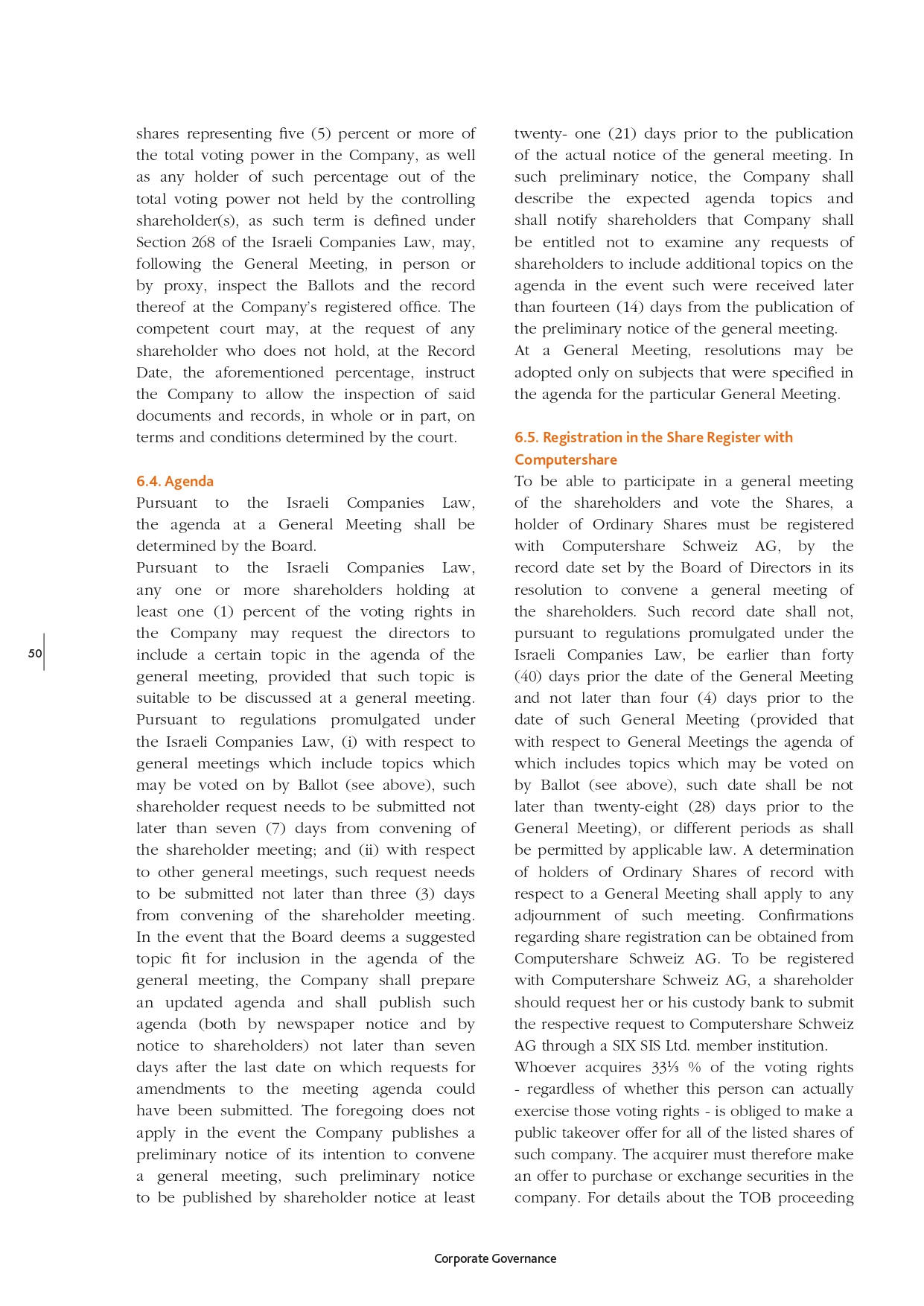
50 shares representing five (5) percent or more of the total voting power in the Company, as well as any holder of such percentage out of the
total voting power not held by the controlling shareholder(s), as such term is defined under Section 268 of the Israeli Companies Law, may, following the General Meeting, in person or by proxy, inspect the Ballots and the record thereof at the
Company’s registered office. The competent court may, at the request of any shareholder who does not hold, at the Record Date, the aforementioned percentage, instruct the Company to allow the inspection of said documents and records, in whole or in
part, on terms and conditions determined by the court. twenty- one (21) days prior to the publication of the actual notice of the general meeting. In such preliminary notice, the Company shall describe the expected agenda topics and shall notify
shareholders that Company shall be entitled not to examine any requests of shareholders to include additional topics on the agenda in the event such were received later than fourteen (14) days from the publication of the preliminary notice of the
general meeting. At a General Meeting, resolutions may be adopted only on subjects that were specified in the agenda for the particular General Meeting. 6.4. Agenda To be able to participate in a general meeting of the shareholders and vote the
Shares, a holder of Ordinary Shares must be registered with Computershare Schweiz AG, by the record date set by the Board of Directors in its resolution to convene a general meeting of the shareholders. Such record date shall not, pursuant to
regulations promulgated under the Israeli Companies Law, be earlier than forty (40) days prior the date of the General Meeting and not later than four (4) days prior to the date of such General Meeting (provided that with respect to General Meetings
the agenda of which includes topics which may be voted on by Ballot (see above), such date shall be not later than twenty-eight (28) days prior to the General Meeting), or different periods as shall be permitted by applicable law. A determination of
holders of Ordinary Shares of record with respect to a General Meeting shall apply to any adjournment of such meeting. Confirmations regarding share registration can be obtained from Computershare Schweiz AG. To be registered with Computershare
Schweiz AG, a shareholder should request her or his custody bank to submit the respective request to Computershare Schweiz AG through a SIX SIS Ltd. member institution. Whoever acquires 33⅓ % of the voting rights - regardless of whether this person
can actually exercise those voting rights - is obliged to make a public takeover offer for all of the listed shares of such company. The acquirer must therefore make an offer to purchase or exchange securities in the company. For details about the
TOB proceeding Pursuant to the Israeli Companies Law, the agenda at a General Meeting shall be determined by the Board. Pursuant to the Israeli Companies Law, any one or more shareholders holding at least one (1) percent of the voting rights in the
Company may request the directors to include a certain topic in the agenda of the general meeting, provided that such topic is suitable to be discussed at a general meeting. Pursuant to regulations promulgated under the Israeli Companies Law, (i)
with respect to general meetings which include topics which may be voted on by Ballot (see above), such shareholder request needs to be submitted not later than seven (7) days from convening of the shareholder meeting; and (ii) with respect to other
general meetings, such request needs to be submitted not later than three (3) days from convening of the shareholder meeting. In the event that the Board deems a suggested topic fit for inclusion in the agenda of the general meeting, the Company
shall prepare an updated agenda and shall publish such agenda (both by newspaper notice and by notice to shareholders) not later than seven days after the last date on which requests for amendments to the meeting agenda could have been submitted. The
foregoing does not apply in the event the Company publishes a preliminary notice of its intention to convene a general meeting, such preliminary notice to be published by shareholder notice at least 6.5. Registration in the Share Register with
Computershare Corporate Governance

regarding the pending tender offer obligation of certain shareholders of the Company see Section “Swiss Takeover Board Proceeding” under
“Changes in the Financial Year 2021” above. To the understanding of the Company, it is exempt from Israeli law provisions relating to special tender offers, but certain tender offer rules with respect to full tender offers under the Israeli Companies
Law apply to it. These include that, if as result of an acquisition of shares an acquirer will hold more than ninety (90) percent of a company’s shares, the acquisition must be made by means of a tender offer for all of the shares. Furthermore,
pursuant to the Israeli Companies Law all of the shares of the minority shareholders will be transferred to the offeror in the event that either (a) such number of shares are tendered to the offeror so that more than ninety-eight (98) percent of the
outstanding shares are held by it; or (b) such number of shares are tendered to the offeror so that less than five (5) percent of the outstanding shares did not accept the offer and more than half of the shareholders that do not have a personal
interest in the acceptance of the purchase offer tendered their shares. SHL’s Articles of Association do not contain provisions regarding opting out or opting up. 6.6. American Depositary Shares (American Depositary Receipts, “ADRs”) The Company has
listed ADRs on Nasdaq® (symbol “SHLT”). Bank of New York Mellon (“BNY Mellon”) has been appointed as the depositary bank. The ADRs are priced in USD and provide the same rights in dividends and voting powers as the ordinary shares of the Company.
Each ADR represents one ordinary SHL share, subject to the enforcement procedures as per the deposit agreement between the Company, BNY Mellon and the owners of ADRs. Further information on the ADR program is available on the Website of the Company
at https://www.shl-telemedicine. com/adr-depositary-bank/. 6.7. Clauses on Changes of Control There are no clauses on changes of control in agreements and plans benefiting members of the Board of Directors and/or members of the Management and/or
other members of SHL’s cadre, except: (i) under the Compensation Policy with respect to possible acceleration of options and retirement grant to the CEO in case of termination of employment by either party within six (6) months as of such event;
under the Compensation Policy the special bonus due to a Full Exit Event as described in Section 5.1 above; and (iii) as described under Section 2.2 above with respect to the vesting schedule of the options granted to Mr. Yariv Alroy. (For further
details see Section 5.1 above). 7. ESG SHL is dedicated to telemedicine. For more than a quarter of a century, we have been taking care of people in need of home-based medical support. Our ethos is to provide immediate and professional medical care
when our patients need it. We monitor their health and wellbeing to reduce the need for emergency intervention and hospitalization. Our aim is to increase the quality of life of our users, e.g. for patients with chronic conditions, as well as the
chances of survival e.g. if a heart attack strikes. We invest our expertise in the research and development of innovative concepts that advance the field of telemedicine and evolve into state-of-the-art solutions that shape the future of healthcare.
While doing so, SHL’s Board of Directors and Senior Management Team are committed to high standards of corporate governance, including transparency and accountability towards our Company’s stakeholders. The corresponding Corporate Governance
reporting is updated on a yearly basis and available in the Annual Report. Sustainability is a crucial task, for every company, regardless of size or industry. Therefore, and to demonstrate our commitment to a sustainable development, in 2023 we have
developed, approved, and implemented a Code of Ethics that is available on our website ( https://www.shl-telemedicine.com/wpcontent/uploads/2023/04/SHL-Code-of-EthicsMarch-2023-1.pdf). These ethical principles were communicated to our employees and
transferred to them as their responsibility. Furthermore, SHL starts providing more transparency on non-financial matters with the Annual Report 2023. This respective Corporate Governance 51
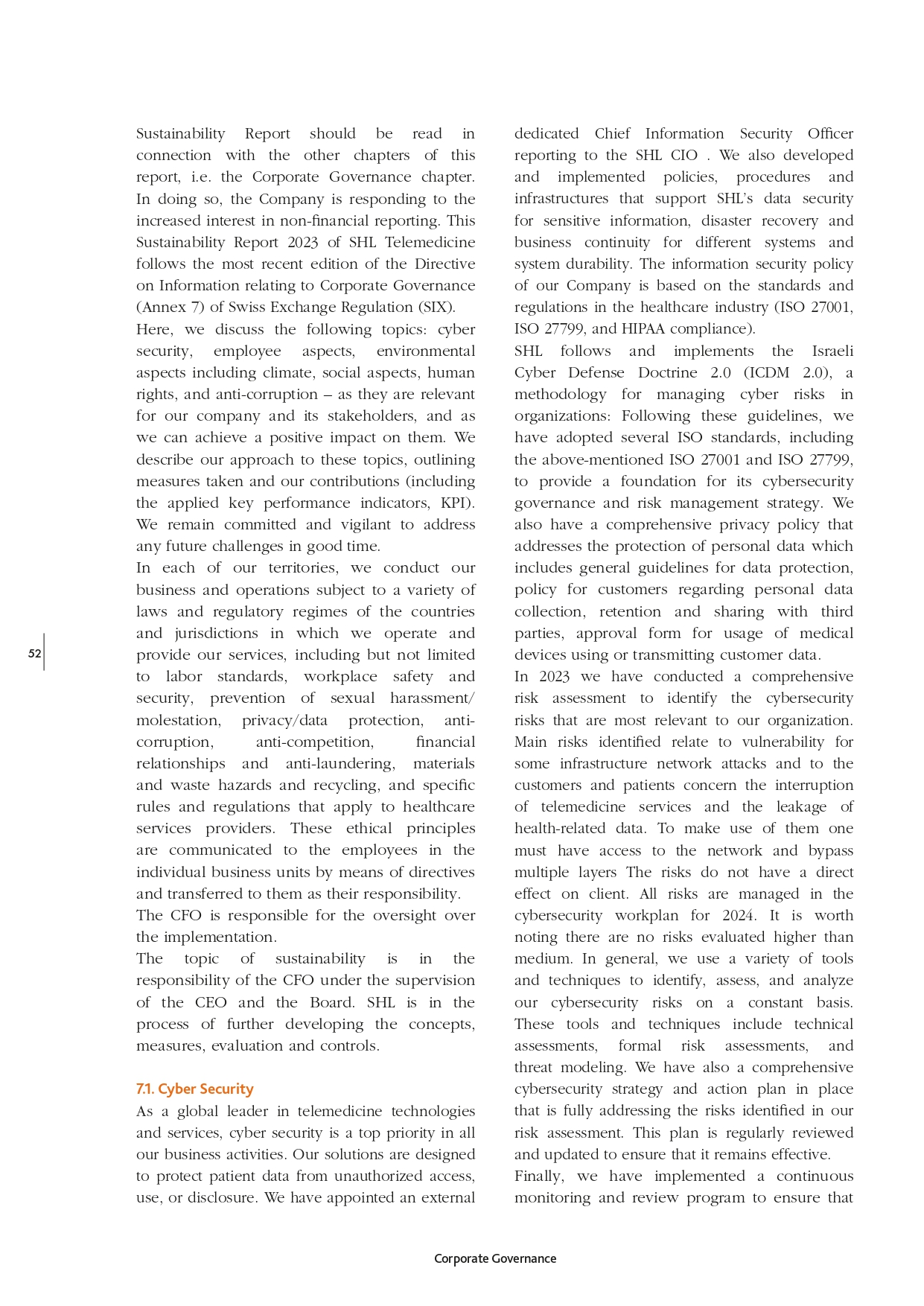
52 Sustainability Report should be read in connection with the other chapters of this report, i.e. the Corporate Governance chapter. In doing
so, the Company is responding to the increased interest in non-financial reporting. This Sustainability Report 2023 of SHL Telemedicine follows the most recent edition of the Directive on Information relating to Corporate Governance (Annex 7) of
Swiss Exchange Regulation (SIX). Here, we discuss the following topics: cyber security, employee aspects, environmental aspects including climate, social aspects, human rights, and anti-corruption – as they are relevant for our company and its
stakeholders, and as we can achieve a positive impact on them. We describe our approach to these topics, outlining measures taken and our contributions (including the applied key performance indicators, KPI). We remain committed and vigilant to
address any future challenges in good time. In each of our territories, we conduct our business and operations subject to a variety of laws and regulatory regimes of the countries and jurisdictions in which we operate and provide our services,
including but not limited to labor standards, workplace safety and security, prevention of sexual harassment/ molestation, privacy/data protection, anticorruption, anti-competition, financial relationships and anti-laundering, materials and waste
hazards and recycling, and specific rules and regulations that apply to healthcare services providers. These ethical principles are communicated to the employees in the individual business units by means of directives and transferred to them as their
responsibility. The CFO is responsible for the oversight over the implementation. The topic of sustainability is in the responsibility of the CFO under the supervision of the CEO and the Board. SHL is in the process of further developing the
concepts, measures, evaluation and controls. 7.1. Cyber Security As a global leader in telemedicine technologies and services, cyber security is a top priority in all our business activities. Our solutions are designed to protect patient data from
unauthorized access, use, or disclosure. We have appointed an external dedicated Chief Information Security Officer reporting to the SHL CIO . We also developed and implemented policies, procedures and infrastructures that support SHL’s data security
for sensitive information, disaster recovery and business continuity for different systems and system durability. The information security policy of our Company is based on the standards and regulations in the healthcare industry (ISO 27001, ISO
27799, and HIPAA compliance). SHL follows and implements the Israeli Cyber Defense Doctrine 2.0 (ICDM 2.0), a methodology for managing cyber risks in organizations: Following these guidelines, we have adopted several ISO standards, including the
above-mentioned ISO 27001 and ISO 27799, to provide a foundation for its cybersecurity governance and risk management strategy. We also have a comprehensive privacy policy that addresses the protection of personal data which includes general
guidelines for data protection, policy for customers regarding personal data collection, retention and sharing with third parties, approval form for usage of medical devices using or transmitting customer data. In 2023 we have conducted a
comprehensive risk assessment to identify the cybersecurity risks that are most relevant to our organization. Main risks identified relate to vulnerability for some infrastructure network attacks and to the customers and patients concern the
interruption of telemedicine services and the leakage of health-related data. To make use of them one must have access to the network and bypass multiple layers The risks do not have a direct effect on client. All risks are managed in the
cybersecurity workplan for 2024. It is worth noting there are no risks evaluated higher than medium. In general, we use a variety of tools and techniques to identify, assess, and analyze our cybersecurity risks on a constant basis. These tools and
techniques include technical assessments, formal risk assessments, and threat modeling. We have also a comprehensive cybersecurity strategy and action plan in place that is fully addressing the risks identified in our risk assessment. This plan is
regularly reviewed and updated to ensure that it remains effective. Finally, we have implemented a continuous monitoring and review program to ensure that Corporate Governance
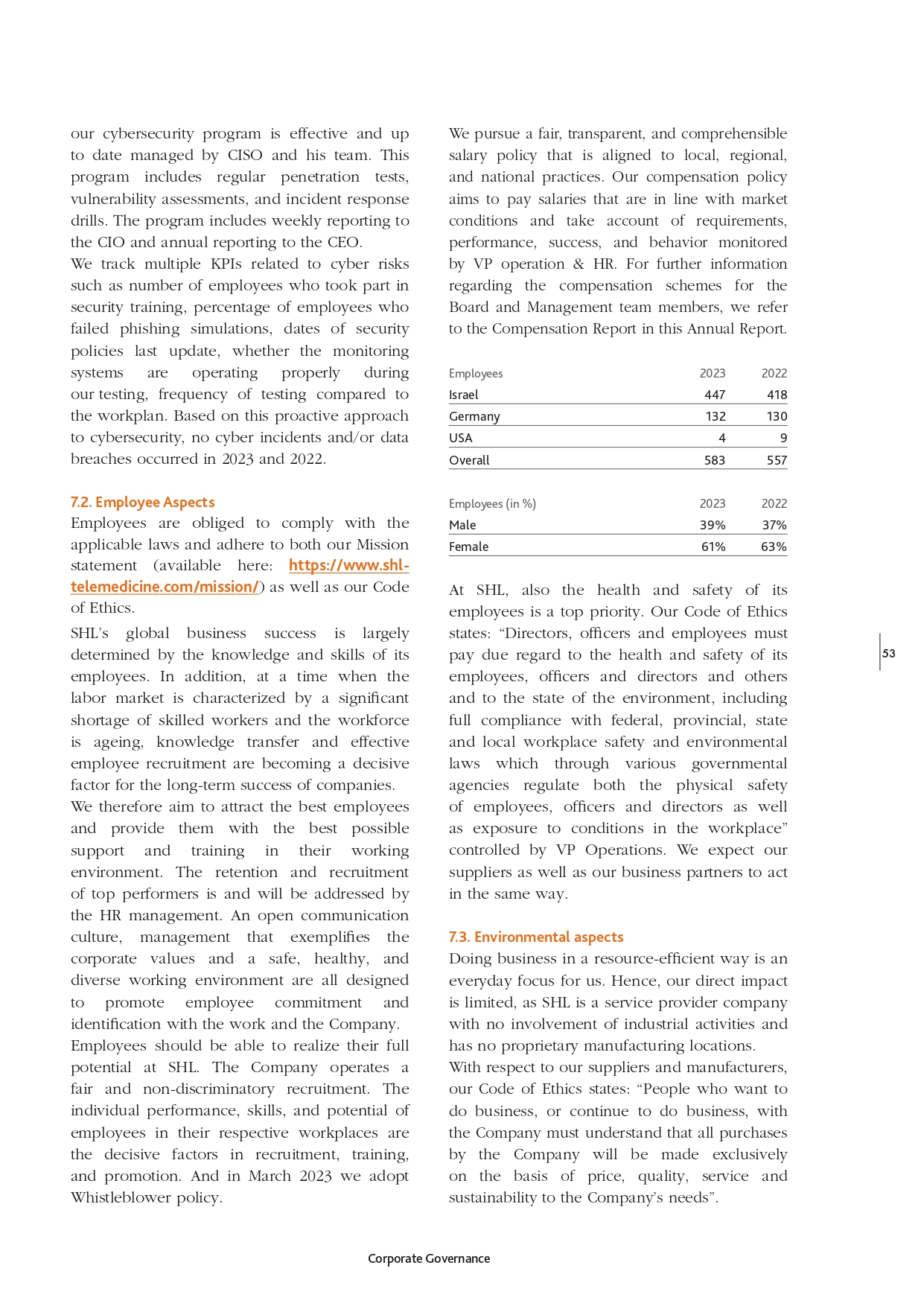
our cybersecurity program is effective and up to date managed by CISO and his team. This program includes regular penetration tests,
vulnerability assessments, and incident response drills. The program includes weekly reporting to the CIO and annual reporting to the CEO. We track multiple KPIs related to cyber risks such as number of employees who took part in security training,
percentage of employees who failed phishing simulations, dates of security policies last update, whether the monitoring systems are operating properly during our testing, frequency of testing compared to the workplan. Based on this proactive approach
to cybersecurity, no cyber incidents and/or data breaches occurred in 2023 and 2022. We pursue a fair, transparent, and comprehensible salary policy that is aligned to local, regional, and national practices. Our compensation policy aims to pay
salaries that are in line with market conditions and take account of requirements, performance, success, and behavior monitored by VP operation & HR. For further information regarding the compensation schemes for the Board and Management team
members, we refer to the Compensation Report in this Annual Report. 7.2. Employee Aspects Employees are obliged to comply with the applicable laws and adhere to both our Mission statement (available here: https://www.shltelemedicine.com/mission/) as
well as our Code of Ethics. SHL’s global business success is largely determined by the knowledge and skills of its employees. In addition, at a time when the labor market is characterized by a significant shortage of skilled workers and the workforce
is ageing, knowledge transfer and effective employee recruitment are becoming a decisive factor for the long-term success of companies. We therefore aim to attract the best employees and provide them with the best possible support and training in
their working environment. The retention and recruitment of top performers is and will be addressed by the HR management. An open communication culture, management that exemplifies the corporate values and a safe, healthy, and diverse working
environment are all designed to promote employee commitment and identification with the work and the Company. Employees should be able to realize their full potential at SHL. The Company operates a fair and non-discriminatory recruitment. The
individual performance, skills, and potential of employees in their respective workplaces are the decisive factors in recruitment, training, and promotion. And in March 2023 we adopt Whistleblower policy. Employees 2023 2022 Israel 447 418 Germany
132 130 USA 4 9 583 557 Employees (in %) 2023 2022 Male 39% 37% Female 61% 63% Overall At SHL, also the health and safety of its employees is a top priority. Our Code of Ethics states: “Directors, officers and employees must pay due regard to the
health and safety of its employees, officers and directors and others and to the state of the environment, including full compliance with federal, provincial, state and local workplace safety and environmental laws which through various governmental
agencies regulate both the physical safety of employees, officers and directors as well as exposure to conditions in the workplace” controlled by VP Operations. We expect our suppliers as well as our business partners to act in the same way. 7.3.
Environmental aspects Doing business in a resource-efficient way is an everyday focus for us. Hence, our direct impact is limited, as SHL is a service provider company with no involvement of industrial activities and has no proprietary manufacturing
locations. With respect to our suppliers and manufacturers, our Code of Ethics states: “People who want to do business, or continue to do business, with the Company must understand that all purchases by the Company will be made exclusively on the
basis of price, quality, service and sustainability to the Company’s needs”. Corporate Governance 53
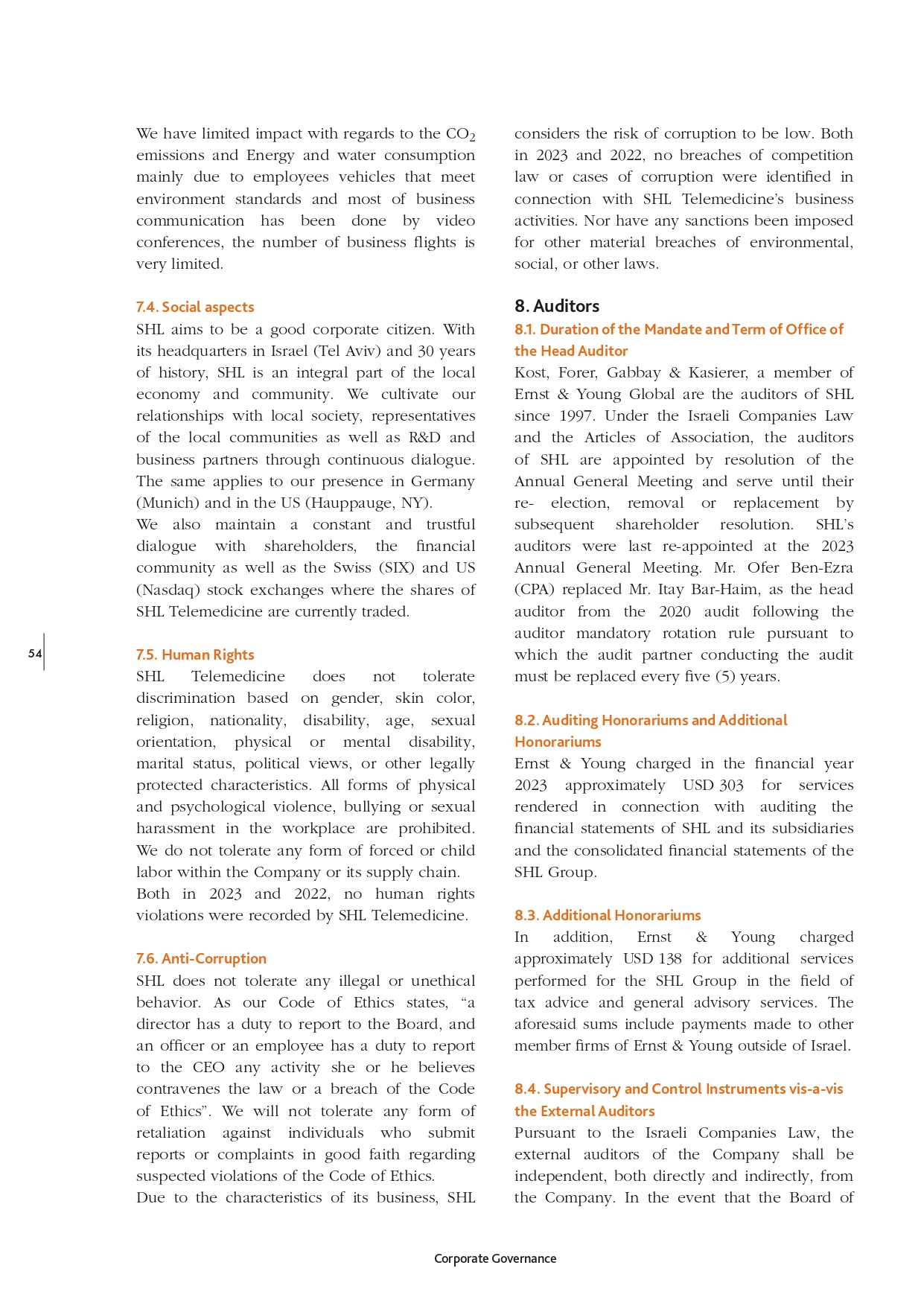
54 We have limited impact with regards to the CO2 emissions and Energy and water consumption mainly due to employees vehicles that meet
environment standards and most of business communication has been done by video conferences, the number of business flights is very limited. considers the risk of corruption to be low. Both in 2023 and 2022, no breaches of competition law or cases of
corruption were identified in connection with SHL Telemedicine’s business activities. Nor have any sanctions been imposed for other material breaches of environmental, social, or other laws. 7.4. Social aspects 8. Auditors SHL aims to be a good
corporate citizen. With its headquarters in Israel (Tel Aviv) and 30 years of history, SHL is an integral part of the local economy and community. We cultivate our relationships with local society, representatives of the local communities as well as
R&D and business partners through continuous dialogue. The same applies to our presence in Germany (Munich) and in the US (Hauppauge, NY). We also maintain a constant and trustful dialogue with shareholders, the financial community as well as the
Swiss (SIX) and US (Nasdaq) stock exchanges where the shares of SHL Telemedicine are currently traded. 8.1. Duration of the Mandate and Term of Office of the Head Auditor 7.5. Human Rights SHL Telemedicine does not tolerate discrimination based on
gender, skin color, religion, nationality, disability, age, sexual orientation, physical or mental disability, marital status, political views, or other legally protected characteristics. All forms of physical and psychological violence, bullying or
sexual harassment in the workplace are prohibited. We do not tolerate any form of forced or child labor within the Company or its supply chain. Both in 2023 and 2022, no human rights violations were recorded by SHL Telemedicine. 7.6. Anti-Corruption
SHL does not tolerate any illegal or unethical behavior. As our Code of Ethics states, “a director has a duty to report to the Board, and an officer or an employee has a duty to report to the CEO any activity she or he believes contravenes the law or
a breach of the Code of Ethics”. We will not tolerate any form of retaliation against individuals who submit reports or complaints in good faith regarding suspected violations of the Code of Ethics. Due to the characteristics of its business, SHL
Kost, Forer, Gabbay & Kasierer, a member of Ernst & Young Global are the auditors of SHL since 1997. Under the Israeli Companies Law and the Articles of Association, the auditors of SHL are appointed by resolution of the Annual General
Meeting and serve until their re- election, removal or replacement by subsequent shareholder resolution. SHL’s auditors were last re-appointed at the 2023 Annual General Meeting. Mr. Ofer Ben-Ezra (CPA) replaced Mr. Itay Bar-Haim, as the head auditor
from the 2020 audit following the auditor mandatory rotation rule pursuant to which the audit partner conducting the audit must be replaced every five (5) years. 8.2. Auditing Honorariums and Additional Honorariums Ernst & Young charged in the
financial year 2023 approximately USD 303 for services rendered in connection with auditing the financial statements of SHL and its subsidiaries and the consolidated financial statements of the SHL Group. 8.3. Additional Honorariums In addition,
Ernst & Young charged approximately USD 138 for additional services performed for the SHL Group in the field of tax advice and general advisory services. The aforesaid sums include payments made to other member firms of Ernst & Young outside
of Israel. 8.4. Supervisory and Control Instruments vis-a-vis the External Auditors Pursuant to the Israeli Companies Law, the external auditors of the Company shall be independent, both directly and indirectly, from the Company. In the event that
the Board of Corporate Governance
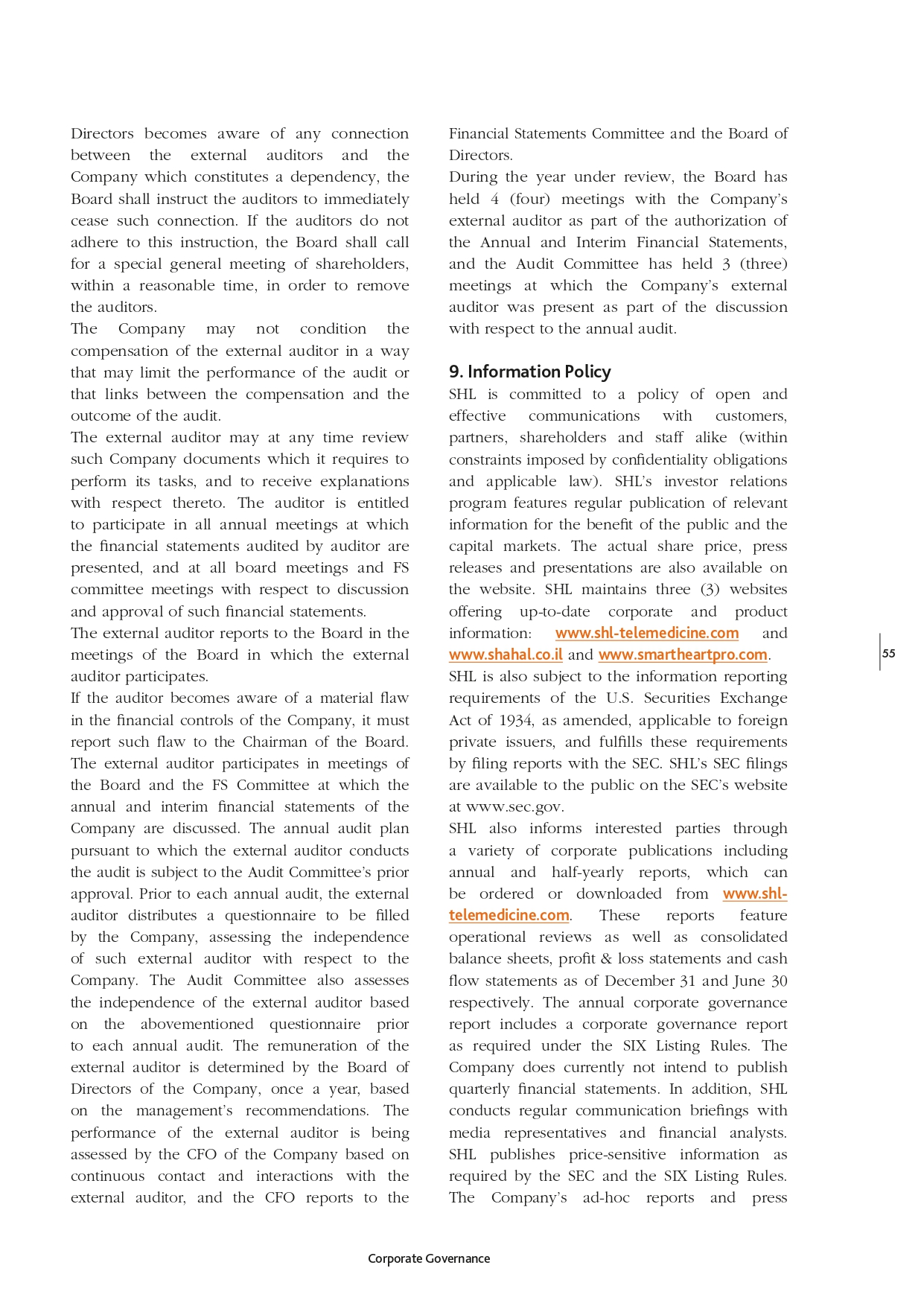
Directors becomes aware of any connection between the external auditors and the Company which constitutes a dependency, the Board shall instruct
the auditors to immediately cease such connection. If the auditors do not adhere to this instruction, the Board shall call for a special general meeting of shareholders, within a reasonable time, in order to remove the auditors. The Company may not
condition the compensation of the external auditor in a way that may limit the performance of the audit or that links between the compensation and the outcome of the audit. The external auditor may at any time review such Company documents which it
requires to perform its tasks, and to receive explanations with respect thereto. The auditor is entitled to participate in all annual meetings at which the financial statements audited by auditor are presented, and at all board meetings and FS
committee meetings with respect to discussion and approval of such financial statements. The external auditor reports to the Board in the meetings of the Board in which the external auditor participates. If the auditor becomes aware of a material
flaw in the financial controls of the Company, it must report such flaw to the Chairman of the Board. The external auditor participates in meetings of the Board and the FS Committee at which the annual and interim financial statements of the Company
are discussed. The annual audit plan pursuant to which the external auditor conducts the audit is subject to the Audit Committee’s prior approval. Prior to each annual audit, the external auditor distributes a questionnaire to be filled by the
Company, assessing the independence of such external auditor with respect to the Company. The Audit Committee also assesses the independence of the external auditor based on the abovementioned questionnaire prior to each annual audit. The
remuneration of the external auditor is determined by the Board of Directors of the Company, once a year, based on the management’s recommendations. The performance of the external auditor is being assessed by the CFO of the Company based on
continuous contact and interactions with the external auditor, and the CFO reports to the Financial Statements Committee and the Board of Directors. During the year under review, the Board has held 4 (four) meetings with the Company’s external
auditor as part of the authorization of the Annual and Interim Financial Statements, and the Audit Committee has held 3 (three) meetings at which the Company’s external auditor was present as part of the discussion with respect to the annual audit.
9. Information Policy SHL is committed to a policy of open and effective communications with customers, partners, shareholders and staff alike (within constraints imposed by confidentiality obligations and applicable law). SHL’s investor relations
program features regular publication of relevant information for the benefit of the public and the capital markets. The actual share price, press releases and presentations are also available on the website. SHL maintains three (3) websites offering
up-to-date corporate and product information: www.shl-telemedicine.com and www.shahal.co.il and www.smartheartpro.com. SHL is also subject to the information reporting requirements of the U.S. Securities Exchange Act of 1934, as amended, applicable
to foreign private issuers, and fulfills these requirements by filing reports with the SEC. SHL’s SEC filings are available to the public on the SEC’s website at www.sec.gov. SHL also informs interested parties through a variety of corporate
publications including annual and half-yearly reports, which can be ordered or downloaded from www.shltelemedicine.com. These reports feature operational reviews as well as consolidated balance sheets, profit & loss statements and cash flow
statements as of December 31 and June 30 respectively. The annual corporate governance report includes a corporate governance report as required under the SIX Listing Rules. The Company does currently not intend to publish quarterly financial
statements. In addition, SHL conducts regular communication briefings with media representatives and financial analysts. SHL publishes price-sensitive information as required by the SEC and the SIX Listing Rules. The Company’s ad-hoc reports and
press Corporate Governance 55

56 releases may be retrieved at https://www.shltelemedicine.com/news/. Persons that wish to be included in the Company’s distribution list with
respect to ad hoc notices may do so at https:// www.shl-telemedicine.com/contact-ir/. Official notices concerning the listing of shares required under the SIX Listing Rules will be published in electronic form on the website of the SIX (currently
www.six-group.com/en/ products-services/the-swiss-stock-exchange/ market-data/news-tools/official-notices. html#/). The Company may send notices to shareholders who are registered in the share register of the Company, Computershare Schweiz AG.
According to the Articles of Association, each shareholder holding 5% or more of the Shares or voting rights and each member of the Board of Directors of the Company is obliged to provide the Company with an address in Israel for the receiving of
documents (including judicial documents). As long as such address has not been provided, the Company’s registered office will be considered as the Shareholder’s and/or director’s address for the receiving of documents (including judicial documents).
Insider Trading Policy and Closed Periods SHL maintains an insider trading and management transactions disclosure policy (the “Insider Trading Policy”), last approved in April 2016. The Insider Trading Policy provisions are applicable to members of
the Board, officers, employees, representatives and consultants of the Company, as well as the immediate family members and household members of such persons, in addition to any other person which may receive non- public information with respect to
the Company (each being an “Insider”) which may have a material impact on SHL’s share price (“Insider Information”). Amongst others, the Insider Trading Policy forbids trading in SHL’s securities by the aforementioned persons while in possession of
Insider Information. Insiders shall refrain from trading in SHL securities up until 24 hours have passed from the issuing of a press release containing Insider Information, but no sooner than the next trading day of the SIX Swiss Exchange. According
to SHL’s Insider Trading Policy, certain insiders (board members, CEO, CFO, CTO, all vice presidents (other executive officers that are subject to the CEO), all members of management of SHL Israel and SHL Germany, IR staff, Chief Medical Advisor and
controllers) may not trade in SHL securities from the close of trading on the day that is three weeks prior to the expected date of the publication of the quarterly or half- yearly financial reports or four weeks prior to the expected date of the
publication of the annual financial reports, until 24 hours after SHL’s financial results have been released to the press, but no sooner than the next trading day of the SIX Swiss Exchange. The CEO or the CFO may impose additional closed periods for
all Insiders. During such Closed Periods, no Insider may trade in any SHL securities. Furthermore, the Insider Trading Policy requires members of the Board and members of Senior Management to report to the CFO transactions in SHL securities executed
by themselves or by certain related parties no later than on the second trading day following the transactions. The CFO has to file such Disclosure Report with the SIX Swiss Exchange within three (3) trading days upon receiving the Disclosure Report.
Investor’s calendar Annual General Meeting Half Year 2024 Report December 12, 2024 September 26, 2024 Contact person for Investor Relations Amir Hai, Chief Financial Officer amirh@shahal.co.il Ms. Fabienne Farner, Investor Relations, IRF Reputation
AG farner@irf-reputation.ch 55 Tel: +41 43 244 81 42 SHL TeleMedicine Ltd. Ashdar Building 90 Yigal Alon St. Tel Aviv 6789130 Israel Tel. +972 3 561 2212 Fax. +972 3 624 2414 E-mail: shl@shl-telemedicine.com www.shl-telemedicine.com Corporate
Governance

Consolidated Financial Statements 2023


Contents 60 | Financial Overview 66 | Independent Auditors’ Report 70 | Consolidated Balance Sheets 72 | Consolidated Statements of
Comprehensive Income 73 | Consolidated Statements of Changes in Equity 74 | Consolidated Statements of Cash Flows 76 | Notes to Consolidated Financial Statements 59 Financial Statements
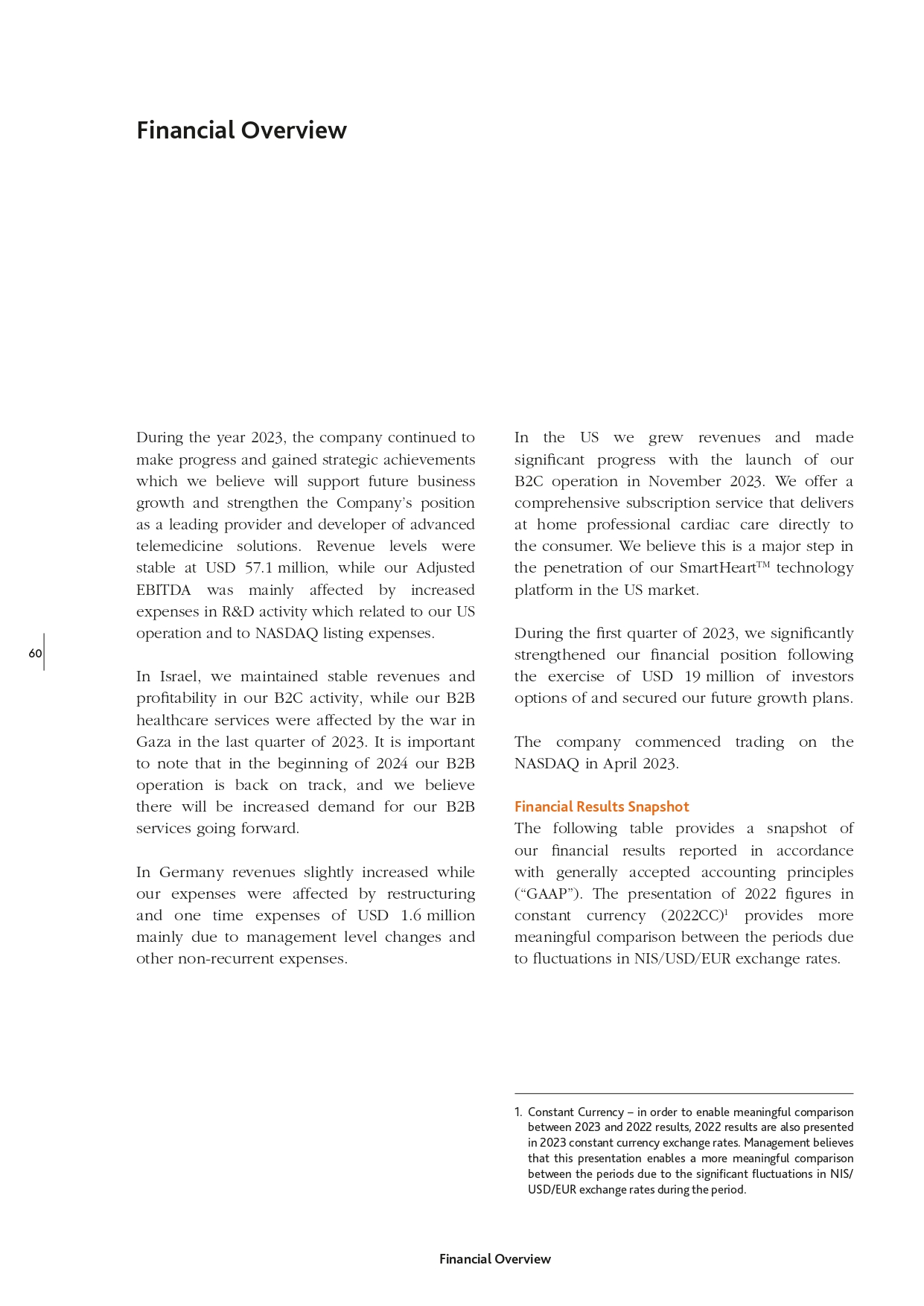
Financial Overview During the year 2023, the company continued to make progress and gained strategic achievements which we believe will support
future business growth and strengthen the Company’s position as a leading provider and developer of advanced telemedicine solutions. Revenue levels were stable at USD 57.1 million, while our Adjusted EBITDA was mainly affected by increased expenses
in R&D activity which related to our US operation and to NASDAQ listing expenses. 60 In Israel, we maintained stable revenues and profitability in our B2C activity, while our B2B healthcare services were affected by the war in Gaza in the last
quarter of 2023. It is important to note that in the beginning of 2024 our B2B operation is back on track, and we believe there will be increased demand for our B2B services going forward. In Germany revenues slightly increased while our expenses
were affected by restructuring and one time expenses of USD 1.6 million mainly due to management level changes and other non-recurrent expenses. In the US we grew revenues and made significant progress with the launch of our B2C operation in November
2023. We offer a comprehensive subscription service that delivers at home professional cardiac care directly to the consumer. We believe this is a major step in the penetration of our SmartHeartTM technology platform in the US market. During the
first quarter of 2023, we significantly strengthened our financial position following the exercise of USD 19 million of investors options of and secured our future growth plans. The company commenced trading on the NASDAQ in April 2023. Financial
Results Snapshot The following table provides a snapshot of our financial results reported in accordance with generally accepted accounting principles (“GAAP”). The presentation of 2022 figures in constant currency (2022CC)1 provides more meaningful
comparison between the periods due to fluctuations in NIS/USD/EUR exchange rates. 1. Constant Currency – in order to enable meaningful comparison between 2023 and 2022 results, 2022 results are also presented in 2023 constant currency exchange rates.
Management believes that this presentation enables a more meaningful comparison between the periods due to the significant fluctuations in NIS/ USD/EUR exchange rates during the period. Financial Overview
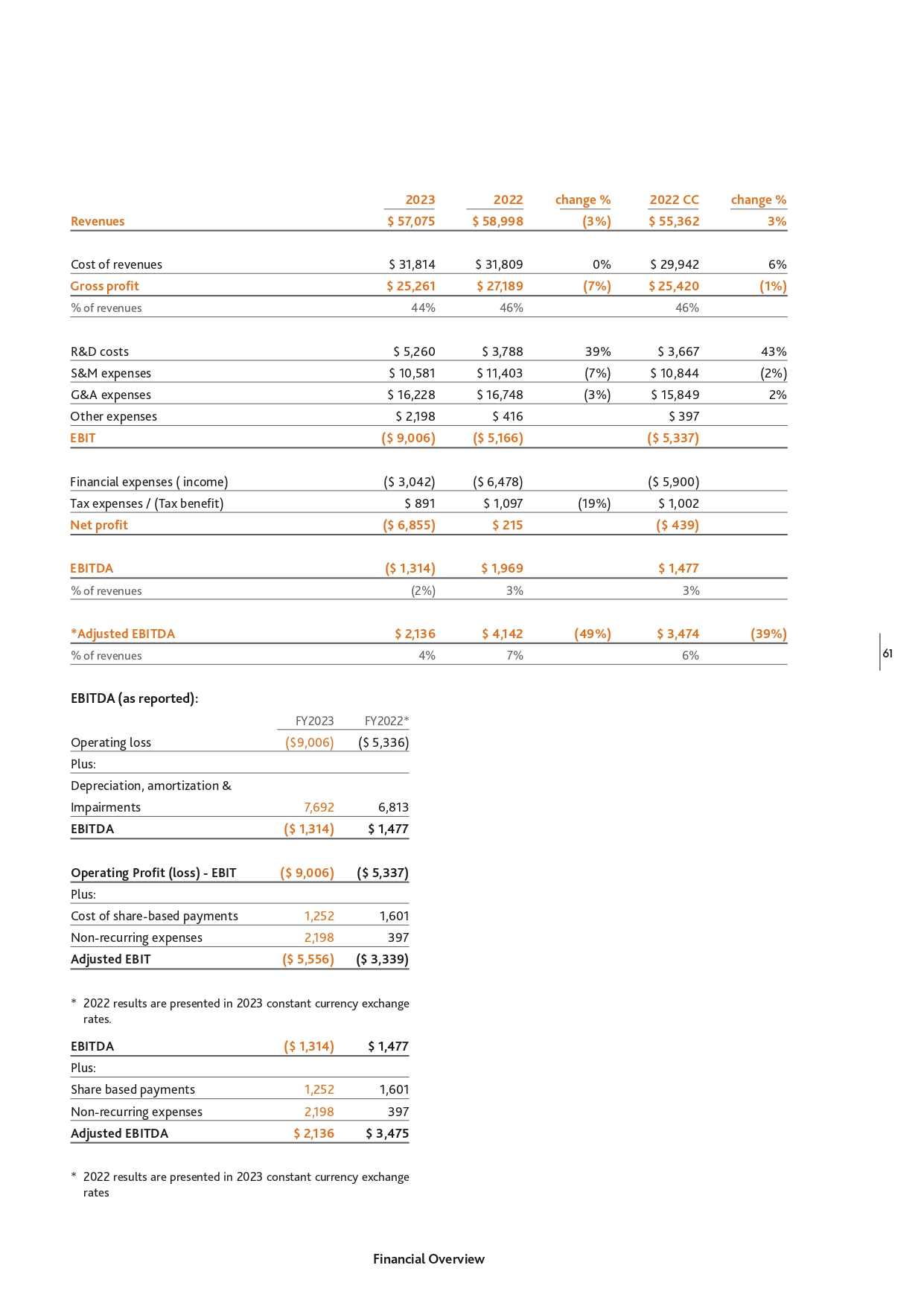
Revenues 2023 2022 change % 2022 CC change % $ 57,075 $ 58,998 (3%) $ 55,362 3% Cost of revenues $ 31,814 $ 31,809 0% $ 29,942 6% Gross profit $
25,261 $ 27,189 (7%) $ 25,420 (1%) % of revenues 44% R&D costs 46% 46% $ 5,260 $ 3,788 39% $ 3,667 43% S&M expenses $ 10,581 $ 11,403 (7%) $ 10,844 (2%) G&A expenses $ 16,228 $ 16,748 (3%) $ 15,849 2% Other expenses $ 2,198 $ 416 $ 397
EBIT ($ 9,006) ($ 5,166) ($ 5,337) Financial expenses ( income) ($ 3,042) ($ 6,478) ($ 5,900) Tax expenses / (Tax benefit) $ 891 $ 1,097 (19%) $ 1,002 Net profit ($ 6,855) $ 215 ($ 439) EBITDA ($ 1,314) $ 1,969 $ 1,477 % of revenues (2%) *Adjusted
EBITDA $ 2,136 % of revenues 3% 3% $ 4,142 4% EBITDA (as reported): FY2023 FY2022* ($9,006) ($ 5,336) 7,692 6,813 EBITDA ($ 1,314) $ 1,477 Operating Profit (loss) - EBIT ($ 9,006) ($ 5,337) Cost of share-based payments 1,252 1,601 Non-recurring
expenses 2,198 397 ($ 5,556) ($ 3,339) Operating loss Plus: Depreciation, amortization & Impairments Plus: Adjusted EBIT * 2022 results are presented in 2023 constant currency exchange rates. EBITDA ($ 1,314) $ 1,477 Share based payments 1,252
1,601 Non-recurring expenses 2,198 397 $ 2,136 $ 3,475 Plus: Adjusted EBITDA * 2022 results are presented in 2023 constant currency exchange rates Financial Overview (49%) $ 3,474 7% 6% (39%) 61
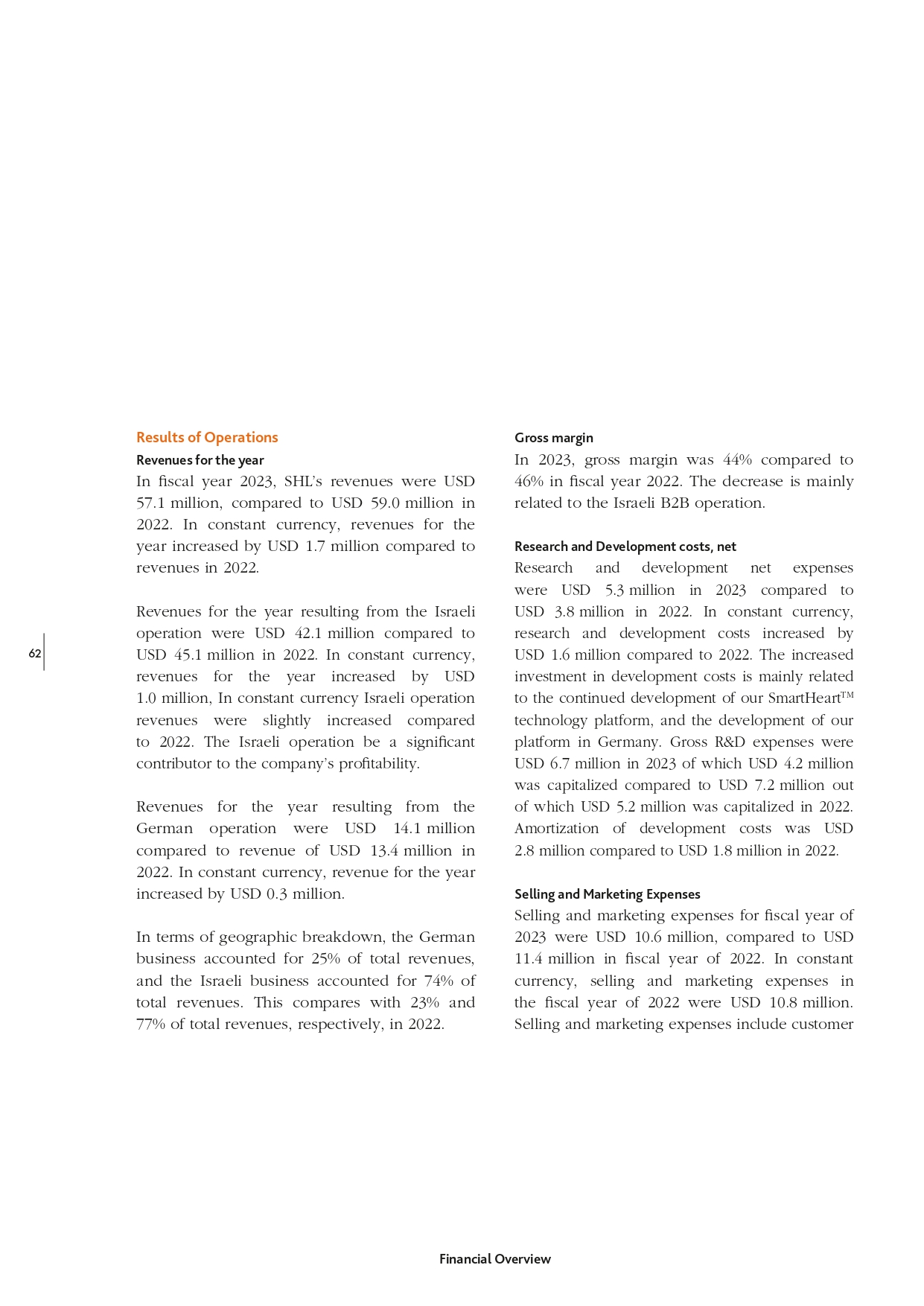
Results of Operations Gross margin Revenues for the year In 2023, gross margin was 44% compared to 46% in fiscal year 2022. The decrease is
mainly related to the Israeli B2B operation. In fiscal year 2023, SHL’s revenues were USD 57.1 million, compared to USD 59.0 million in 2022. In constant currency, revenues for the year increased by USD 1.7 million compared to revenues in 2022. 62
Revenues for the year resulting from the Israeli operation were USD 42.1 million compared to USD 45.1 million in 2022. In constant currency, revenues for the year increased by USD 1.0 million, In constant currency Israeli operation revenues were
slightly increased compared to 2022. The Israeli operation be a significant contributor to the company’s profitability. Revenues for the year resulting from the German operation were USD 14.1 million compared to revenue of USD 13.4 million in 2022.
In constant currency, revenue for the year increased by USD 0.3 million. In terms of geographic breakdown, the German business accounted for 25% of total revenues, and the Israeli business accounted for 74% of total revenues. This compares with 23%
and 77% of total revenues, respectively, in 2022. Research and Development costs, net Research and development net expenses were USD 5.3 million in 2023 compared to USD 3.8 million in 2022. In constant currency, research and development costs
increased by USD 1.6 million compared to 2022. The increased investment in development costs is mainly related to the continued development of our SmartHeartTM technology platform, and the development of our platform in Germany. Gross R&D
expenses were USD 6.7 million in 2023 of which USD 4.2 million was capitalized compared to USD 7.2 million out of which USD 5.2 million was capitalized in 2022. Amortization of development costs was USD 2.8 million compared to USD 1.8 million in
2022. Selling and Marketing Expenses Selling and marketing expenses for fiscal year of 2023 were USD 10.6 million, compared to USD 11.4 million in fiscal year of 2022. In constant currency, selling and marketing expenses in the fiscal year of 2022
were USD 10.8 million. Selling and marketing expenses include customer Financial Overview
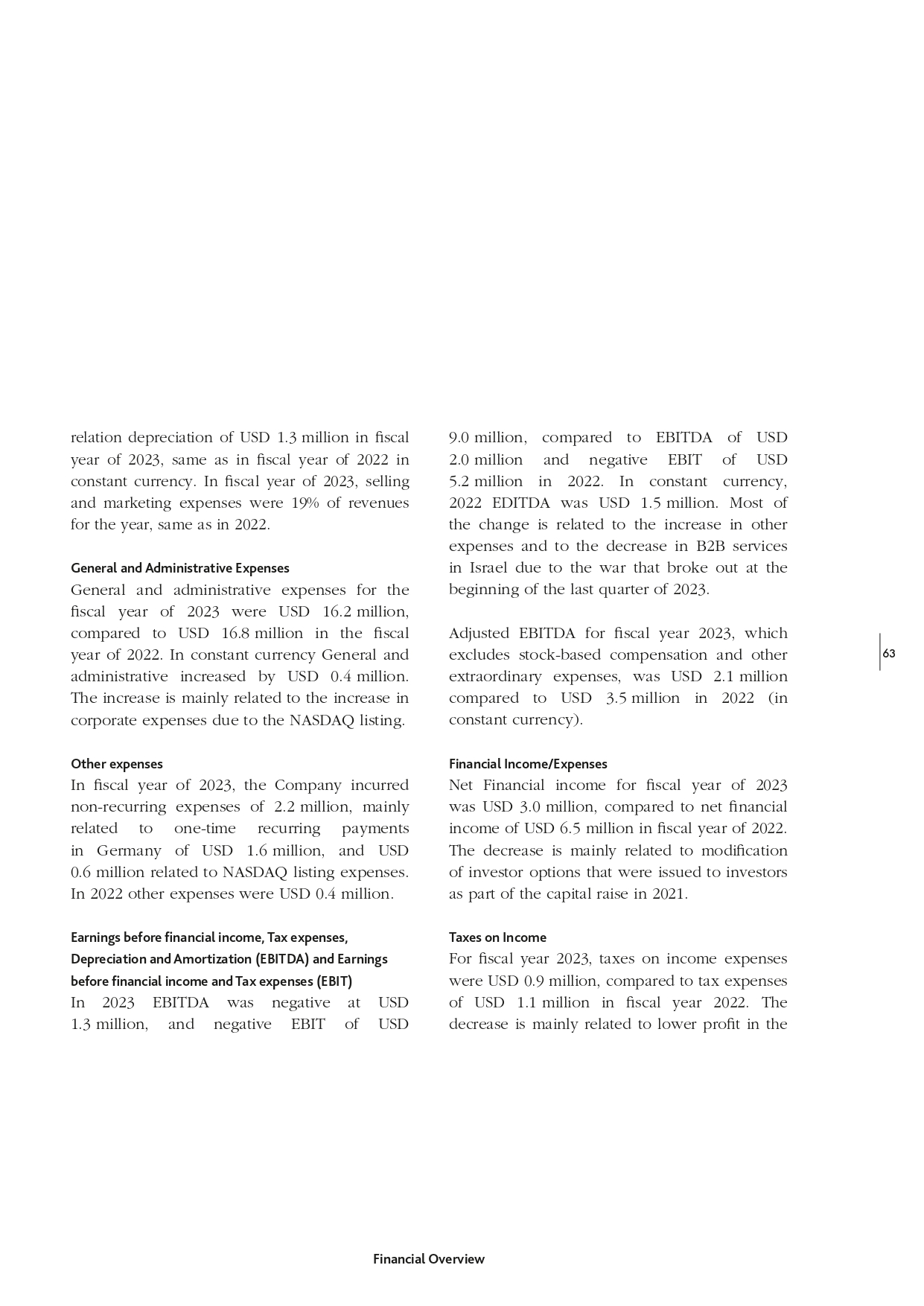
relation depreciation of USD 1.3 million in fiscal year of 2023, same as in fiscal year of 2022 in constant currency. In fiscal year of 2023,
selling and marketing expenses were 19% of revenues for the year, same as in 2022. General and Administrative Expenses General and administrative expenses for the fiscal year of 2023 were USD 16.2 million, compared to USD 16.8 million in the fiscal
year of 2022. In constant currency General and administrative increased by USD 0.4 million. The increase is mainly related to the increase in corporate expenses due to the NASDAQ listing. 9.0 million, compared to EBITDA of USD 2.0 million and
negative EBIT of USD 5.2 million in 2022. In constant currency, 2022 EDITDA was USD 1.5 million. Most of the change is related to the increase in other expenses and to the decrease in B2B services in Israel due to the war that broke out at the
beginning of the last quarter of 2023. Adjusted EBITDA for fiscal year 2023, which excludes stock-based compensation and other extraordinary expenses, was USD 2.1 million compared to USD 3.5 million in 2022 (in constant currency). Other expenses
Financial Income/Expenses In fiscal year of 2023, the Company incurred non-recurring expenses of 2.2 million, mainly related to one-time recurring payments in Germany of USD 1.6 million, and USD 0.6 million related to NASDAQ listing expenses. In 2022
other expenses were USD 0.4 million. Net Financial income for fiscal year of 2023 was USD 3.0 million, compared to net financial income of USD 6.5 million in fiscal year of 2022. The decrease is mainly related to modification of investor options that
were issued to investors as part of the capital raise in 2021. Earnings before financial income, Tax expenses, Taxes on Income Depreciation and Amortization (EBITDA) and Earnings For fiscal year 2023, taxes on income expenses were USD 0.9 million,
compared to tax expenses of USD 1.1 million in fiscal year 2022. The decrease is mainly related to lower profit in the before financial income and Tax expenses (EBIT) In 2023 EBITDA was negative at 1.3 million, and negative EBIT of USD USD Financial
Overview 63
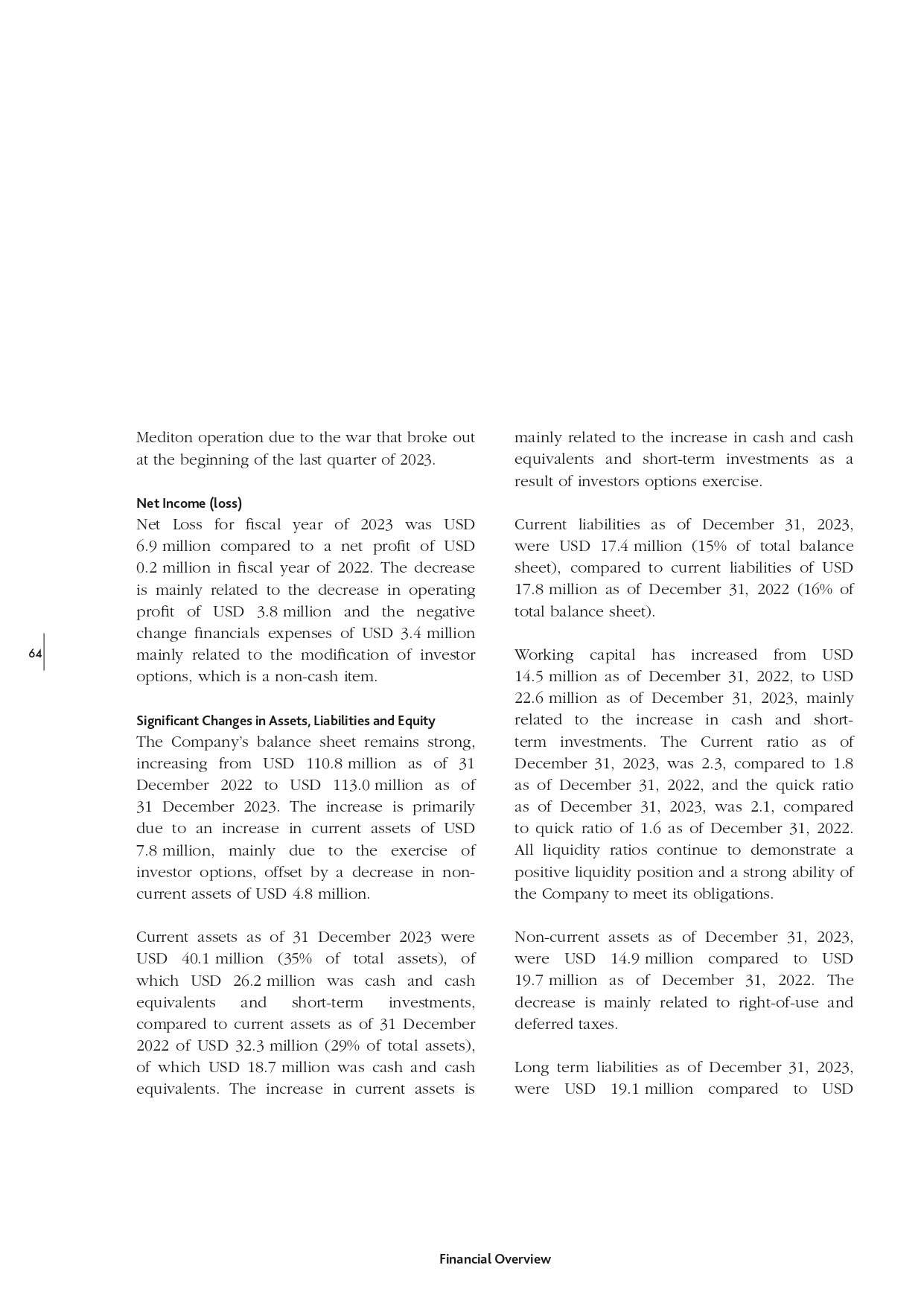
Mediton operation due to the war that broke out at the beginning of the last quarter of 2023. mainly related to the increase in cash and cash
equivalents and short-term investments as a result of investors options exercise. Net Income (loss) 64 Net Loss for fiscal year of 2023 was USD 6.9 million compared to a net profit of USD 0.2 million in fiscal year of 2022. The decrease is mainly
related to the decrease in operating profit of USD 3.8 million and the negative change financials expenses of USD 3.4 million mainly related to the modification of investor options, which is a non-cash item. Significant Changes in Assets, Liabilities
and Equity The Company’s balance sheet remains strong, increasing from USD 110.8 million as of 31 December 2022 to USD 113.0 million as of 31 December 2023. The increase is primarily due to an increase in current assets of USD 7.8 million, mainly due
to the exercise of investor options, offset by a decrease in noncurrent assets of USD 4.8 million. Current assets as of 31 December 2023 were USD 40.1 million (35% of total assets), of which USD 26.2 million was cash and cash equivalents and
short-term investments, compared to current assets as of 31 December 2022 of USD 32.3 million (29% of total assets), of which USD 18.7 million was cash and cash equivalents. The increase in current assets is Current liabilities as of December 31,
2023, were USD 17.4 million (15% of total balance sheet), compared to current liabilities of USD 17.8 million as of December 31, 2022 (16% of total balance sheet). Working capital has increased from USD 14.5 million as of December 31, 2022, to USD
22.6 million as of December 31, 2023, mainly related to the increase in cash and shortterm investments. The Current ratio as of December 31, 2023, was 2.3, compared to 1.8 as of December 31, 2022, and the quick ratio as of December 31, 2023, was 2.1,
compared to quick ratio of 1.6 as of December 31, 2022. All liquidity ratios continue to demonstrate a positive liquidity position and a strong ability of the Company to meet its obligations. Non-current assets as of December 31, 2023, were USD 14.9
million compared to USD 19.7 million as of December 31, 2022. The decrease is mainly related to right-of-use and deferred taxes. Long term liabilities as of December 31, 2023, were USD 19.1 million compared to USD Financial Overview
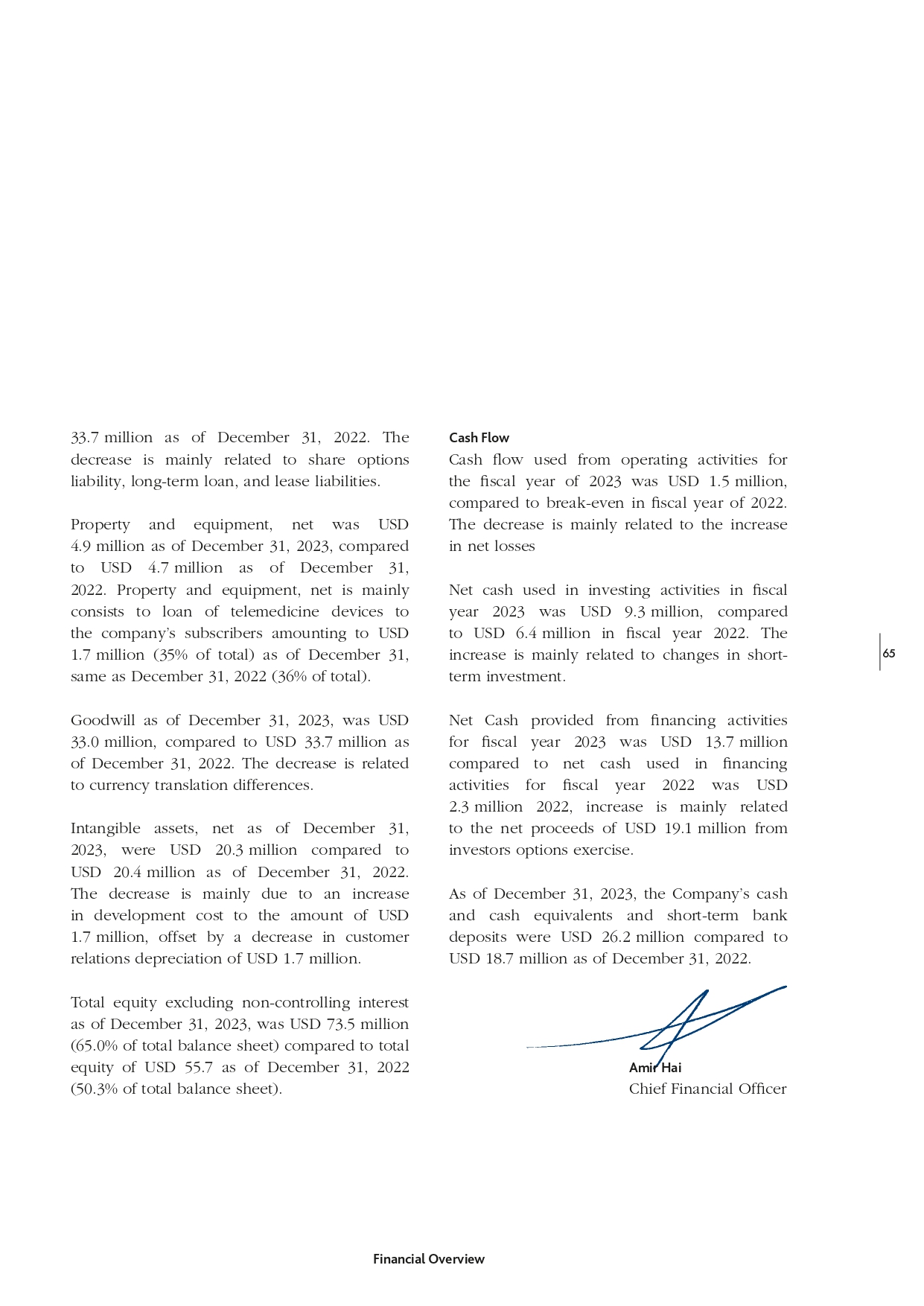
33.7 million as of December 31, 2022. The decrease is mainly related to share options liability, long-term loan, and lease liabilities. Property
and equipment, net was USD 4.9 million as of December 31, 2023, compared to USD 4.7 million as of December 31, 2022. Property and equipment, net is mainly consists to loan of telemedicine devices to the company’s subscribers amounting to USD 1.7
million (35% of total) as of December 31, same as December 31, 2022 (36% of total). Goodwill as of December 31, 2023, was USD 33.0 million, compared to USD 33.7 million as of December 31, 2022. The decrease is related to currency translation
differences. Intangible assets, net as of December 31, 2023, were USD 20.3 million compared to USD 20.4 million as of December 31, 2022. The decrease is mainly due to an increase in development cost to the amount of USD 1.7 million, offset by a
decrease in customer relations depreciation of USD 1.7 million. Cash Flow Cash flow used from operating activities for the fiscal year of 2023 was USD 1.5 million, compared to break-even in fiscal year of 2022. The decrease is mainly related to the
increase in net losses Net cash used in investing activities in fiscal year 2023 was USD 9.3 million, compared to USD 6.4 million in fiscal year 2022. The increase is mainly related to changes in shortterm investment. Net Cash provided from financing
activities for fiscal year 2023 was USD 13.7 million compared to net cash used in financing activities for fiscal year 2022 was USD 2.3 million 2022, increase is mainly related to the net proceeds of USD 19.1 million from investors options exercise.
As of December 31, 2023, the Company’s cash and cash equivalents and short-term bank deposits were USD 26.2 million compared to USD 18.7 million as of December 31, 2022. Total equity excluding non-controlling interest as of December 31, 2023, was USD
73.5 million (65.0% of total balance sheet) compared to total equity of USD 55.7 as of December 31, 2022 (50.3% of total balance sheet). Financial Overview Amir Hai Chief Financial Officer 65
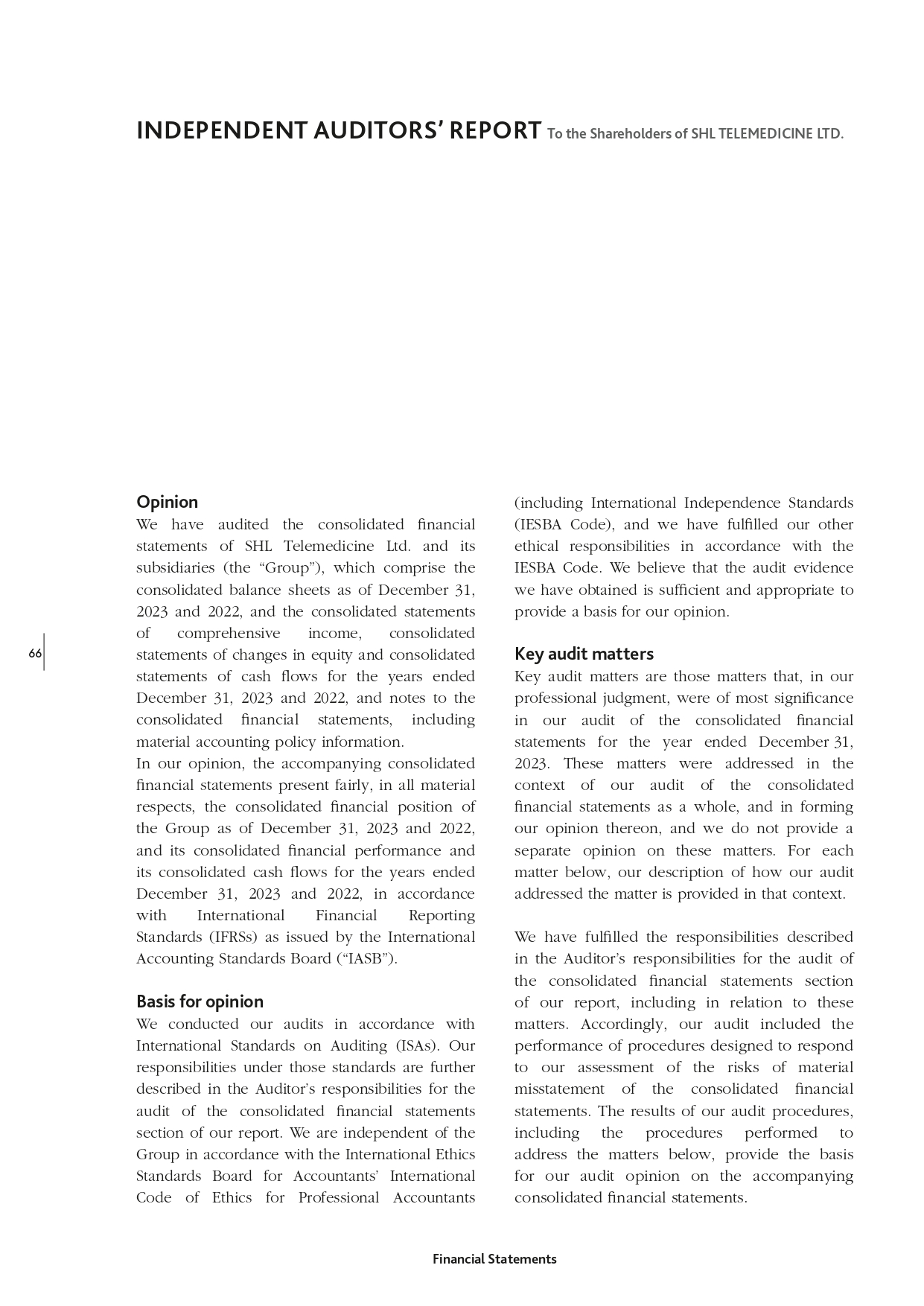
INDEPENDENT AUDITORS’ REPORT To the Shareholders of SHL TELEMEDICINE LTD. Opinion 66 We have audited the consolidated financial statements of
SHL Telemedicine Ltd. and its subsidiaries (the “Group”), which comprise the consolidated balance sheets as of December 31, 2023 and 2022, and the consolidated statements of comprehensive income, consolidated statements of changes in equity and
consolidated statements of cash flows for the years ended December 31, 2023 and 2022, and notes to the consolidated financial statements, including material accounting policy information. In our opinion, the accompanying consolidated financial
statements present fairly, in all material respects, the consolidated financial position of the Group as of December 31, 2023 and 2022, and its consolidated financial performance and its consolidated cash flows for the years ended December 31, 2023
and 2022, in accordance with International Financial Reporting Standards (IFRSs) as issued by the International Accounting Standards Board (“IASB”). Basis for opinion We conducted our audits in accordance with International Standards on Auditing
(ISAs). Our responsibilities under those standards are further described in the Auditor’s responsibilities for the audit of the consolidated financial statements section of our report. We are independent of the Group in accordance with the
International Ethics Standards Board for Accountants’ International Code of Ethics for Professional Accountants (including International Independence Standards (IESBA Code), and we have fulfilled our other ethical responsibilities in accordance with
the IESBA Code. We believe that the audit evidence we have obtained is sufficient and appropriate to provide a basis for our opinion. Key audit matters Key audit matters are those matters that, in our professional judgment, were of most significance
in our audit of the consolidated financial statements for the year ended December 31, 2023. These matters were addressed in the context of our audit of the consolidated financial statements as a whole, and in forming our opinion thereon, and we do
not provide a separate opinion on these matters. For each matter below, our description of how our audit addressed the matter is provided in that context. We have fulfilled the responsibilities described in the Auditor’s responsibilities for the
audit of the consolidated financial statements section of our report, including in relation to these matters. Accordingly, our audit included the performance of procedures designed to respond to our assessment of the risks of material misstatement of
the consolidated financial statements. The results of our audit procedures, including the procedures performed to address the matters below, provide the basis for our audit opinion on the accompanying consolidated financial statements. Financial
Statements

The Key Audit Matters we identified are: Description of Key Audit Matter and why a matter of most significance in the audit How our audit
addressed the Key Audit Matter Existence and As of December 31, 2023, the total carrying amounts Our audit procedures included testing of physical counts of measurement of of telemedicine devices in property and equipment the devices and extensive
detailed testing of the accounting medical devices and inventory are approximately $1.7 million and $5.4 records, including checking mathematical accuracy, to million, respectively. These amounts are comprised of support the carrying amounts of the
devices. We also thousands of devices that are on loan to customers performed substantive testing and examination of underlying (property and equipment) and that are being held by documentation to support the costs comprising the the Group
(inventory). The Group’s monitoring of the carrying amounts, including the appropriate elimination of existence and measurement (as described in Notes intercompany profit for transfers of devices between entities 2e and 2i in the consolidated
financial statements) in the Group. We evaluated the realizability of the carrying of these devices involves a complex interface among amounts based on analysis and testing of invoices issued automated and non-automated accounting records subsequent
to the reporting date. We also performed significant distributed among various entities within the Group. testing of cross-referencing of data between different systems The aforementioned factors led us to conclude that to support the existence of
the devices on loan. the existence and measurement of telemedicine devices is a key audit matter. Impairment of As of December 31, 2023, the carrying amount of Our audit procedures included the assessment of the Goodwill Goodwill is approximately $33
million. Management recoverability of Goodwill by auditing management’s forecasts performs a review of the Goodwill for impairment of revenues and cash flows to be generated from its cash pursuant to IAS 36. This impairment review generating units in
Israel and Germany. As part of our audit of involves significant judgmental assumptions and the goodwill, we compared management’s forecast to actual estimates with respect to future cash flows from results and future budget, as well as gaining an
understanding the Group’s operations, as described in Note 11 to and performing sensitivity analysis of reasonably possible the consolidated financial statements. Due to the changes in the significant assumptions underlying the significance of the
amount and the judgmental forecast, including growth rates and discount rates. We were nature of management assumptions, we concluded assisted by our internal valuation specialists in evaluating that this is a key audit matter. the methodology and
significant assumptions used by management, in particular the discount rates. We identified and analyzed changes in significant assumptions from the prior year and evaluated the consistency of assumptions used. Capitalized As of December 31, 2023,
the carrying amount of Our audit procedures included updating our understanding, development costs. capitalized development costs is $9.9 million, as via meetings with management, of the nature and described in Note 11 to the consolidated financial
composition of development costs capitalized in 2023. statements. The assessment of whether development We evaluated whether the expenses capitalized during the costs meet the criteria for recognition as an current year meet the capitalization
requirements according intangible asset requires significant management to IAS 38, Intangible Assets. We challenged the existence judgment, in particular with respect to technical and value of capitalized development costs for them to feasibility and
generation of future economic have a valid business rationale as well as valid expectations benefits. Due to the significance of the amount and for future economic benefits to the Group. Amongst our the judgmental nature of management assumptions,
procedures we challenged the useful life of the capitalized we concluded that this is a key audit matter. development costs. Financial Statements 67

Other information included in the Group’s 2023 Annual Report 68 Other information consists of the information included in the Group’s 2023
Annual Report other than the consolidated financial statements and our auditors’ report thereon. Management is responsible for the other information. Our opinion on the consolidated financial statements does not cover the other information and we do
not express any form of assurance conclusion thereon. In connection with our audit of the consolidated financial statements, our responsibility is to read the other information and, in doing so, consider whether the other information is materially
inconsistent with the consolidated financial statements or our knowledge obtained in the audit or otherwise appears to be materially misstated. If, based on the work we have performed, we conclude that there is a material misstatement of this other
information, we are required to report that fact. We have nothing to report in this regard. Responsibilities of management and the board of directors for the consolidated financial statements Management is responsible for the preparation and fair
presentation of the consolidated financial statements in accordance with IFRSs as issued by the IASB, and for such internal control as management determines is necessary to enable the preparation of consolidated financial statements that are free
from material misstatement, whether due to fraud or error. In preparing the consolidated financial statements, management is responsible for assessing the Group’s ability to continue as a going concern, disclosing, as applicable, matters related to
going concern and using the going concern basis of accounting unless management either intends to liquidate the Group or to cease operations, or has no realistic alternative but to do so. The board of directors is responsible for overseeing the
Group’s financial reporting process. Auditors’ responsibilities for the audit of the consolidated financial statements Our objectives are to obtain reasonable assurance about whether the consolidated financial statements as a whole are free from
material misstatement, whether due to fraud or error, and to issue an auditors’ report that includes our opinion. Reasonable assurance is a high level of assurance but is not a guarantee that an audit conducted in accordance with ISAs will always
detect a material misstatement when it exists. Misstatements can arise from fraud or error and are considered material if, individually or in the aggregate, they could reasonably be expected to influence the economic decisions of users taken on the
basis of these consolidated financial statements. As part of an audit in accordance with ISAs, we exercise professional judgment and maintain professional skepticism throughout the audit. We also: • Identify and assess the risks of material
misstatement of the consolidated financial statements, whether due to fraud or error, design and perform audit procedures responsive to those risks, and obtain audit evidence that is sufficient and appropriate to provide a basis for our opinion. The
risk of not detecting a material misstatement resulting from fraud is higher than for one resulting from error, as fraud may involve collusion, forgery, intentional omissions, misrepresentations, or the override of internal control. • Obtain an
understanding of internal control relevant to the audit in order to design audit procedures that are appropriate in the circumstances, but not for the purpose of Financial Statements
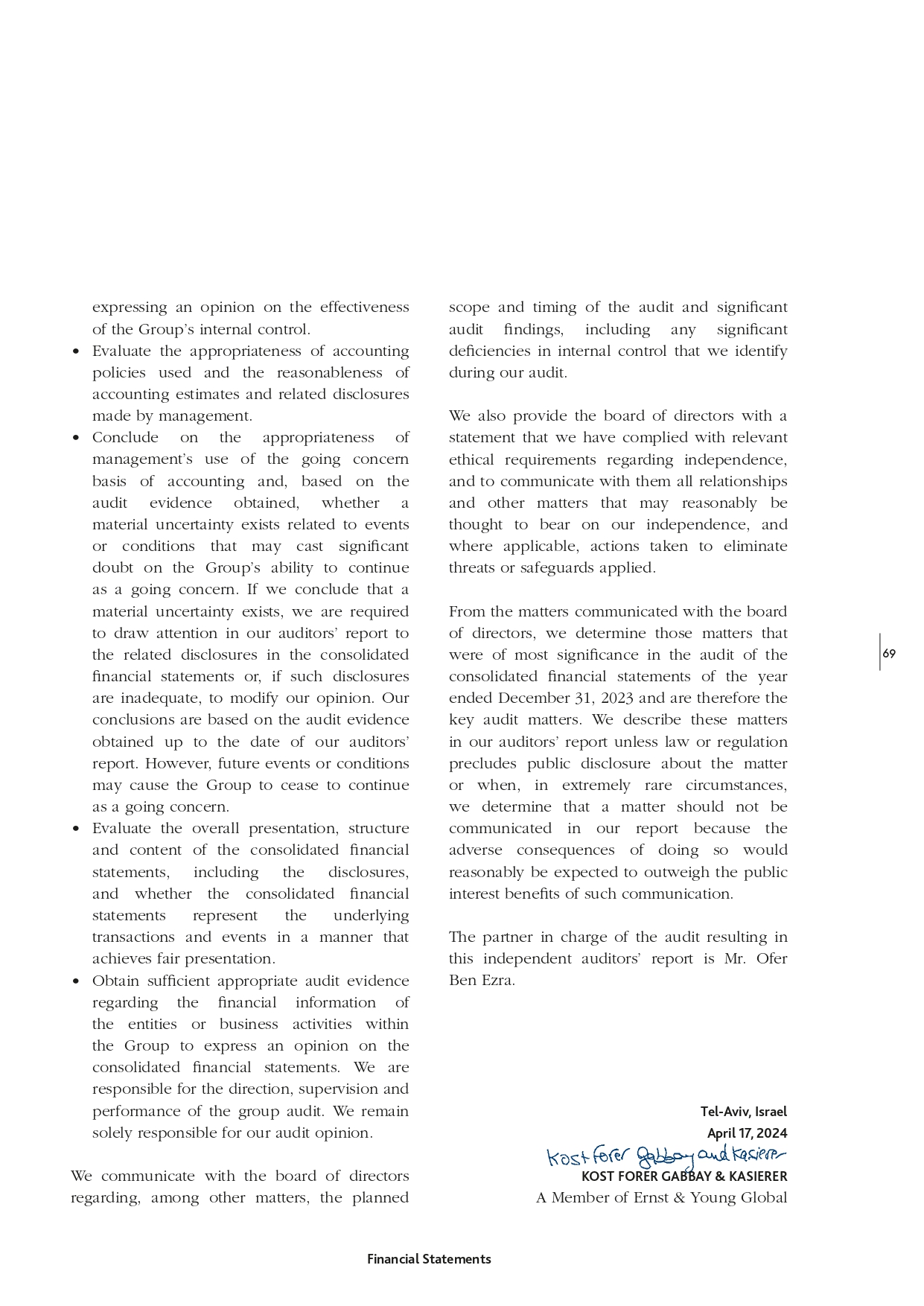
• • • • expressing an opinion on the effectiveness of the Group’s internal control. Evaluate the appropriateness of accounting policies used and
the reasonableness of accounting estimates and related disclosures made by management. Conclude on the appropriateness of management’s use of the going concern basis of accounting and, based on the audit evidence obtained, whether a material
uncertainty exists related to events or conditions that may cast significant doubt on the Group’s ability to continue as a going concern. If we conclude that a material uncertainty exists, we are required to draw attention in our auditors’ report to
the related disclosures in the consolidated financial statements or, if such disclosures are inadequate, to modify our opinion. Our conclusions are based on the audit evidence obtained up to the date of our auditors’ report. However, future events or
conditions may cause the Group to cease to continue as a going concern. Evaluate the overall presentation, structure and content of the consolidated financial statements, including the disclosures, and whether the consolidated financial statements
represent the underlying transactions and events in a manner that achieves fair presentation. Obtain sufficient appropriate audit evidence regarding the financial information of the entities or business activities within the Group to express an
opinion on the consolidated financial statements. We are responsible for the direction, supervision and performance of the group audit. We remain solely responsible for our audit opinion. scope and timing of the audit and significant audit findings,
including any significant deficiencies in internal control that we identify during our audit. We also provide the board of directors with a statement that we have complied with relevant ethical requirements regarding independence, and to communicate
with them all relationships and other matters that may reasonably be thought to bear on our independence, and where applicable, actions taken to eliminate threats or safeguards applied. From the matters communicated with the board of directors, we
determine those matters that were of most significance in the audit of the consolidated financial statements of the year ended December 31, 2023 and are therefore the key audit matters. We describe these matters in our auditors’ report unless law or
regulation precludes public disclosure about the matter or when, in extremely rare circumstances, we determine that a matter should not be communicated in our report because the adverse consequences of doing so would reasonably be expected to
outweigh the public interest benefits of such communication. The partner in charge of the audit resulting in this independent auditors’ report is Mr. Ofer Ben Ezra. We communicate with the board of directors regarding, among other matters, the
planned Financial Statements Tel-Aviv, Israel April 17, 2024 KOST FORER GABBAY & KASIERER A Member of Ernst & Young Global 69
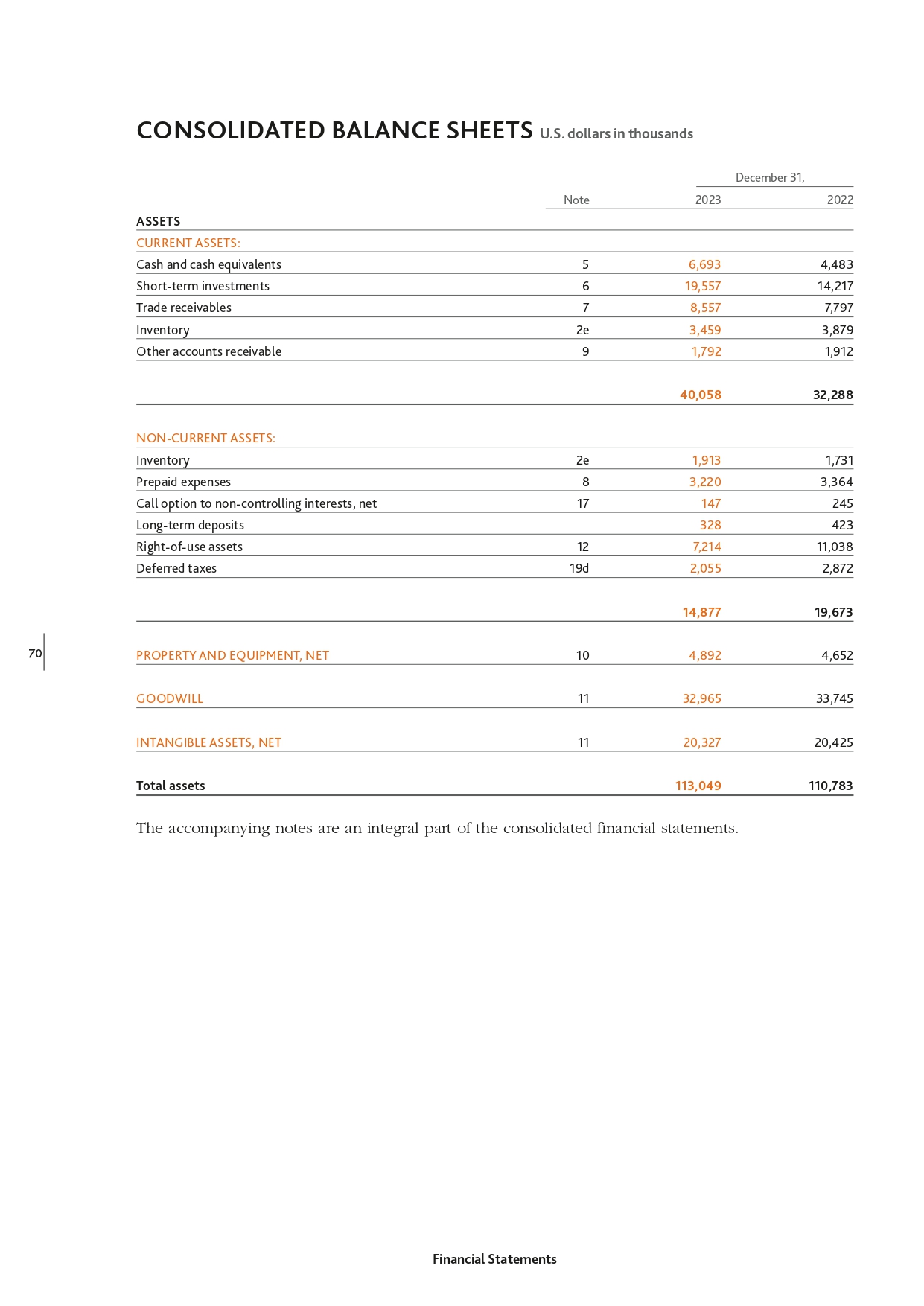
CONSOLIDATED BALANCE SHEETS U.S. dollars in thousands December 31, Note 2023 2022 ASSETS CURRENT ASSETS: Cash and cash equivalents 5 6,693 4,483
Short-term investments 6 19,557 14,217 Trade receivables Inventory Other accounts receivable 7 8,557 7,797 2e 3,459 3,879 9 1,792 1,912 40,058 32,288 NON-CURRENT ASSETS: Inventory Prepaid expenses Call option to non-controlling interests, net 2e
1,913 1,731 8 3,220 3,364 17 147 245 Long-term deposits Right-of-use assets Deferred taxes 70 328 423 12 7,214 11,038 19d 2,055 2,872 14,877 19,673 PROPERTY AND EQUIPMENT, NET 10 4,892 4,652 GOODWILL 11 32,965 33,745 INTANGIBLE ASSETS, NET 11 20,327
20,425 Total assets 113,049 110,783 The accompanying notes are an integral part of the consolidated financial statements. Financial Statements
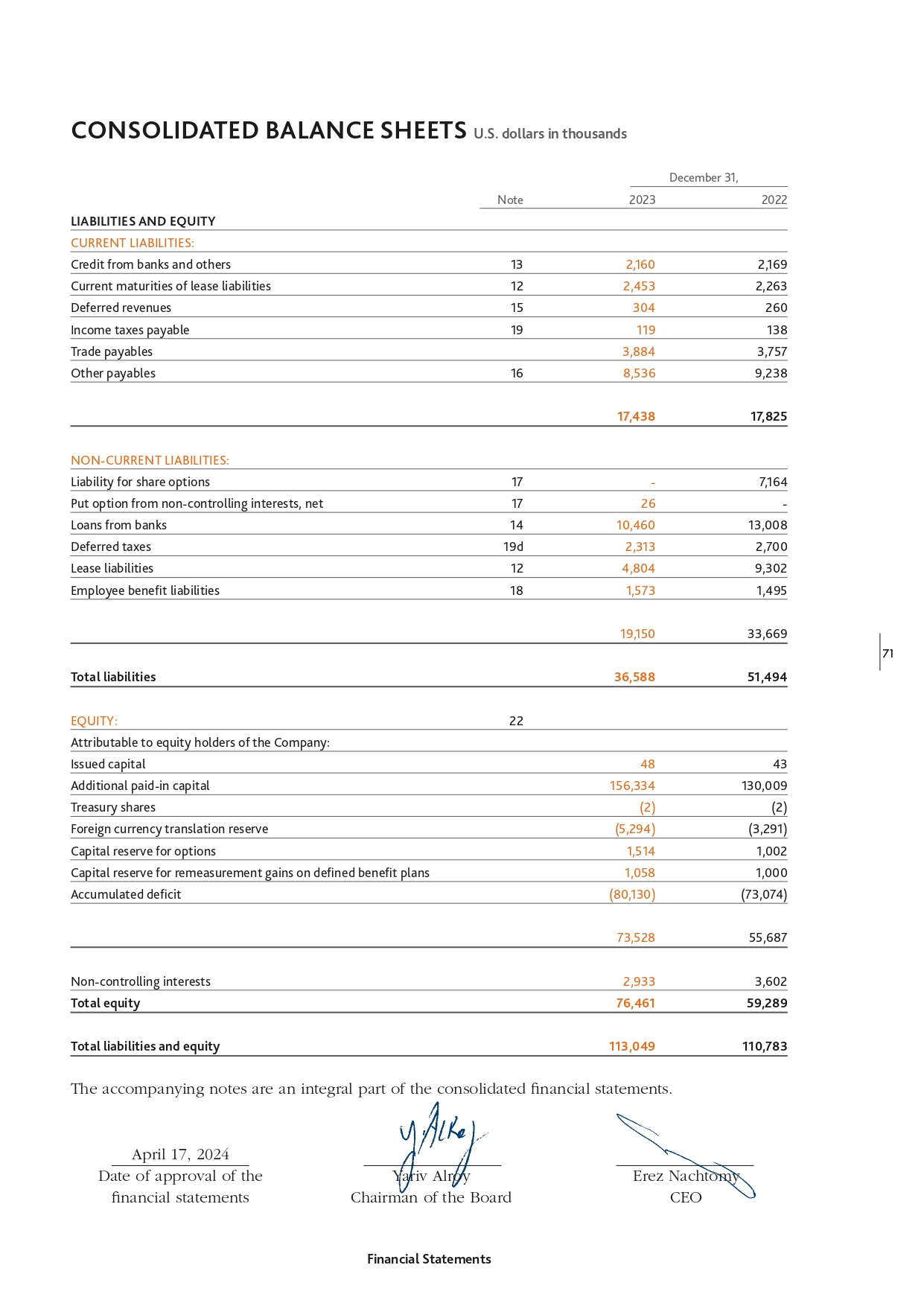
CONSOLIDATED BALANCE SHEETS U.S. dollars in thousands December 31, Note 2023 2022 LIABILITIES AND EQUITY CURRENT LIABILITIES: Credit from banks
and others 13 2,160 2,169 Current maturities of lease liabilities 12 2,453 2,263 Deferred revenues 15 304 260 Income taxes payable 19 119 138 Trade payables Other payables 16 3,884 3,757 8,536 9,238 17,438 17,825 NON-CURRENT LIABILITIES: Liability
for share options 17 - 7,164 Put option from non-controlling interests, net 17 26 - Loans from banks 14 10,460 13,008 19d 2,313 2,700 Lease liabilities 12 4,804 9,302 Employee benefit liabilities 18 1,573 1,495 Deferred taxes 19,150 33,669 71 Total
liabilities 36,588 51,494 Issued capital 48 43 Additional paid-in capital 156,334 130,009 (2) (2) (5,294) (3,291) 1,514 1,002 EQUITY: 22 Attributable to equity holders of the Company: Treasury shares Foreign currency translation reserve Capital
reserve for options Capital reserve for remeasurement gains on defined benefit plans Accumulated deficit Non-controlling interests Total equity Total liabilities and equity 1,058 1,000 (80,130) (73,074) 73,528 55,687 2,933 3,602 76,461 59,289 113,049
110,783 The accompanying notes are an integral part of the consolidated financial statements. April 17, 2024 Date of approval of the financial statements Yariv Alroy Chairman of the Board Financial Statements Erez Nachtomy CEO

CONSOLIDATED STATEMENTS OF COMPREHENSIVE INCOME U.S. dollars in thousands (except per share data) Year ended December 31, Note 2023 2022
Revenues 23a 57,075 58,998 Cost of revenues 23b 31,814 31,809 25,261 27,189 5,260 3,788 Gross profit Research and development costs 23c Selling and marketing expenses 23d 10,581 11,403 General and administrative expenses 23e 16,228 16,748 Other
expenses 23g 2,198 416 Operating loss (9,006) (5,166) Financial income 23f(1) 4,833 8,833 Financial expenses 23f(2) (1,791) (2,355) Profit (loss) before taxes on income (5,964) 1,312 891 1,097 (6,855) 215 52 581 (2,119) (6,699) Total other
comprehensive income (2,067) (6,118) Total comprehensive loss (8,922) (5,903) (7,056) (76) 201 291 (6,855) 215 (9,001) (5,775) 79 (128) (8,922) (5,903) Tax expenses 19b Net profit (loss) Other comprehensive income: 72 Other comprehensive income
(loss) not to be reclassified to profit or loss in subsequent periods: Re-measurement gain on defined benefit plans 18 Other comprehensive income (loss) to be reclassified to profit or loss in subsequent periods: Foreign currency translation reserve
Net profit (loss) attributable to: Equity holders of the Company Non-controlling interests Comprehensive income (loss) attributable to: Equity holders of the Company Non-controlling interests Earnings per share: Basic loss 24 (0.43) (0.01) Diluted
loss 24 (0.54) (0.49) The accompanying notes are an integral part of the consolidated financial statements. Financial Statements
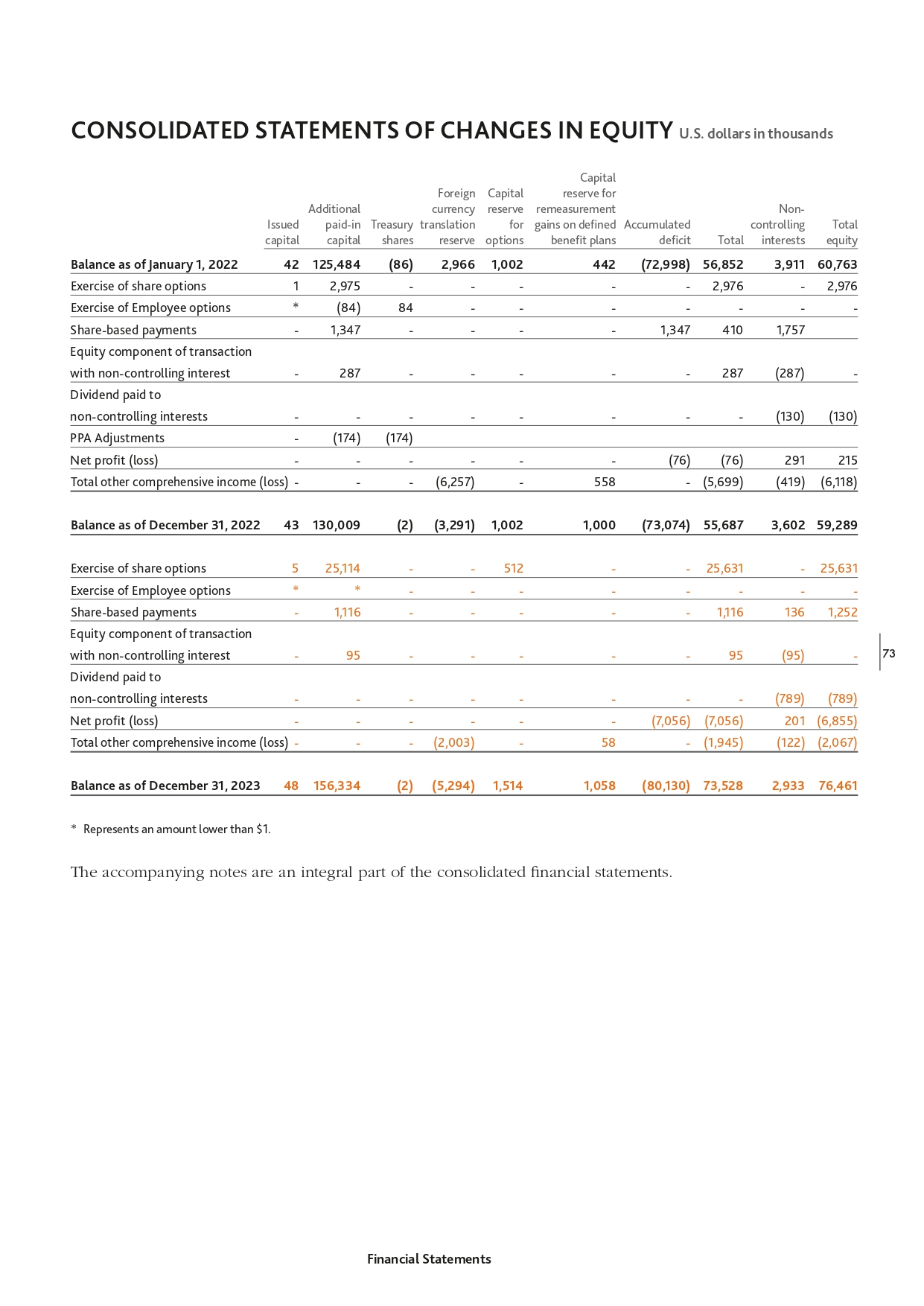
CONSOLIDATED STATEMENTS OF CHANGES IN EQUITY U.S. dollars in thousands Capital Foreign Capital reserve for Additional currency reserve
remeasurement NonIssued paid-in Treasury translation for gains on defined Accumulated controlling Total capital capital shares reserve options benefit plans deficit Total interests equity 42 125,484 (86) 2,966 1,002 442 Exercise of share options
Balance as of January 1, 2022 1 2,975 - - - - (72,998) 56,852 Exercise of Employee options * (84) 84 - - - - Share-based payments - 1,347 - - - - 1,347 - 287 - - - - - 287 (287) - non-controlling interests - - - - - - - - (130) (130) PPA Adjustments
- (174) (174) Net profit (loss) - - - - - - (76) (76) 291 215 Total other comprehensive income (loss) - - - (6,257) - 558 - (5,699) (419) (6,118) 43 130,009 (2) (3,291) 1,002 1,000 (73,074) 55,687 - 2,976 3,911 60,763 - 2,976 - - - 410 1,757 Equity
component of transaction with non-controlling interest Dividend paid to Balance as of December 31, 2022 3,602 59,289 Exercise of share options 5 25,114 - - 512 - - 25,631 - 25,631 Exercise of Employee options * * - - - - - - - - Share-based payments
- 1,116 - - - - - 1,116 136 1,252 - 95 - - - - - 95 (95) - (789) (789) Equity component of transaction with non-controlling interest Dividend paid to non-controlling interests - - - - - - - - Net profit (loss) - - - - - - (7,056) (7,056) 201 (6,855)
Total other comprehensive income (loss) - - - (2,003) - 58 - (1,945) (122) (2,067) 156,334 (2) (5,294) 1,514 1,058 (80,130) 73,528 Balance as of December 31, 2023 48 * Represents an amount lower than $1. The accompanying notes are an integral part of
the consolidated financial statements. Financial Statements 2,933 76,461 73
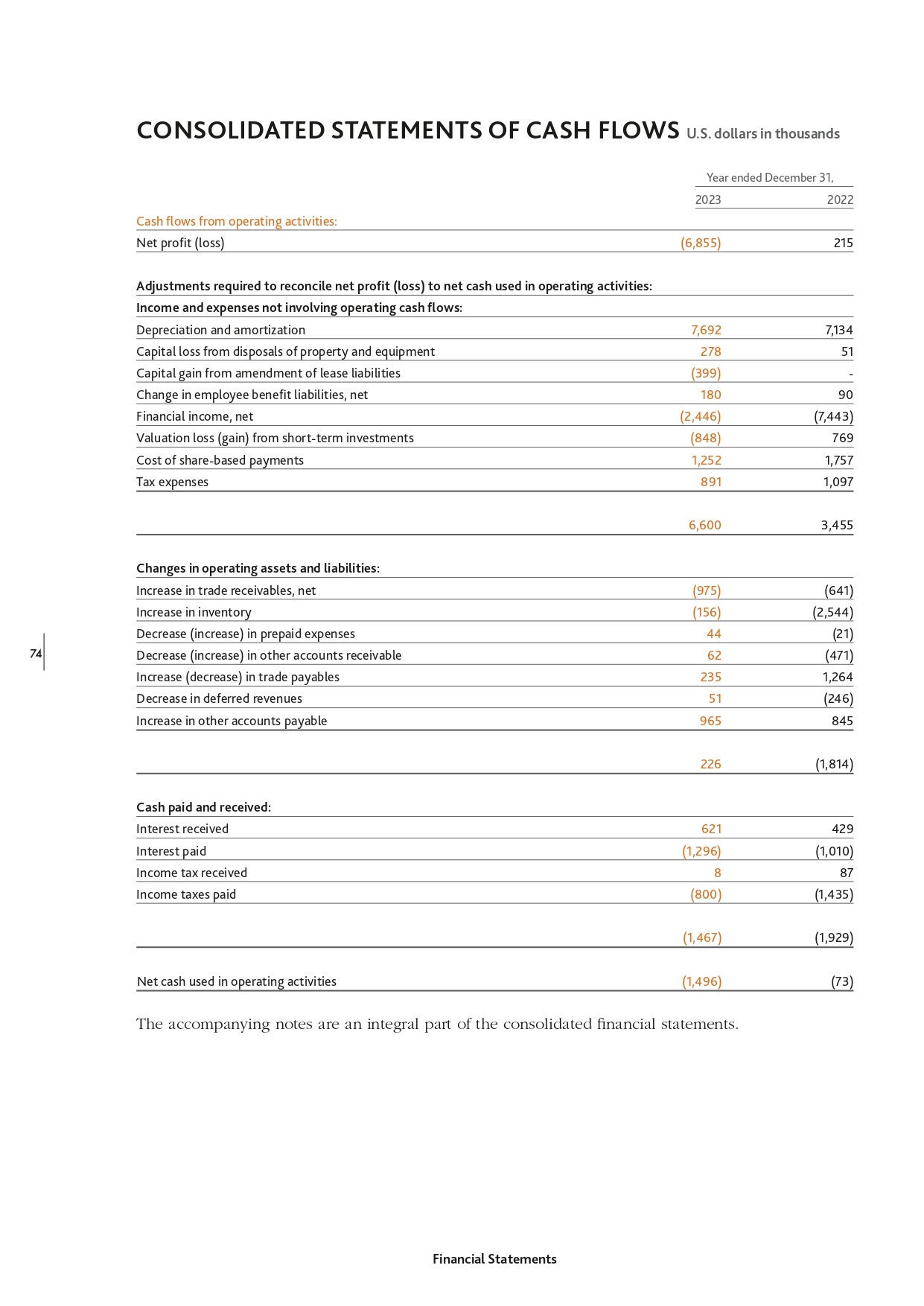
CONSOLIDATED STATEMENTS OF CASH FLOWS U.S. dollars in thousands Year ended December 31, 2023 2022 (6,855) 215 7,692 7,134 278 51 (399) - Cash
flows from operating activities: Net profit (loss) Adjustments required to reconcile net profit (loss) to net cash used in operating activities: Income and expenses not involving operating cash flows: Depreciation and amortization Capital loss from
disposals of property and equipment Capital gain from amendment of lease liabilities Change in employee benefit liabilities, net Financial income, net 180 90 (2,446) (7,443) Valuation loss (gain) from short-term investments (848) 769 Cost of
share-based payments 1,252 1,757 891 1,097 6,600 3,455 Increase in trade receivables, net (975) (641) Increase in inventory (156) (2,544) 44 (21) Tax expenses Changes in operating assets and liabilities: Decrease (increase) in prepaid expenses 74
Decrease (increase) in other accounts receivable Increase (decrease) in trade payables Decrease in deferred revenues Increase in other accounts payable 62 (471) 235 1,264 51 (246) 965 845 226 (1,814) Cash paid and received: Interest received Interest
paid Income tax received Income taxes paid Net cash used in operating activities 621 429 (1,296) (1,010) 8 87 (800) (1,435) (1,467) (1,929) (1,496) (73) The accompanying notes are an integral part of the consolidated financial statements. Financial
Statements

CONSOLIDATED STATEMENTS OF CASH FLOWS U.S. dollars in thousands Year ended December 31, 2023 2022 (1,289) (1,661) Investment in intangible
assets (4,203) (5,243) Investment in short-term deposits (9,840) (5,705) Cash flows from investing activities: Purchase of property and equipment Proceeds from short-term deposits 5,855 - Purchase of short-term investments (2,291) (5,588) 2,422
11,764 (9,346) (6,433) Proceeds from sale of short-term investments Net cash used in investing activities Cash flows from financing activities: Dividend paid to non-controlling interests (789) (130) Payment of lease liabilities (2,648) (2,447)
Exercise of share options 20,298 1,961 Payment of long-term loans (2,070) (1,665) Payment of liability to underwriters (1,124) - Net cash provided by (used in) financing activities 13,667 (2,281) (615) (1,575) Effect of exchange rate changes on cash
and cash equivalents 75 Increase (decrease) in cash and cash equivalents 2,210 (10,362) Cash and cash equivalents at the beginning of the year 4,483 14,845 Cash and cash equivalents at the end of the year 6,693 4,483 Non-cash transactions:
Right-of-use asset recognized with corresponding lease liability Liability derecognized and recorded in equity upon exercise of share options (1,265) 1,658 5,333 1,015 The accompanying notes are an integral part of the consolidated financial
statements. Financial Statements
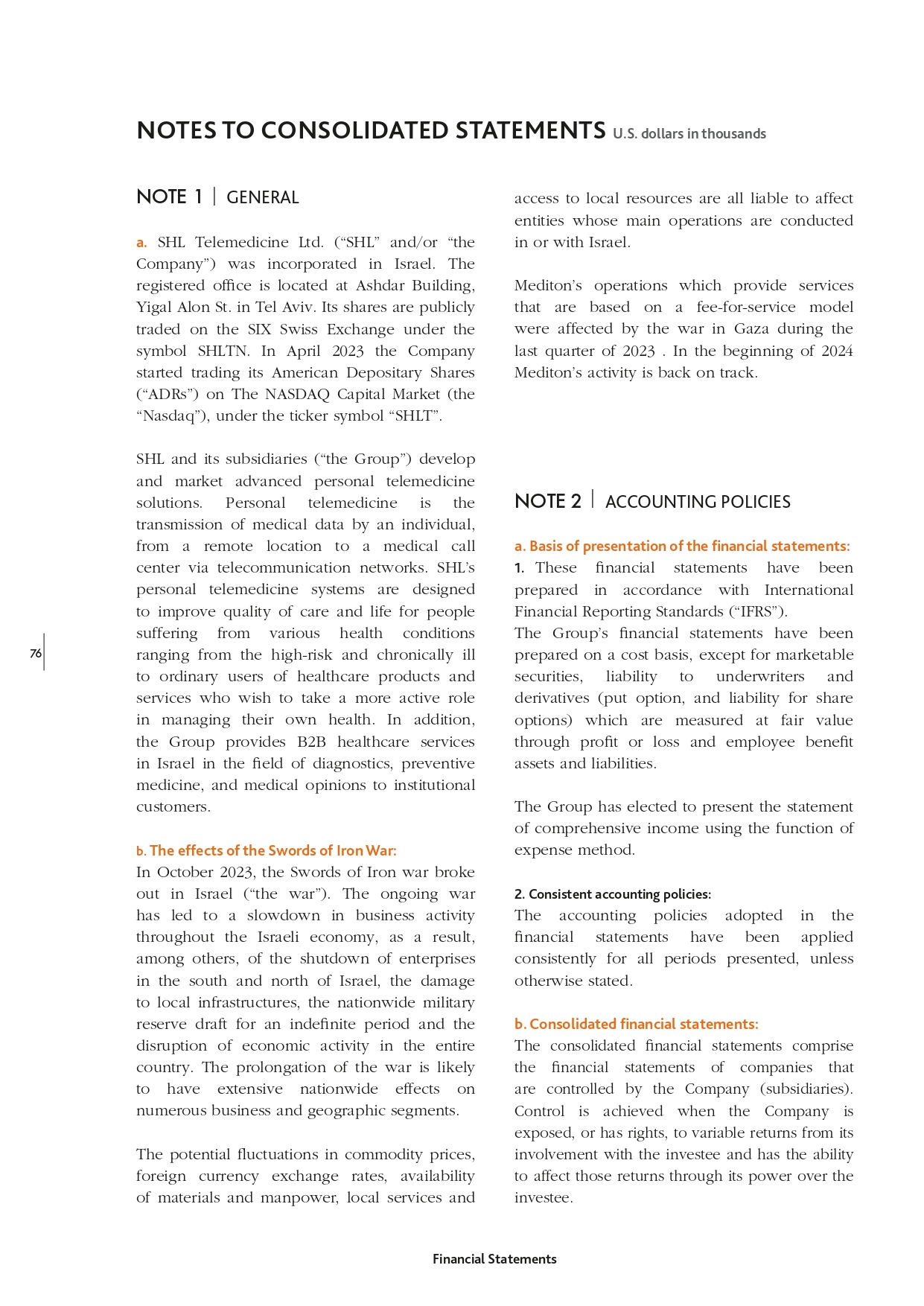
NOTES TO CONSOLIDATED STATEMENTS U.S. dollars in thousands NOTE 1 | GENERAL a. SHL Telemedicine Ltd. (“SHL” and/or “the Company”) was
incorporated in Israel. The registered office is located at Ashdar Building, Yigal Alon St. in Tel Aviv. Its shares are publicly traded on the SIX Swiss Exchange under the symbol SHLTN. In April 2023 the Company started trading its American
Depositary Shares (“ADRs”) on The NASDAQ Capital Market (the “Nasdaq”), under the ticker symbol “SHLT”. 76 SHL and its subsidiaries (“the Group”) develop and market advanced personal telemedicine solutions. Personal telemedicine is the transmission
of medical data by an individual, from a remote location to a medical call center via telecommunication networks. SHL’s personal telemedicine systems are designed to improve quality of care and life for people suffering from various health conditions
ranging from the high-risk and chronically ill to ordinary users of healthcare products and services who wish to take a more active role in managing their own health. In addition, the Group provides B2B healthcare services in Israel in the field of
diagnostics, preventive medicine, and medical opinions to institutional customers. b. The effects of the Swords of Iron War: In October 2023, the Swords of Iron war broke out in Israel (“the war”). The ongoing war has led to a slowdown in business
activity throughout the Israeli economy, as a result, among others, of the shutdown of enterprises in the south and north of Israel, the damage to local infrastructures, the nationwide military reserve draft for an indefinite period and the
disruption of economic activity in the entire country. The prolongation of the war is likely to have extensive nationwide effects on numerous business and geographic segments. The potential fluctuations in commodity prices, foreign currency exchange
rates, availability of materials and manpower, local services and access to local resources are all liable to affect entities whose main operations are conducted in or with Israel. Mediton’s operations which provide services that are based on a
fee-for-service model were affected by the war in Gaza during the last quarter of 2023 . In the beginning of 2024 Mediton’s activity is back on track. NOTE 2 | ACCOUNTING POLICIES a. Basis of presentation of the financial statements: 1. These
financial statements have been prepared in accordance with International Financial Reporting Standards (“IFRS”). The Group’s financial statements have been prepared on a cost basis, except for marketable securities, liability to underwriters and
derivatives (put option, and liability for share options) which are measured at fair value through profit or loss and employee benefit assets and liabilities. The Group has elected to present the statement of comprehensive income using the function
of expense method. 2. Consistent accounting policies: The accounting policies adopted in the financial statements have been applied consistently for all periods presented, unless otherwise stated. b. Consolidated financial statements: The
consolidated financial statements comprise the financial statements of companies that are controlled by the Company (subsidiaries). Control is achieved when the Company is exposed, or has rights, to variable returns from its involvement with the
investee and has the ability to affect those returns through its power over the investee. Financial Statements
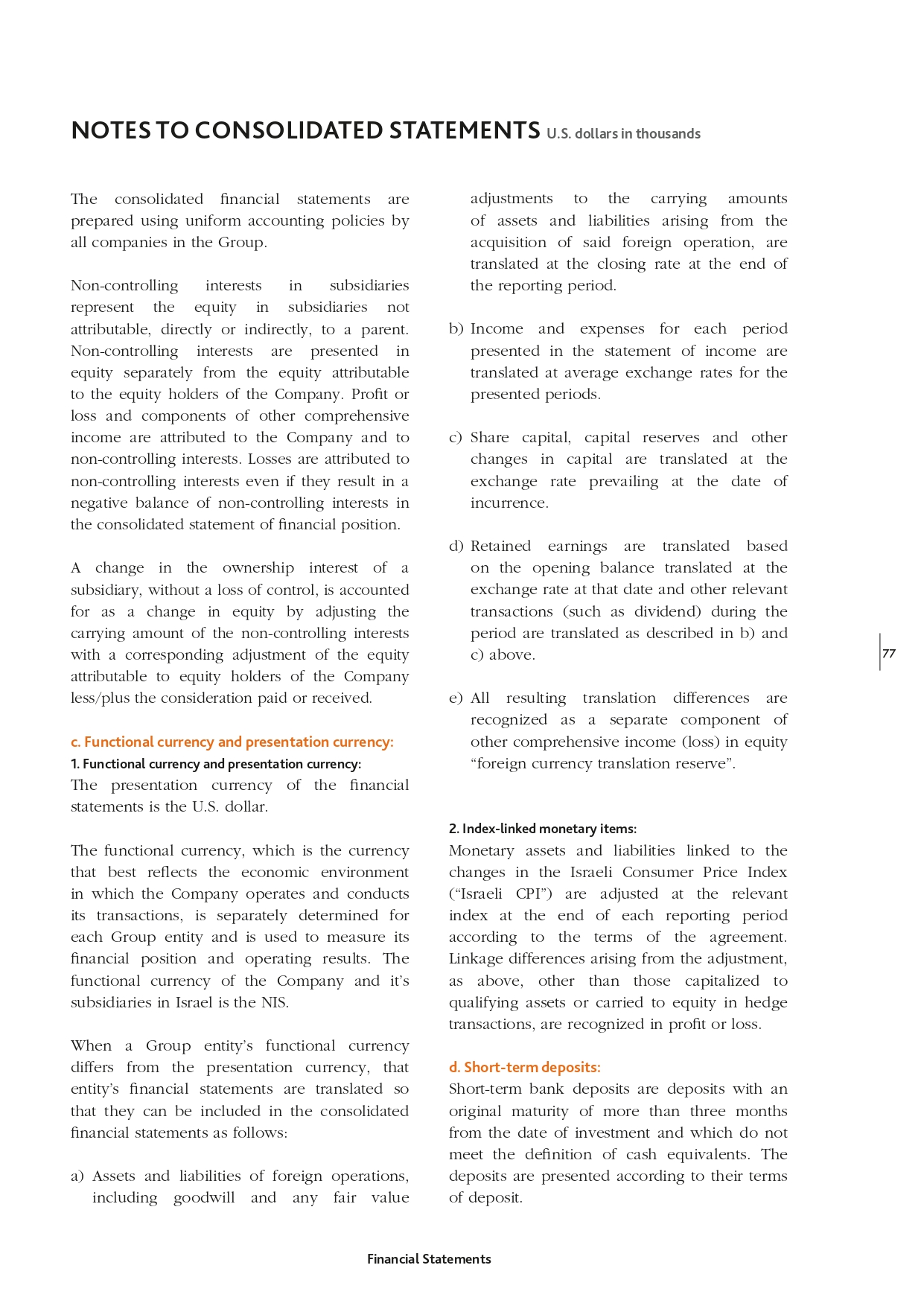
NOTES TO CONSOLIDATED STATEMENTS U.S. dollars in thousands The consolidated financial statements are prepared using uniform accounting policies
by all companies in the Group. Non-controlling interests in subsidiaries represent the equity in subsidiaries not attributable, directly or indirectly, to a parent. Non-controlling interests are presented in equity separately from the equity
attributable to the equity holders of the Company. Profit or loss and components of other comprehensive income are attributed to the Company and to non-controlling interests. Losses are attributed to non-controlling interests even if they result in a
negative balance of non-controlling interests in the consolidated statement of financial position. A change in the ownership interest of a subsidiary, without a loss of control, is accounted for as a change in equity by adjusting the carrying amount
of the non-controlling interests with a corresponding adjustment of the equity attributable to equity holders of the Company less/plus the consideration paid or received. c. Functional currency and presentation currency: 1. Functional currency and
presentation currency: adjustments to the carrying amounts of assets and liabilities arising from the acquisition of said foreign operation, are translated at the closing rate at the end of the reporting period. b) Income and expenses for each period
presented in the statement of income are translated at average exchange rates for the presented periods. c) Share capital, capital reserves and other changes in capital are translated at the exchange rate prevailing at the date of incurrence. d)
Retained earnings are translated based on the opening balance translated at the exchange rate at that date and other relevant transactions (such as dividend) during the period are translated as described in b) and c) above. e) All resulting
translation differences are recognized as a separate component of other comprehensive income (loss) in equity “foreign currency translation reserve”. The presentation currency of the financial statements is the U.S. dollar. 2. Index-linked monetary
items: The functional currency, which is the currency that best reflects the economic environment in which the Company operates and conducts its transactions, is separately determined for each Group entity and is used to measure its financial
position and operating results. The functional currency of the Company and it’s subsidiaries in Israel is the NIS. When a Group entity’s functional currency differs from the presentation currency, that entity’s financial statements are translated so
that they can be included in the consolidated financial statements as follows: a) Assets and liabilities of foreign operations, including goodwill and any fair value Monetary assets and liabilities linked to the changes in the Israeli Consumer Price
Index (“Israeli CPI”) are adjusted at the relevant index at the end of each reporting period according to the terms of the agreement. Linkage differences arising from the adjustment, as above, other than those capitalized to qualifying assets or
carried to equity in hedge transactions, are recognized in profit or loss. d. Short-term deposits: Short-term bank deposits are deposits with an original maturity of more than three months from the date of investment and which do not meet the
definition of cash equivalents. The deposits are presented according to their terms of deposit. Financial Statements 77
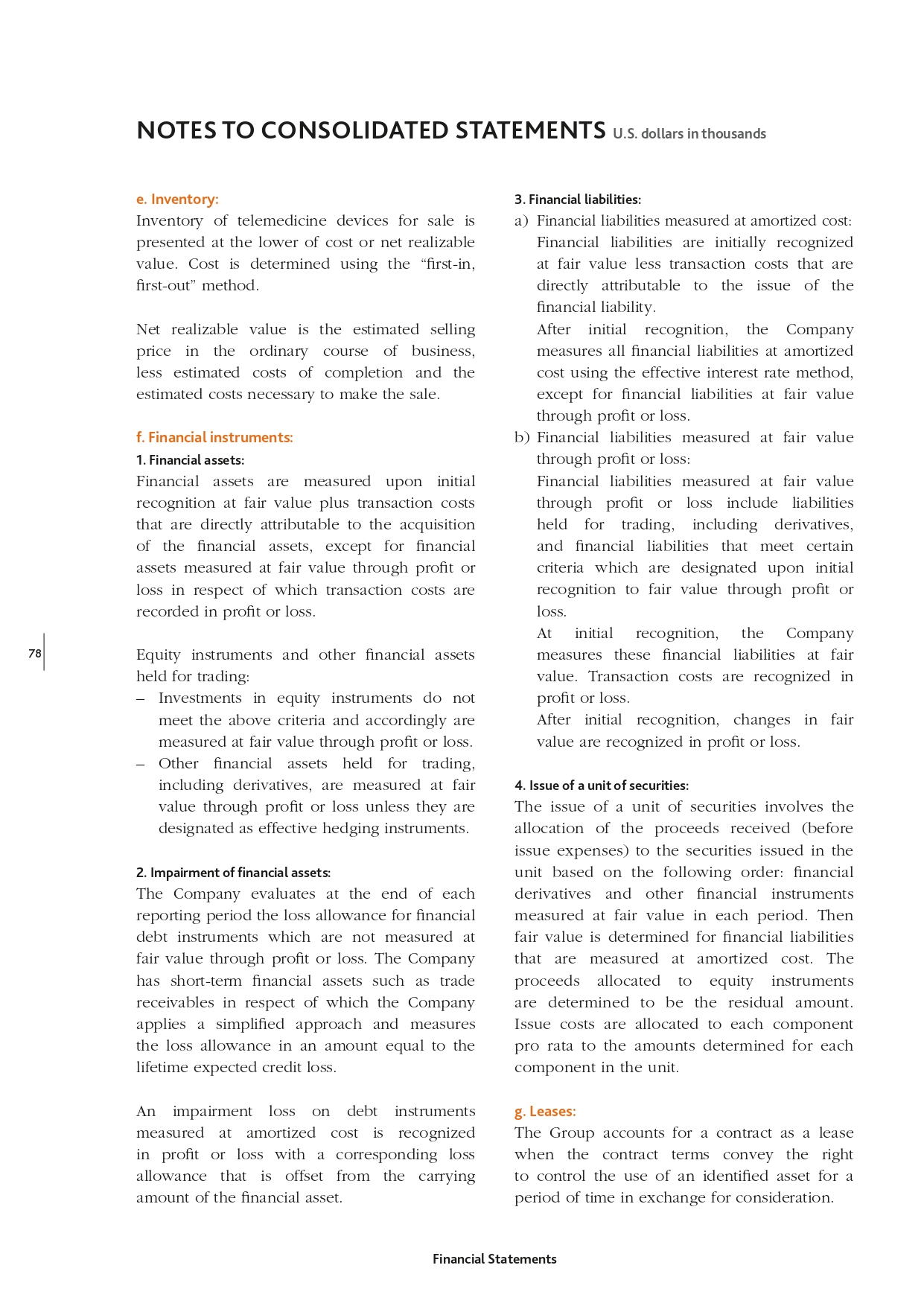
NOTES TO CONSOLIDATED STATEMENTS U.S. dollars in thousands e. Inventory: 3. Financial liabilities: Inventory of telemedicine devices for sale is
presented at the lower of cost or net realizable value. Cost is determined using the “first-in, first-out” method. a) Financial liabilities measured at amortized cost: Financial liabilities are initially recognized at fair value less transaction
costs that are directly attributable to the issue of the financial liability. After initial recognition, the Company measures all financial liabilities at amortized cost using the effective interest rate method, except for financial liabilities at
fair value through profit or loss. b) Financial liabilities measured at fair value through profit or loss: Financial liabilities measured at fair value through profit or loss include liabilities held for trading, including derivatives, and financial
liabilities that meet certain criteria which are designated upon initial recognition to fair value through profit or loss. At initial recognition, the Company measures these financial liabilities at fair value. Transaction costs are recognized in
profit or loss. After initial recognition, changes in fair value are recognized in profit or loss. Net realizable price in the less estimated estimated costs value is the estimated selling ordinary course of business, costs of completion and the
necessary to make the sale. f. Financial instruments: 1. Financial assets: Financial assets are measured upon initial recognition at fair value plus transaction costs that are directly attributable to the acquisition of the financial assets, except
for financial assets measured at fair value through profit or loss in respect of which transaction costs are recorded in profit or loss. 78 Equity instruments and other financial assets held for trading: – Investments in equity instruments do not
meet the above criteria and accordingly are measured at fair value through profit or loss. – Other financial assets held for trading, including derivatives, are measured at fair value through profit or loss unless they are designated as effective
hedging instruments. 2. Impairment of financial assets: The Company evaluates at the end of each reporting period the loss allowance for financial debt instruments which are not measured at fair value through profit or loss. The Company has
short-term financial assets such as trade receivables in respect of which the Company applies a simplified approach and measures the loss allowance in an amount equal to the lifetime expected credit loss. An impairment loss on debt instruments
measured at amortized cost is recognized in profit or loss with a corresponding loss allowance that is offset from the carrying amount of the financial asset. 4. Issue of a unit of securities: The issue of a unit of securities involves the allocation
of the proceeds received (before issue expenses) to the securities issued in the unit based on the following order: financial derivatives and other financial instruments measured at fair value in each period. Then fair value is determined for
financial liabilities that are measured at amortized cost. The proceeds allocated to equity instruments are determined to be the residual amount. Issue costs are allocated to each component pro rata to the amounts determined for each component in the
unit. g. Leases: The Group accounts for a contract as a lease when the contract terms convey the right to control the use of an identified asset for a period of time in exchange for consideration. Financial Statements

NOTES TO CONSOLIDATED STATEMENTS U.S. dollars in thousands 1. The Group as a lessee: For leases in which the Group is the lessee, the Group
recognizes on the commencement date of the lease a right-of-use asset and a lease liability, excluding leases whose term is up to 12 months and leases for which the underlying asset is of low value. For these excluded leases, the Group has elected to
recognize the lease payments as an expense in profit or loss on a straight-line basis over the lease term. In measuring the lease liability, the Group has elected to apply the practical expedient in the Standard and does not separate the lease
components from the non-lease components (such as management and maintenance services, etc.) included in a single contract. Leases which entitle employees to a company car as part of their employment terms are accounted for as employee benefits in
accordance with the provisions of IAS 19 and not as subleases. On the commencement date, the lease liability includes all unpaid lease payments (excluding variable lease payments) discounted at the interest rate implicit in the lease, if that rate
can be readily determined, or otherwise using the Group ‘s incremental borrowing rate. After the commencement date, the Group measures the lease liability using the effective interest rate method. On the commencement date, the right-of-use asset is
recognized in an amount equal to the lease liability plus lease payments already made on or before the commencement date and initial direct costs incurred. The right-of-use asset is measured applying the cost model and depreciated over the shorter of
its useful life and the lease term. Following are the periods of depreciation of the right-of-use assets by class of underlying asset: Years Motor vehicles Buildings Mainly 1.5 - 3.5 3 4 - 11 10 The Group tests for impairment of the rightof-use asset
whenever there are indications of impairment pursuant to the provisions of IAS 36. 2. Variable lease payments that depend on an index: On the commencement date, the Group uses the index rate prevailing on the commencement date to calculate the future
lease payments. For leases in which the Group is the lessee, the aggregate changes in future lease payments resulting from a change in the index are discounted (without a change in the discount rate applicable to the lease liability) and recorded as
an adjustment of the lease liability and the right-of-use asset, only when there is a change in the cash flows resulting from the change in the index (that is, when the adjustment to the lease payments takes effect). 3. Lease extension and
termination options: A non-cancellable lease term includes both the periods covered by an option to extend the lease when it is reasonably certain that the extension option will be exercised and the periods covered by a lease termination option when
it is reasonably certain that the termination option will not be exercised. In the event of any change in the expected exercise of the lease extension option or in the expected non-exercise of the lease termination option, the Group remeasures the
lease liability based on the revised lease term using a revised discount rate as of the date of the change in expectations. The total change is recognized in the carrying amount of the right-of-use asset until it is reduced to zero, and any further
reductions are recognized in profit or loss. 4. Lease modifications: If a lease modification does not reduce the scope of the lease and does not result in a separate lease, the Group remeasures the lease liability based on the modified lease terms
using a revised discount rate as of the modification date and records the change in the lease liability as an adjustment to the right-of-use asset. Financial Statements 79

NOTES TO CONSOLIDATED STATEMENTS U.S. dollars in thousands If a lease modification reduces the scope of the lease, the Group recognizes a gain
or loss arising from the partial or full reduction of the carrying amount of the right-of-use asset and the lease liability. The Group subsequently remeasures the carrying amount of the lease liability according to the revised lease terms, at the
revised discount rate as of the modification date and records the change in the lease liability as an adjustment to the right-of-use asset. h. Business combinations and goodwill: Business combinations are accounted for by applying the acquisition
method. The cost of the acquisition is measured at the fair value of the consideration transferred on the date of acquisition with the addition of non-controlling interests in the acquiree. i. Property and equipment: Property and equipment are
measured at cost, including directly attributable costs, less accumulated depreciation and accumulated impairment losses. Cost includes spare parts and auxiliary equipment that can be used only in connection with the property and equipment.
Depreciation is calculated at constant annual rates on a straight-line basis over the useful life of the assets at annual rates as follows: % Medical equipment 10 - 15 (mainly 15%) Motor vehicles and ambulances 15 - 20 (mainly 20%) Office furniture
and equipment 6 - 7 (mainly 6%) Computers and peripheral equipment Leasehold improvements 15 - 33 (mainly 20%) see below Telemedicine devices on loan to customers 10 Direct acquisition costs are carried to the income statement as incurred. 80 A put
option granted by the Group to noncontrolling interests and concurrently a call option received by the Group from the noncontrolling interests that can be settled in cash or by the delivery of a variable number of shares are accounted for as a
derivative financial liability or asset presented on a net basis and measured at fair value. The noncontrolling interests continue to be recognized in equity until the put or call options are exercised. Goodwill is initially measured at cost which
represents the excess of the acquisition consideration and the amount of noncontrolling interests over the net identifiable assets acquired and liabilities assumed. After initial recognition, goodwill is measured at cost less any accumulated
impairment losses. For purposes of evaluation of impairment of goodwill, goodwill purchased in a business combination is evaluated and attributed to the cash-generating units to which it had been allocated. Leasehold improvements are depreciated on a
straight-line basis over the shorter of the lease term (including any extension option held by the Group and intended to be exercised) and the expected life of the improvement. j. Intangible assets: Intangible assets acquired in a business
combination are included at fair value at the acquisition date. After initial recognition, intangible assets are carried at their cost less any accumulated amortization and any accumulated impairment losses. Expenditures relating to internally
generated intangible assets, excluding capitalized development costs, are recognized in profit or loss when incurred. According to management’s assessment, intangible assets have a finite useful life. The assets are amortized over their useful life
using the straight-line method and reviewed for impairment whenever there is an indication that the asset may be impaired. Financial Statements
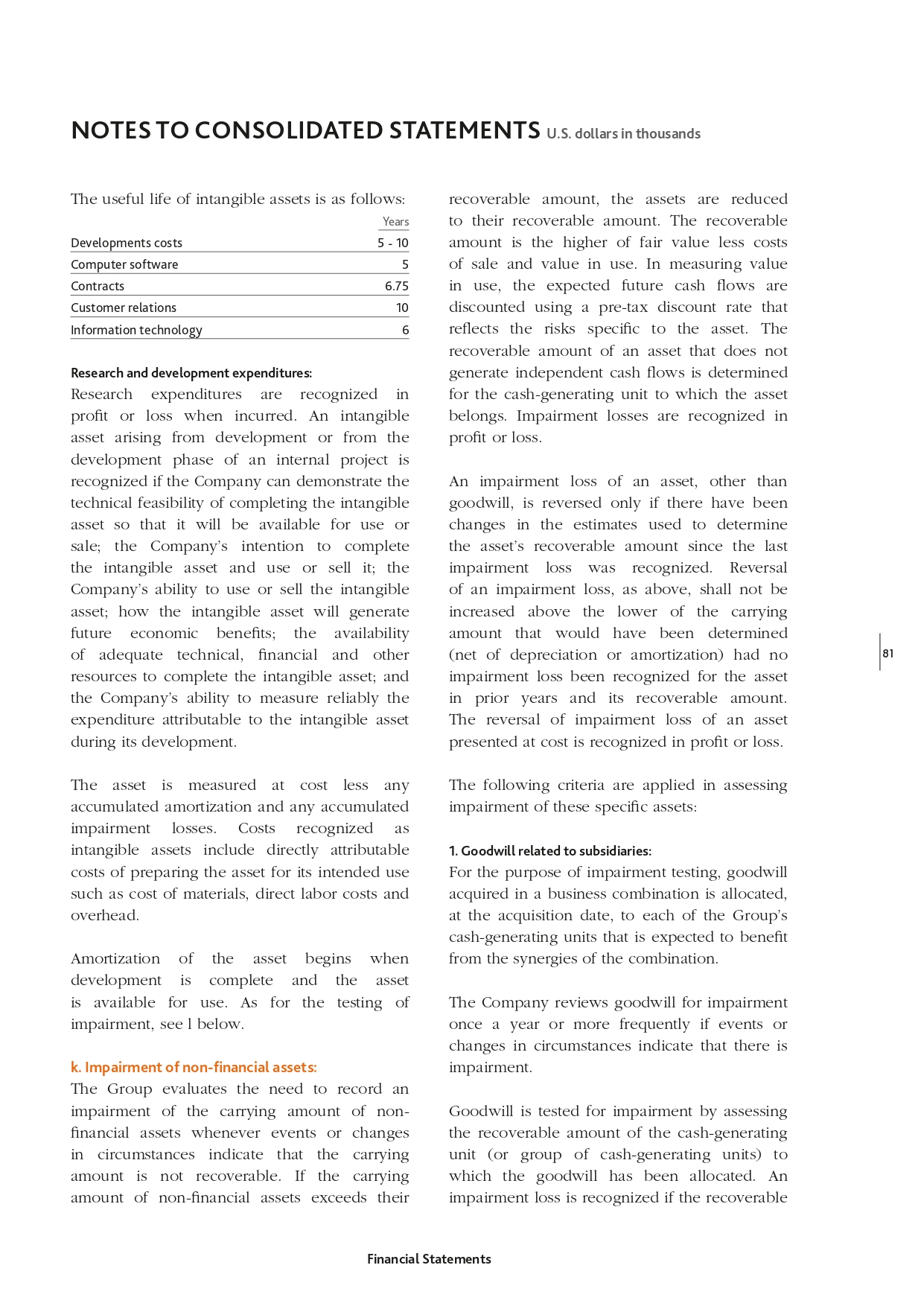
NOTES TO CONSOLIDATED STATEMENTS U.S. dollars in thousands The useful life of intangible assets is as follows: Years Developments costs Computer
software Contracts Customer relations Information technology 5 - 10 5 6.75 10 6 Research and development expenditures: Research expenditures are recognized in profit or loss when incurred. An intangible asset arising from development or from the
development phase of an internal project is recognized if the Company can demonstrate the technical feasibility of completing the intangible asset so that it will be available for use or sale; the Company’s intention to complete the intangible asset
and use or sell it; the Company’s ability to use or sell the intangible asset; how the intangible asset will generate future economic benefits; the availability of adequate technical, financial and other resources to complete the intangible asset;
and the Company’s ability to measure reliably the expenditure attributable to the intangible asset during its development. The asset is measured at cost less any accumulated amortization and any accumulated impairment losses. Costs recognized as
intangible assets include directly attributable costs of preparing the asset for its intended use such as cost of materials, direct labor costs and overhead. Amortization of the asset begins when development is complete and the asset is available for
use. As for the testing of impairment, see l below. recoverable amount, the assets are reduced to their recoverable amount. The recoverable amount is the higher of fair value less costs of sale and value in use. In measuring value in use, the
expected future cash flows are discounted using a pre-tax discount rate that reflects the risks specific to the asset. The recoverable amount of an asset that does not generate independent cash flows is determined for the cash-generating unit to
which the asset belongs. Impairment losses are recognized in profit or loss. An impairment loss of an asset, other than goodwill, is reversed only if there have been changes in the estimates used to determine the asset’s recoverable amount since the
last impairment loss was recognized. Reversal of an impairment loss, as above, shall not be increased above the lower of the carrying amount that would have been determined (net of depreciation or amortization) had no impairment loss been recognized
for the asset in prior years and its recoverable amount. The reversal of impairment loss of an asset presented at cost is recognized in profit or loss. The following criteria are applied in assessing impairment of these specific assets: 1. Goodwill
related to subsidiaries: For the purpose of impairment testing, goodwill acquired in a business combination is allocated, at the acquisition date, to each of the Group’s cash-generating units that is expected to benefit from the synergies of the
combination. k. Impairment of non-financial assets: The Company reviews goodwill for impairment once a year or more frequently if events or changes in circumstances indicate that there is impairment. The Group evaluates the need to record an
impairment of the carrying amount of nonfinancial assets whenever events or changes in circumstances indicate that the carrying amount is not recoverable. If the carrying amount of non-financial assets exceeds their Goodwill is tested for impairment
by assessing the recoverable amount of the cash-generating unit (or group of cash-generating units) to which the goodwill has been allocated. An impairment loss is recognized if the recoverable Financial Statements 81

NOTES TO CONSOLIDATED STATEMENTS U.S. dollars in thousands amount of the cash-generating unit (or group of cash-generating units) to which
goodwill has been allocated is less than the carrying amount of the cash-generating unit (or group of cash-generating units). Any impairment loss is allocated first to goodwill. Impairment losses recognized for goodwill cannot be reversed in
subsequent periods. 2. Development costs capitalized during the development period: The impairment test is performed annually, on December 31, or more frequently if events or changes in circumstances indicate that there is impairment. l. Taxes on
income: 82 Taxes on income in the statement of comprehensive income comprise current and deferred taxes. Current or deferred taxes are recognized in the statement of income except to the extent that the tax arises from items which are recognized
directly in other comprehensive income or in equity. In such cases, the tax effect is also recognized in the relevant item. 1. Current taxes: The current tax liability is measured using the tax rates and tax laws that have been enacted or
substantively enacted by the end of the reporting period as well as adjustments required in connection with the tax liability in respect of previous years. 2. Deferred taxes: Deferred taxes are computed in respect of temporary differences between the
carrying amounts in the financial statements and the amounts attributed for tax purposes. Deferred taxes are measured at the tax rates that are expected to apply to the period when the taxes are reversed in profit or loss, comprehensive income or
equity, based on tax laws that have been enacted or substantively enacted by the end of the reporting period. Deferred taxes in profit or loss represent the changes in the carrying amount of deferred tax balances during the reporting period,
excluding changes attributable to items recognized outside of profit or loss. Deferred tax assets are reviewed at the end of each reporting period and reduced to the extent that it is not probable that they will be utilized. Also, temporary
differences (such as carry forward losses) for which deferred tax assets have not been recognized are reassessed and deferred tax assets are recognized to the extent that their recoverability has become probable. Any resulting reduction or reversal
is recognized in the line item, “taxes on income”. Taxes that would apply in the event of the disposal of investments in investees have not been taken into account in computing deferred taxes, as long as the disposal of the investments in investees
is not probable in the foreseeable future. Also, deferred taxes that would apply in the event of distribution of earnings by investees as dividends have not been taken into account in computing deferred taxes, since the distribution of dividends does
not involve an additional tax liability or since it is the Group’s policy not to initiate distribution of dividends that triggers an additional tax liability. m. Share-based payment transactions: The Company’s employees are entitled to remuneration
in the form of equity-settled share-based payment transactions (see details in Note 22). Equity-settled transactions: The cost of equity-settled transactions with employees is measured at the fair value of the equity instruments granted at grant
date. The fair value is determined using a standard option pricing model, additional details are given in Note 22d. No expense is recognized for awards that do not ultimately vest, except for awards where Financial Statements
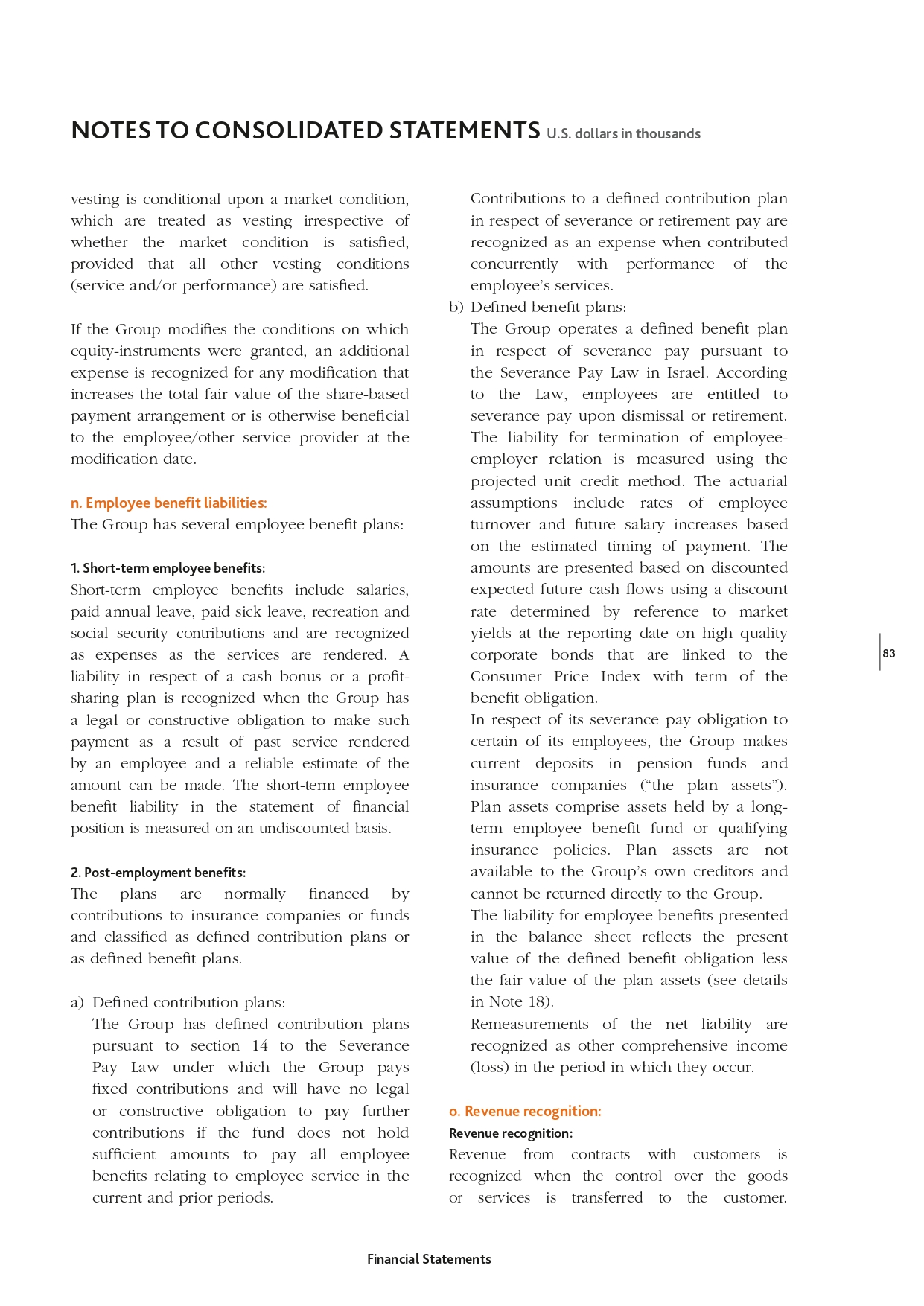
NOTES TO CONSOLIDATED STATEMENTS U.S. dollars in thousands vesting is conditional upon a market condition, which are treated as vesting
irrespective of whether the market condition is satisfied, provided that all other vesting conditions (service and/or performance) are satisfied. If the Group modifies the conditions on which equity-instruments were granted, an additional expense is
recognized for any modification that increases the total fair value of the share-based payment arrangement or is otherwise beneficial to the employee/other service provider at the modification date. n. Employee benefit liabilities: The Group has
several employee benefit plans: 1. Short-term employee benefits: Short-term employee benefits include salaries, paid annual leave, paid sick leave, recreation and social security contributions and are recognized as expenses as the services are
rendered. A liability in respect of a cash bonus or a profitsharing plan is recognized when the Group has a legal or constructive obligation to make such payment as a result of past service rendered by an employee and a reliable estimate of the
amount can be made. The short-term employee benefit liability in the statement of financial position is measured on an undiscounted basis. 2. Post-employment benefits: The plans are normally financed by contributions to insurance companies or funds
and classified as defined contribution plans or as defined benefit plans. a) Defined contribution plans: The Group has defined contribution plans pursuant to section 14 to the Severance Pay Law under which the Group pays fixed contributions and will
have no legal or constructive obligation to pay further contributions if the fund does not hold sufficient amounts to pay all employee benefits relating to employee service in the current and prior periods. Contributions to a defined contribution
plan in respect of severance or retirement pay are recognized as an expense when contributed concurrently with performance of the employee’s services. b) Defined benefit plans: The Group operates a defined benefit plan in respect of severance pay
pursuant to the Severance Pay Law in Israel. According to the Law, employees are entitled to severance pay upon dismissal or retirement. The liability for termination of employeeemployer relation is measured using the projected unit credit method.
The actuarial assumptions include rates of employee turnover and future salary increases based on the estimated timing of payment. The amounts are presented based on discounted expected future cash flows using a discount rate determined by reference
to market yields at the reporting date on high quality corporate bonds that are linked to the Consumer Price Index with term of the benefit obligation. In respect of its severance pay obligation to certain of its employees, the Group makes current
deposits in pension funds and insurance companies (“the plan assets”). Plan assets comprise assets held by a longterm employee benefit fund or qualifying insurance policies. Plan assets are not available to the Group’s own creditors and cannot be
returned directly to the Group. The liability for employee benefits presented in the balance sheet reflects the present value of the defined benefit obligation less the fair value of the plan assets (see details in Note 18). Remeasurements of the net
liability are recognized as other comprehensive income (loss) in the period in which they occur. o. Revenue recognition: Revenue recognition: Revenue from contracts with customers is recognized when the control over the goods or services is
transferred to the customer. Financial Statements 83

NOTES TO CONSOLIDATED STATEMENTS U.S. dollars in thousands 84 The transaction price is the amount of the consideration that is expected to be
received based on the contract terms, excluding amounts collected on behalf of third parties (such as taxes). p. Interest income: Revenue from rendering of services: q. Earnings per share: Revenue from rendering of services is recognized over time,
during the period the customer simultaneously receives and consumes the benefits provided by the Company’s performance. Revenue is recognized in the reporting periods in which the services are rendered. Revenues from the installation fees are
recognized as the installation is performed. Basic earnings per share are calculated by dividing the net income attributable to equity holders of the Company by the weighted number of Ordinary shares outstanding during the period. The Company charges
its customers based on payment terms agreed upon in specific agreements. When payments are made before or after the service is performed, the Company recognizes the resulting contract asset (income receivable) or liability (deferred revenues) and
recognizes revenue in profit or loss when the work is performed. The Company has elected to apply the practical expedient allowed by the Standard and does not separate the financing component in transactions in which the period between receipt of the
advance payment and the performance of the service is expected to be less than one year. Revenue from the sale of telemedicine devices: Revenue from sale of telemedicine devices is recognized in profit or loss at the point in time when the control of
the goods is transferred to the customer, generally upon delivery of the goods to the customer. Costs of obtaining a contract: Costs incurred in obtaining subscription contracts which would not have been incurred if the contract had not been obtained
(incremental costs) and which the Company expects to recover are recognized as an asset (prepaid expenses). The asset is amortized over the estimated average service period of subscriber contracts, adjusted for cancellations. Interest income on
financial assets is recognized as it accrues using the effective interest method. For diluted earnings per share, the weighted average of shares outstanding is adjusted, assuming conversion of potential dilutive shares (employee options), except when
such conversion has an anti-dilutive effect. r. Fair value measurement: Fair value is the price that would be received to sell an asset or paid to transfer a liability in an orderly transaction between market participants at the measurement date.
Fair value measurement is based on the assumption that the transaction will take place in the asset’s or the liability’s principal market, or in the absence of a principal market, in the most advantageous market. The fair value of an asset or a
liability is measured using the assumptions that market participants would use when pricing the asset or liability, assuming that market participants act in their economic best interest. Fair value measurement of a non-financial asset takes into
account a market participant’s ability to generate economic benefits by using the asset in its highest and best use or by selling it to another market participant that would use the asset in its highest and best use. The Group uses valuation
techniques that are appropriate in the circumstances and for which sufficient data are available to measure fair value, maximizing the use of relevant Financial Statements

NOTES TO CONSOLIDATED STATEMENTS U.S. dollars in thousands observable inputs and minimizing the use of unobservable inputs. All assets and
liabilities measured at fair value or for which fair value is disclosed are categorized into levels within the fair value hierarchy based on the lowest level input that is significant to the entire fair value measurement: Level 1 - quoted prices
(unadjusted) in active markets for identical assets or liabilities. Accounting estimates are defined as “monetary amounts in financial statements that are subject to measurement uncertainty”. The Amendment clarifies the distinction between changes in
accounting estimates and changes in accounting policies and the correction of errors. The Amendment is applied prospectively for annual reporting periods beginning on January 1, 2023 and is applicable to changes in accounting policies and changes in
accounting estimates that occur on or after the start of that period. Level 2 - inputs other than quoted prices included within Level 1 that are observable directly or indirectly. Level 3 - inputs that are not based on observable market data
(valuation techniques which use inputs that are not The application of the Amendment did not have a material impact on the Company’s consolidated financial statements. based on observable market data). 2. Amendment to IAS 12, “Income Taxes”: s.
Exchange rates and linkage basis: Data regarding Israeli CPI and exchange rates of the U.S. dollar, the Euro and the Swiss Franc in relation to the NIS is as follows: Israeli Exchange rate of € CPI For the year ended Points* U.S. $ CHF NIS December
31, 2023 248.6 4.01 3.63 4.31 December 31, 2022 241.4 3.75 3.52 3.82 December 31, 2021 229.4 3.52 3.11 3.40 2023 3 6. 9 3.1 12.8 2022 5.2 6.5 13.2 12.4 Change during the year In May 2021, the IASB issued an amendment to IAS 12, “Income Taxes” (“IAS
12”), which narrows the scope of the initial recognition exception under IAS 12.15 and IAS 12.24 (“the Amendment”). % * The index on an average basis of 1993 = 100. t. Changes in accounting policies - initial application of new financial reporting
and accounting standards and amendments to existing financial reporting and accounting standards: 1. Amendment to IAS 8, “Accounting Policies, Changes to Accounting Estimates and Errors”: In February 2021, the IASB issued an amendment to IAS 8,
“Accounting Policies, Changes to Accounting Estimates and Errors” (“the Amendment”), in which it introduces a new definition of “accounting estimates”. According to the recognition guidelines of deferred tax assets and liabilities, IAS 12 excludes
recognition of deferred tax assets and liabilities in respect of certain temporary differences arising from the initial recognition of certain transactions. This exception is referred to as the “initial recognition exception”. The Amendment narrows
the scope of the initial recognition exception and clarifies that it does not apply to the recognition of deferred tax assets and liabilities arising from transactions that are not a business combination and that give rise to equal taxable and
deductible temporary differences, even if they meet the other criteria of the initial recognition exception. The Amendment applies for annual reporting periods beginning on January 1, 2023. In relation to leases and decommissioning obligations, the
Amendment is applied commencing from the earliest reporting period presented in the financial statements in which the Amendment is initially applied. The Financial Statements 85
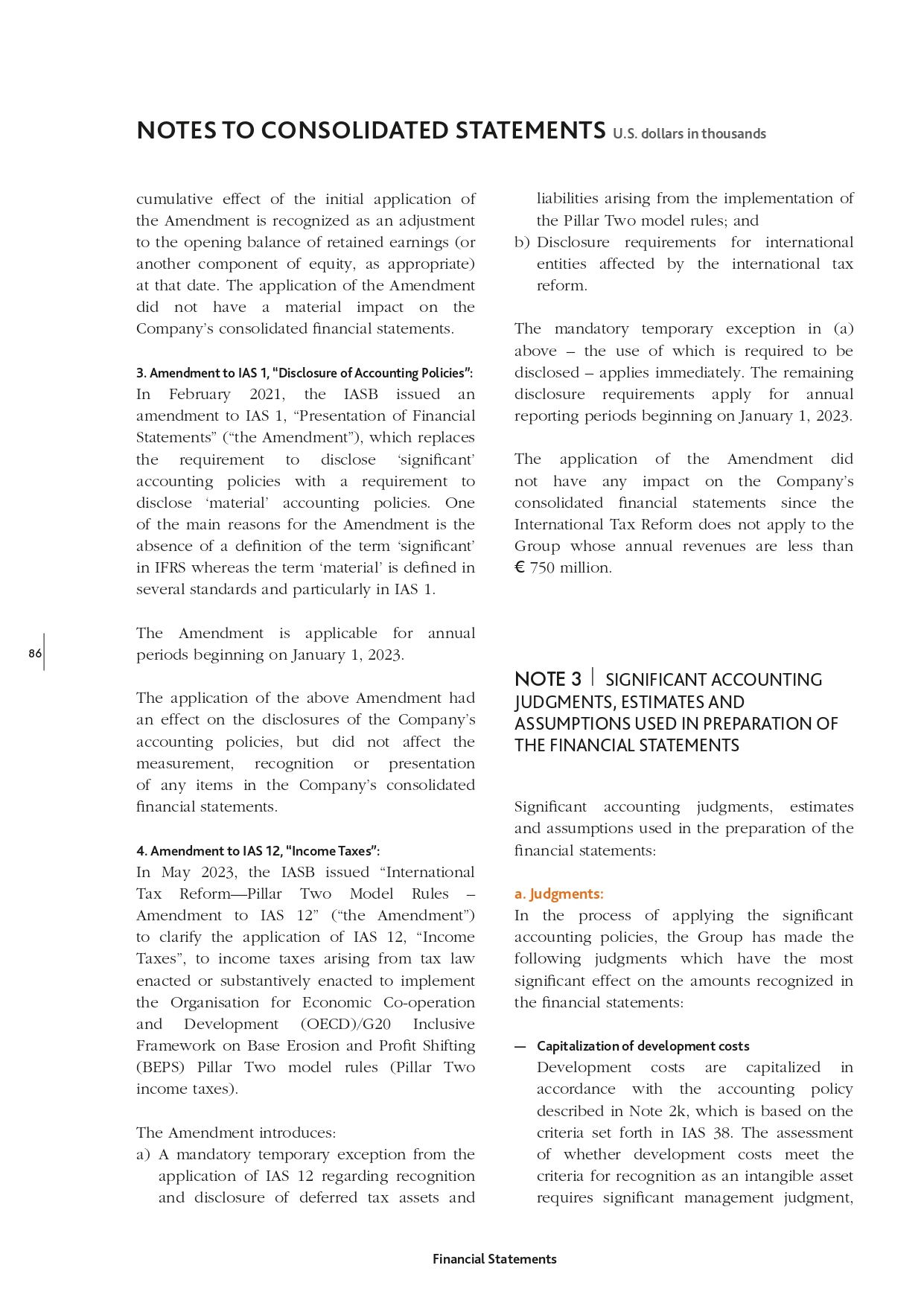
NOTES TO CONSOLIDATED STATEMENTS U.S. dollars in thousands cumulative effect of the initial application of the Amendment is recognized as an
adjustment to the opening balance of retained earnings (or another component of equity, as appropriate) at that date. The application of the Amendment did not have a material impact on the Company’s consolidated financial statements. 3. Amendment to
IAS 1, “Disclosure of Accounting Policies”: In February 2021, the IASB issued an amendment to IAS 1, “Presentation of Financial Statements” (“the Amendment”), which replaces the requirement to disclose ‘significant’ accounting policies with a
requirement to disclose ‘material’ accounting policies. One of the main reasons for the Amendment is the absence of a definition of the term ‘significant’ in IFRS whereas the term ‘material’ is defined in several standards and particularly in IAS 1.
86 The Amendment is applicable for annual periods beginning on January 1, 2023. The application of the above Amendment had an effect on the disclosures of the Company’s accounting policies, but did not affect the measurement, recognition or
presentation of any items in the Company’s consolidated financial statements. 4. Amendment to IAS 12, “Income Taxes”: In May 2023, the IASB issued “International Tax Reform—Pillar Two Model Rules – Amendment to IAS 12” (“the Amendment”) to clarify
the application of IAS 12, “Income Taxes”, to income taxes arising from tax law enacted or substantively enacted to implement the Organisation for Economic Co-operation and Development (OECD)/G20 Inclusive Framework on Base Erosion and Profit
Shifting (BEPS) Pillar Two model rules (Pillar Two income taxes). The Amendment introduces: a) A mandatory temporary exception from the application of IAS 12 regarding recognition and disclosure of deferred tax assets and liabilities arising from the
implementation of the Pillar Two model rules; and b) Disclosure requirements for international entities affected by the international tax reform. The mandatory temporary exception in (a) above – the use of which is required to be disclosed – applies
immediately. The remaining disclosure requirements apply for annual reporting periods beginning on January 1, 2023. The application of the Amendment did not have any impact on the Company’s consolidated financial statements since the International
Tax Reform does not apply to the Group whose annual revenues are less than € 750 million. NOTE 3 | SIGNIFICANT ACCOUNTING JUDGMENTS, ESTIMATES AND ASSUMPTIONS USED IN PREPARATION OF THE FINANCIAL STATEMENTS Significant accounting judgments, estimates
and assumptions used in the preparation of the financial statements: a. Judgments: In the process of applying the significant accounting policies, the Group has made the following judgments which have the most significant effect on the amounts
recognized in the financial statements: — Capitalization of development costs Development costs are capitalized in accordance with the accounting policy described in Note 2k, which is based on the criteria set forth in IAS 38. The assessment of
whether development costs meet the criteria for recognition as an intangible asset requires significant management judgment, Financial Statements
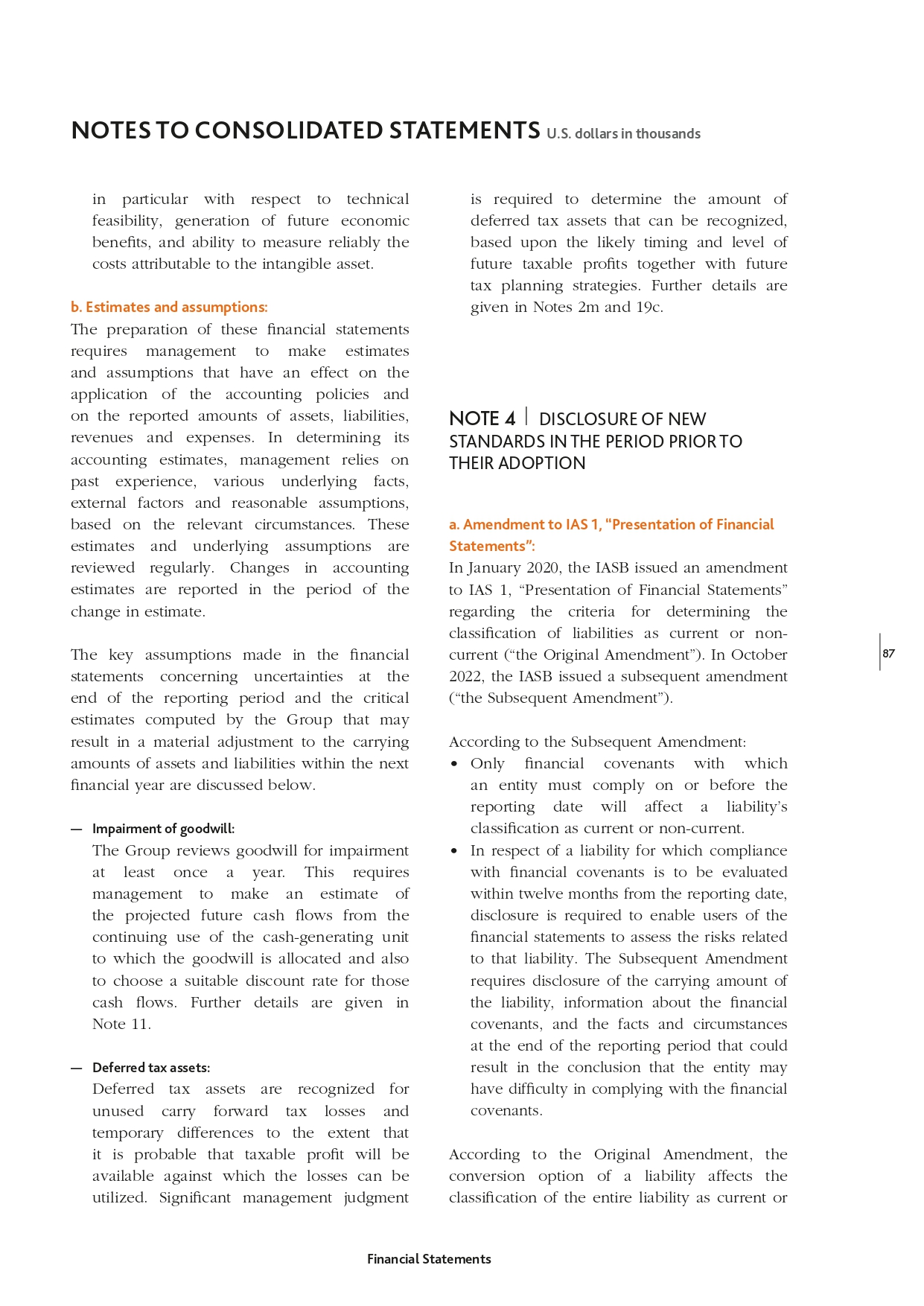
NOTES TO CONSOLIDATED STATEMENTS U.S. dollars in thousands in particular with respect to technical feasibility, generation of future economic
benefits, and ability to measure reliably the costs attributable to the intangible asset. b. Estimates and assumptions: The preparation of these financial statements requires management to make estimates and assumptions that have an effect on the
application of the accounting policies and on the reported amounts of assets, liabilities, revenues and expenses. In determining its accounting estimates, management relies on past experience, various underlying facts, external factors and reasonable
assumptions, based on the relevant circumstances. These estimates and underlying assumptions are reviewed regularly. Changes in accounting estimates are reported in the period of the change in estimate. The key assumptions made in the financial
statements concerning uncertainties at the end of the reporting period and the critical estimates computed by the Group that may result in a material adjustment to the carrying amounts of assets and liabilities within the next financial year are
discussed below. — Impairment of goodwill: The Group reviews goodwill for impairment at least once a year. This requires management to make an estimate of the projected future cash flows from the continuing use of the cash-generating unit to which
the goodwill is allocated and also to choose a suitable discount rate for those cash flows. Further details are given in Note 11. — Deferred tax assets: Deferred tax assets are recognized for unused carry forward tax losses and temporary differences
to the extent that it is probable that taxable profit will be available against which the losses can be utilized. Significant management judgment is required to determine the amount of deferred tax assets that can be recognized, based upon the likely
timing and level of future taxable profits together with future tax planning strategies. Further details are given in Notes 2m and 19c. NOTE 4 | DISCLOSURE OF NEW STANDARDS IN THE PERIOD PRIOR TO THEIR ADOPTION a. Amendment to IAS 1, “Presentation of
Financial Statements”: In January 2020, the IASB issued an amendment to IAS 1, “Presentation of Financial Statements” regarding the criteria for determining the classification of liabilities as current or noncurrent (“the Original Amendment”). In
October 2022, the IASB issued a subsequent amendment (“the Subsequent Amendment”). According to the Subsequent Amendment: • Only financial covenants with which an entity must comply on or before the reporting date will affect a liability’s
classification as current or non-current. • In respect of a liability for which compliance with financial covenants is to be evaluated within twelve months from the reporting date, disclosure is required to enable users of the financial statements to
assess the risks related to that liability. The Subsequent Amendment requires disclosure of the carrying amount of the liability, information about the financial covenants, and the facts and circumstances at the end of the reporting period that could
result in the conclusion that the entity may have difficulty in complying with the financial covenants. According to the Original Amendment, the conversion option of a liability affects the classification of the entire liability as current or
Financial Statements 87
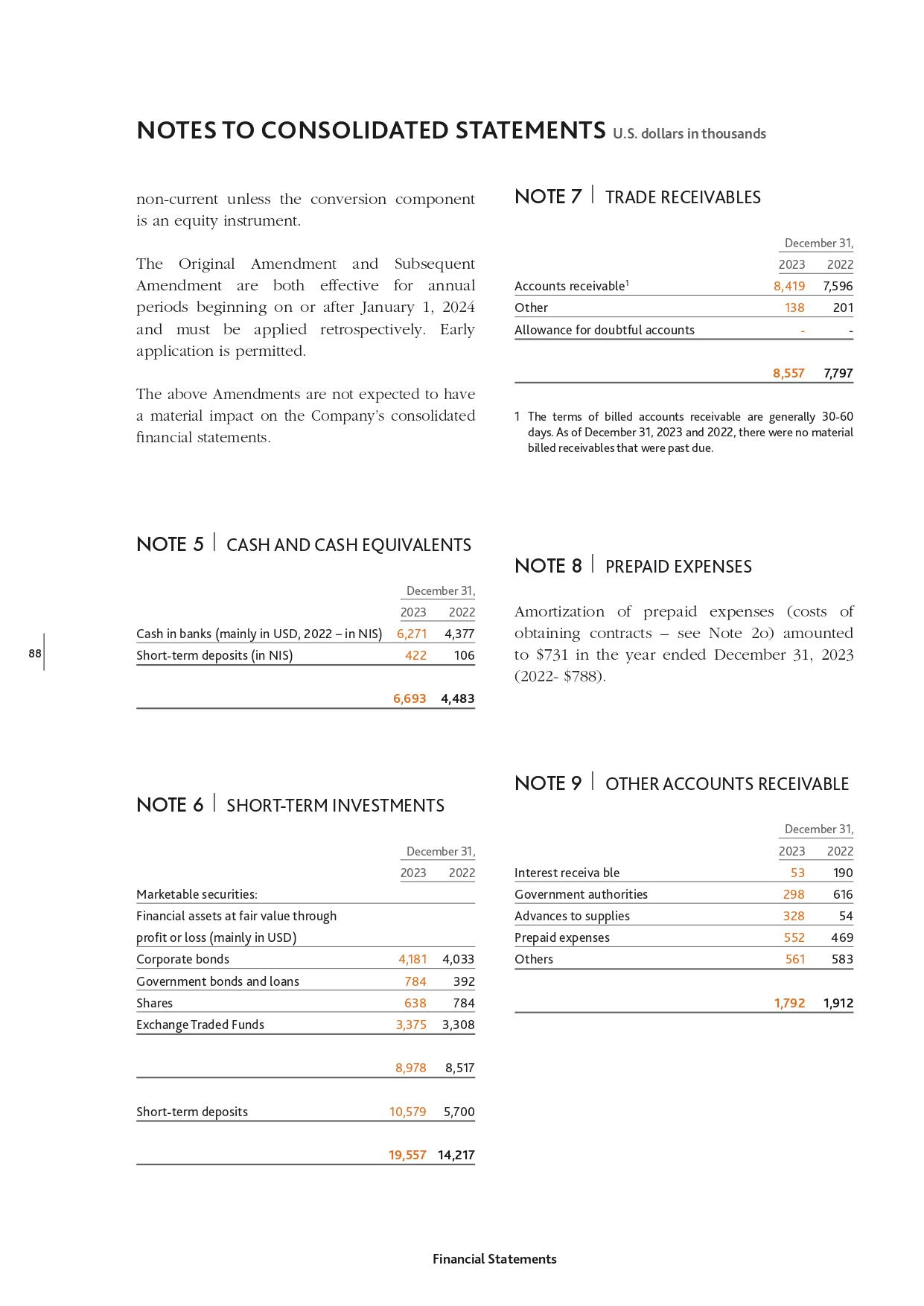
NOTES TO CONSOLIDATED STATEMENTS U.S. dollars in thousands non-current unless the conversion component is an equity instrument. NOTE 7 | TRADE
RECEIVABLES December 31, The Original Amendment and Subsequent Amendment are both effective for annual periods beginning on or after January 1, 2024 and must be applied retrospectively. Early application is permitted. The above Amendments are not
expected to have a material impact on the Company’s consolidated financial statements. NOTE 5 | CASH AND CASH EQUIVALENTS Accounts receivable1 Other Allowance for doubtful accounts 2023 2022 8,419 7,596 138 201 - - 8,557 7,797 1 The terms of billed
accounts receivable are generally 30-60 days. As of December 31, 2023 and 2022, there were no material billed receivables that were past due. NOTE 8 | PREPAID EXPENSES December 31, Cash in banks (mainly in USD, 2022 – in NIS) 88 Short-term deposits
(in NIS) 2023 2022 6,271 4,377 422 106 Amortization of prepaid expenses (costs of obtaining contracts – see Note 2o) amounted to $731 in the year ended December 31, 2023 (2022- $788). 6,693 4,483 NOTE 6 | NOTE 9 SHORT-TERM INVESTMENTS | OTHER
ACCOUNTS RECEIVABLE December 31, December 31, 2022 53 190 Marketable securities: Government authorities 298 616 Financial assets at fair value through Advances to supplies 328 54 profit or loss (mainly in USD) Prepaid expenses 552 469 Others 561 583
1,792 1,912 2023 Corporate bonds Government bonds and loans Shares Exchange Traded Funds Short-term deposits 2022 4,181 4,033 784 392 638 784 3,375 3,308 8,978 8,517 10,579 5,700 Interest receiva ble 2023 19,557 14,217 Financial Statements
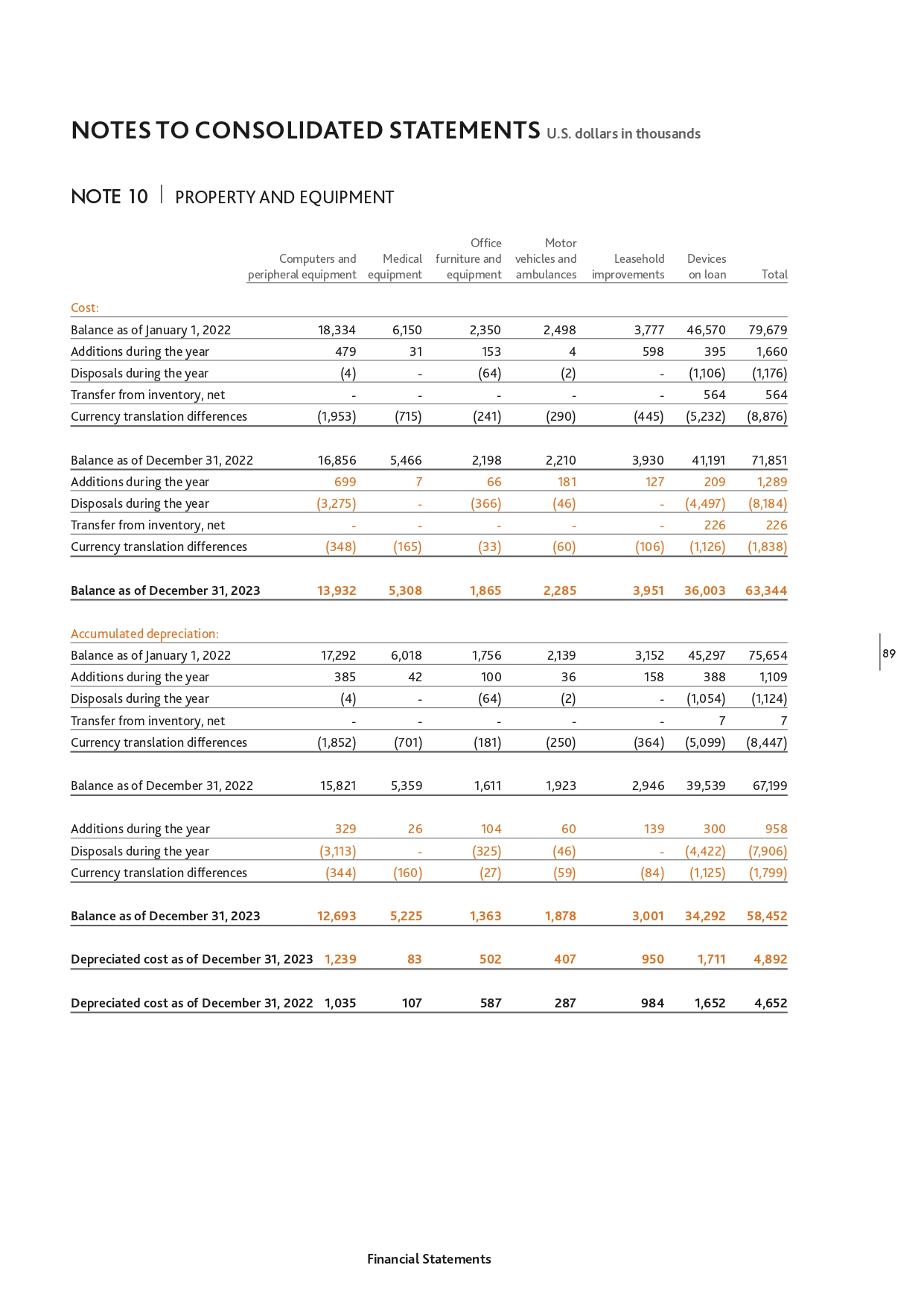
NOTES TO CONSOLIDATED STATEMENTS U.S. dollars in thousands NOTE 10 | PROPERTY AND EQUIPMENT Office Computers and Medical furniture and
peripheral equipment equipment equipment Motor vehicles and ambulances Leasehold improvements Devices on loan Total 2,498 3,777 46,570 79,679 Cost: Balance as of January 1, 2022 18,334 6,150 Additions during the year 479 31 153 4 598 395 1,660
Disposals during the year (4) - (64) (2) - (1,106) (1,176) Transfer from inventory, net 2,350 - - - - - 564 564 Currency translation differences (1,953) (715) (241) (290) (445) (5,232) (8,876) Balance as of December 31, 2022 16,856 5,466 2,198 2,210
3,930 41,191 71,851 Additions during the year 699 7 66 181 127 209 1,289 Disposals during the year (3,275) - (366) (46) - (4,497) (8,184) Transfer from inventory, net - - - - - 226 226 (348) (165) (33) (60) (106) (1,126) (1,838) 13,932 5,308 1,865
2,285 3,951 36,003 63,344 17,292 6,018 1,756 2,139 3,152 45,297 75,654 Additions during the year 385 42 100 36 158 388 1,109 Disposals during the year (4) - (64) (2) - (1,054) (1,124) - - - - - 7 7 Currency translation differences (1,852) (701) (181)
(250) (364) (5,099) (8,447) Balance as of December 31, 2022 15,821 5,359 1,611 1,923 2,946 39,539 67,199 Additions during the year 329 26 104 60 139 300 958 Disposals during the year (3,113) - (325) (46) - (4,422) (7,906) (344) (160) (27) (59) (84)
(1,125) (1,799) 12,693 5,225 1,363 1,878 3,001 34,292 58,452 Depreciated cost as of December 31, 2023 1,239 83 502 407 950 1,711 4,892 Depreciated cost as of December 31, 2022 1,035 107 587 287 984 1,652 4,652 Currency translation differences Balance
as of December 31, 2023 Accumulated depreciation: Balance as of January 1, 2022 Transfer from inventory, net Currency translation differences Balance as of December 31, 2023 Financial Statements 89

NOTES TO CONSOLIDATED STATEMENTS U.S. dollars in thousands NOTE 11 | GOODWILL AND INTANGIBLE ASSETS, NET Development Contracts Customer
Information Total other costs and others relations Technology intangible assets As of January 1, 2023, net of accumulated amortization 8,274 Additions during the year - 11,737 414 20,425 Goodwill1 33,745 4,203 - - - 4,203 - (2,770) - (1,309) (104)
(4,183) - 171 - (372) 13 (188) (780) 9,878 - 10,056 323 20,257 32,965 44,131 7,766 16,215 644 68,756 32,965 (34,253) (7,766) (6,159) (321) (48,499) - 9,878 - 10,056 323 20,257 32,965 Development Contracts Customer Information Total other costs and
others relations Technology intangible assets Goodwill1 Amortization during the year Currency translation differences As of December 31, 2023, net of accumulated amortization As of December 31, 2023: Cost Accumulated amortization Net carrying amount
90 As of January 1, 2022, net of accumulated amortization 5,309 - 14,929 549 20,787 37,508 Additions during the year 5,243 - - - 5,243 - (1,829) - (1,526) (102) (3,457) - - - - - - 407 Currency translation differences (449) - (1,666) (33) (2,148)
(4,170) As of December 31, 2022, net of accumulated amortization 8,274 - 11,737 414 20,425 33,745 46,961 7,488 16,510 621 71,580 33,745 (38,687) (7,488) (4,773) (207) (51,155) - 8,274 - 11,737 414 20,425 33,745 Amortization during the year PPA
adjustments (see Note 5) As of December 31, 2022: Cost Accumulated amortization Net carrying amount 1 The recoverable amount of the cash generating units to which the goodwill mainly relates has been determined based on a value in use calculation
using cash flow projections from financial budgets approved by senior management covering a five-year period. The carrying amount of the goodwill has been allocated to the following cash generating units: December 31, 2023 2022 Israel - Telemedicine
2,954 3,044 Israel – Mediton 16,111 16,606 Germany 13,900 14,095 32,965 33,745 In 2022 the goodwill previously allocated to International (primarily comprised of Germany) was reallocated wholly to Germany. The recoverable amount of each of the cash
generating units has been determined based on a value in use calculation using cash flow projections from financial budgets and forecasts approved by senior management covering a five-year period. The key assumptions used in the value in use
calculations are the (i) discount rate (ii) growth rate of revenues in the 5 year forecast period subsequent to end of the reporting period, and (iii) growth rates used to extrapolate cash flows beyond the forecast period. The pre-tax discount rate
applied to cash flow projections are as follows: December 31, 2023 2022 Israel - Telemedicine 20.7% 19.1% Israel – Mediton 19.4% 18.3% Germany 20.5% 16.8% The average growth rate of revenues in the 5 year forecast period subsequent to the end of the
reporting period, are as follows: Financial Statements
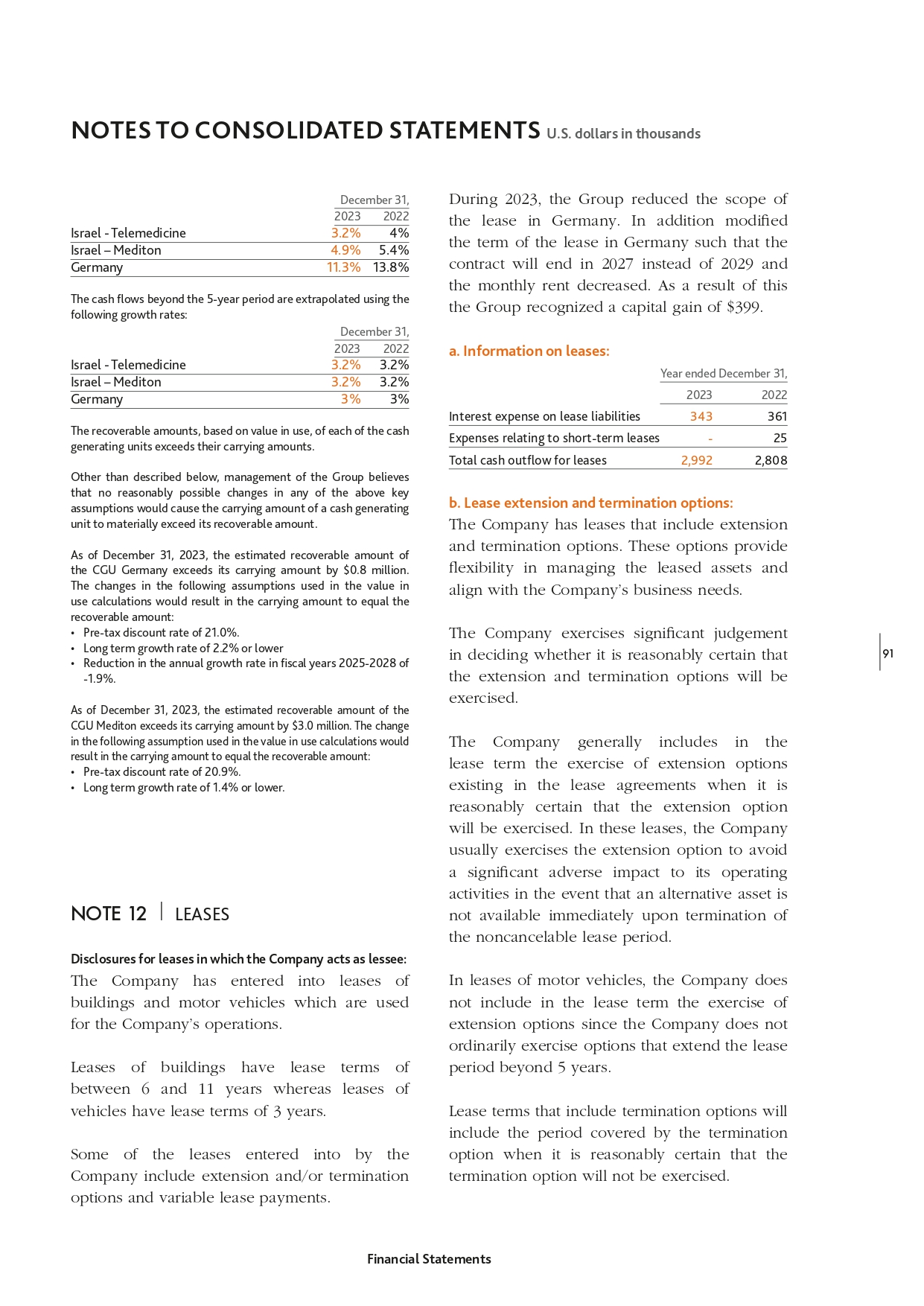
NOTES TO CONSOLIDATED STATEMENTS U.S. dollars in thousands December 31, 2023 2022 Israel - Telemedicine Israel – Mediton Germany 3.2% 4% 4.9%
5.4% 11.3% 13.8% The cash flows beyond the 5-year period are extrapolated using the following growth rates: December 31, 2023 2022 Israel - Telemedicine Israel – Mediton Germany 3.2% 3.2% 3% 3.2% 3.2% 3% The recoverable amounts, based on value in
use, of each of the cash generating units exceeds their carrying amounts. Other than described below, management of the Group believes that no reasonably possible changes in any of the above key assumptions would cause the carrying amount of a cash
generating unit to materially exceed its recoverable amount. As of December 31, 2023, the estimated recoverable amount of the CGU Germany exceeds its carrying amount by $0.8 million. The changes in the following assumptions used in the value in use
calculations would result in the carrying amount to equal the recoverable amount: • Pre-tax discount rate of 21.0%. • Long term growth rate of 2.2% or lower • Reduction in the annual growth rate in fiscal years 2025-2028 of -1.9%. As of December 31,
2023, the estimated recoverable amount of the CGU Mediton exceeds its carrying amount by $3.0 million. The change in the following assumption used in the value in use calculations would result in the carrying amount to equal the recoverable amount: •
Pre-tax discount rate of 20.9%. • Long term growth rate of 1.4% or lower. NOTE 12 | LEASES During 2023, the Group reduced the scope of the lease in Germany. In addition modified the term of the lease in Germany such that the contract will end in 2027
instead of 2029 and the monthly rent decreased. As a result of this the Group recognized a capital gain of $399. a. Information on leases: Year ended December 31, Interest expense on lease liabilities Expenses relating to short-term leases Total cash
outflow for leases 2023 2022 343 361 - 25 2,992 2,808 b. Lease extension and termination options: The Company has leases that include extension and termination options. These options provide flexibility in managing the leased assets and align with
the Company’s business needs. The Company exercises significant judgement in deciding whether it is reasonably certain that the extension and termination options will be exercised. The Company generally includes in the lease term the exercise of
extension options existing in the lease agreements when it is reasonably certain that the extension option will be exercised. In these leases, the Company usually exercises the extension option to avoid a significant adverse impact to its operating
activities in the event that an alternative asset is not available immediately upon termination of the noncancelable lease period. Disclosures for leases in which the Company acts as lessee: The Company has entered into leases of buildings and motor
vehicles which are used for the Company’s operations. Leases of buildings have lease terms of between 6 and 11 years whereas leases of vehicles have lease terms of 3 years. Some of the leases entered into by the Company include extension and/or
termination options and variable lease payments. In leases of motor vehicles, the Company does not include in the lease term the exercise of extension options since the Company does not ordinarily exercise options that extend the lease period beyond
5 years. Lease terms that include termination options will include the period covered by the termination option when it is reasonably certain that the termination option will not be exercised. Financial Statements 91
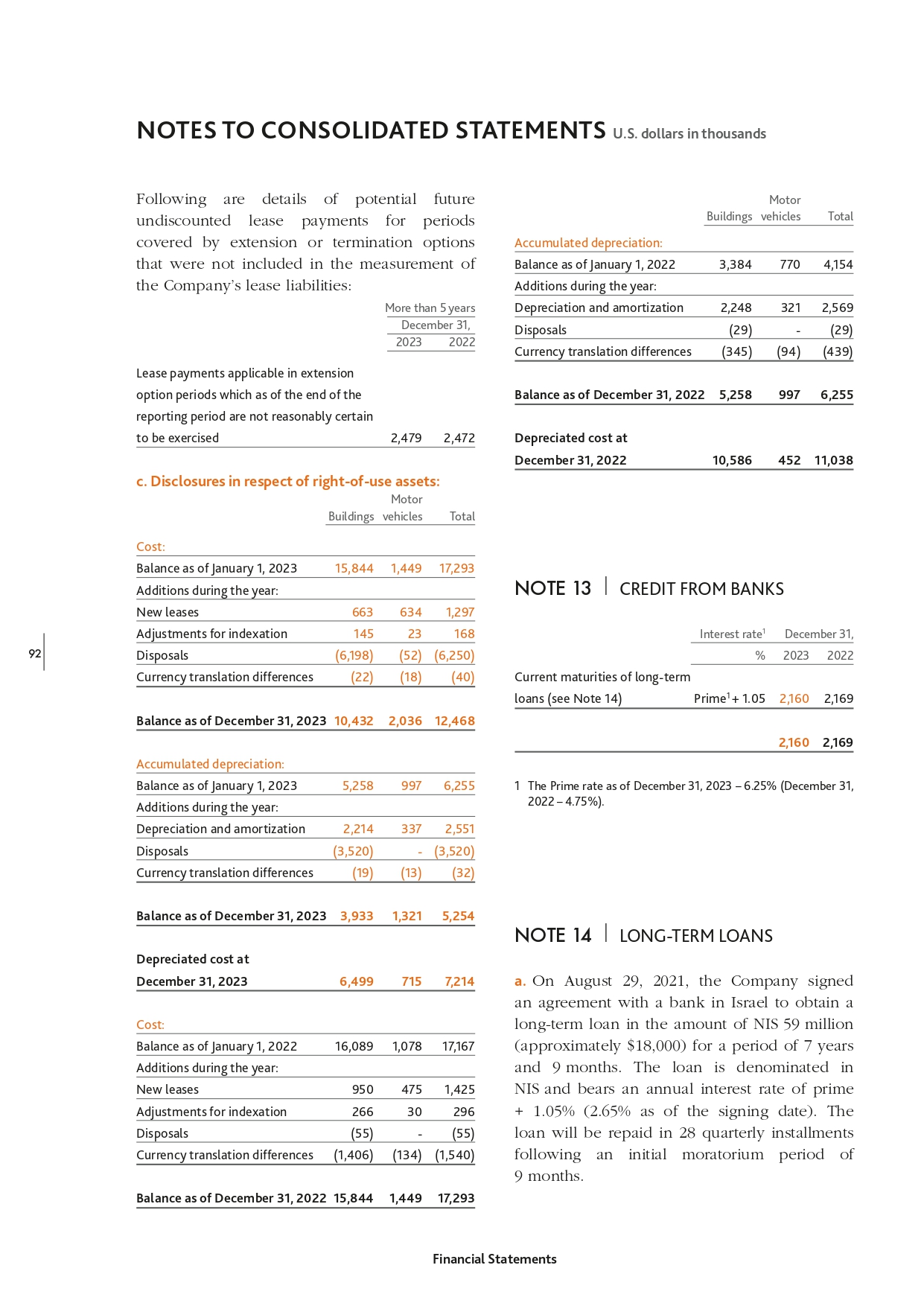
NOTES TO CONSOLIDATED STATEMENTS U.S. dollars in thousands Following are details of potential future undiscounted lease payments for periods
covered by extension or termination options that were not included in the measurement of the Company’s lease liabilities: More than 5 years December 31, 2023 2022 Motor Buildings vehicles Total Accumulated depreciation: Balance as of January 1, 2022
3,384 770 4,154 2,248 321 2,569 (29) - (29) Currency translation differences (345) (94) (439) Balance as of December 31, 2022 5,258 997 6,255 10,586 452 11,038 Additions during the year: Depreciation and amortization Disposals Lease payments
applicable in extension option periods which as of the end of the reporting period are not reasonably certain to be exercised 2,479 2,472 Depreciated cost at December 31, 2022 c. Disclosures in respect of right-of-use assets: Motor Buildings vehicles
Total Cost: Balance as of January 1, 2023 15,844 1,449 17,293 Additions during the year: 92 New leases 663 634 1,297 Adjustments for indexation 145 23 168 Disposals Currency translation differences (6,198) (22) NOTE 13 | CREDIT FROM BANKS Interest
rate1 (52) (6,250) (18) (40) % 2023 2022 Prime1 + 1.05 2,160 2,169 Current maturities of long-term loans (see Note 14) Balance as of December 31, 2023 10,432 December 31, 2,036 12,468 2,160 2,169 Accumulated depreciation: Balance as of January 1,
2023 5,258 997 6,255 2,214 337 2,551 Additions during the year: Depreciation and amortization Disposals Currency translation differences (3,520) 1 The Prime rate as of December 31, 2023 – 6.25% (December 31, 2022 – 4.75%). - (3,520) (19) (13) (32)
Balance as of December 31, 2023 3,933 1,321 5,254 NOTE 14 | LONG-TERM LOANS Depreciated cost at December 31, 2023 6,499 715 7,214 Cost: Balance as of January 1, 2022 16,089 1,078 17,167 New leases 950 475 1,425 Adjustments for indexation 266 30 296 -
(55) Additions during the year: Disposals Currency translation differences (55) (1,406) Balance as of December 31, 2022 15,844 (134) (1,540) 1,449 a. On August 29, 2021, the Company signed an agreement with a bank in Israel to obtain a long-term loan
in the amount of NIS 59 million (approximately $18,000) for a period of 7 years and 9 months. The loan is denominated in NIS and bears an annual interest rate of prime + 1.05% (2.65% as of the signing date). The loan will be repaid in 28 quarterly
installments following an initial moratorium period of 9 months. 17,293 Financial Statements

NOTES TO CONSOLIDATED STATEMENTS U.S. dollars in thousands The loan agreement includes certain financial covenants related to the Company’s
Israeli operations, as follows: (i) tangible equity of at least NIS 40 million; (ii) tangible equity to total tangible assets of at least 40%; and (iii) net debt to EBITDA of 3.5 at the maximum. As of December 31, 2023 the Company is in compliance
with these covenants. NOTE 17 | FINANCIAL INSTRUMENTS Financial assets and liabilities: Carrying amount December 31, Cash and cash equivalents Short term deposits b. Composition: December 31, Long-term loan Less – current maturities Balance 2023 2022
12,620 15,177 2,160 2,169 10,460 13,008 | DEFERRED REVENUES 2022 6,693 4,483 10,579 5,700 Trade receivables 8,557 7,797 Other accounts receivable 1,792 1,912 328 423 Long term deposits Total 27,949 20,315 Financial assets at fair value through profit
or loss: Call option from non-controlling interests NOTE 15 2023 Financial assets at amortized cost: 147 245 Short term investments 8,978 8,517 Total 9,125 8,762 93 Financial liabilities at amortized cost: Deferred revenues are in respect of
contracts in which the period between receipt of the advance payment and the performance of the service is expected to be less than one year. Credit from banks and others 2,160 2,169 Trade payables 3,884 3,757 Other payables 8,536 8,110 Loans from
banks Lease liabilities Total 10,460 13,008 7,239 11,565 32,279 38,609 Financial liabilities at fair value through profit or loss: NOTE 16 | OTHER PAYABLES December 31, 2023 2022 Employees and payroll accruals 4,376 4,562 Accrued expenses 2,304 2,090
- 1,131 Liability for underwriter – see Note 17 - 399 Government authorities VAT to customers and suppliers 754 640 Accruals restructuring 686 - Other 416 416 8,536 9,238 Liability for share options - 7,164 Other payables - liability to underwriters
- 1,131 Total - 8,295 The main risks arising from the Group’s financial instruments are credit risk, foreign currency risk, interest rate risk, market risk and liquidity risk. The Board of Directors reviews and agrees on policies for managing each of
these risks, which are summarized below. a. Concentration of credit risks: Financial instruments that potentially subject the Group to concentrations of credit risk consist principally of cash, cash equivalents, Financial Statements
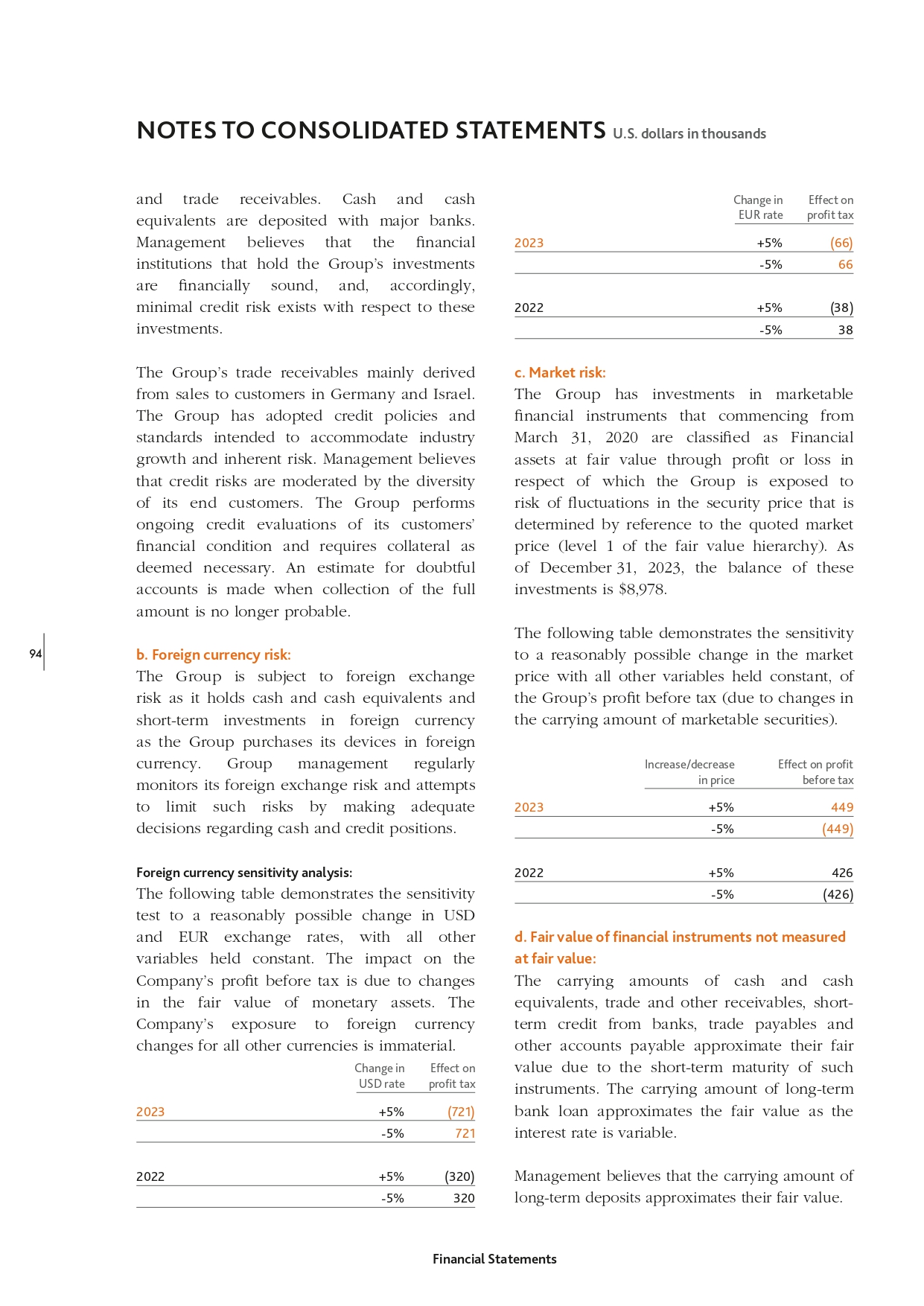
NOTES TO CONSOLIDATED STATEMENTS U.S. dollars in thousands and trade receivables. Cash and cash equivalents are deposited with major banks.
Management believes that the financial institutions that hold the Group’s investments are financially sound, and, accordingly, minimal credit risk exists with respect to these investments. The Group’s trade receivables mainly derived from sales to
customers in Germany and Israel. The Group has adopted credit policies and standards intended to accommodate industry growth and inherent risk. Management believes that credit risks are moderated by the diversity of its end customers. The Group
performs ongoing credit evaluations of its customers’ financial condition and requires collateral as deemed necessary. An estimate for doubtful accounts is made when collection of the full amount is no longer probable. 94 b. Foreign currency risk:
The Group is subject to foreign exchange risk as it holds cash and cash equivalents and short-term investments in foreign currency as the Group purchases its devices in foreign currency. Group management regularly monitors its foreign exchange risk
and attempts to limit such risks by making adequate decisions regarding cash and credit positions. Foreign currency sensitivity analysis: 2023 2022 Change in USD rate Effect on profit tax +5% (721) -5% 721 +5% (320) -5% 320 Effect on profit tax +5%
(66) -5% 66 +5% (38) -5% 38 2023 2022 c. Market risk: The Group has investments in marketable financial instruments that commencing from March 31, 2020 are classified as Financial assets at fair value through profit or loss in respect of which the
Group is exposed to risk of fluctuations in the security price that is determined by reference to the quoted market price (level 1 of the fair value hierarchy). As of December 31, 2023, the balance of these investments is $8,978. The following table
demonstrates the sensitivity to a reasonably possible change in the market price with all other variables held constant, of the Group’s profit before tax (due to changes in the carrying amount of marketable securities). 2023 2022 The following table
demonstrates the sensitivity test to a reasonably possible change in USD and EUR exchange rates, with all other variables held constant. The impact on the Company’s profit before tax is due to changes in the fair value of monetary assets. The
Company’s exposure to foreign currency changes for all other currencies is immaterial. Change in EUR rate Increase/decrease in price Effect on profit before tax +5% 449 -5% (449) +5% 426 -5% (426) d. Fair value of financial instruments not measured
at fair value: The carrying amounts of cash and cash equivalents, trade and other receivables, shortterm credit from banks, trade payables and other accounts payable approximate their fair value due to the short-term maturity of such instruments. The
carrying amount of long-term bank loan approximates the fair value as the interest rate is variable. Management believes that the carrying amount of long-term deposits approximates their fair value. Financial Statements
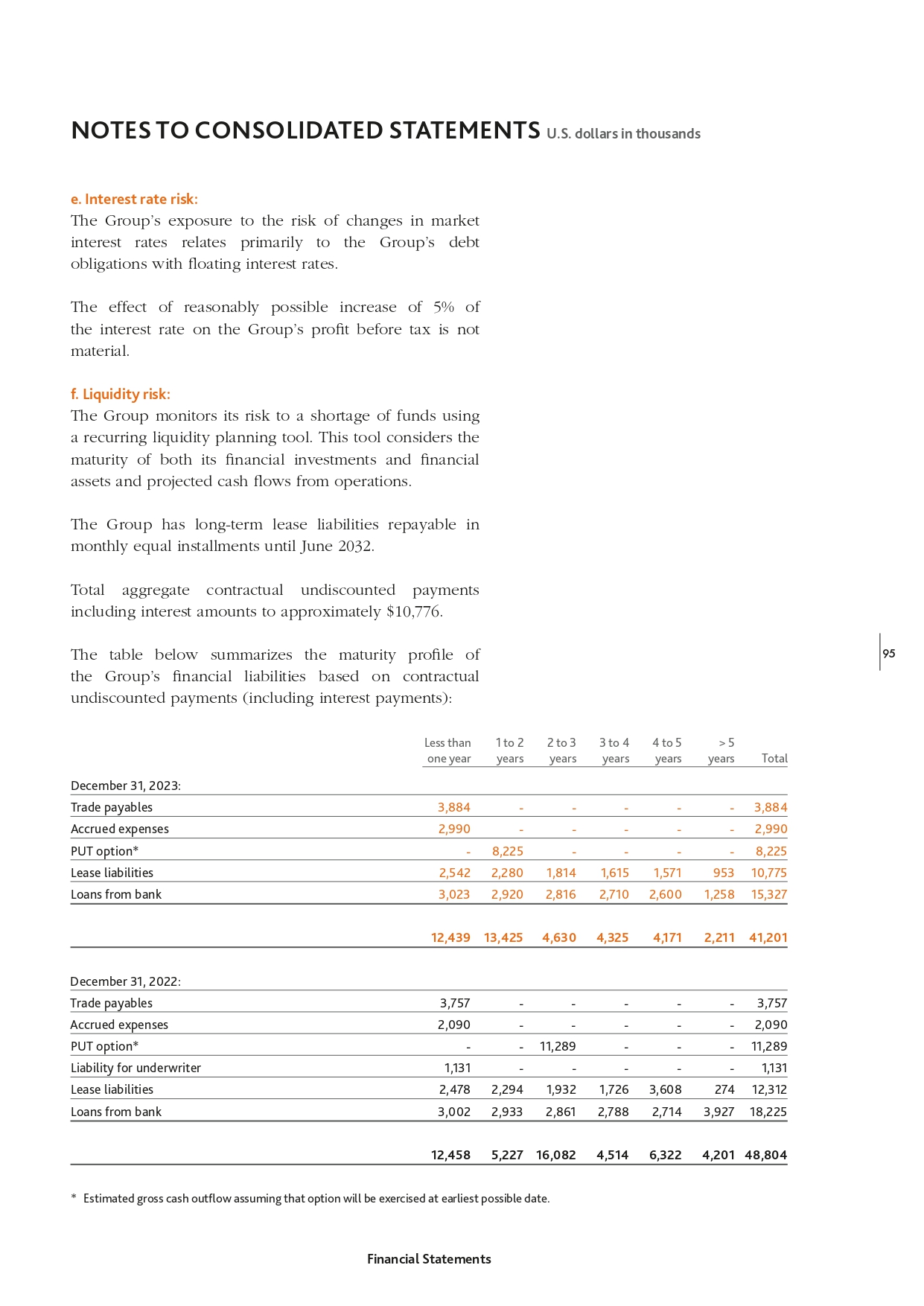
NOTES TO CONSOLIDATED STATEMENTS U.S. dollars in thousands e. Interest rate risk: The Group’s exposure to the risk of changes in market interest
rates relates primarily to the Group’s debt obligations with floating interest rates. The effect of reasonably possible increase of 5% of the interest rate on the Group’s profit before tax is not material. f. Liquidity risk: The Group monitors its
risk to a shortage of funds using a recurring liquidity planning tool. This tool considers the maturity of both its financial investments and financial assets and projected cash flows from operations. The Group has long-term lease liabilities
repayable in monthly equal installments until June 2032. Total aggregate contractual undiscounted payments including interest amounts to approximately $10,776. The table below summarizes the maturity profile of the Group’s financial liabilities based
on contractual undiscounted payments (including interest payments): 95 Less than one year 1 to 2 years 2 to 3 years 3 to 4 years 4 to 5 years >5 years Total Trade payables 3,884 - - - - - 3,884 Accrued expenses 2,990 - - - - - 2,990 - 8,225 - - -
- 8,225 Lease liabilities 2,542 2,280 1,814 1,615 1,571 953 10,775 Loans from bank 3,023 2,920 2,816 2,710 2,600 1,258 15,327 12,439 13,425 4,630 4,325 4,171 2,211 41,201 December 31, 2023: PUT option* December 31, 2022: Trade payables 3,757 - - - -
- 3,757 Accrued expenses 2,090 - - - - - 2,090 PUT option* - - 11,289 - - - 11,289 1,131 - - - - - 1,131 Lease liabilities 2,478 2,294 1,932 1,726 3,608 274 12,312 Loans from bank 3,002 2,933 2,861 2,788 2,714 3,927 18,225 5,227 16,082 4,514 6,322
4,201 48,804 Liability for underwriter 12,458 * Estimated gross cash outflow assuming that option will be exercised at earliest possible date. Financial Statements
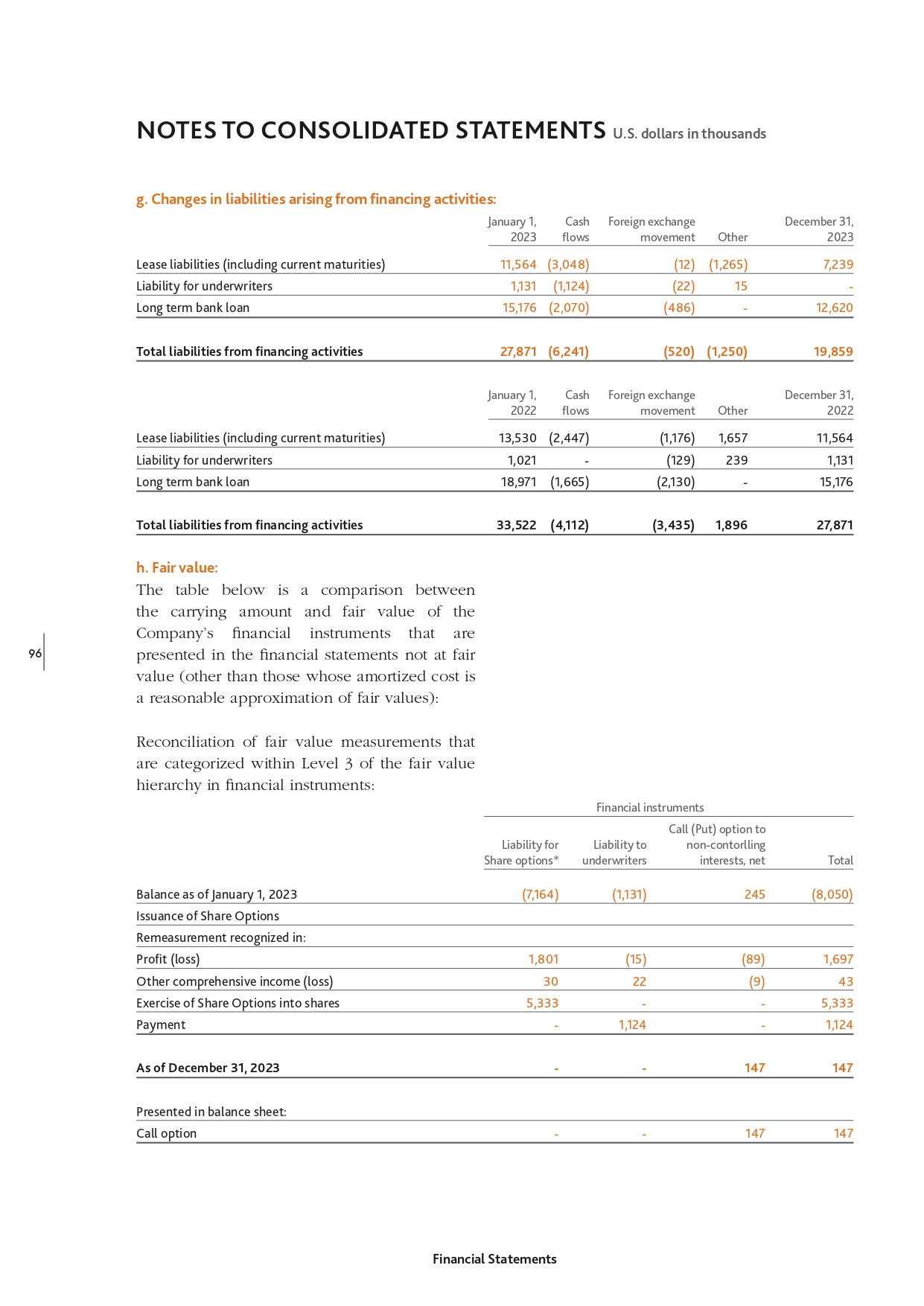
NOTES TO CONSOLIDATED STATEMENTS U.S. dollars in thousands g. Changes in liabilities arising from financing activities: January 1, 2023 Lease
liabilities (including current maturities) Cash flows Foreign exchange movement Other 11,564 (3,048) December 31, 2023 (12) (1,265) 7,239 (1,124) (22) 15 - Long term bank loan 15,176 (2,070) (486) - 12,620 Total liabilities from financing activities
27,871 (6,241) (520) (1,250) 19,859 Foreign exchange movement Other December 31, 2022 Liability for underwriters 1,131 January 1, 2022 Lease liabilities (including current maturities) Cash flows 13,530 (2,447) Liability for underwriters (1,176) 1,657
11,564 - (129) 239 1,131 18,971 (1,665) (2,130) - 15,176 33,522 (4,112) (3,435) 1,896 27,871 1,021 Long term bank loan Total liabilities from financing activities h. Fair value: 96 The table below is a comparison between the carrying amount and fair
value of the Company’s financial instruments that are presented in the financial statements not at fair value (other than those whose amortized cost is a reasonable approximation of fair values): Reconciliation of fair value measurements that are
categorized within Level 3 of the fair value hierarchy in financial instruments: Financial instruments Liability for Liability to Share options* underwriters Balance as of January 1, 2023 Call (Put) option to non-contorlling interests, net Total
(7,164) (1,131) 245 (8,050) 1,801 (15) (89) 1,697 30 22 (9) 43 Issuance of Share Options Remeasurement recognized in: Profit (loss) Other comprehensive income (loss) 5,333 - - 5,333 Payment Exercise of Share Options into shares - 1,124 - 1,124 As of
December 31, 2023 - - 147 147 - - 147 147 Presented in balance sheet: Call option Financial Statements
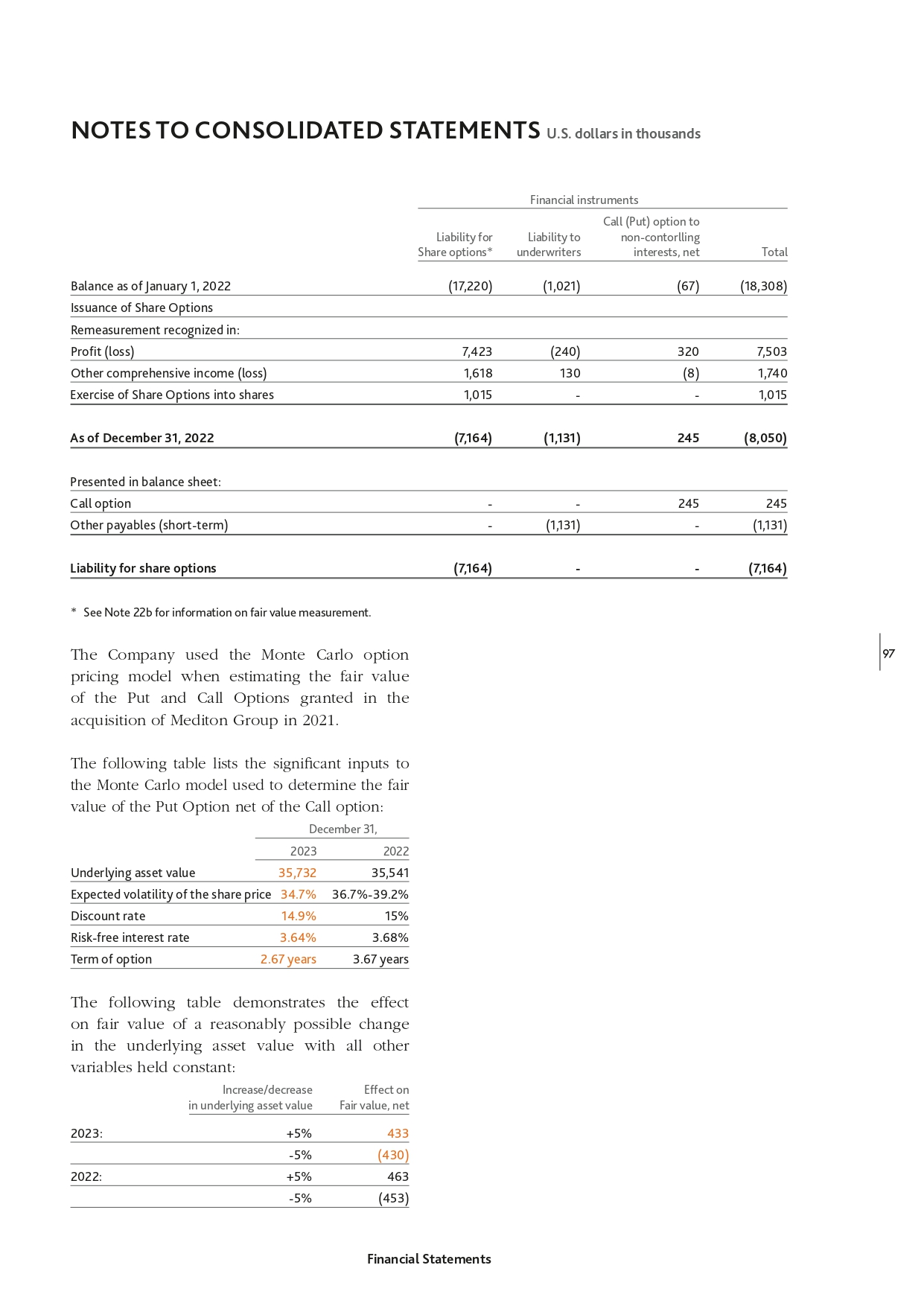
NOTES TO CONSOLIDATED STATEMENTS U.S. dollars in thousands Financial instruments Liability for Liability to Share options* underwriters Balance
as of January 1, 2022 Call (Put) option to non-contorlling interests, net Total (17,220) (1,021) (67) (18,308) Issuance of Share Options Remeasurement recognized in: Profit (loss) 7,423 (240) 320 7,503 Other comprehensive income (loss) 1,618 130 (8)
1,740 Exercise of Share Options into shares 1,015 - - 1,015 (7,164) (1,131) 245 (8,050) Call option - - 245 245 Other payables (short-term) - (1,131) - (1,131) (7,164) - - (7,164) As of December 31, 2022 Presented in balance sheet: Liability for
share options * See Note 22b for information on fair value measurement. The Company used the Monte Carlo option pricing model when estimating the fair value of the Put and Call Options granted in the acquisition of Mediton Group in 2021. The
following table lists the significant inputs to the Monte Carlo model used to determine the fair value of the Put Option net of the Call option: December 31, 2023 Underlying asset value 2022 35,732 35,541 Expected volatility of the share price 34.7%
36.7%-39.2% Discount rate 14.9% 15% Risk-free interest rate 3.64% 3.68% 2.67 years 3.67 years Term of option The following table demonstrates the effect on fair value of a reasonably possible change in the underlying asset value with all other
variables held constant: Increase/decrease in underlying asset value 2023: 2022: Effect on Fair value, net +5% 433 -5% (430) +5% 463 -5% (453) Financial Statements 97
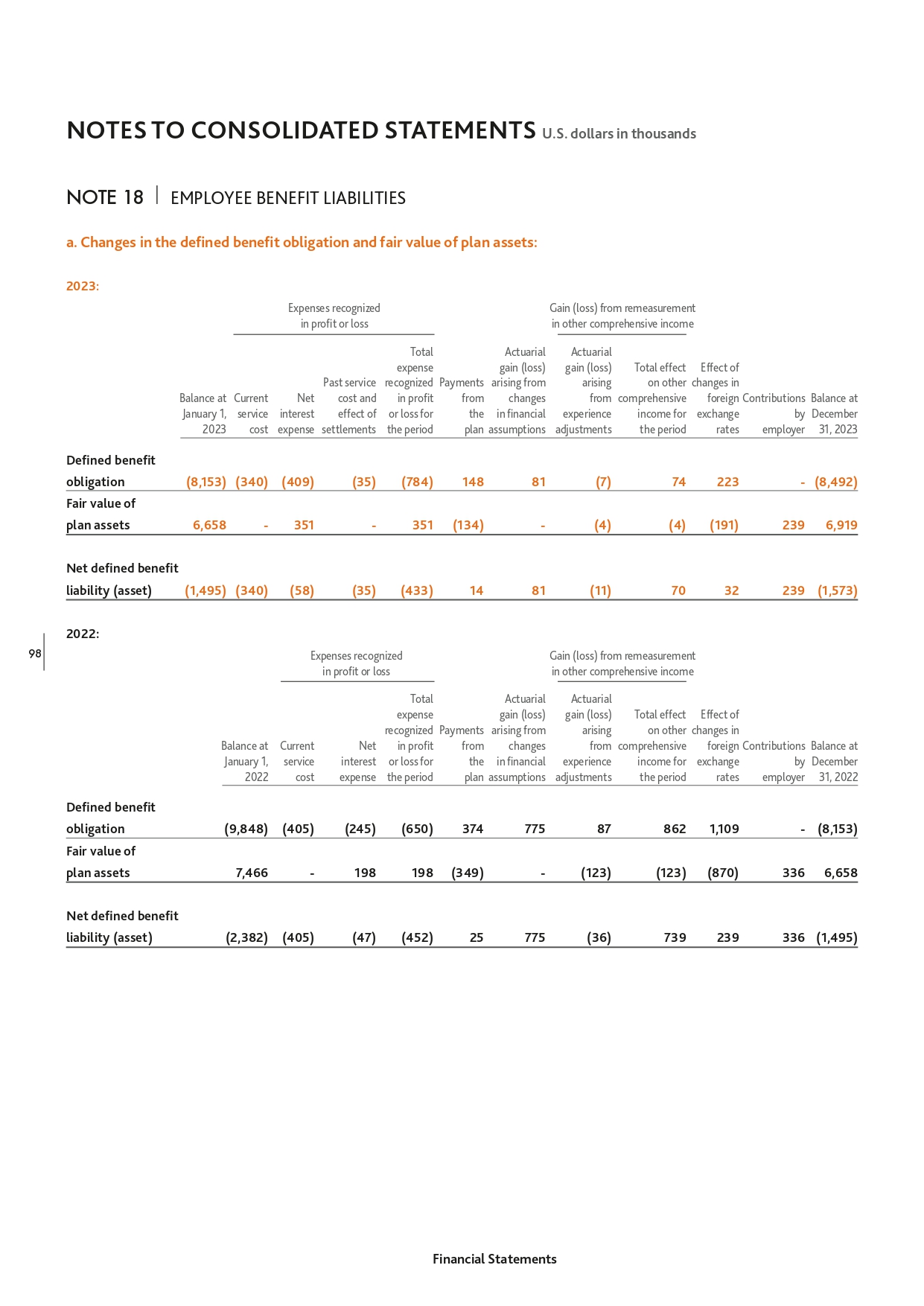
NOTES TO CONSOLIDATED STATEMENTS U.S. dollars in thousands NOTE 18 | EMPLOYEE BENEFIT LIABILITIES a. Changes in the defined benefit obligation
and fair value of plan assets: 2023: Expenses recognized in profit or loss Gain (loss) from remeasurement in other comprehensive income Total Actuarial Actuarial expense gain (loss) gain (loss) Total effect Effect of Past service recognized Payments
arising from arising on other changes in Balance at Current Net cost and in profit from changes from comprehensive foreign Contributions Balance at January 1, service interest effect of or loss for the in financial experience income for exchange by
December 2023 cost expense settlements the period plan assumptions adjustments the period rates employer 31, 2023 Defined benefit obligation (8,153) (340) (409) (35) (784) 148 81 (7) 74 223 - (8,492) Fair value of plan assets 6,658 - 351 - 351 (134)
- (4) (4) (191) (1,495) (340) (58) (35) (433) 14 81 (11) 70 32 239 6,919 Net defined benefit liability (asset) 239 (1,573) 2022: 98 Expenses recognized in profit or loss Gain (loss) from remeasurement in other comprehensive income Total Actuarial
Actuarial expense gain (loss) gain (loss) Total effect Effect of recognized Payments arising from arising on other changes in Balance at Current Net in profit from changes from comprehensive foreign Contributions Balance at January 1, service
interest or loss for the in financial experience income for exchange by December 2022 cost expense the period plan assumptions adjustments the period rates employer 31, 2022 Defined benefit obligation (9,848) (405) (245) (650) 374 775 87 862 1,109 -
198 198 (349) - (123) (123) (870) (2,382) (405) (47) (452) 25 775 (36) 739 239 - (8,153) Fair value of plan assets 7,466 336 6,658 Net defined benefit liability (asset) Financial Statements 336 (1,495)

NOTES TO CONSOLIDATED STATEMENTS U.S. dollars in thousands b. Disaggregation of the fair value of the plan NOTE 19 | TAXES ON INCOME assets:
Year ended December 31, Insurance contracts 2023 2022 6,919 6,658 a. Tax rates applicable to the income of the Group companies: 1. Companies in Israel: c. The principal assumptions underlying the defined benefit plan: 2023 2022 % Discount rate
Expected rate of salary increase 5.55 5.57 2.0-5.48 2.0-5.92 The Israeli corporate income tax rate was 23% in 2023 and 2022. The deferred taxes are computed at the average tax rate of 23% (2022 – 23%), based on the tax rates that are expected to
apply upon realization. d. Amount, timing and uncertainty of future 2. Foreign subsidiaries: cash flows: The principal tax rates applicable to the major subsidiaries whose place of incorporation is outside Israel are: The U.S. - tax at the rate of
21%. Germany - tax at the rate of 31.4%. Below are reasonably possible changes at the end of the reporting period in each actuarial assumption assuming that all other actuarial assumptions are constant: b. Taxes on income included in the statements
of comprehensive income: Change in defined benefit obligation Year ended December 31, Year ended December 31, 2023 99 2022 Current taxes 2023 2022 552 749 Sensitivity test for changes in the Deferred taxes 409 341 expected rate of salary increase:
Taxes in respect of prior years (70) 7 891 1,097 The change as a result of: Salary increase of 6.1% (instead of 5.5%) (2022 - 6.51% instead of 5.9%) (45) (49) Sensitivity test for changes in the discount rate of the plan assets and liability: The
change as a result of: Increase of 1% in discount rate (13) Decrease of 1% in discount rate 45 45 Financial Statements
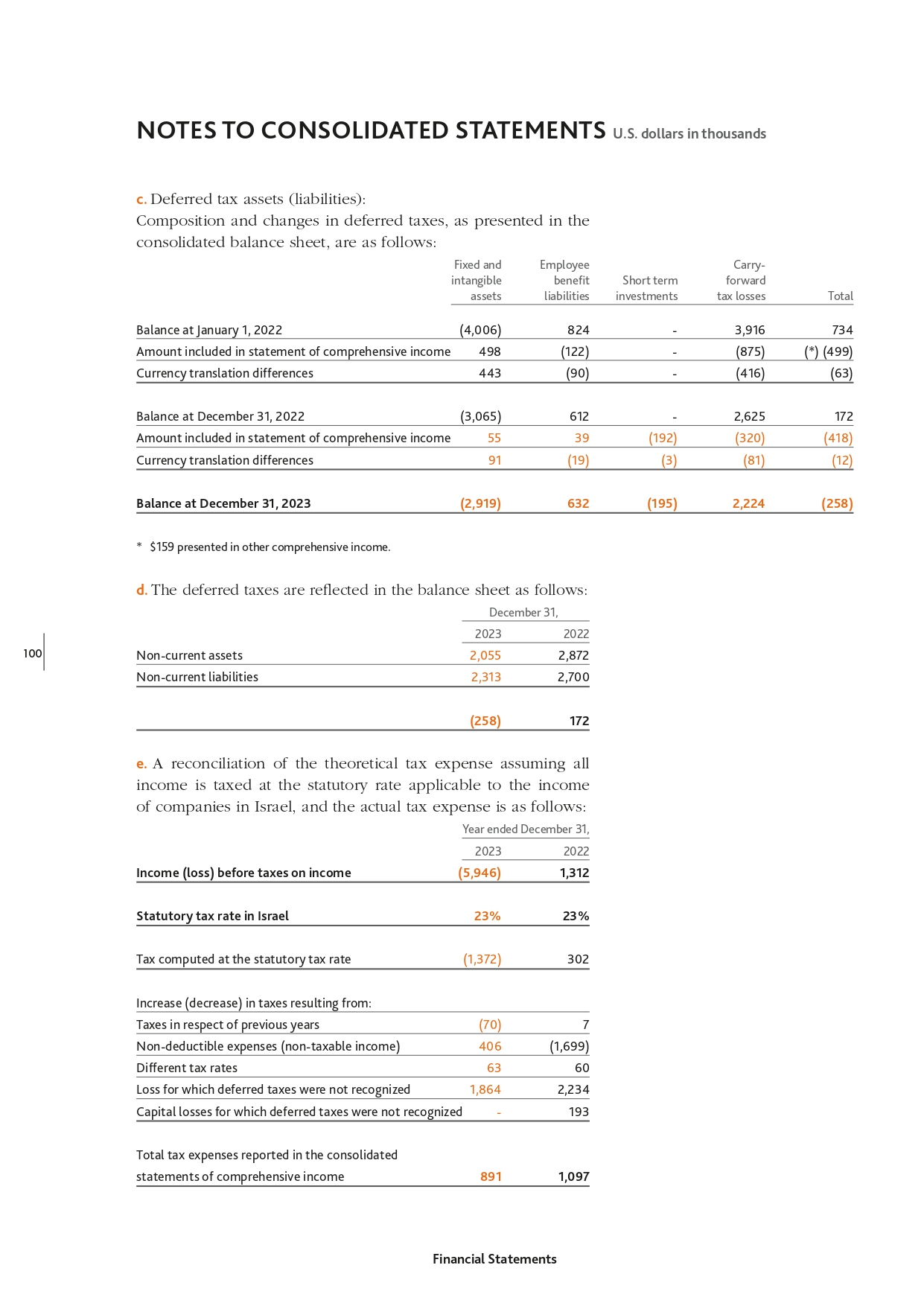
NOTES TO CONSOLIDATED STATEMENTS U.S. dollars in thousands c. Deferred tax assets (liabilities): Composition and changes in deferred taxes, as
presented in the consolidated balance sheet, are as follows: Fixed and intangible assets Balance at January 1, 2022 Employee benefit Short term liabilities investments Total - 3,916 734 (4,006) 824 Amount included in statement of comprehensive income
498 (122) - (875) (*) (499) Currency translation differences 443 (90) - (416) (63) (3,065) 612 - 2,625 172 Balance at December 31, 2022 Amount included in statement of comprehensive income 55 39 (192) (320) (418) Currency translation differences 91
(19) (3) (81) (12) Balance at December 31, 2023 (2,919) 632 (195) 2,224 (258) * $159 presented in other comprehensive income. d. The deferred taxes are reflected in the balance sheet as follows: December 31, 2023 100 Carryforward tax losses 2022
Non-current assets 2,055 2,872 Non-current liabilities 2,313 2,700 (258) 172 e. A reconciliation of the theoretical tax expense assuming all income is taxed at the statutory rate applicable to the income of companies in Israel, and the actual tax
expense is as follows: Year ended December 31, 2023 2022 (5,946) 1,312 23% 23% (1,372) 302 Taxes in respect of previous years (70) 7 Non-deductible expenses (non-taxable income) 406 (1,699) 63 60 1,864 2,234 - 193 891 1,097 Income (loss) before taxes
on income Statutory tax rate in Israel Tax computed at the statutory tax rate Increase (decrease) in taxes resulting from: Different tax rates Loss for which deferred taxes were not recognized Capital losses for which deferred taxes were not
recognized Total tax expenses reported in the consolidated statements of comprehensive income Financial Statements
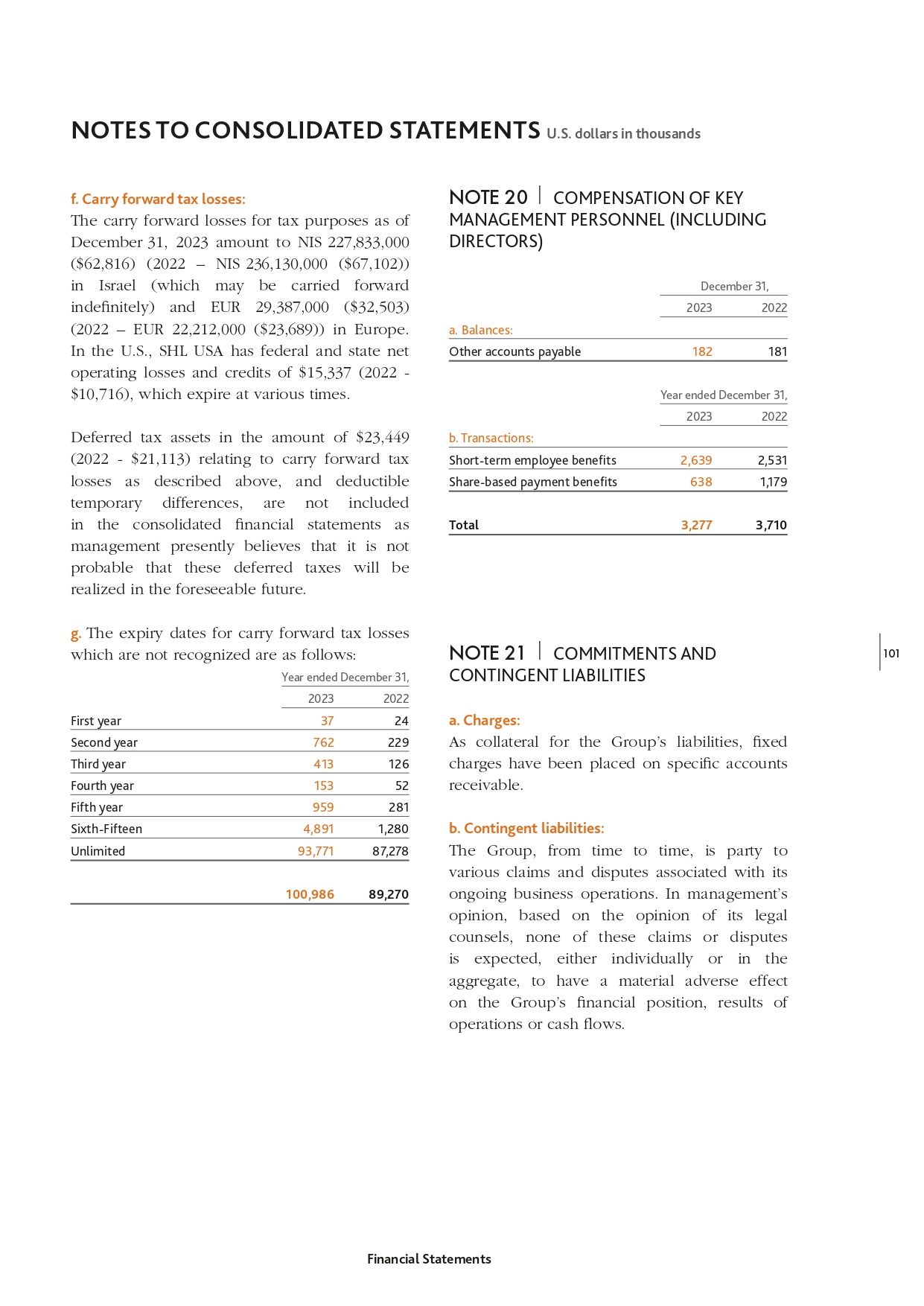
NOTES TO CONSOLIDATED STATEMENTS U.S. dollars in thousands f. Carry forward tax losses: The carry forward losses for tax purposes as of December
31, 2023 amount to NIS 227,833,000 ($62,816) (2022 – NIS 236,130,000 ($67,102)) in Israel (which may be carried forward indefinitely) and EUR 29,387,000 ($32,503) (2022 – EUR 22,212,000 ($23,689)) in Europe. In the U.S., SHL USA has federal and state
net operating losses and credits of $15,337 (2022 $10,716), which expire at various times. Deferred tax assets in the amount of $23,449 (2022 - $21,113) relating to carry forward tax losses as described above, and deductible temporary differences,
are not included in the consolidated financial statements as management presently believes that it is not probable that these deferred taxes will be realized in the foreseeable future. g. The expiry dates for carry forward tax losses which are not
recognized are as follows: Year ended December 31, 2023 2022 37 24 Second year 762 229 Third year 413 126 First year Fourth year 153 52 Fifth year 959 281 Sixth-Fifteen Unlimited 4,891 1,280 93,771 87,278 100,986 89,270 NOTE 20 | COMPENSATION OF KEY
MANAGEMENT PERSONNEL (INCLUDING DIRECTORS) December 31, 2023 2022 182 181 a. Balances: Other accounts payable Year ended December 31, 2023 2022 Short-term employee benefits 2,639 2,531 Share-based payment benefits 638 1,179 3,277 3,710 b.
Transactions: Total NOTE 21 | COMMITMENTS AND CONTINGENT LIABILITIES a. Charges: As collateral for the Group’s liabilities, fixed charges have been placed on specific accounts receivable. b. Contingent liabilities: The Group, from time to time, is
party to various claims and disputes associated with its ongoing business operations. In management’s opinion, based on the opinion of its legal counsels, none of these claims or disputes is expected, either individually or in the aggregate, to have
a material adverse effect on the Group’s financial position, results of operations or cash flows. Financial Statements 101
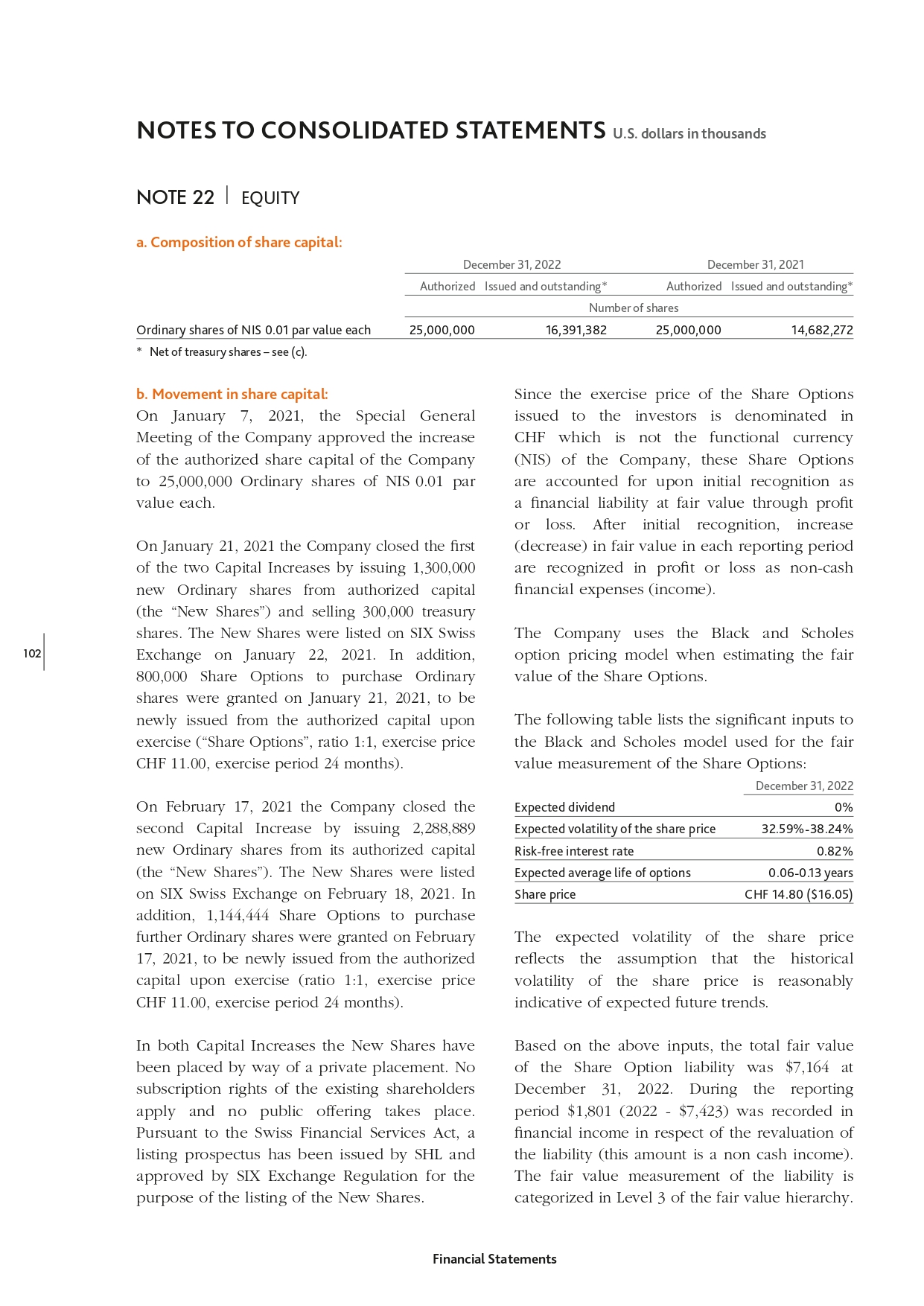
NOTES TO CONSOLIDATED STATEMENTS U.S. dollars in thousands NOTE 22 | EQUITY a. Composition of share capital: December 31, 2022 December 31, 2021
Authorized Issued and outstanding* Authorized Issued and outstanding* Number of shares Ordinary shares of NIS 0.01 par value each 25,000,000 16,391,382 25,000,000 14,682,272 * Net of treasury shares – see (c). b. Movement in share capital: On January
7, 2021, the Special General Meeting of the Company approved the increase of the authorized share capital of the Company to 25,000,000 Ordinary shares of NIS 0.01 par value each. 102 On January 21, 2021 the Company closed the first of the two Capital
Increases by issuing 1,300,000 new Ordinary shares from authorized capital (the “New Shares”) and selling 300,000 treasury shares. The New Shares were listed on SIX Swiss Exchange on January 22, 2021. In addition, 800,000 Share Options to purchase
Ordinary shares were granted on January 21, 2021, to be newly issued from the authorized capital upon exercise (“Share Options”, ratio 1:1, exercise price CHF 11.00, exercise period 24 months). Since the exercise price of the Share Options issued to
the investors is denominated in CHF which is not the functional currency (NIS) of the Company, these Share Options are accounted for upon initial recognition as a financial liability at fair value through profit or loss. After initial recognition,
increase (decrease) in fair value in each reporting period are recognized in profit or loss as non-cash financial expenses (income). The Company uses the Black and Scholes option pricing model when estimating the fair value of the Share Options. The
following table lists the significant inputs to the Black and Scholes model used for the fair value measurement of the Share Options: December 31, 2022 On February 17, 2021 the Company closed the second Capital Increase by issuing 2,288,889 new
Ordinary shares from its authorized capital (the “New Shares”). The New Shares were listed on SIX Swiss Exchange on February 18, 2021. In addition, 1,144,444 Share Options to purchase further Ordinary shares were granted on February 17, 2021, to be
newly issued from the authorized capital upon exercise (ratio 1:1, exercise price CHF 11.00, exercise period 24 months). Expected dividend In both Capital Increases the New Shares have been placed by way of a private placement. No subscription rights
of the existing shareholders apply and no public offering takes place. Pursuant to the Swiss Financial Services Act, a listing prospectus has been issued by SHL and approved by SIX Exchange Regulation for the purpose of the listing of the New Shares.
Based on the above inputs, the total fair value of the Share Option liability was $7,164 at December 31, 2022. During the reporting period $1,801 (2022 - $7,423) was recorded in financial income in respect of the revaluation of the liability (this
amount is a non cash income). The fair value measurement of the liability is categorized in Level 3 of the fair value hierarchy. Expected volatility of the share price Risk-free interest rate Expected average life of options Share price 0%
32.59%-38.24% 0.82% 0.06-0.13 years CHF 14.80 ($16.05) The expected volatility of the share price reflects the assumption that the historical volatility of the share price is reasonably indicative of expected future trends. Financial Statements
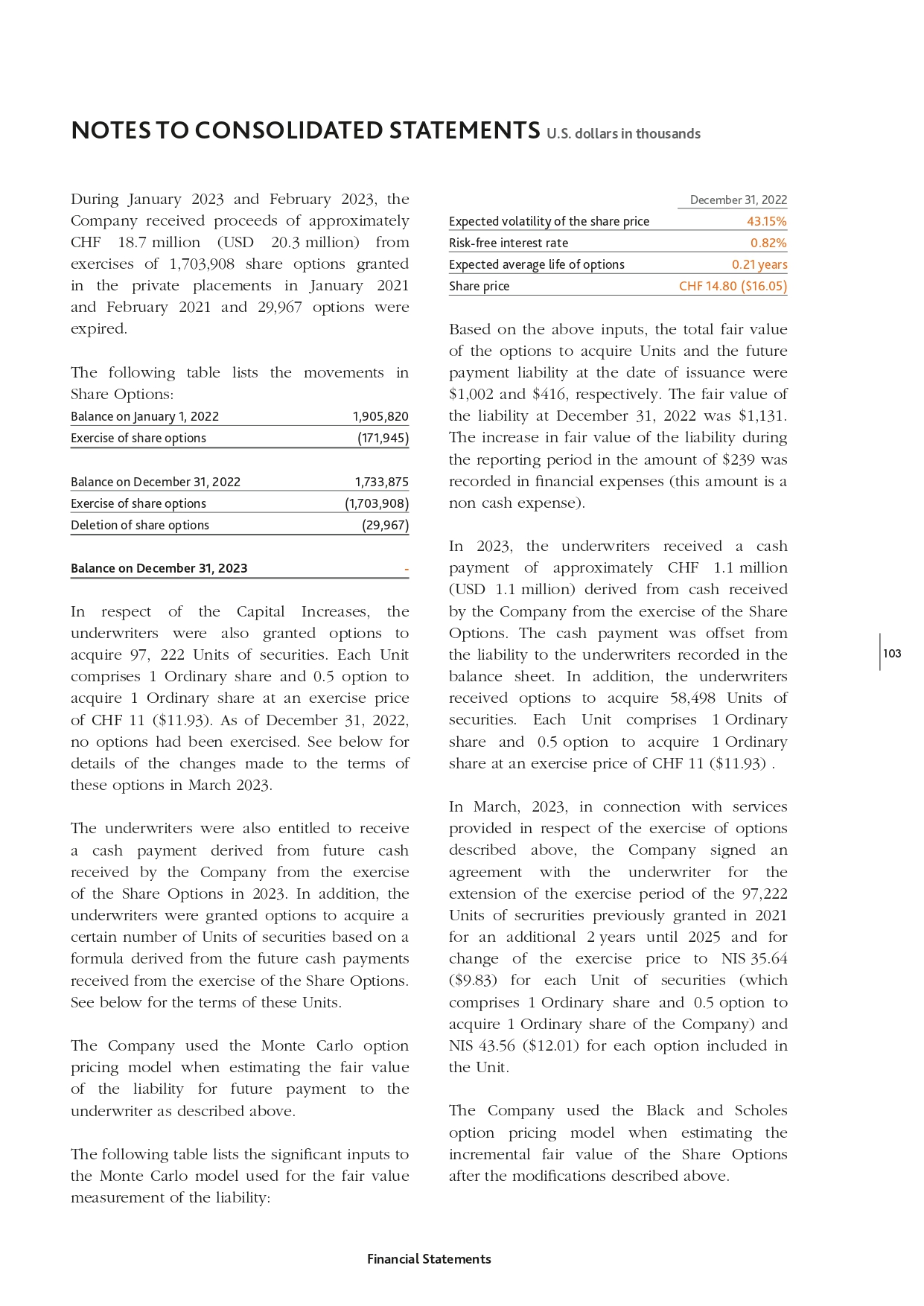
NOTES TO CONSOLIDATED STATEMENTS U.S. dollars in thousands During January 2023 and February 2023, the Company received proceeds of approximately
CHF 18.7 million (USD 20.3 million) from exercises of 1,703,908 share options granted in the private placements in January 2021 and February 2021 and 29,967 options were expired. The following table lists the movements in Share Options: Balance on
January 1, 2022 Exercise of share options Balance on December 31, 2022 1,905,820 (171,945) 1,733,875 Exercise of share options (1,703,908) Deletion of share options (29,967) Balance on December 31, 2023 - In respect of the Capital Increases, the
underwriters were also granted options to acquire 97, 222 Units of securities. Each Unit comprises 1 Ordinary share and 0.5 option to acquire 1 Ordinary share at an exercise price of CHF 11 ($11.93). As of December 31, 2022, no options had been
exercised. See below for details of the changes made to the terms of these options in March 2023. The underwriters were also entitled to receive a cash payment derived from future cash received by the Company from the exercise of the Share Options in
2023. In addition, the underwriters were granted options to acquire a certain number of Units of securities based on a formula derived from the future cash payments received from the exercise of the Share Options. See below for the terms of these
Units. The Company used the Monte Carlo option pricing model when estimating the fair value of the liability for future payment to the underwriter as described above. The following table lists the significant inputs to the Monte Carlo model used for
the fair value measurement of the liability: December 31, 2022 Expected volatility of the share price 43.15% Risk-free interest rate 0.82% Expected average life of options Share price 0.21 years CHF 14.80 ($16.05) Based on the above inputs, the total
fair value of the options to acquire Units and the future payment liability at the date of issuance were $1,002 and $416, respectively. The fair value of the liability at December 31, 2022 was $1,131. The increase in fair value of the liability
during the reporting period in the amount of $239 was recorded in financial expenses (this amount is a non cash expense). In 2023, the underwriters received a cash payment of approximately CHF 1.1 million (USD 1.1 million) derived from cash received
by the Company from the exercise of the Share Options. The cash payment was offset from the liability to the underwriters recorded in the balance sheet. In addition, the underwriters received options to acquire 58,498 Units of securities. Each Unit
comprises 1 Ordinary share and 0.5 option to acquire 1 Ordinary share at an exercise price of CHF 11 ($11.93) . In March, 2023, in connection with services provided in respect of the exercise of options described above, the Company signed an
agreement with the underwriter for the extension of the exercise period of the 97,222 Units of secrurities previously granted in 2021 for an additional 2 years until 2025 and for change of the exercise price to NIS 35.64 ($9.83) for each Unit of
securities (which comprises 1 Ordinary share and 0.5 option to acquire 1 Ordinary share of the Company) and NIS 43.56 ($12.01) for each option included in the Unit. The Company used the Black and Scholes option pricing model when estimating the
incremental fair value of the Share Options after the modifications described above. Financial Statements 103

NOTES TO CONSOLIDATED STATEMENTS U.S. dollars in thousands The following table lists the significant inputs to the Black and Scholes model used
for the fair value measurement of the Share Options: Expected dividend Expected volatility of the share price Risk-free interest rate Expected average life of options Share price 0% 41.18% 4.11% 2.01 years CHF 11.55 ($12.53) Based on the above
inputs, the total incremental fair value of the Share Options to acquire Units as of the date of the modifications was $ 512 and was recorded as a deduction from Additional paid-in capital arising from the exercise of the share options in January and
February 2023, as described above with a corresponding increase in the Capital reserve for options. 104 Issued and outstanding share capital (net of treasury shares): Number of shares Balance at January 1, 2022 Exercise of share options Exercise of
employees share options 14,491,171 171,945 3 years (25% after 1 year, and 9.375% each quarter thereafter). The weighted average fair value of options granted is CHF 5.893 ($6.451). The weighted average fair value was estimated based on the binomial
model using the following data and assumptions: share price - CHF 19.10; exercise price – CHF 19.33; expected volatility – 42.33%; risk free interest rate – 0%; expected dividend – 0%; and expected average life of options – 3.71 years. On February
15, 2022, the Company’s Board of Directors approved the grant of 12,500 options to a Senior Manager, under the 2021 Executive and Key E,ployee Israeli Share Incentive Plan. The options shall vest over a period of 3 years (25% after 1 year, and 9.375%
each quarter thereafter). The weighted average fair value of options granted is CHF 5.387 ($5.822). The weighted average fair value was estimated based on the binomial model using the following data and assumptions: share price - CHF 17.40; exercise
price – CHF 17.69; expected volatility – 42.61%; risk free interest rate – 0.13%; expected dividend – 0%; and expected average life of options – 3.68 years. 5,694 d. Share option plans: On June 20, 2022, the Company’s Board of Directors approved the
grant of 100,000 options to a Senior Manager, under the 2021 Executive and Key E,ployee Israeli Share Incentive Plan. The options shall vest over a period of 3 years (25% after 1 year, and 9.375% each quarter thereafter). The weighted average fair
value of options granted is CHF 5.550 ($5.753). The weighted average fair value was estimated based on the binomial model using the following data and assumptions: share price - CHF 17.40; exercise price – CHF 17.39; expected volatility – 41.75%;
risk free interest rate – 1.15%; expected dividend – 0%; and expected average life of options – 3.6 years. On January 2, 2022, the Company’s Board of Directors approved the grant of 97,500 options to Senior Managers, under the 2021 Executive and Key
Employee Israeli Share Incentive Plan. The options shall vest over a period of On January 2, 2023, the Company’s Board of Directors approved the grant of 248,500 options to Managers and employees, under the Executive and Key Employee Israeli Share
Treasury shares sold upon exercise of employee options Balance at December 31, 2022 Exercise of share options Exercise of employees share options Balance at December 31, 2023 13,462 14,682,272 1,703,908 5,202 16,391,382 c. Treasury shares: The
Company holds 1,372 shares at a total cost of $2 as of December 31, 2023 and 2022. Financial Statements

NOTES TO CONSOLIDATED STATEMENTS U.S. dollars in thousands Incentive Plan. The options shall vest over a period of 3 years after appointment
(25% after 1 year, and 9.375% each quarter thereafter). The weighted average fair value of options granted is CHF 4.655 ($5.047). The weighted average fair value was estimated based on the binomial model using the following data and assumptions:
share price - CHF 14.80; exercise price – CHF 15.56; expected volatility – 43.87%; risk free interest rate – 0%; expected dividend – 0%; and expected average life of options – 3.49 years. On May 15, 2023, the Company’s Board of Directors approved the
grant of 145,000 options to Managers, under the Executive and Key Employee Israeli Share Incentive Plan. The options shall vest over a period of 3 years after appointment (25% after 1 year, and 9.375% each quarter thereafter). The weighted average
fair value of options granted is CHF 3.374 ($3.76). The weighted average fair value was estimated based on the binomial model using the following data and assumptions: share price - CHF 9.70; exercise price – CHF 9.36; expected volatility – 46.03%;
risk free interest rate – 0%; expected dividend – 0%; and expected average life of options – 3.43 years. On October 31, 2021, the Board of Directors approved to increase the maximum number of shares which may be issued under the Plan by 2,000,000. On
October 31, 2021, the Board of Directors approved to amend and rename the share options plan as “The SHL Telemedicine LTD. 2021 Executive and Key Employee Israeli Share Incentive Plan”, and to extend the term of the Plan until the Board decides
otherwise. In the years ended December 31, 2023 and 2022, the Group recorded sharebased compensation in the statements of comprehensive income in the amount of $1,252 and $1,757, respectively. On June 18, 2023, the Company’s Board of Directors
approved the grant of 30,000 options to a Senior Managers, under the Executive and Key Employee Israeli Share Incentive Plan. The options shall vest over a period of 3 years after appointment (25% after 1 year, and 9.375% each quarter thereafter).
The weighted average fair value of options granted is CHF 3.663 ($4.113). The weighted average fair value was estimated based on the binomial model using the following data and assumptions: share price - CHF 10.30; exercise price – CHF 9.88; expected
volatility – 46.57%; risk free interest rate – 0%; expected dividend – 0%; and expected average life of options – 3.43 years. All options are exercisable for a period of 6 years from grant date. Financial Statements 105
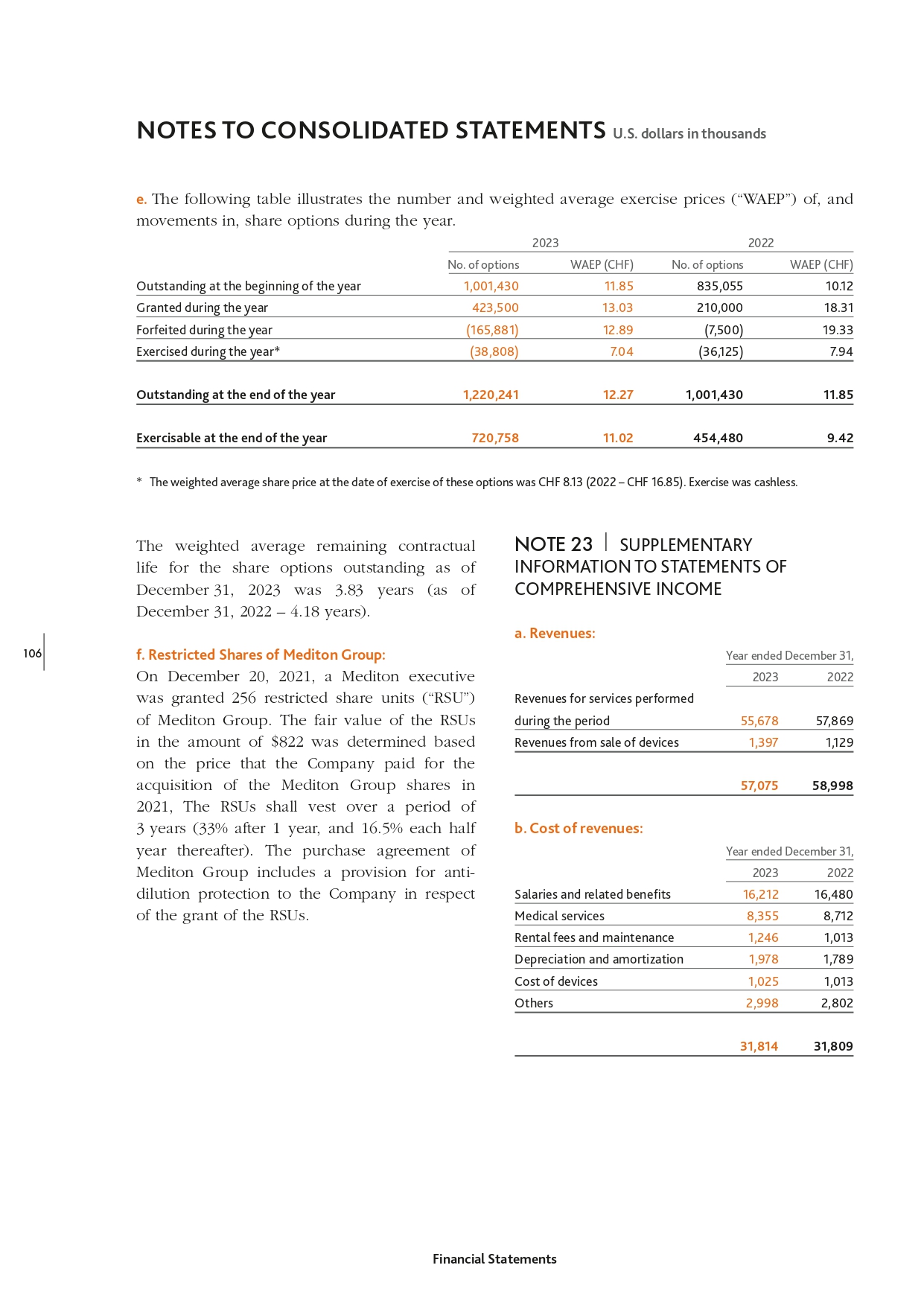
NOTES TO CONSOLIDATED STATEMENTS U.S. dollars in thousands e. The following table illustrates the number and weighted average exercise prices
(“WAEP”) of, and movements in, share options during the year. 2023 2022 No. of options WAEP (CHF) No. of options WAEP (CHF) 1,001,430 11.85 835,055 10.12 Granted during the year 423,500 13.03 210,000 18.31 Forfeited during the year (165,881) 12.89
(7,500) 19.33 Exercised during the year* (38,808) 7.04 (36,125) 7.94 1,220,241 12.27 1,001,430 11.85 720,758 11.02 454,480 9.42 Outstanding at the beginning of the year Outstanding at the end of the year Exercisable at the end of the year * The
weighted average share price at the date of exercise of these options was CHF 8.13 (2022 – CHF 16.85). Exercise was cashless. The weighted average remaining contractual life for the share options outstanding as of December 31, 2023 was 3.83 years (as
of December 31, 2022 – 4.18 years). NOTE 23 | SUPPLEMENTARY INFORMATION TO STATEMENTS OF COMPREHENSIVE INCOME a. Revenues: 106 f. Restricted Shares of Mediton Group: Year ended December 31, On December 20, 2021, a Mediton executive was granted 256
restricted share units (“RSU”) of Mediton Group. The fair value of the RSUs in the amount of $822 was determined based on the price that the Company paid for the acquisition of the Mediton Group shares in 2021, The RSUs shall vest over a period of 3
years (33% after 1 year, and 16.5% each half year thereafter). The purchase agreement of Mediton Group includes a provision for antidilution protection to the Company in respect of the grant of the RSUs. 2023 2022 55,678 57,869 1,397 1,129 57,075
58,998 Revenues for services performed during the period Revenues from sale of devices b. Cost of revenues: Year ended December 31, 2023 2022 Salaries and related benefits 16,212 16,480 Medical services 8,355 8,712 Rental fees and maintenance 1,246
1,013 Depreciation and amortization 1,978 1,789 Cost of devices 1,025 1,013 Others 2,998 2,802 31,814 31,809 Financial Statements
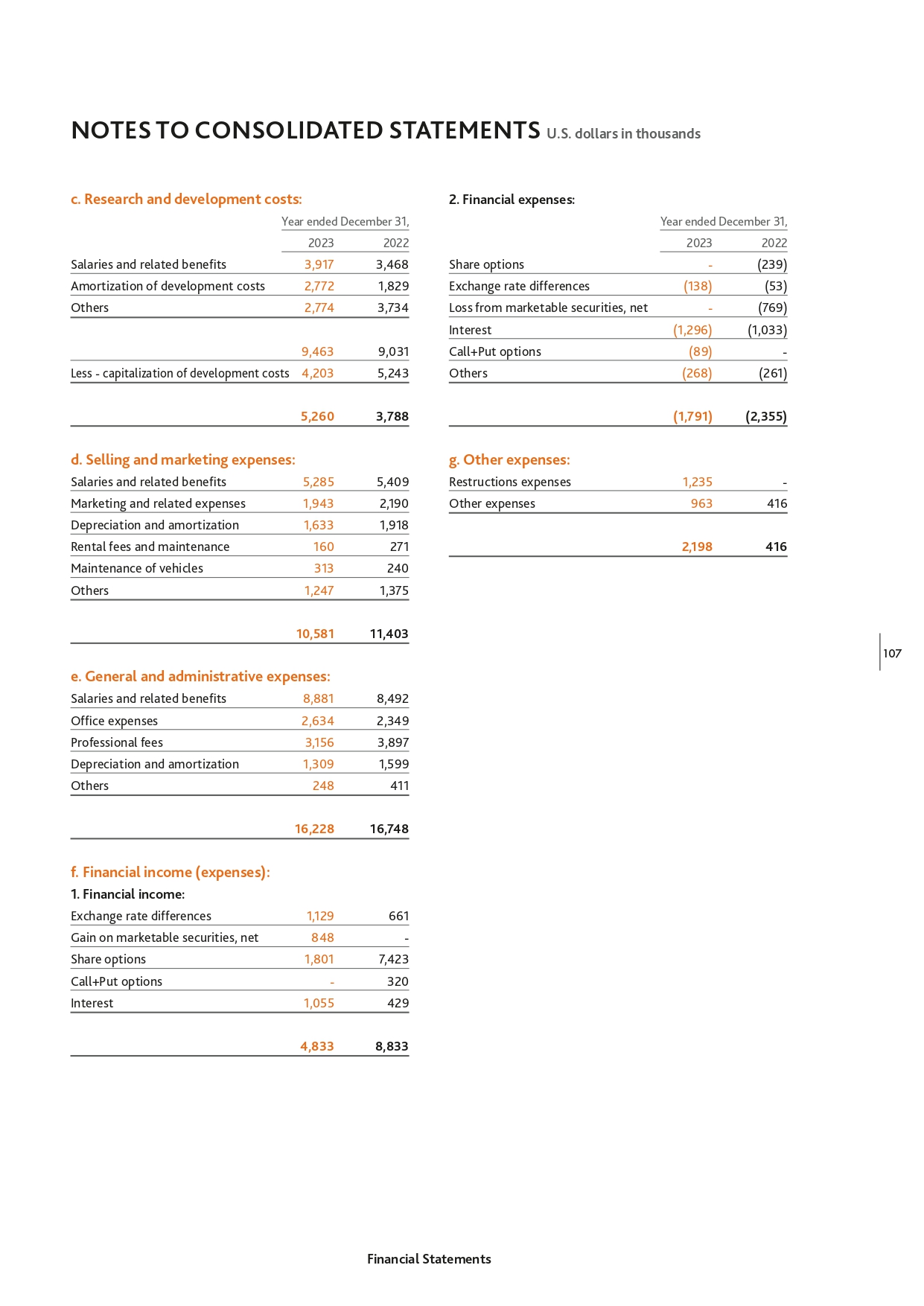
NOTES TO CONSOLIDATED STATEMENTS U.S. dollars in thousands c. Research and development costs: 2. Financial expenses: Year ended December 31,
Year ended December 31, 2023 2022 Salaries and related benefits 3,917 3,468 Share options Amortization of development costs 2,772 1,829 Exchange rate differences Others 2,774 3,734 Loss from marketable securities, net Interest 9,463 9,031 Call+Put
options Less - capitalization of development costs 4,203 5,243 Others 5,260 3,788 d. Selling and marketing expenses: 5,285 5,409 Restructions expenses Marketing and related expenses 1,943 2,190 Other expenses Depreciation and amortization 1,633 1,918
160 271 Maintenance of vehicles Others 2022 - (239) (138) (53) - (769) (1,296) (1,033) (89) - (268) (261) (1,791) (2,355) g. Other expenses: Salaries and related benefits Rental fees and maintenance 2023 313 240 1,247 1,375 10,581 11,403 1,235 - 963
416 2,198 416 107 e. General and administrative expenses: Salaries and related benefits 8,881 8,492 Office expenses 2,634 2,349 Professional fees 3,156 3,897 Depreciation and amortization 1,309 1,599 248 411 16,228 16,748 1,129 661 848 - 1,801 7,423
- 320 1,055 429 4,833 8,833 Others f. Financial income (expenses): 1. Financial income: Exchange rate differences Gain on marketable securities, net Share options Call+Put options Interest Financial Statements
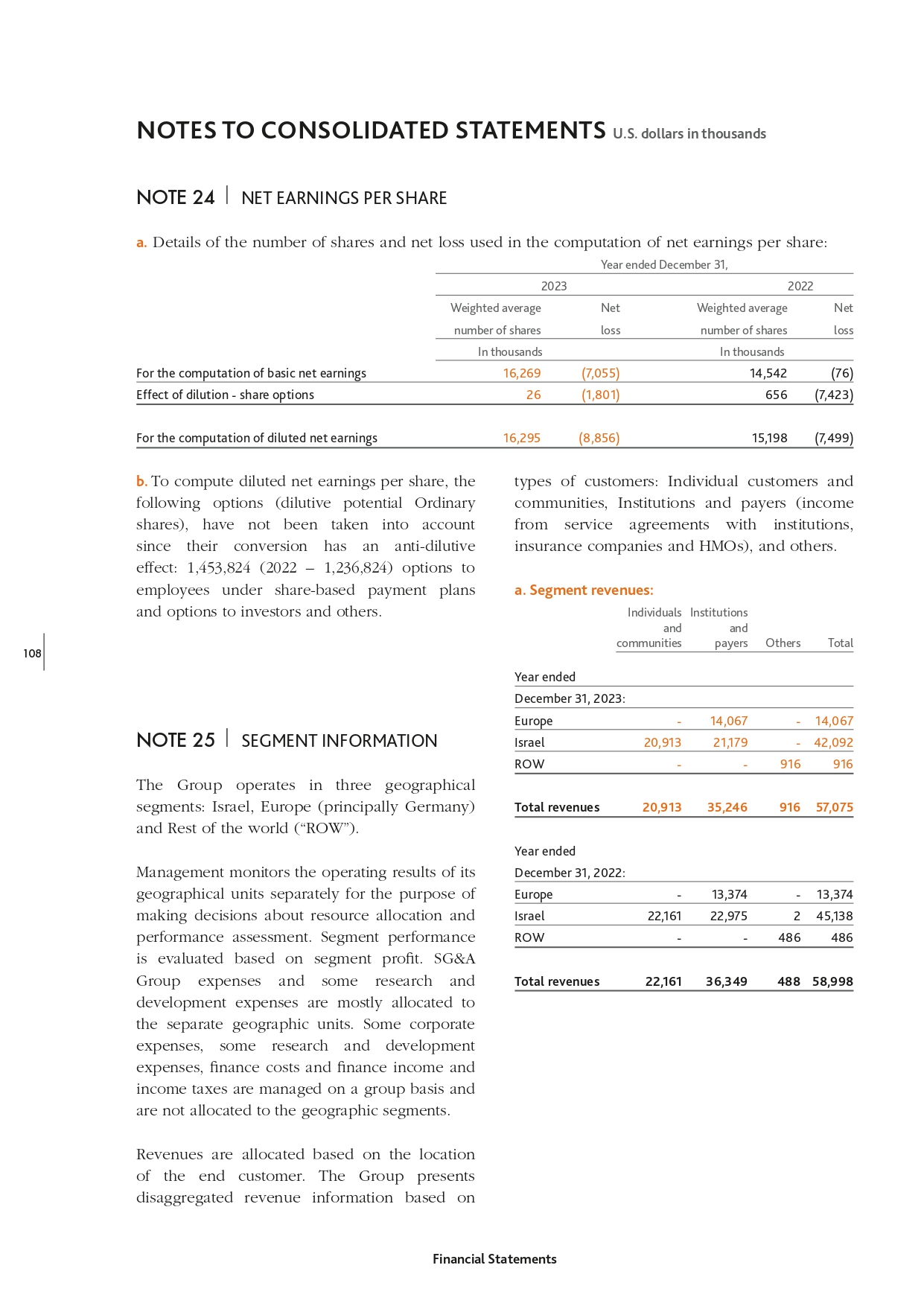
NOTES TO CONSOLIDATED STATEMENTS U.S. dollars in thousands NOTE 24 | NET EARNINGS PER SHARE a. Details of the number of shares and net loss used
in the computation of net earnings per share: Year ended December 31, 2023 2022 Weighted average Net Weighted average Net number of shares loss number of shares loss In thousands For the computation of basic net earnings Effect of dilution - share
options For the computation of diluted net earnings b. To compute diluted net earnings per share, the following options (dilutive potential Ordinary shares), have not been taken into account since their conversion has an anti-dilutive effect:
1,453,824 (2022 – 1,236,824) options to employees under share-based payment plans and options to investors and others. In thousands 16,269 (7,055) 14,542 (76) 26 (1,801) 656 (7,423) 16,295 (8,856) 15,198 (7,499) types of customers: Individual
customers and communities, Institutions and payers (income from service agreements with institutions, insurance companies and HMOs), and others. a. Segment revenues: Individuals Institutions and and communities payers 108 Others Total - 14,067 Year
ended December 31, 2023: NOTE 25 | Europe SEGMENT INFORMATION The Group operates in three geographical segments: Israel, Europe (principally Germany) and Rest of the world (“ROW”). - 14,067 Israel 20,913 21,179 ROW - - 916 916 20,913 35,246 916
57,075 - 13,374 - 13,374 Israel 22,161 22,975 2 45,138 ROW - - 486 486 Total revenues - 42,092 Year ended Management monitors the operating results of its geographical units separately for the purpose of making decisions about resource allocation and
performance assessment. Segment performance is evaluated based on segment profit. SG&A Group expenses and some research and development expenses are mostly allocated to the separate geographic units. Some corporate expenses, some research and
development expenses, finance costs and finance income and income taxes are managed on a group basis and are not allocated to the geographic segments. December 31, 2022: Europe Total revenues Revenues are allocated based on the location of the end
customer. The Group presents disaggregated revenue information based on Financial Statements 22,161 36,349 488 58,998

NOTES TO CONSOLIDATED STATEMENTS U.S. dollars in thousands NOTE 26 b. Reporting on geographic segments: | SUBSEQUENT EVENTS Year ended December
31, 2023 2022 (5,347) (3,044) Segment profit (loss): Europe Israel 8,424 8,641 ROW (3,622) (2,972) (545) 2,625 Corporate, R&D and other expenses (6,263) (7,375) Other expenses (2,198) (416) Operating loss (9,006) (5,166) 3,042 6,478 (5,964) 1,312
On March 14, 2024 the Company announced that Mr. Erez Nachtomy, the Company’s CEO, will be stepping down as CEO in mid June 2024. Unallocated income and expenses: Financial income, net Profit (loss) before taxes on income c. Additional information:
Europe Israel Others Total 109 Year ended December 31, 2023 Depreciation and amortization 3,637 4,049 6 7,692 Unallocated Europe Israel Row assets Total Non-current assets 23,588 36,803 1,940 Europe 4,910 67,241 Israel Others Total 4,470 10 7,134
Unallocated Europe Israel Row assets Total Year ended December 31, 2022 Depreciation and amortization 2,654 Non-current assets 27,132 40,056 1,767 2,636 71,591 Financial Statements

SHL TeleMedicine Ltd. Ashdar Building 90 Igal Alon St. Tel Aviv 67891 Israel Tel. +972 3 561 2212 Fax. +972 3 624 2414 E-mail:
shl@shl-telemedicine.com www.shl-telemedicine.com Annual Report 2023
SHL Telemedicine (PK) (USOTC:SMDCF)
Historical Stock Chart
From Apr 2024 to May 2024

SHL Telemedicine (PK) (USOTC:SMDCF)
Historical Stock Chart
From May 2023 to May 2024
